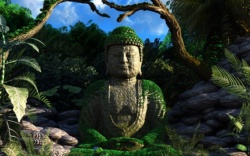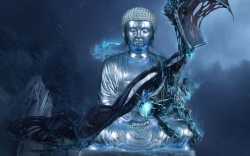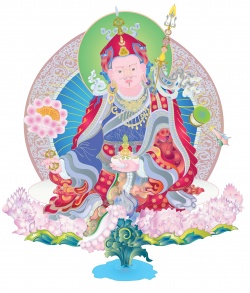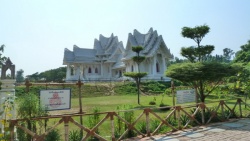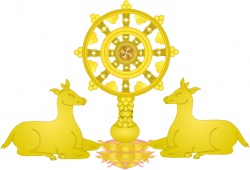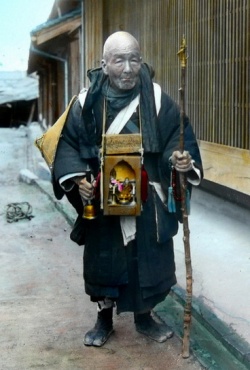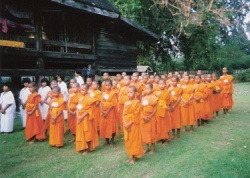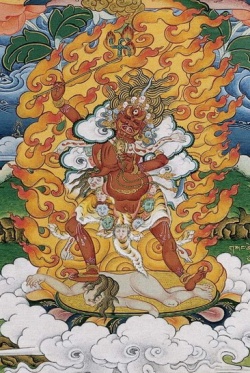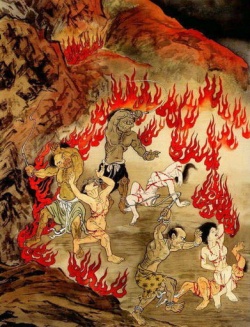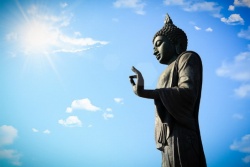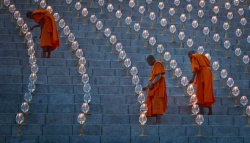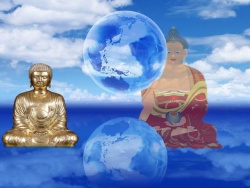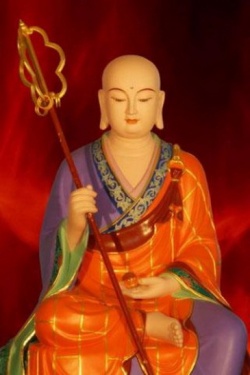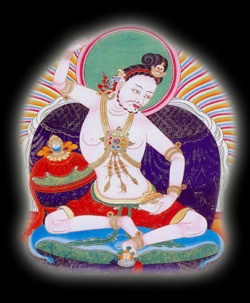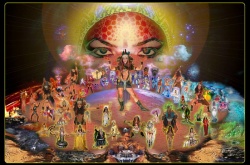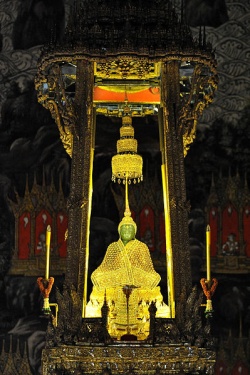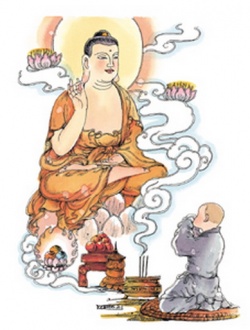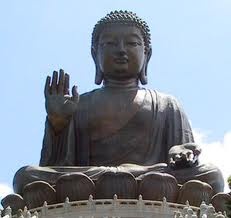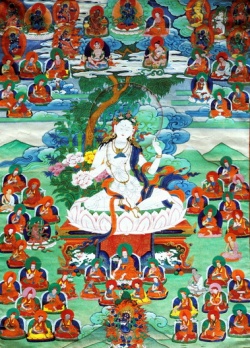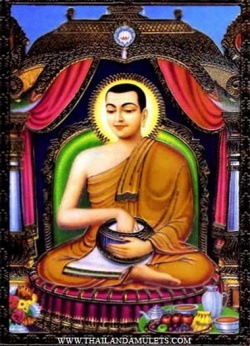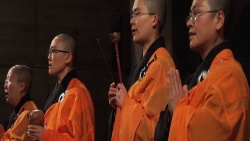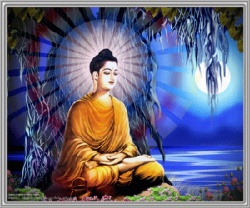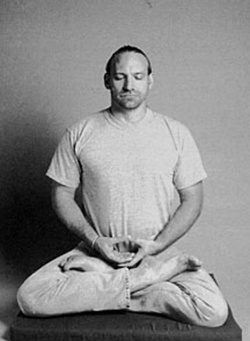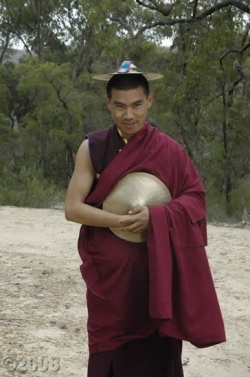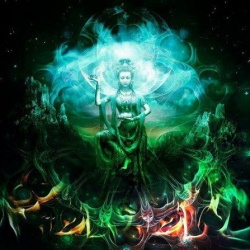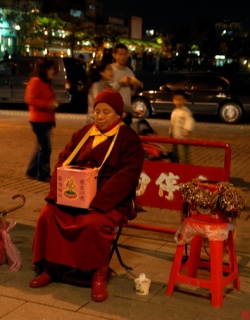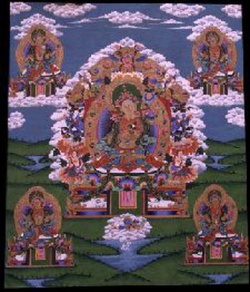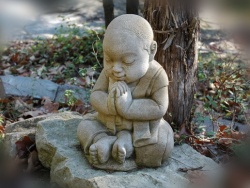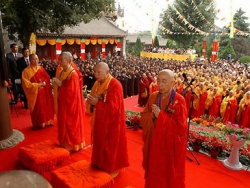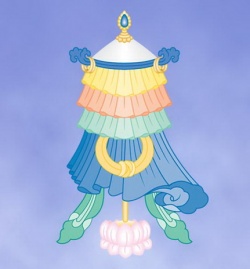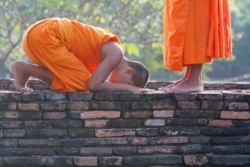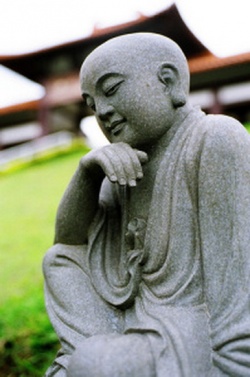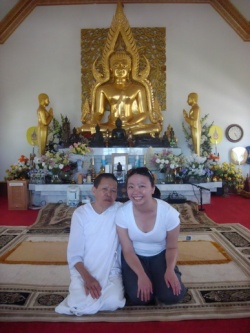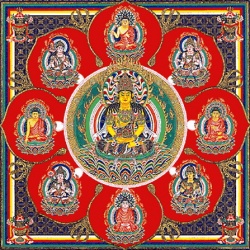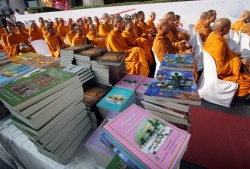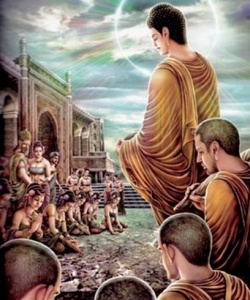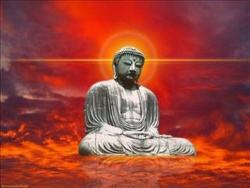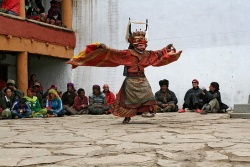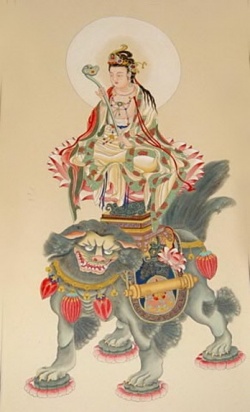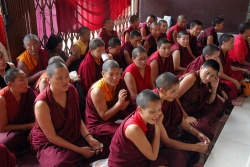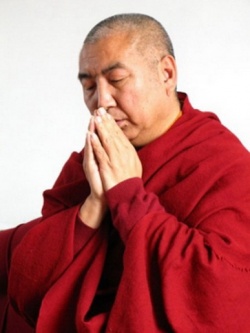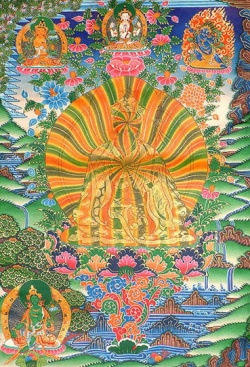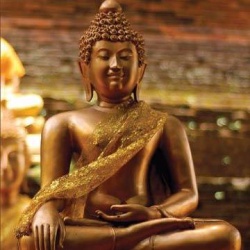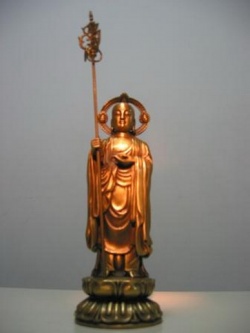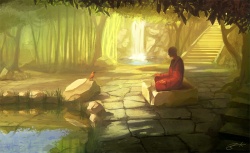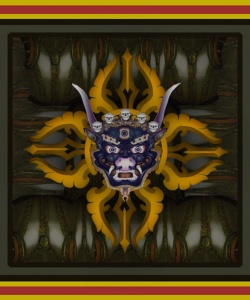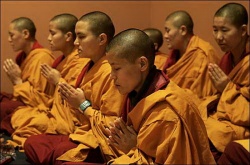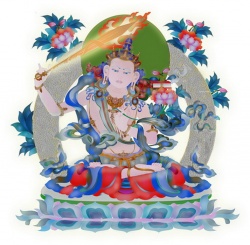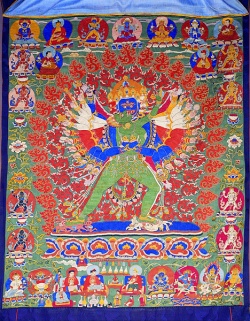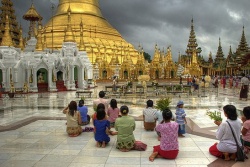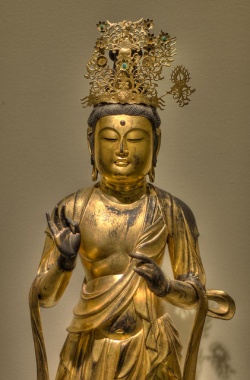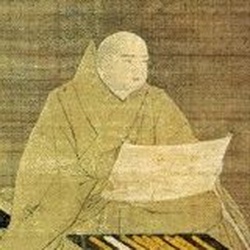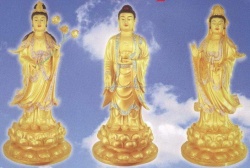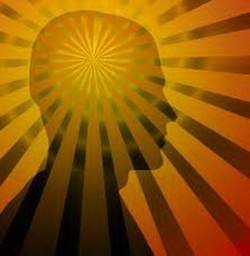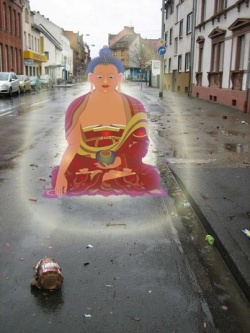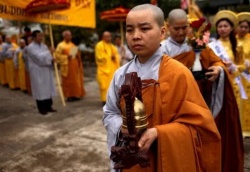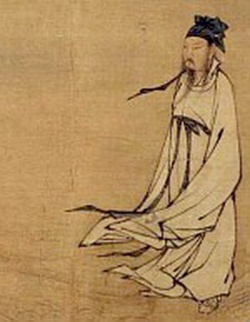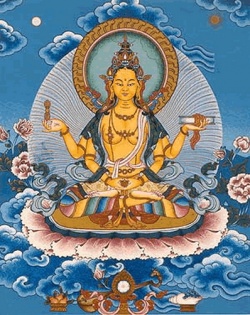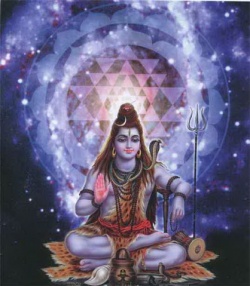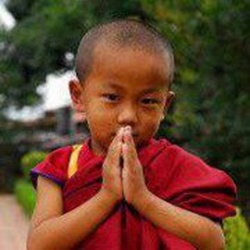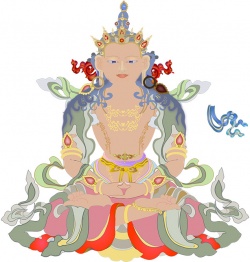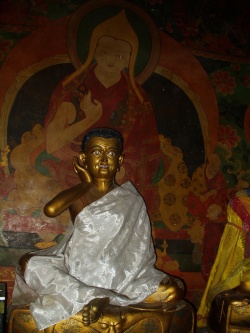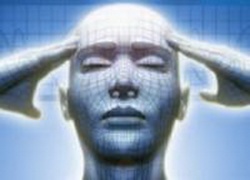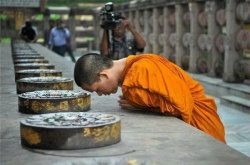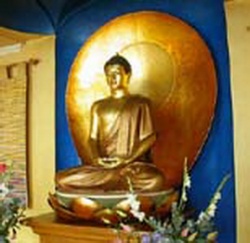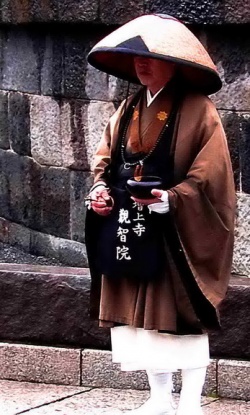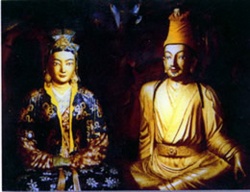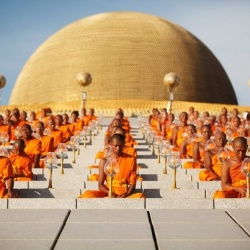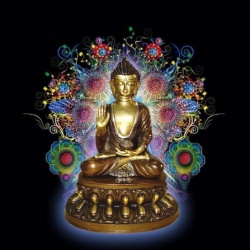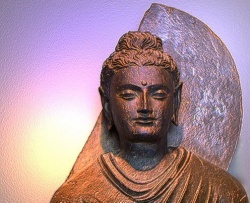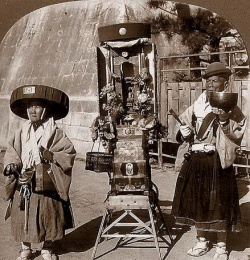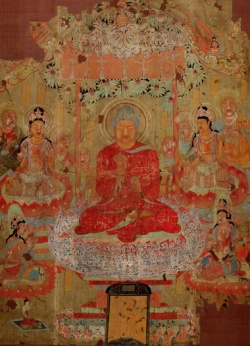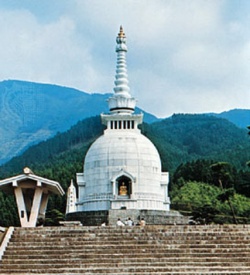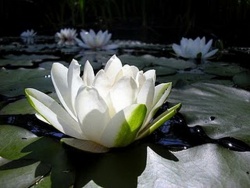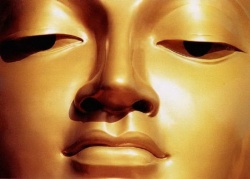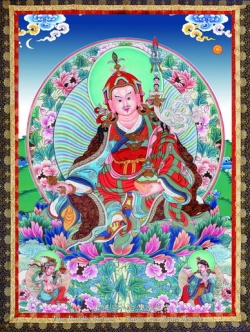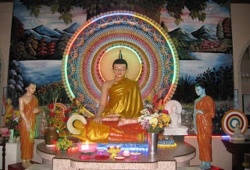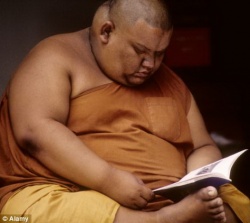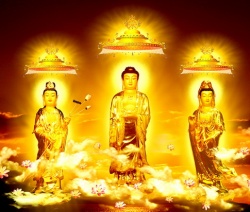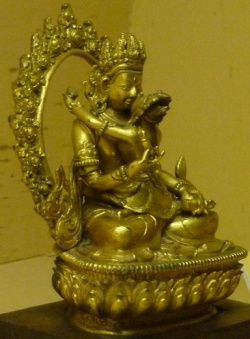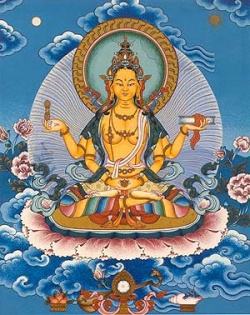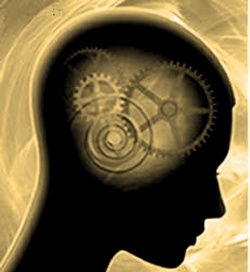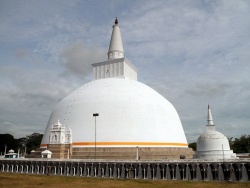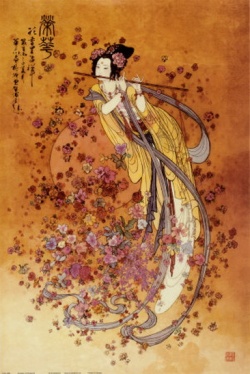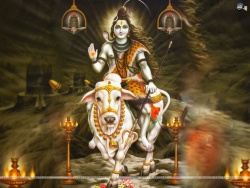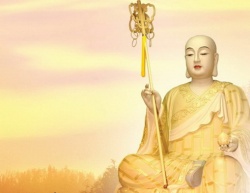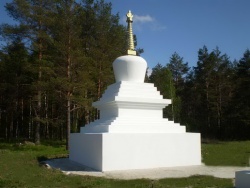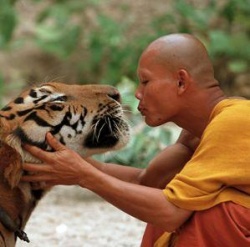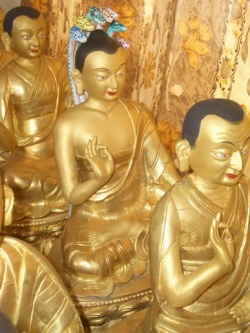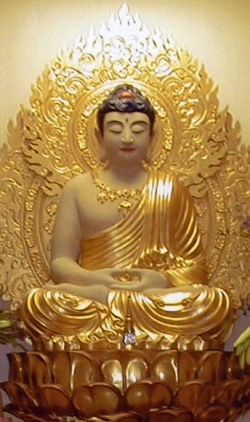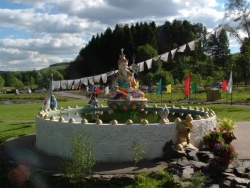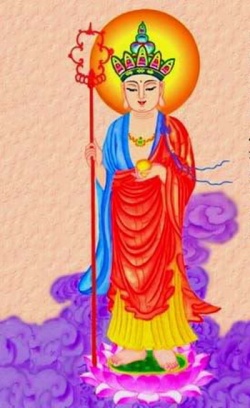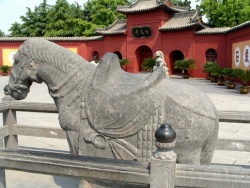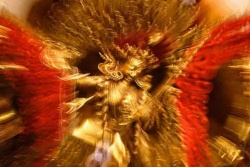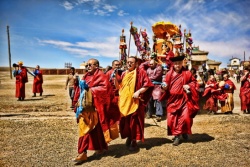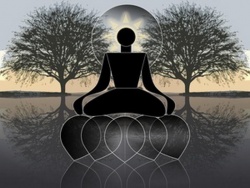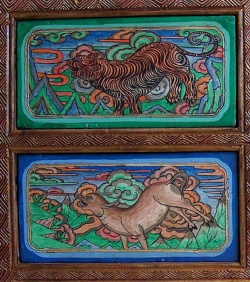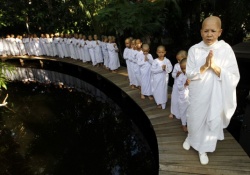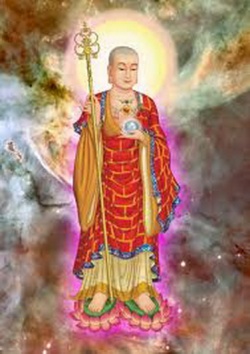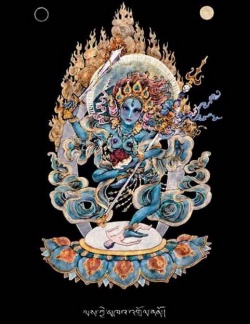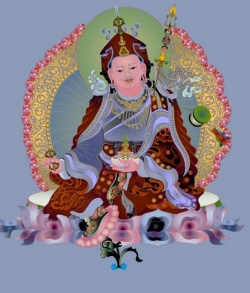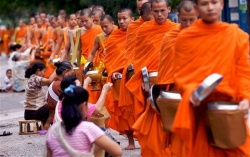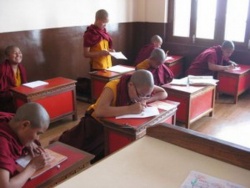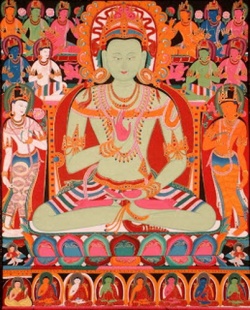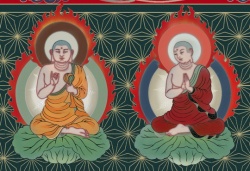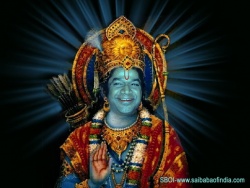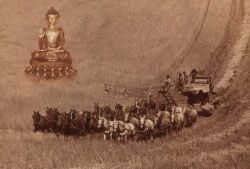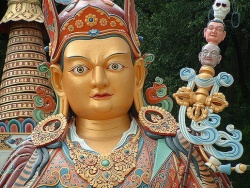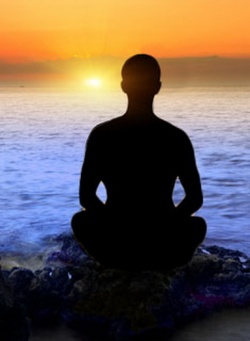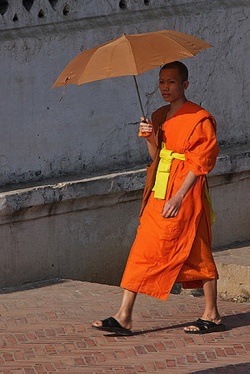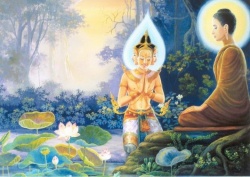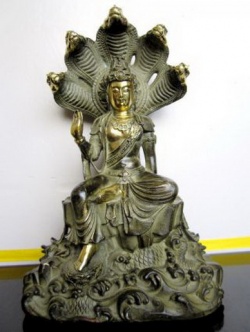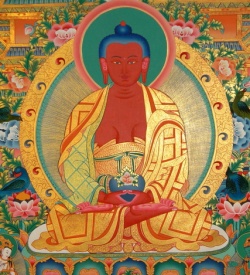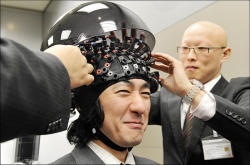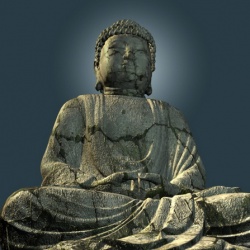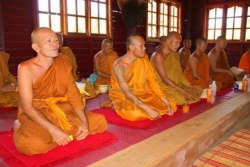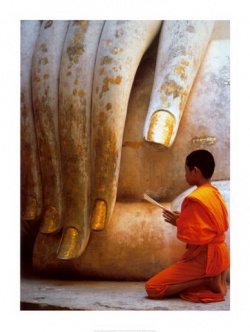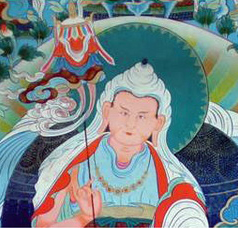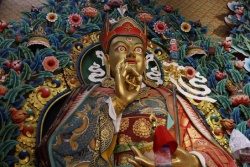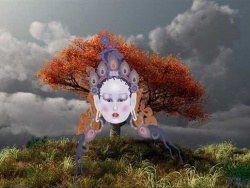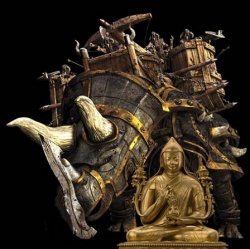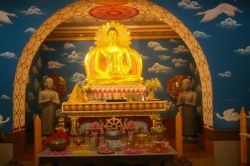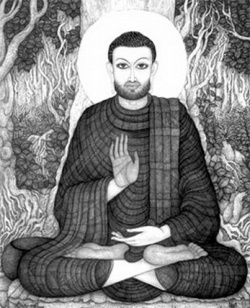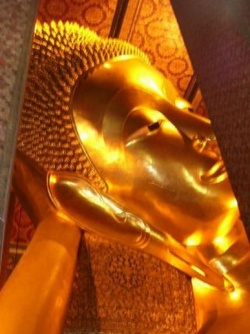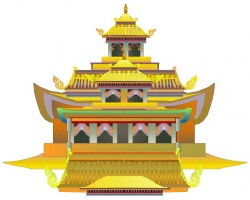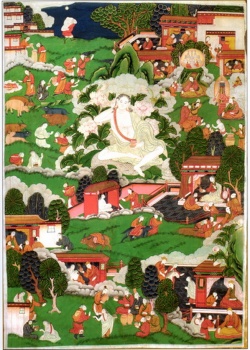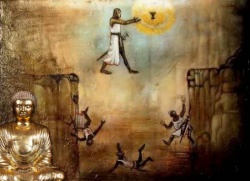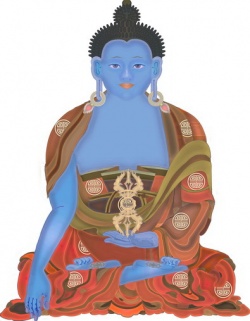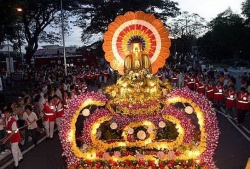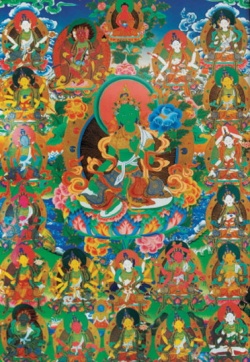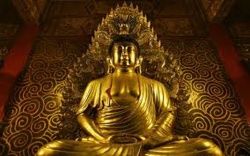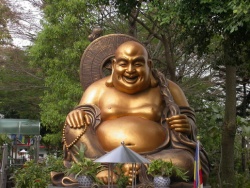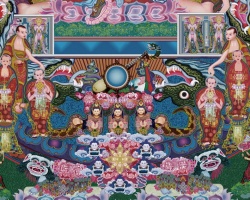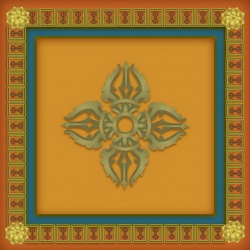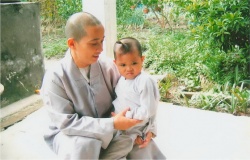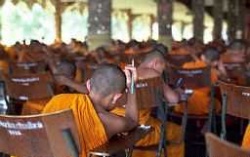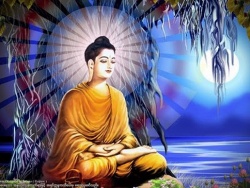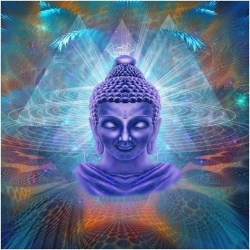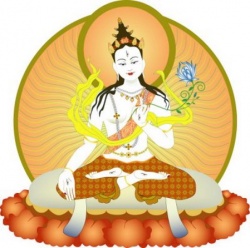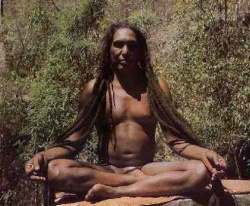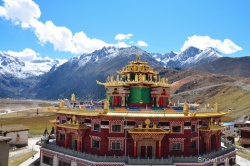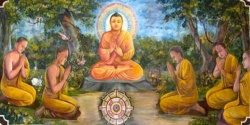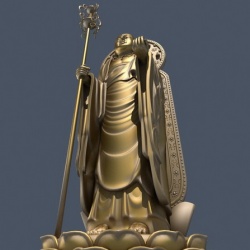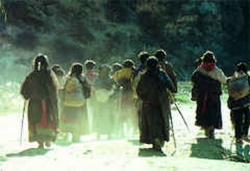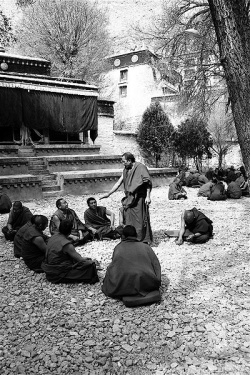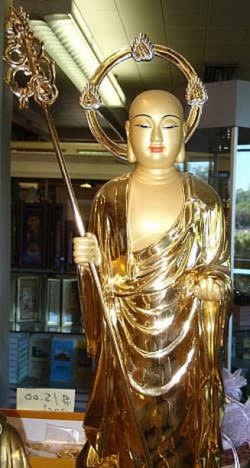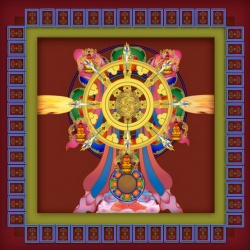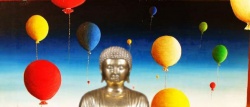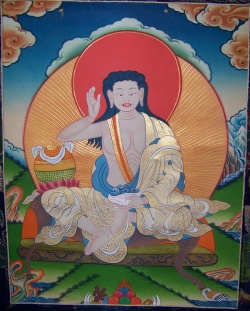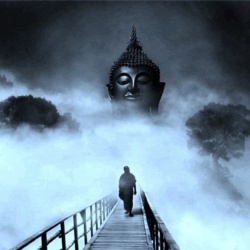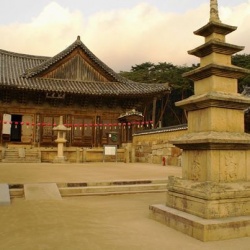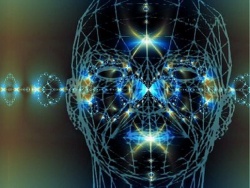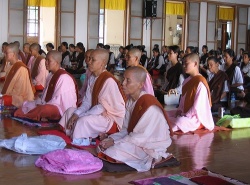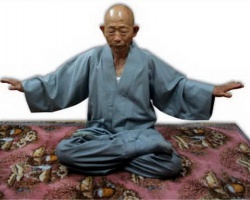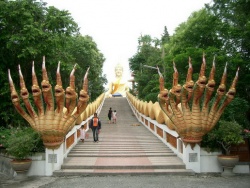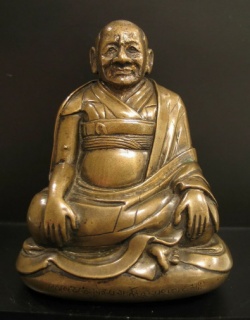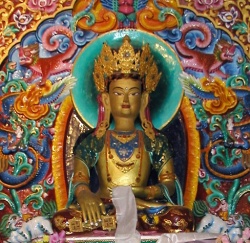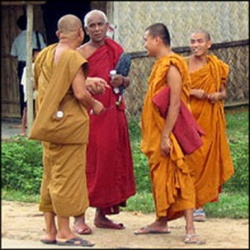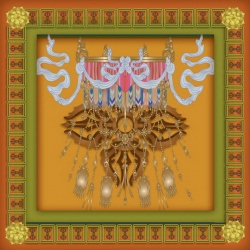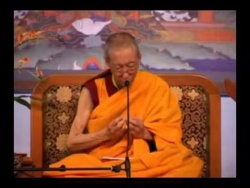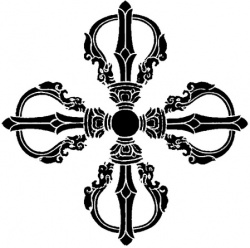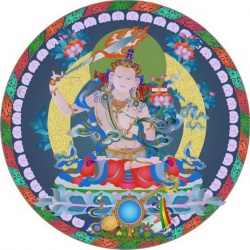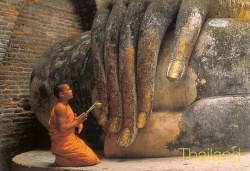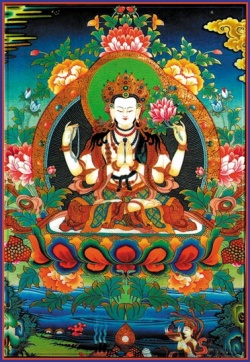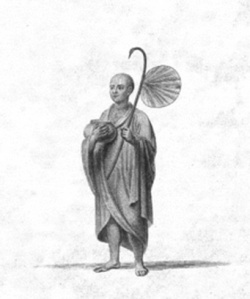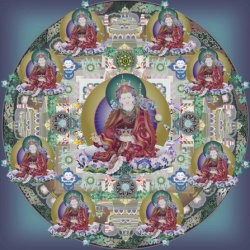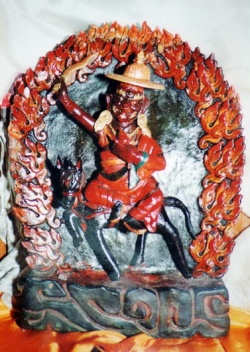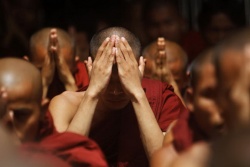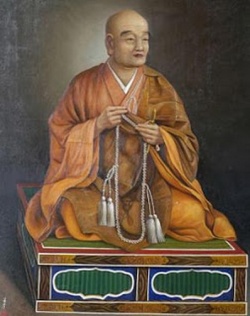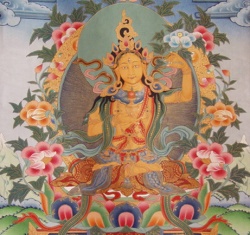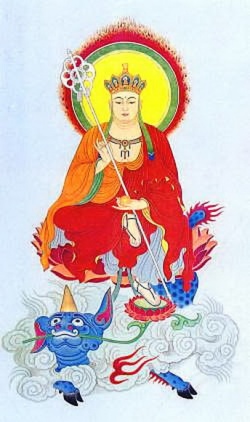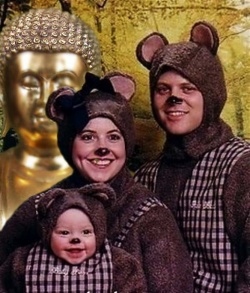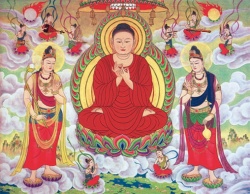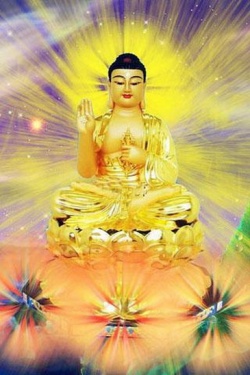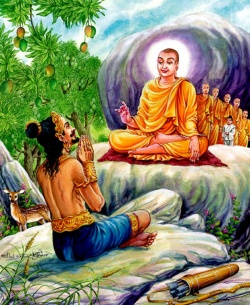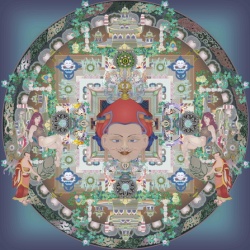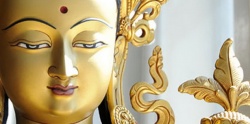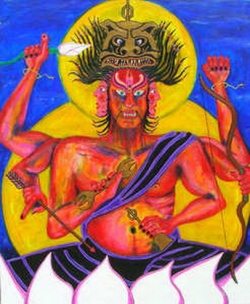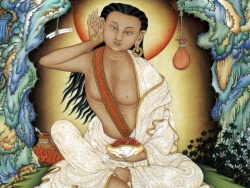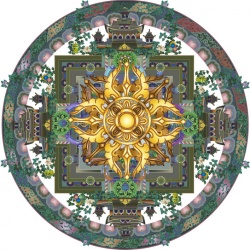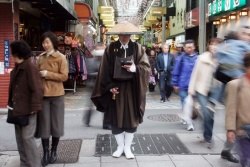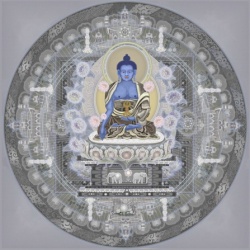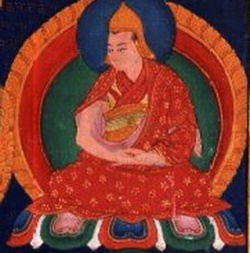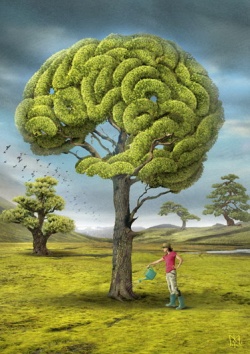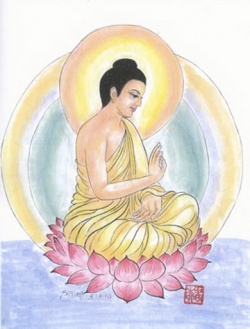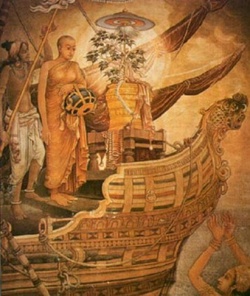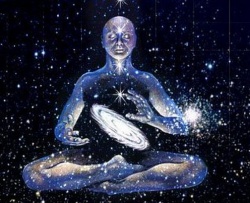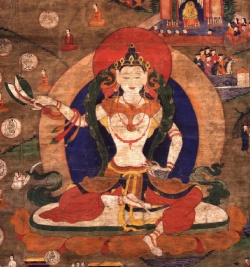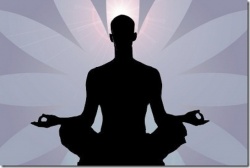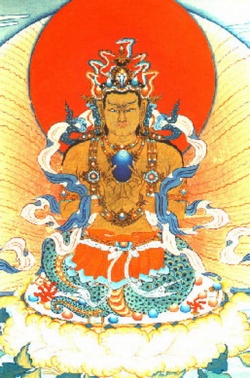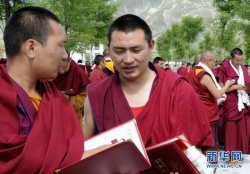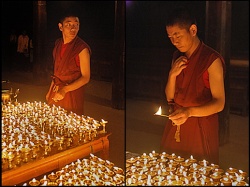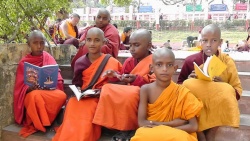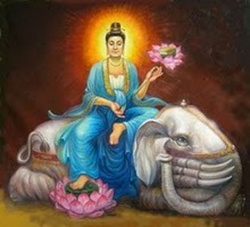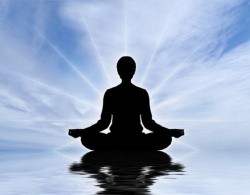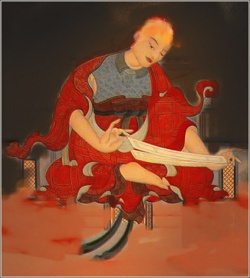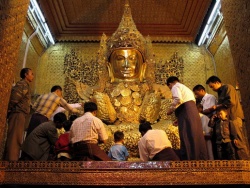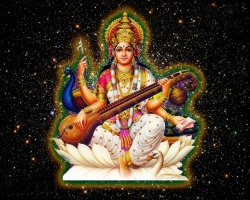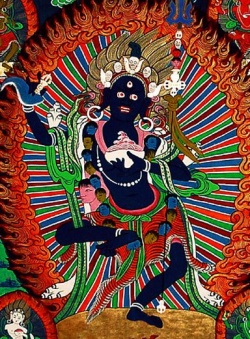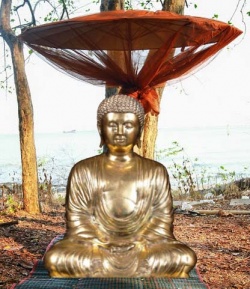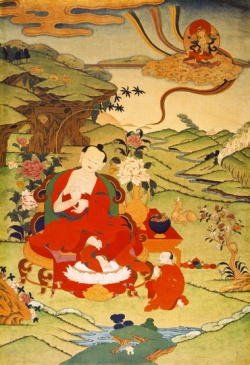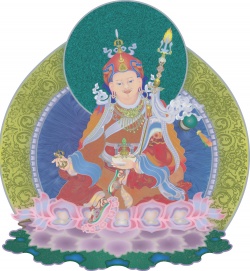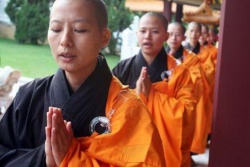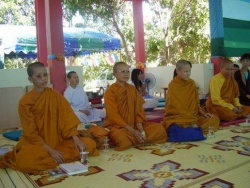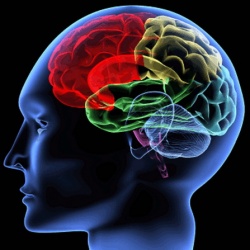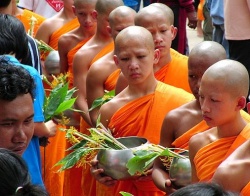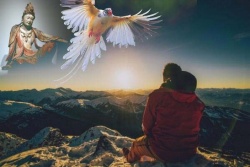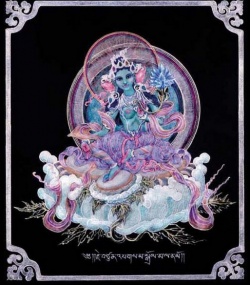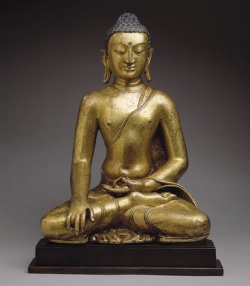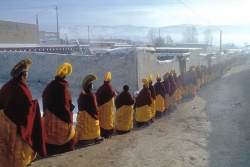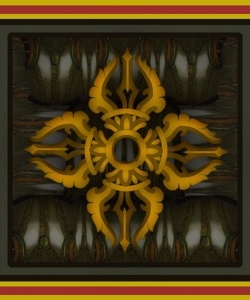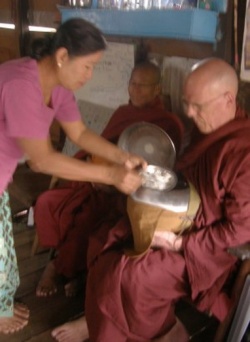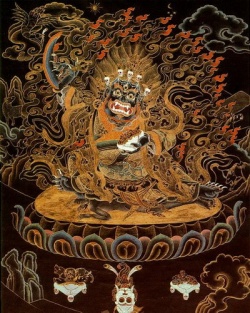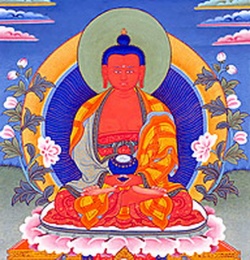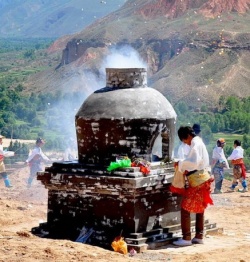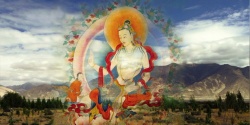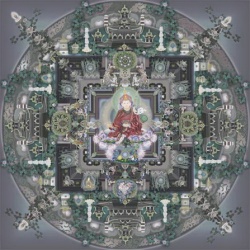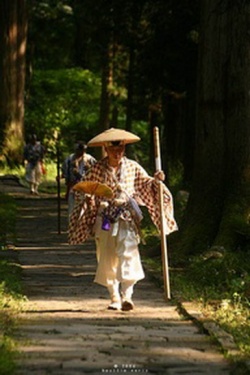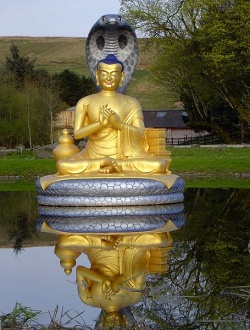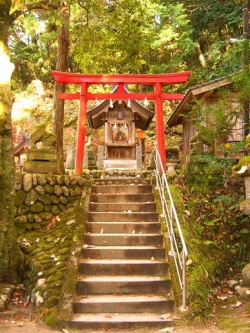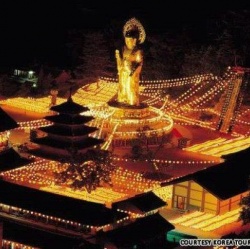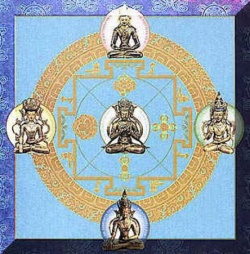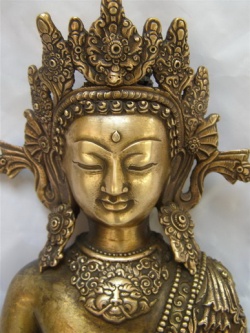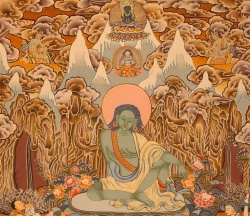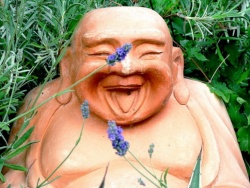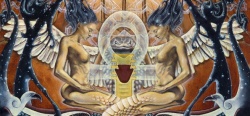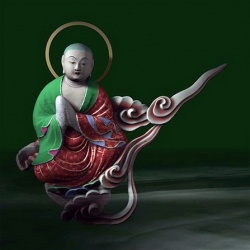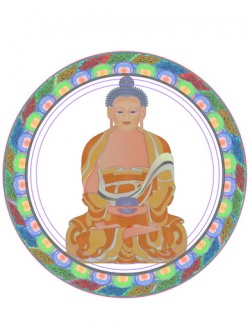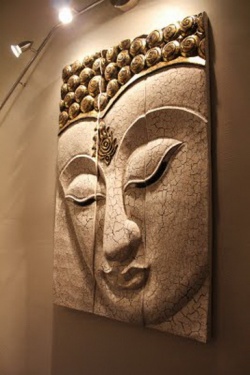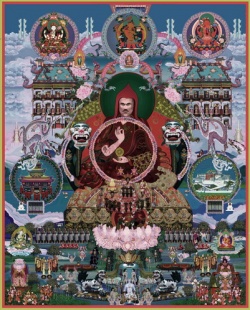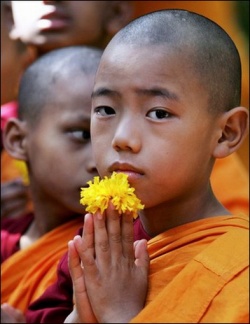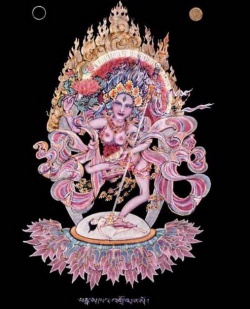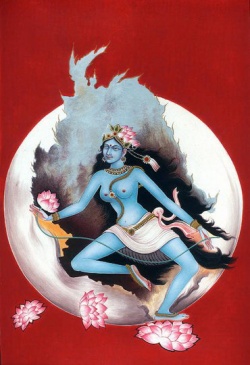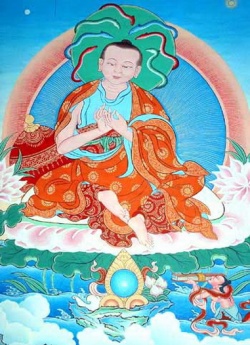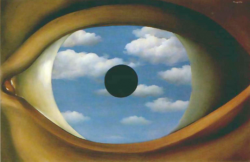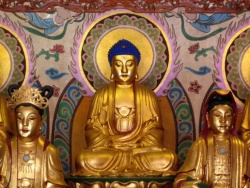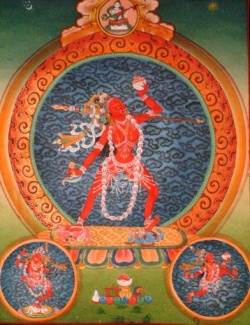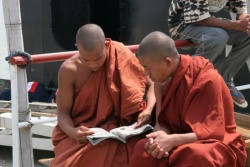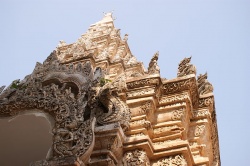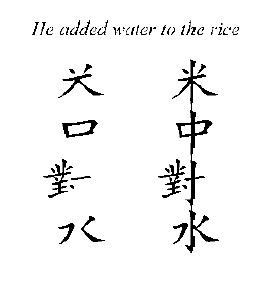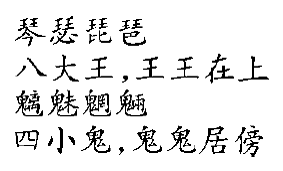The Shurangama Sutra With Commentary by the Tripitaka Master Hsuan Hua: Volume 4
The Shurangama Sutra
With Commentary by the Tripitaka Master Hsuan Hua
Volume 4
Contents
CHAPTER 1: The Reason for Continual Arisal
G2 He casts out the subtle delusions by explaining about two aspects of the treasury of the Thus Come One.
H1 Purnamaitreyani retraces the former teaching and brings up two doubts.
I1 He praises the Thus Come Ones wonderful instructions.
Sutra:
Then Purnamaitreyaniputra arose from his seat in the midst of the great assembly, uncovered his right shoulder, knelt on his right knee, put his palms together respectfully, and said to the Buddha, The most virtuous and awe-inspiring World Honored One has for the sake of living beings expounded the primary truth of the Thus Come One with remarkable eloquence.
Commentary:
Then, after Ananda had finished speaking his verse in praise of the Buddha, Purnamaitreyaniputra arose from his seat in the midst of the great assembly. Purnamaitreyaniputra means son of fulfillment and compassion. Fulfillment was his father's name; compassion was his mother's name. He immediately stood up. The Buddha's disciples were especially respectful toward him. When they wanted to ask a question, they stood in reverence. He uncovered his right shoulder. The Chinese sash is styled so that it does not cover the right shoulder, in order to represent this gesture of respect. In India it is never cold, winter or summer, so it was all right to leave the right shoulder completely exposed. One wouldn't get cold. But the climate in China is very cold, and if one's right shoulder were always exposed it would be easy to catch cold. So in China the monks wore clothing under their sashes. This accorded with the climate, the geographical location, and the customs in China.
The sashes in India did not have a clasp like the Chinese sashes do. Now in India, Burma, Ceylon, and Thailand, where the Theravada teachings are practiced, monks still don't have clasps on their sashes. Why do Chinese sashes have a clasp? This too came about because of the climate of China, for if the monks wore clothing inside their sashes, and if there were no clasp to hold the sash in place, it could slip off without their being aware of it. So the patriarchs of China invented the clasp to solve this problem. The sashes of the other countries mentioned above have the same number of pieces, but they lack the clasp, because the climate is so warm that they don't wear clothing under their sashes. If it starts to slip off, they are aware of it since it is next to their skin.
After I left the home-life, I investigated the question of the clasp on the Chinese sash with a lot of elder dharma masters and elder monks. I asked them why the monks from other countries did not have clasps on their sashes; why did the Chinese monks add this thing to their sashes? But they all shook their heads. They didn't know. It's a small matter, but nevertheless, they didn't know. They had never known. In the end, then, who told me? No one told me. I just compared the climate of China to that of the other countries and figured out for myself that the first patriarchs who came to China must have invented the clasp to make it more convenient to wear clothes under the sash. When I brought up my opinion, the elder dharma masters and monks said, Oh, of course, that's how it was. Probably that's how it was. It was a small question, so no one had stopped to think about it, but I know that Americans like to look into things thoroughly, so now I've explained the origin of the clasp on the Chinese-style sashes without waiting to be asked.
Purna uncovered his right shoulder and knelt on his right knee. The monks in present-day Burma and Ceylon have this practice. For instance, if a junior monk sees a senior monk he does not stand to talk but kneels with his right knee on the ground and his palms together.
Purna put his palms together respectfully, and said to the Buddha, The most virtuous and awe-inspiring World Honored One has for the sake of living beings expounded the primary truth of the Thus Come One with remarkable eloquence. He said that the Buddha is one of awesome virtue who can subdue all the living beings in the three realms. His awesomeness has the power to cause all living beings to submit. His virtue moves all living beings, so that when they hear his name they change their faults and become good. The Buddha uses wholesome clever expedient devices to teach and transform living beings. He speaks the dharma for the sake of living beings; he tells them in detail of the primary truth of the Thus Come One, the Tathagata's most wonderful doctrine.
I2 He discloses his own doubtfulness.
Sutra:
The World Honored One often singles me out as the foremost among speakers of dharma. But now when I hear the wonderful and subtle expression of the dharma, I am like a deaf
person who at a distance of more than a hundred paces tries to hear a mosquito, which in fact cannot be seen, let alone heard.
Commentary:
Purna has just bowed to the Buddha and made a request. Why did he do that? Because he had some doubts. Right now Ananda doesn't have any doubts, but Purna, first among those who speak dharma, has given rise to doubts. He is not clear about the dharma that the Buddha has spoken. Therefore he says, The World Honored One often singles me out as the foremost among speakers of dharma. You often choose me as the best among those who lecture the sutras and speak dharma. I, Purna, rank number one. He expresses well the wonderful meaning of all dharmas.
If this sutra were being explained now by Purna, flowers would rain from the heavens and golden lotuses would well up from the ground. It wouldn't be like my dry and bland explanation which puts my listeners to sleep. The dharma Purna spoke was the foremost, most subtle and wonderful of dharmas. He excelled in distinguishing the characteristics of all dharmas. But now when I hear the wonderful and subtle expression of the dharma, I am like a deaf person who at a distance of more than a hundred paces tries to hear a mosquito, which in fact cannot be seen, let alone heard. His meaning is that someone who is truly deaf of course cannot hear such a small sound as the hum of a mosquito if he is more than a hundred paces away from it.
You can't even see a mosquito at that distance. This represents the fact that the dharma the Buddha speaks is most subtle and wonderful, wonderful to the ultimate. Therefore, though Purna hears it because he is in the dharma assembly, he is like a deaf person. He doesn't understand. So if there are people in the present who don't understand the sutra, it's no wonder. You see, even Purna, who was foremost in speaking dharma, had questions and said he didn't understand. In fact he says he's deaf. Whether you understand or not, you all can at least hear the explanation of the sutra. This is a hundred times better than Purna. Don't be so hard on yourself.
When the Buddha spoke the Avatamsaka Sutra, adherents of the two vehicles could not see the thousand-foot Nishyanda body of the Buddha. Instead they saw the Buddha as a venerable six-foot tall bhikshu. When the Buddha spoke the Avatamsaka Sutra, some of his listeners had ears but did not hear the Buddha speaking dharma. Purna is in a similar situation here. He certainly is not scolding the Buddha, nor is he saying that he does not believe the dharma the Buddha speaks. It's not that he doesn't believe it; he hasn't understood it. That's what this analogy represents.
Some people explain this phrase wonderful and subtle expression of the dharma as meaning a very small sound; they say that the Buddha spoke the dharma in a very quiet voice. They say that subtle here means small. But that explanation is not correct. Subtle means rare and esoterically wonderful; it means an extremely clear explanation of the dharma. It certainly does not mean that the Buddha spoke with a soft voice. Some people say, "Why does Purna compare himself to a mosquito?" Because the Buddha spoke the dharma with such a small voice that Purna felt it was like trying to hear a mosquito at a hundred paces. There are a lot of dharma masters who swallow the date whole, so to speak; they don't know the flavor of the text. They explain it like this:
Basically a deaf person can't hear anything; even less can he hear the Buddha speaking dharma when he speaks with as small a voice as the sound of a mosquito. But this rendering of the words of the text is incorrect. Purna is using an analogy. Some people misunderstand, saying, "Oh, is Purna slandering the Buddha by calling him a mosquito?" That is not the case; you should not have that kind of doubt. In his analogy Purna likens himself to a deaf person; it is not that he likens the Buddha to a mosquito.
Sutra:
World Honored One, although Ananda and those like him have become enlightened, they have not yet cast out their habits and outflows.
Commentary:
World Honored One, although Ananda and those like him have become enlightened, they have not yet cast out their habits and outflows. Although they have understood the principle of becoming enlightened, their habits go back many lives, many aeons. And where do outflows come from? They come from habits. Habits aren't created in a day. They are learned from time without beginning, through life after life, in time after time, and from these learned habits come all kinds of outflows. What is meant by outflows? Outflows are afflictions. The afflictions and habits of Ananda and those like him have not been completely done away with. They are called remaining habits the ones left-over from former lives. They are more or less like karma.
The Buddha had a disciple called Pilindavatsa. One day he wanted to cross a river, and since he had been certified as having attained the fruition of arhatship, he had certain powers. Rivers have spirits, and the spirit of this particular river was female. When Pilindavatsa got to the bank of the river he called out, Little Servant, stop the flow! One who is an arhat has the spiritual power to part the waters when he crosses a river. But the one who stops the flow of the river must be the river-spirit. That is why Pilindavatsa called out, Little Servant, stop the flow! The first time he did that, the river-spirit was annoyed, but did not dare say anything because Pilindavatsa was an arhat. But after he'd addressed her as Little Servant a number of times, the river-spirit finally went to the Buddha to state her case.
"When your disciple Pilindavatsa wants to cross the river he always addresses me as Little Servant, she complained. And I'm outraged. Buddha, you should teach your disciples not to be so ill-mannered. How can he call me a name like that and command me the way he does?"
So the Buddha called for Pilindavatsa. "Apologize to the riverspirit," he said, "and don't talk that way any more." So what do you suppose Pilindavatsa did?
He said, "Little Servant, don't hold a grudge." The whole reason that she had become upset was that he had called her "Little Servant" in the first place!
Of course the river-spirit was furious. "See!" she cried. "Your disciple calls me that right in front of you!" Shakyamuni Buddha said, "Do you know why he calls you 'Little Servant'? In five hundred former lives you were his servant. You've worked for him for so long that when he sees you he reverts to his former habits and that name just slips off his tongue. He hasn't been able to change that habit from the past."
After the Buddha explained to the river-spirit, she realized it was a question of cause and effect and there was nothing more to say. The situation was resolved. That is an example of not having cast out their habits and outflows.
Sutra:
We in the assembly have reached the level of no outflows. Yet, although we have no outflows, we still have doubts about the dharma we have now heard the Thus Come One speak.
Commentary:
Purna said, "We in the assembly, the multitude of sages, have reached the level of no outflows. We have received the reward of the spiritual power of having extinguished all outflows. Yet, although we have no outflows, we still have doubts about the dharma we have now heard the Thus Come One speak. We still think up doubts. We still don't understand."
Now if those who had attained the fourth fruition with the extinction of outflows didn't understand, how much the less would Ananda have understood, since he had only been certified as having attained the first fruition. Although he had attained that level of enlightenment, I believe he still wasn't clear about the meaning the Buddha had just expressed.
I3 He expresses two deep doubts.
J1 He wonders about the causes for the continual arisal of the myriad things.
Sutra:
World Honored One, if all the sense organs, sense objects, skandhas, places, and realms in all the world are the treasury of
the Thus Come One, originally pure, why do all conditioned appearances such as the mountains, the rivers, and the great earth suddenly arise?
Commentary:
Purna has doubts about the doctrines the Buddha has been explaining. He doesn't believe them. World Honored One, if all the sense organs; eyes, ears, nose, tongue, body, and mind; sense objects; forms, sounds, smells, tastes, touches, and dharmas; skandha, form, feeling, thought, activity, and consciousnesses, if all these dharmas in all the world are the treasury of the Thus Come One, why do all conditioned appearances such as the mountains, the rivers, and the great earth suddenly arise? If they arise from the bright substance and pure nature of the everlasting true mind and are originally pure, then why does there suddenly arise in the purity of the treasury of the Thus Come One so many things which are all conditioned appearances that
suddenly arise? Once finished, they begin again. Done once more, they start over. Ended, they arise once more. When do they ever stop? Never. What's the principle in it?
This is the doubt that Purna asks the World Honored One about.
J2 He wonders about the feasibility of the perfect fusion of the elements.
Sutra:
Moreover, the Thus Come One said that earth, water, fire, and wind are by nature perfectly fused, are all-pervasive in the dharma-realm, and are all tranquil and everlasting.
Commentary:
This is Purnamaitreyaniputra's second doubt. 'What is the principle here?" he asks.
Sutra:
World Honored One, if the nature of earth is pervasive, how can it contain water? If the nature of water is pervasive, then fire does not arise. Further, how do you explain that the natures of fire and water can each pervade empty space with out displacing one another? World Honored One, the nature of earth is solid; the nature of emptiness is penetrating. How can they both pervade the dharma-realm? I don?t know where this
doctrine is leading.
Commentary:
Purna probably was smarter than Ananda. Ananda hadn't even thought of such questions as these. So now Purna, for his part, has some doubts and asks about these principles. He says: World Honored One, if the nature of earth is pervasive, how can it contain water? Earth overcomes water; where there is dry land there is no water. If the nature of earth pervades the dharma-realm, how can there be water there, too? Earth and water are not compatible.
If the nature of water is pervasive, then fire does not arise. Water overcomes fire; where there is water, there is no fire. Water puts fire out. If the nature of water were to pervade the dharmarealm, fire would certainly disappear. This is the same line of argument the Buddha used earlier with Ananda when he said that if there is light there can't be darkness and if there is darkness there can't be light. Now the Buddha's disciple uses the same pattern of questioning on the Buddha. "Water and fire don't mix," Purna points out. "This is a fixed principle.'
Further, how do you explain that the natures of fire and water can each pervade empty space with out displacing one another? How do you come to understand that both fire and water pervade the dharma-realm? I could believe that one or the other was all-pervasive, but if two incompatible things are both all-pervasive, then which one is going to win out? How do you know they can both be all-pervasive and not oppose one another, not harm one another or destroy one another?
World Honored One, the nature of earth is solid; the nature of emptiness is penetrating. How can they both pervade the dharma-realm? Purna imagines that by now he probably has thoroughly confused the Buddha, so he calls out to him, "World Honored One!" Or maybe he was afraid that the Buddha was asleep. "Earth is a solid object," he reasons. "Emptiness is penetrating, vacuous, there isn't anything there at all. So if there is earth, there is no emptiness; if there is emptiness, there is no earth. How can you say both these natures are all-pervasive? I don't know where this doctrine is leading. Buddha, your explanation of dharma has managed to confuse me now. I can't tell what you're getting at. Where is this principle headed? What's its aim? I don't understand."
I4 He hopes for the Buddha's greatly compassionate instruction.
Sutra:
I only hope the Thus Come One will compassionately explain in order to rend the clouds of confusion in me and among the great assembly. After saying this, he made a full prostration and respectfully and expectantly awaited the Thus Come One's unsurpassed compassionate instruction.
Commentary:
In stating these principles, Purna was certainly not trying to debate with the Buddha; he truly had such doubts. "Water and fire are not brothers; they can't dwell in the same household. Earth and emptiness are not compatible either." These questions made him nervous. "How can they all pervade the dharma-realm?' he wondered, and on impulse, heedless of everything, he began to question the Buddha. In his haste, he even forgot about propriety. So, in conclusion, he says: I only hope the Thus Come One will compassionately explain in order to rend the clouds of confusion in me and among the great assembly. World Honored One, please let flow forth your heart of great compassion and explain this matter for us. My failure to understand these doctrines is like a bank of clouds covering me. Not only do I have these doubts, the members of the great assembly do also. After saying this, he probably realized that he had been impertinent and over-exuberant, so he made a full prostration and respectfully and expectantly awaited the Thus Come One's unsurpassed compassionate instruction. He quickly knelt and' bowed to properly make his request of the Buddha. With reverence, he waited as if excessively thirsty for the Thus Come One to nourish him with the water of dharma.
H2 The Thus Come One sequentially casts out the two doubts.
I1 In order to enable them to attain benefit, he promises to explain.
Sutra:
The World Honored One then told Purna and all the arhats in the assembly who had extinguished their outflows and had reached the level of no study, "Today the Thus Come One will explain in depth the true, supreme meaning within the supreme meaning in order to cause all of you in the assembly who are fixed-nature sound-hearers and those arhats who have not realized the two kinds of emptiness, but are dedicated to the superior vehicle, as well as the others, to obtain the place of still extinction, the one vehicle, the true aranya, the proper place of cultivation. Listen attentively and I will explain it for you."
Purna and the others, revering the Buddha?s expression of dharma, listened silently.
Commentary:
The World Honored One then told Purna and all the arhats in the assembly who had extinguished their outflows and had reached the level of no study; those who had been certified as having attained the fourth fruition of arhatship. Today the Thus Come One will explain in depth the true, supreme meaning within the supreme meaning. Here the Buddha is referring to himself when he says, "...the Thus Come One, True, supreme meaning within the supreme meaning" refers to the most superior miraculous doctrine. He explains it in order to cause all of you in the assembly who are fixed-nature sound-hearers, that is, people who gain a little and are satisfied. They hang around in emptiness and stop searching. I'm at a place where there isn't anything at all. It's not bad! they think and become content. They gain a little and that's enough. That's why the Buddha calls them the "fixed-nature, sound-hearer," the arhats, "sterile seeds and withered sprouts" in order to scold them out of their complacency. They don't have the impetus to go on. Having been certified as having attained the first or second fruition, they don't seek to progress. They indulge in passivity. It's fine here, they decide.
The Buddha will also explain for those arhats who have not realized the two kinds of emptiness, but are dedicated to the superior vehicle. This refers to arhats who have not yet understood the emptiness of people and the emptiness of dharmas, but who have turned from the small toward the great. And he will speak as well for all the others in the great assembly.
Shakyamuni Buddha is prepared to express the true superior meaning within the superior meaning, the wonderful within the wonderful, to cause the arhats to obtain no outflows, to obtain the level of no study. To have no outflows means to have gotten rid of all one's individual habits and faults, to have no afflictions, to have no fundamental ignorance. So if one destroys fundamental ignorance, afflictions also disappear. Since afflictions and ignorance are invisible, we don't think of them as being plentiful; but in fact if they took form, they would fill up empty space throughout the dharma-realm.
Now the Buddha wants to cause all living beings, all the arhats, to obtain the place of still extinction, the one vehicle, the true aranya, the proper place of cultivation. The one vehicle is the final meaning of the Middle Way, the principle of the actual appearance. It is the great white-ox cart discussed in the Dharma Flower Sutra. That sutra says that there was a large house in which a great elder lived with his children. One day, when the elder was gone briefly, the children were playing in the house when suddenly it caught on fire. When the elder returned and saw the children in the burning house oblivious of the danger, he said to them, Come to the door quickly! Outside I have sheep carts, and deer carts, and ox carts for you to play with. When the children heard there were carts and things to play with, they came running out. The house burned to the ground, but the children did not perish. Once the children got out of the house, they demanded the carts from the elder. He gave them instead a great white-ox cart magnificent beyond any of their expectations.
The sheep carts and deer carts represent the two vehicles. The ox carts represent the Bodhisattva vehicle. The great white-ox cart represents the one Buddha vehicle. It can transport all living beings across the current of afflictions from this shore of birth and death to the other shore of nirvana.
An "aranya' is a Bodhimanda, a quiet place for cultivation. Why is the aranya described as 'true"? Are there also false aranyas? A true aranya is a place where there is no chaos. No one talks. A lot of people dwell together, but it's as if there weren't anyone there at all. Not even the sound of a mosquito's breathing can be heard. If you want to cultivate the Way, you should learn not to talk so much. When there is too much talking, other people cannot reach samadhi. When it's time to talk, you should talk. But some disciples talk when it's not time to talk, and when it is time to talk, they don't. Would you say they are obedient or disobedient? An obedient disciple talks when it is time to talk, and when it is not time to talk he closes his mouth. If you are a good student, you are a good Buddhist disciple. If you are a good Buddhist disciple, in the future you will become a good Buddha. Are there Buddhas who are not good? Of course not. All Buddhas are good. But if you are not good you cannot become a Buddha. You first have to be good in order for it to count. In a true aranya people keep a tight schedule. Listen attentively and I will explain it for you. This is not simply the Buddha telling Purna and Ananda to listen carefully. Now I am explaining this sutra, and it is me telling you to listen carefully.
Purna and the others, revering the Buddha's expression of dharma, listened silently. "Revering" means that they listened with great respect to the Buddha speaking dharma; they listened with very great regard for him; they listened silently. Not only do I tell you not to talk, Purna and Ananda were also silent. They closed their mouths.
I2 His explanation.
J1 He answers Purna.
K1 First he speaks of the not-empty treasury of the Thus Come One to explain the reason for the continual arisal.
L1 He answers the first question.
M1 He reiterates the question.
Sutra:
The Buddha said, "Purna, you have asked why in fundamental purity the mountains, the rivers, and the great earth suddenly arise."
Commentary:
This passage begins an extremely important section of the Shurangama Sutra. It explains why people become people. The Buddha said, "Purna, you have asked why in fundamental purity the mountains, the rivers, and the great earth suddenly arise. You wonder why these things come to be in the originally pure treasury of the Thus Come One." The Buddha reiterates the question Purna has just asked. Now he will answer it.
M2 He investigates the question.
Sutra:
"Have you not often heard the Thus Come One expound upon the wonderful light of the enlightened nature and the bright wonder of the fundamental enlightenment." Purna said, "Yes, World Honored One, I have often heard the Buddha expound upon this subject."
Commentary:
The Buddha said to Purna: Have you not often heard the Thus Come One expound upon the wonderful light of the enlightened nature and the bright wonder of the fundamental enlightenment? Thus Come One is one of the ten titles of a Buddha. It is just another name for Buddha. Some people think there is a certain Buddha named Thus Come One, but that is not the case. Every Buddha in fact is called the Thus Come One.
The enlightened nature refers to each person's truly enlightened self-nature. "Wonderful light" means stillness and constant illumination. The word "wonderful" also represents purity. The enlightened nature is the one true principle the Buddhanature inherent in us all, the primary nature that multiplies to become myriad things. "Bright wonder" refers to illumination and everlasting quietness. Although it is quiet, it has the ability to illumine the entire dharma-realm the three thousand great thousand world system. "Fundamental enlightenment" refers to the natural, primary essence inherent within us, which neither increases nor decreases, is neither produced nor destroyed, is neither defiled nor pure. Fundamental enlightenment is also called initial enlightenment.
Ignorance comes from the arisal of falseness in the primary truth. Based on fundamental enlightenment, there arises a kind of falseness the function of according with conditions. Purna said, "Yes, World Honored One, I have often heard the Buddha expound upon this subject. The Buddha frequently explains this doctrine."
M3 He pinpoints his delusion.
Sutra:
The Buddha said, "You speak of the light of enlightenment; is it that the natural light is called enlightenment? Or are you saying that enlightenment is initially without light and that then there is a so-called brightening of the enlightenment?"
Commentary:
The Buddha said, "You speak of the light of enlightenment; is it that the natural light is called enlightenment?" "Light of enlightenment" refers to the "wonderful light of the enlightened nature" and to the bright wonder of the fundamental enlightenment. The Buddha asks Purna, 'Are you saying that the nature of enlightenment is definitively bright? Is that what you refer to when you say "enlightenment"? Or are you saying that enlightenment is initially without light and that then there is a so-called brightening of the enlightenment? Is this what you mean by "bright enlightenment"? he asks Purna.
Sutra:
Purna said, "If the absence of light is called enlightenment, then there is no light whatever."
Commentary:
At this point Purna is as impulsive as Ananda in answering the Buddha. Purna said, "If the absence of light is called enlightenment, then there is no light whatever. If enlightenment can be called enlightenment without bright added to it, then there isn't anything that is bright." His meaning here is that one certainly has to add light to enlightenment. But he is mistaken. Why? Enlightenment is fundamentally bright, and therefore there is no need to add any light to it. The light you add is not genuine light. This can be likened to the mani gem which is fundamentally bright. There is certainly no way to separate the mani pearl from its brightness. It's not that brightness is added to the mani pearl to make it shine. Needing to add brightness would be like needing to turn on the light for it to be bright. But there is no need to turn on enlightenment because its fundamental substance is brightness. So Purna makes a mistake here.
Sutra:
The Buddha said, "If there is no bright enlightenment without light added to it, then it is not enlightenment with it; and it is not light without it. The absence of light is not the still, bright nature of enlightenment, either."
Commentary:
The Buddha said, 'If there is no bright enlightenment without light added to it, then it is not enlightenment with it. If you say that unless light is added there is no bright enlightenment, I say it is not enlightenment if you have to add light to it. And it is not light without it. Perhaps you say that there is no need to add light to enlightenment because enlightenment is not bright; however, the absence of light is not the still, bright nature of enlightenment, either." The "absence of light" refers to fundamental ignorance. "Your ignorance is not the still, bright nature of enlightenment" is what the Buddha is saying. The still enlightenment is neither produced nor extinguished, neither defiled nor pure. Enlightenment is said to be "still' because it is as calm and clear as water. Thus it is a mistake to suppose that you have to add light to enlightenment. To add light to enlightenment is to add falseness to truth. If you don't add light to it, there is no false in the true.
Sutra:
The nature of enlightenment is essentially bright. It is false for you to make it bright enlightenment.
Commentary:
The nature of enlightenment refers to the inherent enlightenment of the self-nature. It is essentially bright, Purna. It is false for you to make it bright enlightenment. If you say that light must be added to the nature of enlightenment, you create a falseness. If you falsely add light to enlightenment, it is not genuine enlightenment. It is an enlightenment created from false thinking. It is not the original enlightenment.
M4 He explains continual arisal.
N1 Initially there is sudden arisal.
O1 There is no enlightenment and the three subtle appearances arise.
Sutra:
Enlightenment is not something that needs to be made bright, for once that is done, an object is established because of this light. Once an object is falsely set up, you as a false subject come into being.
Commentary:
Enlightenment is not something that needs to be made bright. The enlightened nature and the basic enlightenment are certainly not something to which light must be added to make them enlightenment. They are bright enlightenment inherently. For once that is done, an object is established because of this light. If you add light to it, you set up an object; something about which there is an enlightenment. "An object" refers to the appearance of karma, the first of the three subtle appearances of delusion. This delusion establishes the object, the appearance of karma. Once an object is falsely set up, you as a false subject come into being. Once there is a falseness, the appearance of karma, you react to the falseness. It is the source of your false thinking. Basically there was no need to add light to enlightenment, but with this false thought the appearance of karma comes into being and from it your false subjectivity is created an unreal process, which is the second appearance of delusion: the appearance of turning.
The general import of this section of text is that basically we are all Buddhas. Well, then, if we originally were Buddhas, how did we become ordinary beings? And why haven't living beings become Buddhas? Where does the problem lie? Originally we were no different from a Buddha. But living beings can be transformed from within the Buddha nature. How are they transformed? The Buddhas have millions of transformation bodies which come out of their light and nature. The Buddha-nature is light; but that refers to the wonderful light of basic enlightenment. Basic enlightenment is the natural inherent enlightenment of us all, and it is also the Buddha's light. And it is from within this light that the beings are transformed. To illustrate this point, I will use an analogy which is not totally apt, but which will suffice to make the principle clear. A transformation body of the Buddha is like a photograph of a person, except that the photograph has no awareness; it's inanimate, where as the Buddha's photographs are transformations. By transformation he produces a person whose nature comes from the Buddha and whose features have a likeness to the Buddha's. It's also like a reflection in a mirror. When we pass by the mirror there is a reflection; once we've gone by it disappears. The Buddha's transformation-bodies are like this, too.
Basic enlightenment is like the mirror. Suddenly in the mirror an image appears; this is likened to the arisal of the first ignorant thought. As soon as that thought arises, living beings come into existence. Now we are talking about bright enlightenment. The basic substance of enlightenment is bright. Purna wants to add brightness to enlightenment. But enlightenment is like a light which is already on. If you flipped the switch, you have added something extra, and in the process you have turned it off. Purna thought that if you turned on the light it would get bright, and that before he flipped the switch there was no light. But it was fundamentally unnecessary. The fundamental substance of enlightenment is bright, without anything more having to be done to it. And that is where the important point lies.
Sutra:
In the midst of what is neither the same nor different, difference blazes forth. And what is different from that difference becomes sameness, because of the difference. Once sameness and difference are created then due to them what is neither the same nor different is further established.
Commentary:
The false setting up of the appearance of karma produces the appearance of turning. Once the appearance of turning arises then in the midst of what is neither the same nor different, difference blazes forth. In the original emptiness where there is nothing that is the same and nothing that is not the same, difference comes into being, hot and bright as a fire. Originally there wasn't any sameness or difference in emptiness, but suddenly these two come into being to create the world. And what is different from that difference becomes sameness, because of the difference. Next there comes into being what is not the same as the difference that has blazed forth in emptiness. After the appearance of turning arises the appearance of manifestation; thus in emptiness the world manifests.
Purna asked why in the treasury of the Thus Come One there suddenly arise the mountains, the rivers, and the great earth; the Buddha is now answering that question. Once sameness and difference are created then due to them what is neither the same nor different is further established. Emptiness originally has no appearance, but now the world manifests appearances. "What is neither the same nor different" refers to living beings. They are said to be "not the same" because each living being has a different appearance. They are said to be "not different" because all living beings share the quality of sentience. The appearance of karma, the appearance of turning, and the appearance of manifestation are all created from ignorance. This section has discussed the appearance of manifestation. One unenlightened thought creates The three subtle appearances. What is experienced from them becomes the conditions For the growth of the six coarse appearances. These three delusions are primary and not easy to discern.
O2 The external environment becomes the conditions and extends into six coarse appearances.
Sutra:
This turmoil eventually brings about weariness. Prolonged weariness produces defilement. The combination of these in a murky turbidity creates affliction with respect to wearisome defilement.
Commentary:
Now the six coarse appearances will be discussed. This section explains the first five coarse appearances.
The six coarse appearances are:
1. The appearance of knowledge.
'This represents an inherent attachment to dharmas. The knowledge here is not ultimate wisdom; it is an appearance of awareness and is endowed with the ability to discriminate.
2. The appearance of continuation.
This represents a discriminating attachment to dharmas.
3. The appearance of grasping.
This represents the inherent attachment to self.
4. The appearance of reckoning names.
This represents the discriminating attachment to self.
5. The appearance of the arisal of karma.
6. The appearance of suffering bound to karma.
Because one is attached to karma, the appearance of this suffering follows.
The first time you hear these you probably won't understand much about them, but after you investigate them over a period of time you will come to understand. For now, let it pass into your ears, and in your eighth consciousness there will be an impression. If you investigate the Buddhadharma for a long time, it is certain that you will come to a point where things connect and you suddenly understand.
This turmoil: in the midst of what is not the same and not different spoken about above, and the world and emptiness, difference blazes forth, and a turmoil is created, lacking any order. This turmoil eventually brings about weariness. In this sameness and difference which is suddenly created, a weariness eventually arises. The weariness is the first of the six coarse appearances: the appearance of knowledge. Prolonged weariness produces defilement. Prolonged weariness is the second coarse appearance: the appearance of continuation. Defilement is the third coarse appearance: the appearance of grasping. The combination of these in a murky turbidity. They get mixed up together and appearance: the appearance of reckoning names. This turbidity creates affliction with respect to wearisome defilement. Wearisome defilement is affliction; affliction is simply wearisome defilement. The 84,000 kinds of wearisome defilement are simply the 84,000 kinds of afflictions. From the various conditions just discussed, afflictions arise, and with afflictions come the mountains, the rivers, the great earth, and everything else. This is the fifth coarse appearance: the appearance of the arisal of karma.
Sutra:
Arisal is the world; stillness is emptiness. Emptiness is sameness; the world is difference. What is neither sameness nor difference is the actual conditioned dharmas.
Commentary:
This section explains the sixth coarse appearance: the appearance of the suffering bound to karma. Arisal is the world. Arisal is coming forth movement. Stillness is emptiness. Stillness is quiet unmoving. Emptiness is sameness; the world is difference. What is emptiness the same as? Originally emptiness is the same as everything. It is not different from anything because in emptiness there are no distinctions. It is just because there are no distinctions that it is called emptiness. But with the arisal of the world there is difference. The world is different from emptiness in that it has form, shape, and appearance. The arisal of the mountains, the rivers, and the great earth produce the world. This will be explained in detail later in the text.
What is neither sameness nor difference is the actual conditioned dharmas. Originally there isn't anything in emptiness that can be said to be the same or different, with the arisal of:
1. the appearance of karma,
2. the appearance of turning, and
3. the appearance of manifestation
as well as
1. the appearance of knowledge,
2. the appearance of continuation,
3. the appearance of grasping,
4. the appearance of reckoning names,
5. the appearance of the arisal of karma, and
6. the appearance of suffering bound to karma.
We use the terms sameness and difference to describe what takes place.
N2 Afterwards there is continuation.
O1 The continuation of the world.
P1 The birth of the subjective realm becomes four elements.
Sutra:
The interaction of bright enlightenment and dark emptiness sets them in a perpetual rotation; thus there is the pervasiveness of wind which supports the world.
Commentary:
The world has four elements: earth, water, fire, and wind. First we will discuss the pervasiveness of wind. When light is added to the genuine fundamental bright enlightenment, ignorance arises and the light is bound in duality with darkness. Dark emptiness: emptiness is some times murky and obscure. When the darkness of emptiness and the light of enlightenment interact, the interaction sets them in a perpetual rotation. Emptiness and the substance of bright enlightenment that is ignorance which has resulted from adding bright to enlightenment are set in opposition and eventually there is movement. As soon as there is movement, there is the pervasiveness of wind. With that movement, wind arises. Beneath the earth there is a pervasive wind which supports the world. Nowadays we talk about space where there is no atmosphere, but out beyond space there are other places where there is wind. "Pervasiveness" here is lun in the Chinese text; lun means "wheel," but such a literal translation is not necessary here, as the connotation is "pervasiveness." The wind has a power which supports the world. This will be discussed in detail later in the text.
Sutra:
Because emptiness produces movement, hardened light sets up a solidity which is the store of metal. Bright enlightenment makes this hardness; thus there is the pervasiveness of metal which secures the lands.
Commentary:
Because emptiness produces movement, hardened light sets up a solidity which is the store of metal. The combination of light which has been added to enlightenment and the darkness of emptiness creates a movement which becomes wind. The hardness of this false light creates an obstructiveness which becomes metal. Metal is the hard quality of the element earth. Bright enlightenment makes this hardness. Because the light of metal is added to enlightenment, a solid quality arises; thus there is the pervasiveness of metal which secures the lands. Within earth, water, fire, and wind, metal plays a part of supporting the world.
Sutra:
Obstinate attachment to unenlightened awareness results in the formation of metals, while the vibration of illusory awareness causes wind to rise up. The wind and metal rub together; thus there is the light of fire which is changeable by nature.
Commentary:
Obstinate attachment to unenlightened awareness results in the formation of metals. Metal is hard and so is earth. This hardness collects in a store, while the vibration of illusory awareness causes wind to rise up. The metal creates a state of movement, and from that wind arises. In this situation the wind and the metal come in contact. The wind and metal rub together; thus there is the light of fire which is changeable by nature.
Sutra:
The brightness of the metal produces moisture, and from the light of fire steam arises; thus there is the pervasiveness of water which encompasses realms in the ten directions.
Commentary:
The brightness of the metal produces moisture. When metal is heated it will sweat; water drops will appear in its glossy surface. Because of the fire, a moisture is eventually produced on the metal. This moisture is one aspect of water. And from the light of fire steam arises. From the moisture of the metal a moist vapor is produced. When the light of fire from below rises, it creates steam as it passes over the metal. Thus there is the pervasiveness of water which encompasses realms in the ten directions. Because of the phenomenon of condensation and evaporation when the metal meets fire, there is the water cycle which encompasses the lands of the ten directions.
P2 The arisal of the objective realm becomes four habitats.
Sutra:
Fire rises and water falls, and the combination sets up a solidity. What is wet becomes the oceans and seas; what is dry becomes the continents and islands.
Commentary:
After explaining the pervasiveness of water, the Buddha tells how the seas and mountains come into being. Fire rises and water falls. Fire leaps high; water flows down. The previous passage says that the metal sweats and the fire rises so the moisture evaporates thus creating the water cycle. So the fire rises and the water falls, and and the combination sets up a solidity. This produces the solid earth. What is wet " the water that descends and collects becomes the oceans and seas; what is dry becomes the continents and islands" the dry land.
Sutra:
Because of this, fire often rises up in the oceans, and on the continents the streams and rivers ever flow.
Commentary:
Because of this, because the fire rises and the water falls, what is wet becomes the seas and what is dry becomes the land, fire often rises up in the oceans. Volcanoes and the like arise. Although it is the sea, there often arises the light of fire. And on the continents the streams and rivers ever flow. The rivers and streams flow on ceaselessly.
Sutra:
When the power of water is less than that of fire, high mountains result. So it is that mountain rocks give off sparks when struck, and become liquid when melted.
Commentary:
Water and fire battle with one another and when the power of water is less than that of fire, high mountains result. When the fire overpowers the water, high mountains are formed. So it is that mountain rocks give off sparks when struck, and become liquid when melted. When you pound the rock, sparks form out of it. When you heat rocks to a certain point, they melt like in a volcanic eruption. How can volcanoes spew forth fire? It is because of the battle for power between water and fire.
Sutra:
When the power of earth is less than that of water, the outcome is grasses and trees. So it is that groves and meadows turn to ashes when burned and ooze water when twisted.
Commentary:
When the power of earth is less than that of water, the outcome is grasses and trees. When the strength of the earth is not as great as the strength of water the conditions of water and earth produce the grasses and trees. So it is that groves and meadows turn to ashes when burned and ooze water when twisted. Ashes are simply earth. If you twist the blades of grass or parts of the tree, liquid will flow out.
P3 The result becomes the seed for continuation.
Sutra:
A falseness is produced with interaction as the seeds, and from these causes and conditions comes the continuity of the world.
Commentary:
A falseness is produced with interaction as the seeds. A false thought arises and fire and water become the seeds of mountains by mutual interaction. From these causes and conditions comes the continuity of the world. From this interaction which forms the seeds, the world ends and then begins again. It is destroyed and then arises once more. Once it arises it is again destroyed. From production, dwelling, decay, and emptiness, and various circumstances, the continuity of the world is perpetuated, which goes on without cease.
O2 The continuation of living beings.
P1 The six kinds of falseness come into being.
Sutra:
Moreover, Purna, the false brightness is none other than the mistake of adding light to enlightenment.
Commentary:
Moreover, Purna, I will explain further. The false brightness is none other than the mistake of adding light to enlightenment. It's not something else playing tricks on you; it's simply that you wanted to add light to enlightenment. That's how the problem arose. Adding light to enlightenment is just like putting a head on top of a head.
Sutra:
After the falseness of an object is established, the faculty of understanding cannot transcend it. Due to this cause and condition, hearing does not go beyond sound, and seeing does not surpass form.
Commentary:
After the falseness of an object is established, the faculty of understanding cannot transcend it. The "falseness of an object" refers to the appearance of karma and corresponds to the earlier passage: Once an object is falsely set up. The word "faculty" here refers to a false ability, the appearance of turning and corresponds to the earlier passage: "Your false subject arises." "Understanding" here refers to ignorance, which is not flexible and cannot transcend the falseness of an object. Due to this cause and condition, hearing does not go beyond sound, and seeing does not surpass form. Because of the appearance of karma and the condition of the appearance of turning, we don't hear anything beyond sound when we listen, and we don't see anything beyond form and appearance when we look.
Sutra:
Forms, smells, tastes, and objects of touch ; six falsenesses are realized. Because of them there is division into seeing, sensation, hearing, and knowing.
Commentary:
Because seeing does not surpass form, there arise forms, smells, tastes, and objects of touch. This list of forms implies sounds and dharmas as well, the state of the six defiling objects. Thus six falsenesses are realized. The six organs and six objects together create the six consciousnesses. Because of them there is division into seeing, sensation, hearing, and knowing, seeing, hearing, smelling, tasting, sensation, and knowing, the six consciousnesses. The six consciousnesses are originally the nature of the treasury of the Thus Come One. So it is said:
One pure brightness in its origin,
It divides into six interacting aspects.
The one pure brightness is the nature of the treasury of the Thus Come One. The six interacting aspects are the eyes, which see form; the ears, which hear sounds; the nose, which smells scents; the tongue, which tastes flavors; the body, which is aware of sensation; and the mind, which knows dharmas. They are said to be six but in reality they are one. They are a function of the nature of the treasury of the Thus Come One.
P2 Four kinds of birth happen in response.
Sutra:
Similar karma binds together: union and separation bring about transformation.
Commentary:
Similar karma refers to the karma one creates and to one's father and mother, these causes and conditions are similar. "Similar karma" also refers to the mutual arisal of thoughts of love which binds together. Similar karma produces emotional love and prevents separation. Men and women become stuck together like glue. This binding together creates birth by womb and eggs.
Sutra:
One sees that a bright spot is generated. At the sight of the bright spot conception comes into being. Differing views produce hatred; similar views create love. The flow of love becomes a seed, and the conception is drawn into the womb. Intercourse happens with a mutual attraction of similar karma. And so there are the causes and conditions that create the kalala, the arbuda, and the rest.
Commentary:
One sees that a bright spot is generated. How do people become people? When a person comes into being, consciousness which arrives first, and when a person dies, the eighth consciousness is the last to leave. So it is said:
Last to go;
First to come.
Thus it is the host.
Before the eighth consciousness leaves, the body will remain warm. Once the eighth consciousness goes, the body gets cold. Once it goes it becomes the intermediate yin-body. If one was a person, then one's intermediate yin-body has the appearance of a person. If one was an animal, the intermediate existence body has the appearance of an animal. It's just as if it was cast from a mold. No matter how far away from its potential father and mother it may be, it will find them if it has conditions with them. To the intermediateexistence body, everything is pitch black. We have lamplight and sunlight and moonlight, but the intermediate-existence body can't see them. What it sees is black as ink. So when the potential father and mother have intercourse, it will see a pinpoint of light at that place, because it has connections with them. At the sight of the bright spot conception comes into being. What is conceived? Thoughts. Differing views produce hatred. When people's opinions are not the same as yours, you come to hate them. Similar views create love. When someone has false thoughts identical with your own, you grow to love them.
If the intermediate-existence body is male, it will love the mother and hate the father. It will want to strike its father and steal its mother. It wants to have intercourse with its mother. So the origin of people is very bad. When it loves its mother and hates its father, with that one thought of ignorance it enters the womb; the flow of love becomes a seed, and the conception is drawn into the womb. If the intermediate-existence body is female, it will love the father and be jealous of the mother. That is how conception takes place.
Those who like to talk about love can't end birth and death. Love is the root of birth and death. Those who like to talk about love can very quickly end birth and death. How can I contradict myself this way and say that these opposite statements are both true? It's just here that the wonder lies. You advocate emotional love, but emotional love takes one down the road of birth and death. Why? People are born from love and desire and they die from love and desire. This is the ordinary occurrence. Everyone walks this road of birth and death.
So how can I say that if you think love is so important you can very quickly end birth and death? If you think love is so important, if you are so intent upon it, you should see through it and be done with it.
The sea of suffering is boundless
A turn of the head is the other shore.
If you see through it, you can end birth and death. People are like cabbage-worms, which are born in a cabbage and die in the cabbage. People are born in love and desire and die in love and desire.
The flow of love becomes a seed: men and women profess their love and keep expressing it until there is tangible evidence of it. Once the love becomes tangible, a seed can be produced. 'Conception" here refers to the eighth consciousness the intermediate yin-body, also called the intermediate existence body or the intermediate-skandha body.
And so there are the causes and conditions that create the kalala, the arbuda, and the rest. Kalala is a Sanskrit word that refers to the first week of embryonic development, the "slippery coagulation." The second week of development is called the arbuda, the globule. The third week is called peshi, or soft flesh. The fourth week is called ghana, or solid flesh. The fifth week is called prashakha, or rudimentary embryo.
Let us look at this from the point of view of the twelve links of conditioned causation. The reason men and women fall in love, just that thought of love is ignorance, that one thought of ignorance.
"Ignorance conditions activity." The activity is intercourse. "Activity conditions consciousness." This is the eighth consciousness referred to above in the line "conception is received into the womb." The consciousness is the intermediate-skandha body entering the womb.
"Consciousness conditions name and form." "Name" refers to the first through fourth weeks of embryonic development. "Form" refers to the fifth and later weeks of embryonic development. "Name and form condition the six entrances." By the seventh week of embryonic development, the organs are fully formed. The embryo has by now developed eyes, ears, nose, tongue, body, and mind.
"Six entrances condition contact." Once the eyes, ears, nose, tongue, body, and mind are formed, there is an awareness of contact. The embryo in the mother's womb experiences the sensation of contact.
"Contact conditions feeling." The embryo is receptive to the contact. "Feeling conditions love." When it receives the contact, it gives rise to love. This is the real beginning of love. And so to answer the question why men and women come to love one another: it is because even at the fetal stage the cause has been planted already there are thoughts of love.
"Love conditions grasping." Once there are thoughts of love, one wants to have the object of love for one's own, one wants to become that thing. "Grasping conditions becoming, becoming conditions birth." Once you've got it, you're born.
"Birth conditions old age and death." Once there is birth there is death. So arhats contemplate the twelve links of conditioned causation and know that the seed, the causes and conditions, are impure. The father?s semen and the mother's blood are unclean things.
If you want to end birth and death, the first thing you must do is not give rise to ignorance. How do you do that? Don't have thoughts of emotional desire! Without ignorance there is no activity. Men and women get involved all because of that first thought of ignorance. And what is ignorance? It is "I don't know..." For instance when a man sees a woman she may be beautiful, but ultimately, why does his mind move? It is just when one's mind moves that one gives rise to ignorance. And when women have an emotional reaction to men, it is the same thing. Ignorance, therefore, is the root of birth and death. And it is the place that it all starts.
If you understand the twelve links of conditioned causation and are not turned around by them, then,
When ignorance is extinguished,
Activity is extinguished.
When activity is extinguished,
Consciousness is extinguished.
When consciousness is extinguished,
Name and form are extinguished.
When name and form are extinguished,
The six sense organs are extinguished.
When the six sense organs are extinguished,
Contact is extinguished.
When contact is extinguished,
Feeling is extinguished.
When feeling is extinguished,
Love is extinguished.
When love is extinguished,
Grasping is extinguished.
When grasping is extinguished,
Becoming is extinguished.
When becoming is extinguished,
Birth is extinguished.
When birth is extinguished,
Old age and death are extinguished.
This is the method of returning to extinction. If you take the road of arising in succession, you become a person. If you return to extinction, you can become a Buddha. So arhats contemplate the twelve links of conditioned causation and think, "How do people come into being? Ah, their coming is extremely unclean. The combination of the father's semen and the mother's blood to make an embryo is impure." So they sever ignorance and end birth and death.
During the reign of the Emperor Wu of Liang, the Buddhadharma flourished. Whenever there was a wedding reception dharma masters were invited to recite sutras. On children's birthdays, dharma masters were invited to recite sutras. In short, no matter what the occasion, dharma masters were invited to recite sutras and give their blessing. They would give a short speech about the auspiciousness of the event what a lucky occasion it was. At that time there was a wealthy man who was celebrating the marriage of his son. He invited Chan Master Zhi Gong to recite sutras and give the blessing. When Chan Master Zhi Gong arrived and looked around, he said:
How strange! How bizarre!
The grandson marries the grandmother.
The daughter eats the mother's flesh.
The drum the son beats is stretched
with the father's skin.
Pigs and sheep are on the seat.
The six close kin cook in the brazier.
People gather to celebrate.
I see all this as a form of suffering.
Why was the grandson marrying his grandmother? It was because when the grandson was two years old, his grandmother died. As she was dying, she grabbed her grandson's hand and said, "I'm at the point where I can let go of everyone else, but I can't forget about my grandson. Who will take care of him in the future?" And she died clutching her grandson's hand. After her death she went before King Yama and he said, "Oh, you love your grandson so much? Fine. Go back and be your grandson's wife." So she was reborn as a woman and when she came of age, her grandson chose her as his wife. How did Chan Master Zhi Gong know this? Because he had the ability to know
others' thoughts and the ability to perceive past lives, he had the Buddha eye.
When he looked in front of the house he said, "The daughter eats the mother's flesh," because he saw a little girl chewing on a chunk of pork. Her mother had died and been reborn as a pig. The pig had been slaughtered and cooked, and she was actually eating the flesh of her own mother!
When he inspected the musicians in the band by the entrance way, he said, "The drum the son beats is stretched with the father's skin." The drummer was hitting a drum stretched with deer-hide. His father had died and been reborn as a deer. The deer had been slaughtered and its hide tanned and the drummer was actually beating his own father!
Then Chan Master Zhi Gong noticed that "Pigs and sheep are on the seat." He saw pigs and sheep sitting like guests on the kang, the high brick beds in the house. They were people now, but in their former lives they had been pigs and sheep. In their former lives they themselves had been eaten, so now they were reborn as people who in turn ate pigs and sheep to even up the debt.
When the Chan master took a look at the cooking pots, he exclaimed, "Six close kin cook in the brazier." The six kinds of close kin refer to relatives on the father's side and the mother's side, kin of the brother and sisters, and so forth. They had been close relatives of these people but now had been reborn as pigs and sheep, had been slaughtered, and were being cooked in the brazier. Chan Master Zhi Gong summarized, "People gather to celebrate." Everyone who came was saying, "Congratulations!" and "Best wishes!" But the master notes, "I see all this as a form of suffering." What I see is actually suffering.
Sutra:
The womb-born, egg-born, moisture-born, and transformation- born come about in response: the egg-born come from thought, the womb-born are due to emotion, the moisture-born arise from union, and transformations occur through separation.
Commentary:
The womb-born, egg-born, moisture-born, and transformation- born: these are four kinds of birth. The "womb-born" are mammals. The 'egg-born' are feathered vertebrates' birds and the like. The "moisture-born" are creatures born out of water. The 'transformation-born" are beings that change form, they seem to be there and then disappear. They seem not to be there and then appear.
They come about in response. In every kind of birth there is a stimulus and a response. For instance, the egg-born come from thought. There must be four conditions present for birth from eggs to occur:
1. the condition of a father,
2. the condition of a mother,
3. the condition of individual karma, and
4. the condition of warmth.
With them, the egg-born come from thought. For example, a mother hen sits on her eggs all day long; she gets unbearably hot, but she won't get up. Once a day she leaves long enough to defecate and eat a little, and then she goes right back to sitting and thinking, 'Come out, little chicks. Hatch, little ones." That's why it says that the eggborn come from thought.
The womb-born are due to emotion, the moisture-born arise from union. Moisture-born beings can come about from two conditions:
1. the condition of sunlight, and
2. the condition of moisture.
Transformations occur through separation. These beings are created from karma alone and are changeable. They appear and disappear; disappear and appear. Transformation is attributable to a strong desire for the new and a dislike for the old, hence it occurs through separation.
P3 The results become continuation.
Sutra:
Emotion, thought, union, and separation go through further changes, and from all the karma received one either rises or sinks. From these causes and conditions comes the continuity of living beings.
Commentary:
Emotion, thought, union, and separation go through further changes. There is a combined interaction involving change, over and over again. And from all the karma received one either rises or sinks. From the retribution undergone, beings vary from birds in the air to fish in the sea. From these causes and conditions comes the continuity of living beings. Living beings are those receiving twelve kinds of rebirth:
1. those born from wombs,
2. those born from eggs,
3. those born from moisture,
4. those born by transformation,
5. those born with form,
6. those born without form,
7. those born with thought,
8. those born without thought,
9. those born not totally with form,
10. those born not totally without form,
11. those born not totally with thought, and
12. those born not totally without thought.
This is the ceaseless continuation of living beings. First we discussed the continuity of the world. Next we have discussed the continuity of living beings.
O3 The continuation of karmic retribution.
P1 The source of karmic retribution is pointed out.
Sutra:
Purna, thought and love become bound together so that people love each other and cannot bear to be apart. As a result, the world has seen an endless succession of births of parents, children, and grandchildren. And the basis for all of this is desire and greed.
Commentary:
Purna, all the living beings in the world have thought and love that become bound together. False thinking and desirous love link up so that people love each other and cannot bear to be apart. They get attached to their feelings of love and cannot renounce them. This karmic response is such that they become stuck together like glue. As a result, the world has seen an endless succession of births of parents, children, and grandchildren. And the basis for all of this is desire and greed. These kinds of living beings base themselves in emotional desire.
Sutra:
Greed and love feed on one another until greed becomes insatiable. As a result, in the world all the sentient beings born of eggs, wombs, moisture, and by transformation tend to devour one another for the nourishment of their bodies to the extent that their strength permits. And the basis for all of this is killing and greed.
Commentary:
Greed and love feed on one another until greed becomes insatiable. Every creature wants to nourish its own body. The greed cannot be stopped. As a result, in the world all the sentient beings born of eggs, wombs, moisture, and by transformation tend to devour one another for the nourishment of their bodies to the extent that their strength permits. Depending on how strong they are, they eat one another. You eat me and I eat you. Big worms eat little worms. Big fish eat little fish. Big beasts eat smaller creatures. For instance, if a tiger finds a being smaller than itself it will eat it. The weak become the food for the strong. Snakes feed on mice. But that's in the summer. In the winter, snakes are incapacitated by the cold. So then, the mice eat the snakes. You eat me; I eat you.
The great golden-winged Peng bird used to eat dragons from the ocean the way people eat noodles. The wingspan of the Peng bird is 330 yojanas. One small yojana is 40 li. (A li is about 1/3 of a mile.) A middle-sized yojana is 60 li. And a large yojana is 80 li. One flap of the Peng bird's wings would wash away all the water of the ocean and reveal the dry bed at the bottom. His method for eating dragons was to flap his wings over the ocean, which would part the waters and reveal the dragons on the bottom; then he would help himself to a meal. So the dragons kept getting taken by surprise. With nowhere to hide and no time to disappear and no way to escape, their numbers were dwindling rapidly. Finally some dragons went to the Buddha to protest.
Buddha, you are one of great compassion, the greatly enlightened World Honored One. The great Peng bird is eating our children and grandchildren and soon our whole species will become extinct. What can be done?
The Buddha replied, "Don't worry. I'll think of a way to help you." Next time the Peng bird came to see the Buddha, the World Honored One told him, "Don't eat dragons anymore. The dragons are becoming extinct because you eat so many of them." The Peng bird argued, "But if I don't eat dragons, I'll starve. I won't have anything to eat!"
"Don't worry," said the Buddha. "From now on every time my disciples eat, they will serve you a little food." So in Buddhism, at the noon meal, a little food is taken outside during the high meal offering. It is given to the great golden-winged Peng bird to eat. This story is another example of the competition for survival. And the basis for all of this is killing and greed. These kinds of living beings kill one another off. The fundamental characteristics of their karmic offenses come from greedy desire and a fondness for killing.
Sutra:
A person eats a sheep. The sheep dies and becomes a person. The person dies and becomes a sheep, and it goes on that way through ten births and more. Through death after death and birth after birth, they come back to eat one another. The evil karma becomes innate and exhausts the bounds of the future. And the basis for all of this is stealing and greed.
Commentary:
A person eats a sheep. People like to eat lamb and mutton. Although only the sheep is mentioned in the text, all the other animals are implied. Pigs, cows, chickens, and the like are all included. So the person eats the flesh of the sheep. The sheep dies and becomes a person. I just recited Chan Master Zhi Gong's poem for you, and now the text verifies it. The person dies and becomes a sheep. "I don't believe it," you say. 'There's no such principle. How can a person become a sheep and a sheep become a person?" If you don't believe it, there's nothing left but for you to try it out. Go ahead and give it a try! When you die and go off to rebirth and wind up on the womb of a sheep, you'll think, "The dharma that dharma master was explaining was true after all." But then it will be too late. If you want to cultivate the Way then, it won't be easy to do so in the belly of a sheep.
And it goes on that way through ten births and more. "Ten births" can be explained as ten of the list of the twelve kinds of rebirth mentioned. It can also mean one life, two lives, three lives, four, five, six, and so forth. So it is said:
Once you lose a human body,
You may not get it back in ten thousand rebirths.
If you lose the body of a human being and turn into an animal, it's not at all easy to get back into the human realm. It might take one life, two lives, three lives, up to ten lives, and even then it's not certain you will be able to get back to the human realm. And so it's also said:
A human life is hard to get.
The Buddhadharma is difficult to encounter.
At present, all of us have human bodies. Regardless of what nationality or race we are, we are all human. So now that we have the good fortune of a human life, we should quickly cultivate. Let us just look at America, with its millions of people. The number who are truly studying the Buddhadharma and hearing it explained every day amount to us dozen or so here in San Francisco. There may be other places, but none of them study and practice as intensely as we do. And how many people in the United States can explain the entire Shurangama Sutra? Not more than two or three, and it might be pushing it to say two. So wouldn't you say the Buddhadharma is difficult to get to hear?
Through death after death and birth after birth, they come back to eat one another. The sheep dies and becomes a person. The person dies and becomes a sheep. You eat me and I eat you. You fill my belly and I fill your belly. We keep changing places; you eat my flesh, I eat your flesh. So the sheep gets plump and the person gets paunchy, until it becomes a contest to see who can outeat the other. Not only do they eat like this for one life, it goes on for ten lives and more. So, people, don't get too obese. Don't compete with the sheep to see who can get fatter. That's no way to even the score.
The evil karma becomes innate and exhausts the bounds of the future. The battle goes on: you take a bite of me in this life, next life I'll take two bites of you. You eat two bites of me, I'll help myself to four bites of you. The interest rate keeps multiplying. And this process never stops; it reaches to the bounds of the future. What are the "bounds of the future"? That means tomorrow. And tomorrow. Tomorrow and tomorrow. How many tomorrows are there? They exhaust the bounds of the future. They never cease. Now what about that? Dangerous or not? If you want to try it out, take my advice and don't. It's too dangerous to play around with. And the basis for all of this is stealing and greed. Stealing is taking what is not given. For instance, when you eat the flesh of a sheep, the sheep certainly did not give it to you. It's not like the case of the deer of the Deer Wilds Park who offered one deer to the king every day. They chose to do that, and perhaps there wouldn't even be a retribution to repay in that case. But if you capture and kill a sheep for no reason but to eat its flesh, you have stolen. You eat his flesh and thereby take what is not given, and so he gains rebirth as a person and you become a sheep in your next life and in this way you keep stealing from each other. You stole his flesh so now he steals your flesh. A sheep dies and becomes a person and his rebirth is a case of causal reward, though you may not realize it.
So the whole situation is extremely dangerous. I hope my disciples won't flirt with danger and try things out, only to end up as sheep or pigs, because I don't want my disciples to fall. I want them all to become Buddhas a little sooner. So today I urge you, don't try out that dangerous path!
P2 Karmic debts must be repaid.
Sutra:
"You owe me a life; I have to repay my debt to you." From these causes and conditions we pass through hundreds of thousands of aeons, in a sustained cycle of birth and death.
Commentary:
You owe me a life; I have to repay my debt to you. If you take my life, you must repay me for it; if I take your life I also have to return it to you in kind. If you borrow from me you must repay the debt; if I borrow from you I must also pay you back. From these causes and conditions we pass through hundreds of thousands of aeons, in a sustained cycle of birth and death. Even after millions of aeons we are still caught in the perpetual cycle of birth and death.
Sutra:
"You love my mind; I adore your form." From these causes and conditions we pass through hundreds of thousands of aeons, in a sustained mutual entanglement.
Commentary:
As soon as this passage of text is read you should feel total fear. Look at what it says: You love my mind; I adore your form. The arisal of love is the birth of ignorance. "Adore your form" means there is activity. "From ignorance arises activity." This is again the topic of men and women. In fact, in this world, apart from the question of men and women, there's really nothing to say. Thus if the Buddha's sutras don't talk about it from one angle, they refer to it from another angle. But it's not the case that the Buddha advocated love when he said, "You love me and I love you.' He wasn't promoting free love which ignores all the rules. From these causes and conditions we pass through hundreds of thousands of aeons, in a sustained mutual entanglement. It is just as if you were glued together and can't get apart despite yourselves. You get really sticky. And you think the whole thing is just what you always wanted. But actually since you're stuck there, you can't get to the position of Buddhahood. And you still think it's not bad? Love, love, love, what?
P3 The result becomes continuation.
Sutra:
Killing, stealing, and lust are themselves the basic roots. From these causes and conditions comes the continuity of karmic retribution.
Commentary:
Where does karmic retribution come from? It is produced from killing, stealing, and lust. If you kill, you create the karma of killing. If you steal, you create the karma of stealing. If you lust, you create the karma of deviant sex. These three kinds of karma are also called the three evils of the body. They are themselves the basic roots. From these causes and conditions comes the continuity of karmic retribution.
The continuity of karmic retribution supports the continuity of living beings and the continuity of living beings supports the continuity of the world. The continuity of the world in turn supports the continuity of karmic retribution, and so the cycle completes itself and is endless. It ends and begins again, ends and begins again. That's the way this world is. If you think this world is really fine, exciting and beautiful, then go ahead and enjoy yourself. If you think it is not so good, you can come back home. Where's home? It's at the position of Buddhahood.
M5 He concludes his answer by showing the relationship among them.
Sutra:
Therefore, Purna, the three kinds of upside down continuity come from the light which is added to enlightenment. With this false enlightening of the knowing-nature, subjective awareness gives rise to objective appearances. Both are born of false views, and from this falseness the mountains, the rivers, the great earth, and all conditioned appearances unfold themselves in a succession that recurs in endless cycles.
Commentary:
After the Buddha finished explaining the continuity of the world, the continuity of living beings, and the continuity of karmic retribution, he called to Purna again. Therefore, Purna, the three kinds of upside down continuity come from the light which is added to enlightenment. The continuity of the world is the arisal, dwelling, change, and extinction of the world, which goes on perpetually. Living beings go through a similar process of birth, dwelling, change, and extinction, ceaselessly without end. Karmic retribution also occurs with production, dwelling, change, and extinction, forever and ever. These three kinds of continuity arise from ignorance.
The world is established because of ignorance. So there is the ignorance of the world, the ignorance of living beings, and the ignorance of karmic retribution. Every conditioned dharma arises from ignorance. Ignorance is the mother of all conditioned existence. Thus if people can smash ignorance, they can see the dharma-nature. Until you have smashed ignorance, you cannot see your dharma-nature.
Why is this world sustained by the three kinds of up side-down continuity? Adding light to fundamental enlightenment turns it into ignorance. With this false enlightening of the knowing-nature, subjective awareness gives rise to objective appearances. With the birth of ignorance, an empty and false knowing-nature comes into being and because of it, the objective realm is perceived. Both are born of false views, and from this falseness the mountains, the rivers, the great earth, and all conditioned appearances unfold themselves in a succession that recurs in endless cycles. Despite the vastness of the plains, forests, and all the myriad appearances, there is a definite sequence to it all, and never any randomness or disarray. Once this empty falseness arises, it goes on and on. It finishes and then begins again, ends and then starts over. For instance, people die and then are reborn, and once born they die again, and after death they are born again. They keep turning around. Yet people never wake up and wonder, "Why do I get born and then die, die and then get born?" They don't look into this question. They never figure out why they get born and why they die. So when they're born they don't understand what's going on and when they die they're even more confused. So the saying:
When you come you are disoriented.
When you go you are confused.
Since they are so unclear about their coming and going, you can imagine that their lives as people pass in a daze as well. And it's just in this lack of clarity that the process continues. They are born and die, die and are born. Pitiful? What ultimate meaning is there in all of this?
The ultimate meaning of being in this world is making a little money and eating a little food. You don't have any money so you have to go to work. You make money in order to buy food and clothes. Really, if all there is to this life is eating, wearing clothes, and living in a nice house, it's really meaningless! It would be better to die right this minute! Think about it: you have to go to work and when you come home you have to eat. You have to keep trying to fill that bottomless pit. You fill it up today, and by tomorrow it all has flowed out again. You fill it one day and the next day it's empty again, even to the point that you fill it in the morning and it's hungry by noon. Again you fill the hole, and by evening you're hungry yet again. You have to move out the old to make room for the new. Going through such a lot of trouble every day seems totally meaningless. There's a poem that goes:
From of old until today, few people have lived past seventy.
First subtract the early years and then the years of age:
Between the two there is not much time that is left at all.
And of that, remember, sleep takes up the better half!
From ancient times until the present day, the number of people who have lived past seventy are very few. And in the early years, before one is fifteen years old, one can't really do anything. Americans become of age at eighteen, but Chinese children still rely on their parents at twenty-five! So first you must subtract the early years. Someone says, "My kid carries papers and makes money." Sure, but he can't make much. You can't really count that as carrying on a business.
From the end of the lifespan you also have to subtract fifteen years, the years of old age. In the last fifteen years you are physically unable to do very much. Your eyes go bad, your ears get deaf, your teeth fall out, and your hands shake. You can't even get your legs to work right. Your four limbs are of no use any more. So if one lives to be seventy, and we take off fifteen years at the beginning and fifteen years at the end, there isn't much time left in between. There are forty years left. But that is not forty years of productiveness. Half of it is taken up in sleep. And then if you take into account going to the bathroom, putting on and taking off clothes, you'll have to subtract some more time. So at the very most a human lifespan has about twenty productive years to it. So what's so great about it?
That reminds me of three old men who got together to celebrate New Year's. One was sixty years old, one was seventy, and one was eighty. These three old cronies went out dutch to ring out the old and ring in the new, and the sixty-year-old said:
"This year we celebrate with wine and cheer. I wonder next year who won't be here."
The seventy-year-old said, "You're thinking too far in the future."
"Oh?" said the sixty-year-old. "What do you say about it?"
The seventy-year-old said:
"Tonight when I take off my shoes and socks, will I put them on again tomorrow or not?"
The eighty-year-old said, "You're looking too far ahead yourself."
"Well, what do you say about it?" asked the seventy year-old.
The eighty-year-old said:
"I let out this breath of air, and then I'm not sure if I'll ever breath in again."
These three old-timers were looking into the question of birth and death. In the end, could they end birth and death? If they had met a good knowing advisor, a bright-eyed teacher, they'd still have had a chance. If they didn't encounter a bright-eyed teacher, I believe they couldn't have ended birth and death.
There's another incident that had bearing on this topic. Once there was a man who died and went before King Yama. So a soon as he saw King Yama, he started to argue his case. He said, "You are really inhumane. If you wanted me to come see you, you should have written me a letter. If you had informed me clearly in advance, I could have prepared. But you didn't write a letter or make a phone call or send a telegram to let me know.
You just captured me without warning, and I find that totally unreasonable." King Yama said to him, "I sent you a lot of letters." You just didn't realize it.
"I never got any letters from you," the man protested. Yama said, "The first letter I gave you was when your neighbor had a child that died at birth. You were already quite old, and if a newborn child could die, weren't you even more vulnerable? You should have wakened up at that point and started to cultivate. "And then didn't there come the time when your eyes went bad and you could no longer see clearly? That was the second letter. In time your ears went deaf, right? That was the third letter. Wasn't there a point when your teeth fell out? That was the fourth letter."
'"I didn't recognize the words of your letters, Yama. What was the last one you sent?"
"Didn't you notice that your hair was getting white? That was the last letter. Now I see how much pork you have eaten, so you can go to rebirth as a pig."
So the man turned into a pig. When would he get to be a person again? Nobody knows.
Now that the continuity of karmic retribution has been explained, everyone should return the light and look within and figure out what he or she is going to do. Someone says, "I know. I'm going to leave the home-life."
You want to leave the home-life? That's fine if you really do it. Someone else says, "Hearing this, I think human life is really meaningless and I'd like to just lay down and die."
That's all right, too, but it's not for sure that you won't get sent off to be a pig like that old man was. Pigs are really doltish. So people who are dull-witted become pigs in the future. And the whole reason for studying the Shurangama Sutra is to learn how not to be a dolt. It is to help you open your wisdom. If you have wisdom, the three kinds of continuity won't have anything to do with you.
So you wonder, "Wouldn't it be anarchy if the world and living beings and karmic retribution didn't have anything to do with me?" No, because at that point you have a connection with the Buddhas. You are a relative of the Bodhisattvas, and a brother or sister of the arhats. So you certainly won't be an anarchist.
L2 The explanation brings up another question.
M1 Purna attaches to causes and doubts effects.
Sutra:
Purna said, "If this wonderful enlightenment, this basic miraculous enlightened brightness which is neither greater than nor less than the mind of the Thus Come One, abruptly brings forth the mountains, the rivers, and the great earth, and all conditioned appearances, then now that the Thus Come One has attained the wonderful empty bright enlightenment, will the mountains, the rivers, the great earth, and all conditioned habitual outflows arise again?"
Commentary:
Having heard Shakyamuni Buddha's explanation of the three kinds of upside-down continuities, Purna had something else to say. If this wonderful enlightenment, this basic miraculous enlightened brightness which is neither greater than nor less than the mind of the Thus Come One: this refers to the nature of the treasury of the Thus Come One. On the part of a Buddha, the treasury of the Thus Come One does not increase, and on the part of living beings it does not decrease. Living beings are replete with the basic miraculous enlightened brightness, just as the Buddha is. Yet it abruptly brings forth the mountains, the rivers, and the great earth, and all conditioned appearances. Since that's the way it is, why for no reason do the mountains, the rivers, the great earth, and all the other conditioned appearances suddenly arise?
You say that they arise from the treasury of the Thus Come One. Why does that happen? There doesn't seem to be any reason for it. This section of text voices the doubt that Purna has now. He wonders if living beings' "causal mind' that is, their Buddhanature, has a beginning, and he wonders if the fruition of Buddhahood has an end. He's asking if there will be a time when the Buddha will no longer be a Buddha and will become a living being again. He says, 'Then now that the Thus Come One has attained the wonderful empty bright enlightenment, will the mountains, the rivers, the great earth, and all conditioned habitual outflows arise again? Buddha, you don't have any leftover habits, and you have extinguished your outflows. Would it be possible for you to give rise to conditioned outflows and habits in the future? You have already become a Buddha; can you give rise to ignorance again? Living beings arise from ignorance, you're a Buddha now, but in the future could you become a living being again?' This is what Purna was asking.
His reasoning was this: the mountains, the rivers, the great earth, and everything else arise from ignorance. Before they came into being there was fundamental enlightenment, the wonderful brightness of the enlightened nature, the fundamental enlightenment's bright wonder. Ignorance arose from true enlightenment. Therefore, now that the Buddha has become a Buddha when will he again give rise to ignorance?
After one accomplishes Buddhahood there is no more ignorance. A Bodhisattva at the level of equal enlightenment still has ignorance, but it is slight. In fact, it would be hard to compare it to anything in order to show how little there is of it. Living beings have 84,000 afflictions, which arise from ignorance. But a Bodhisattva of equal enlightenment is comparable to a Buddha, except that he has not actually reached wonderful enlightenment, that is, Buddhahood. Bodhisattvas of equal enlightenment still have one particle of ignorance which produces appearances that they have not destroyed. And this one particle is comparable to a mote of dust bordering on emptiness.
M2 The Thus Come One explains by analogy which distinguishes true and false.
N1 The false does not reoccur.
O1 Ignorance is basically empty.
Sutra:
The Buddha said to Purna, "Consider for example a person who has become confused in a village, mistaking south for north. Is this confusion the result of confusion or of awareness?
Purna said, "This person's confusion is the result neither of confusion nor of awareness. Why? Confusion is fundamentally baseless, so how could it arise because of confusion? Awareness does not produce confusion, so how could it arise because of awareness?"
Commentary:
The Buddha said to Purna, responding to his question, "Consider for example a person who has become confused in a village, mistaking south for north." What was this person's situation? He got turned around. He'd lost his direction. Now in his confusion, when he mistakes south for north, does he in actuality lose south or north? No. South is still south, and north is still north. It's just that the man has lost his sense of direction. "Is this confusion the result of confusion or of awareness?" the Buddha asks.
Purna said, "This person's confusion is the result neither of confusion nor of awareness. It's not because of confusion that he gets confused, nor is it because of awareness that he gets confused. Why? Confusion is fundamentally baseless, so how could it arise because of confusion?" Confusion doesn't even exist. How could confusion arise from confusion, when there basically isn't any confusion to begin with? In the same way, basically people have no ignorance, so ignorance is not produced from ignorance.
Ignorance is like a shadow. Light represents wisdom, darkness represents stupidity. The ignorance is like a shadow. Our shadow is certainly not our body, but because there is a body, a shadow exists. When people turn their back on enlightenment and unite with defilement, there is ignorance. When they turn their back on defilement and unite with enlightenment, there isn't any more ignorance.
Ignorance is also like a reflection in a mirror. There aren't any reflections in the mirror to begin with, so when a reflection appears, it is obviously not there just because the mirror exists. It appears when there is an appearance external to it. So ignorance does not arise in true enlightenment. The falseness arises relying on the true. Confusion is fundamentally baseless; it has no root. How, then, can it produce confusion? A plant must have a seed in order to reproduce itself, but confusion has no seed and no root, so confusion can't be born from confusion.
Nor does it arise from awareness. Why? Awareness does not produce confusion, so how could it arise because of awareness? "Awareness" here refers to enlightenment, and since enlightenment is the opposite of confusion, how could awareness give rise to confusion?
Sutra:
The Buddha said, "If a person who is aware points out the way to the person who is in the midst of confusion, and makes him aware, then do you suppose, Purna, that once the person is over his confusion he could lose his sense of direction again in that village?"
"No, World Honored One."
Commentary:
The village in this analogy represents the nature of the treasury of the Thus Come One. The confused person represents living beings who have given rise to mistaken perception to false thinking. South and north represent the false and the true, confusion and enlightenment. The confusion of the person in the village represents the arisal of ignorance on the part of living beings. Now the Buddha says to Purna: If a person who is aware points out the way to the person who is in the midst of confusion, and makes him aware. The confused person can't tell south from north; he thinks confusion is enlightenment. He's just like people who always think they are right. They see someone and decide he's against them, so they get angry at him. If they think someone else is good to them, they welcome him with open arms. And they think they are right in their opinions. Actually they are upside down. But they don't know that they are upside-down; they don't know that they have mistaken south for north. In that state of confusion, suppose they encounter someone who makes them aware. The person who is aware represents the Buddha or a good and wise advisor, who says to him, "You're confused and should turn from confusion and return to enlightenment. You think that way is south, but you are mistaken; it is north." He straightens him out about confusion and enlightenment. Then do you suppose, Purna, that once the person is over his confusion he could lose his sense of direction again in that village? After someone has told him the right directions, would he get even more confused? "No, World Honored One. That is not possible," Purna says. "Once he has been clearly told, he wouldn't get confused again." When we are confused, we are just dreaming. But we won't admit we are dreaming. I tell you that you are dreaming right now, but you say, "I'm not asleep and I'm not dreaming. Why do you say I am?" Suppose a person is having a dream that he is emperor or president or that he's as wealthy as a Rockefeller or a Kennedy. And there he is in the dream with everything he ever wanted wealth, riches, status, pleasures, luxuries. He's rich and he's a high official as well and all his relatives are either Ph.D.'s or full professors or members of the upper class. Then someone comes along and say: "You're dreaming." Do you think he'll believe that? Will he admit he's dreaming? No. The person who is dreaming of such wealth and status won't believe he's dreaming. When he wakes up from the dream, though, then he'll know he was just having a good dream, and will regret having awakened so soon. He'll long for the dream to continue.
This is just like people in the world who are busy all day long, running here today and there tomorrow, wondering what the future holds in store for them.
What you haven't got yet,
you want to get.
What you've already got,
you are afraid of losing.
So you get all attached and bound up. When you get enlightened, you wonder how you could have ever been so upside down. However, a person who has become enlightened won't long for his former state of being. That's the difference.
Sutra:
"Purna, the Thus Come Ones of the ten directions are the same way. Confusion is groundless and ultimately empty in nature. There had basically been no confusion: it merely seemed as if there were confusion and enlightenment. When the delusion about confusion and enlightenment is ended, enlightenment does not give rise to confusion.
Commentary:
The Buddha now says: Purna, the Thus Come Ones of the ten directions are the same way. They are like the man in the village who, in the Buddha's analogy, will not become confused again once he is made aware of the right road. Confusion is groundless and ultimately empty in nature. He won't get confused again, because confusion has no root, so it can't produce new confusion. Basically there is no confusion, so it doesn't have a nature; and without a nature it is ultimately empty. There had basically been no confusion: it merely seemed as if there were confusion and enlightenment. To seem to be is to not really exist; it is to be empty and false, just as in the case of the person who gets confused about directions: the directions themselves aren't lost; it's just that he doesn't recognize them. When the delusion about confusion and enlightenment is ended, enlightenment does not give rise to confusion. You had a mistaken impression, but once you awaken and recognize the confusion, it ceases to be. As I often say to you:
Don't fear the arisal of your thoughts;
Just fear your enlightenment will be slow in coming.
Everyone has false thoughts, a profusion of them. When this one goes, that one comes. But don't be scared of the arisal of these false thoughts. Just fear that you will be slow in becoming enlightened. Get enlightened quickly: don't be slow about it. When a false thought comes up, you want to pursue it to its origin. Ask who the mother of that false thought is. Where did this false thought arise from? If you find the mother of that false thought, you can tell her to look after her child. Actually, though, that false thought doesn't have a mother, and so there's no one looking after it. When you find out it doesn't have a mother, it won't be naughty any more because it won't even exist. Without a mother, how could it be? When the confusion about enlightenment and confusion is ended, there will be no more confusion. After you become enlightened you won't be able to get confused again. Once you're enlightened, the confusion disappears, and so there can't be any more confusion to arise. Therefore, the Buddha, having already accomplished Buddhahood and cut off ignorance, won't give rise to confusion again.
O2 The manifestation of the myriad dharmas is not real.
P1 He brings up an analogy.
Sutra:
"It is also like a person with an eye-ailment who sees flowers in space. If he gets rid of his eye-ailment, the flowers in space will disappear. If he were so stupid as to quickly return to the spot where the flowers disappeared and wait for them to reappear, would you consider that person to be stupid or smart?
Commentary:
The confused person is also like a person with an eye-ailment who sees flowers in space. The flowers were beautiful, but they were only there because of the eye-ailment. If he gets rid of his eye-ailment, the flowers in space will disappear. Let me ask you now: do you think there were any flowers in space after all? If you say there weren't any, why did he see flowers? Oh; it was because he had an eye ailment. When his eyes got better, the flowers disappeared. But did they really disappear? If he were so stupid as to quickly return to the spot where the flowers disappeared and wait for them to reappear, would you consider that person to be stupid or smart? If that confused person were to find the place in space where the flowers were last seen and wait there for them to reappear, would you call him stupid or smart, Purna?
P2 The discussion.
Sutra:
Purna said, "Originally there weren't any flowers in space. It was through a falseness in the seeing that they were produced and extinguished. To see the disappearance of the flowers in space is already upside down. To wait for them to reappear is sheer madness. Why bother to determine further if such a person is stupid or smart?"
Commentary:
The Buddha said, "You are like the person waiting for the flowers to reappear in space. Would you consider that person to be stupid or smart?"
Purna said, "Originally there weren't any flowers in space. It was through a falseness in the seeing that they were produced and extinguished." Since no flowers arose, there were no flowers extinguished. For him to wait for the flowers to arise again is a mistake. They were only there in the first place because the eyes were sick. To see the disappearance of the flowers in space is already upside down. To wait for them to reappear is sheer madness. Why bother to determine further if such a person is stupid or smart? You say he waits for them to come out again? That is just as if I were to plant a flower and then wait for it to come up, just wait there without sleeping or eating. If we were as sincere in our study of the Buddhadharma as he was about waiting for those flowers, we'd probably be successful. But the person waiting for the flowers was sincere about the wrong thing. He was in fact incomparably stupid.
So Purna says, "The man is totally insane. He's out of his mind. That person isn't even up to being called stupid.
P3 Correlates analogy with dharma.
Sutra:
The Buddha said, "Since you explain it that way, why do you ask if the wonderful enlightened bright emptiness can once again give rise to the mountains, the rivers, and the great earth?"
Commentary:
So Purna determines that the person waiting for the flowers is insane. The word kuang (insanity) is composed of two characters in Chinese, kuang and dian). Kuang results from excessive yang, and dian from excessive yin. These are the definitions assigned in Chinese medicine. Yang, the fire or temper of a person, results in madness when extreme. Yin, the lack of fire, results in another kind of insanity when extreme. To be obsessed with fame is a case of excessive yang, and to be obsessed with profit is a case of excessive yin. In the whole world there are only two people: one intent upon fame and one intent upon profit. If someone praises the first person and says something like,"'You're so good: intelligent and wise. Everything about you is wonderful," to him those words of praise are as sweet as candy. The other one, the one seeking profit, thinks of ways to cheat people out of their money. He thinks of every way possible. He's totally dishonest. For instance, when he sells rice, he adds a little water to it to make it heavier. And if he adds a little water to the beans, they swell, and he has to put fewer in the bag to fill it. So in China there was a rice seller who was struck down by lightning. And on his back they found four characters which no one could decipher until someone added one long stroke down the middle completing the four characters, which read:
When the world gets filled with too many evil people, one gets struck down by lightning to serve as an example for the others. The Buddha said, 'Since you explain it that way, why do you ask if the wonderful enlightened bright emptiness can once again give rise to the mountains, the rivers, and the great earth?" Once the Thus Come One has obtained the fruition of the wonderful enlightened bright emptiness, can he again have the mountains, the rivers, and the great earth arise? Why would you ask that?
The Buddhas, the Thus Come Ones, are like the confused person whom someone has set straight so that he is no longer confused. So to wonder whether one can again become ignorant once one has been certified as having attained the fruition of Buddhahood, is to be like the person who stands waiting for the flowers to reappear in space. Once one has reached the fruition of Buddhahood, one could not turn around in the treasury of the Thus Come One, one could not turn around and give rise to ignorance again.
N2 The truth does not change. O1 He mentions two other analogies.
It is like a piece of ore containing gold and a mixture of other metals. Once the pure gold is extracted, it will not become an ore again. It is like wood that has been burned to ashes; it will not become wood again.
Commentary:
Another analogy is given to show that after one becomes a Buddha one does not turn into an ordinary living being again. It is like a piece of ore containing gold and a mixture of other metals. The streaks of pure gold are mixed with other substances. With some amount of labor, you can extricate the gold from the ore. Once the pure gold is extracted, it will not become an ore again. The pure gold won't become mixed with sand, silt, or earth again. Also, it is like wood that has been burned to ashes; it will not become wood again. Once the wood is burned, it can't turn back into wood again. The wood can become ashes, but the ashes can't turn directly back into wood.
The Bodhi and Nirvana of all Buddhas, the Thus Come Ones, are the same way.
Commentary:
All Buddhas, the Thus Come Ones of the ten directions; here two titles of the Buddha have been used together for the sake of literary style. The Bodhi and Nirvana are the same way. "Bodhi" is the fruition of enlightenment, and "Nirvana" has four wonderful virtues. They are just like the pure gold in the mine. When one is still a living being, one is like the unrefined gold in the mine. When one has already become a Buddha, one has turned into pure gold. And pure gold won't get mixed with impurities any more. One who has become a Buddha is also like the ashes, while living beings are like the wood. Wood can turn into ashes, but ashes can't turn back into wood. The Bodhi and Nirvana of the Buddhas of the ten directions, the fruition of Buddhahood, is like these examples. It cannot change back to what it was before. </poem>
CHAPTER 2: The Reason for Perfect Penetration
K2 Then the Buddha speaks of the empty-not-empty treasury of the Thus Come One
to explain the reason for perfect penetration.
L1 He answers and then asks a question.
Ml He reiterates the doubt about the elements.
N1 He restates Purna's doubt.
Sutra:
Purna, you also asked whether the natures of water and fire would not destroy each other if the natures of earth, water, fire, and wind were all perfectly fused and pervaded the dharma-realm, and whether subtle emptiness and the great earth would not be incompatible if both pervaded the dharmarealm.
Commentary:
Purna, you also asked whether the natures of water and fire would not destroy each other if the natures of earth, water, fire, and wind were all perfectly fused and pervaded the dharmarealm. You say, "Where there's water, there can't be fire, and where there's fire there can't be water. The natures of water and fire are not compatible.'"
You should know that water, fire, and every other thing has a nature, although it may not be capable of thought. Put you can't see this nature with the ordinary flesh eyes. When it's already become fire, we can see it, but before it becomes fire there is still a nature there. The same is true of water. This nature is contained within the dharma-realm. It pervades the dharma-realm. By use of the sun you can obtain fire, and by use of the moon you can obtain water, because the nature of those elements exists in emptiness. You see emptiness as empty, but it is actually replete with all appearances. And emptiness is just the dharma-realm. Purna doubts, however, that the nature of both fire and water can pervade the dharma-realm. "Purna, you also wonder whether subtle emptiness and the great earth would not be incompatible if both pervaded the dharma-realm. 'Emptiness is emptiness,' you reason, 'and if there is emptiness, there shouldn't be earth. The earth is a solid object, so there shouldn't be any emptiness where it is. If emptiness pervades the dharma-realm, earth shouldn't. If earth pervades the dharmarealm, then emptiness shouldn't' " the Buddha reiterates Purna's doubt.
N2 An analogy clarifies the appearance of the nature.
Sutra:
For example, Purna, the substance of emptiness is not the myriad things, and yet it does not prevent the inclusion of all appearances within it.
Commentary:
There is an analogy to explain this principle, Purna. For example, Purna, the substance of emptiness is not the myriad things, and yet it does not prevent the inclusion of all appearances within it. It is basically empty of anything, but though its own substance has no appearance whatever, it does not oppose the natural arising of all things.
Sutra:
Do you know the reason why? Purna, the empty space is bright on a sunny day, and dark when the sky is cloudy. It moves when the wind rises up, it is fresh when the sky clears. It is turbid and hazy when the weather is foul, it is obscure when a dust-storm breaks out. It casts a bright reflection on a pool of clear water.
Commentary:
Do you know the reason why? Purna, the empty space is bright on a sunny day, and dark when the sky is cloudy. It moves when the wind rises up, it is fresh when the sky clears. This refers to the time right after a rain when everything is sparkling clean. It is turbid and hazy when the weather is foul, it is obscure when a dust-storm breaks out. It casts a bright reflection on a pool of clear water. So in the great void, there are no appearances, but the appearances are allowed to appear at will, with no resistance on the part of emptiness. The same thing occurs
in the treasury of the Thus Come One, which is also basically devoid of appearances. And yet the seven elements, the five skandhas, the six sense organs, the twelve places, and the eighteen realms are all in the treasury of the Thus Come One, and it does not resist the arising of those appearances.
N3 He questions and explains about the falseness of appearances.
Sutra:
What do you think of these conditions which come into existence at different places? Are they created from these conditions themselves or do they find their origin in emptiness? If they arise from those conditions, Purna, then on a sunny day since the sun is bright, all the worlds of the ten directions should take the form of the sun. Then how does it happen that on a sunny day one still sees the round sun in the sky? If emptiness is bright, emptiness itself should shine. How does it happen that when there is a covering of clouds and fog there is no light in evidence?
Commentary:
Purna, what is your opinion about this? What do you think of these conditions which come into existence at different places? Are they created from these conditions themselves or do they find their origin in emptiness? If they arise from those conditions, Purna, if the seven appearances arise of themselves, then let's take the sun as an example. On a sunny day since the sun is bright, all the worlds of the ten directions should take the form of the sun. All the lands and countries should look like the sun and have the ability to shine. Then how does it happen that on a sunny day one still sees the round sun in the sky? Moreover, if emptiness is bright, emptiness itself should shine. If the light is not produced from the sun, but from emptiness, then emptiness
should be innately bright. How does it happen that when there is a covering of clouds and fog there is no light in evidence? Emptiness doesn't give off light or have the ability to shine.
Sutra:
You should know that brightness is not the sun, is not emptiness, and is not other than the emptiness and the sun.
Commentary:
You should know Purna, that the function of brightness is not the sun, it doesn't necessarily come from the sun. Nor does it necessarily come from emptiness. But it's also the case that it doesn't necessarily not come from emptiness and the sun. It is not other than they. Ultimately where does it come from? It comes from the nature of the treasury of the Thus Come One.
N4 He correlates the analogy with the dharma.
Sutra:
The truly wonderful enlightened brightness is the same way. If your karma finds expression in emptiness, then emptiness will appear. If your karma finds expression in one or another of earth, water, fire, or wind, that one will appear. If your karma finds expression in them all, they will all appear.
Commentary:
The truly wonderful enlightened brightness, the pure nature and bright substance of the everlasting true mind, is the same way. If your karma finds expression in emptiness, then emptiness will appear. If your karma finds expression in one or another of earth, water, fire, or wind, that one will appear. If you have created the causes to bring about one or another of the elements of earth, water, fire, or wind, then the element you have created will appear. If your karma finds expression in them all, they will all appear. If you create them simultaneously, then they simultaneously appear. For instance, a person might obtain fire from the sun and water from a pearl at the same time.
Sutra:
How can they all appear? Suppose, Purna, the sun's reflection appears in a single body of water, and two people gaze at it, both at the same time. Then one person walks east and the other walks west. Each person, still looking in the water, will see a sun go along with him, one to the east, one to the west, seemingly without there being any fixed direction for the movement of the sun?s reflection.
Commentary:
How can they all appear? Suppose, Purna, the sun?s reflection appears in a single body of water, and two people gaze at it, both at the same time. If the water is clear, the sun's reflection can appear in it. The people see a single reflection of the sun in the water. Then one person walks east and the other walks west. Each person, still looking in the water, will see a sun go along with him, one to the east, one to the west. When the two stood together, they saw one sun. When they parted, there were two suns, one accompanying each of them, seemingly without there being any fixed direction for the movement of the sun's reflection. Which is true then? Which is false? These two suns appear unexpectedly. No one anticipated there would be more than one.
Sutra:
"You shouldn't belabor the question and say, 'If there is one sun, how can it follow both people? Since the sun is double, why does only one appear in the sky?' This is just to revolve in falseness, because it cannot be proved."
Commentary:
You shouldn't start arguing the point and belabor the question and say, "If there is one sun, how can it follow both people? Since the sun is double, why does only one appear in the sky?" To get caught up like this is just to revolve in falseness, because it cannot be proved. There's no foundation in fact. You may say it's one, but how can it follow both people? You may want to say it's two, but basically there isn't even one. How could there be two? Even the one is empty and false. So the whole argument is baseless.
N5 He explains the meaning to resolve his doubt.
Sutra:
Contemplate the fundamental falseness of appearances. They are just like flowers that are conjured up in space and produce empty fruit. Why, then, investigate the meaning of their formation and disappearance?
Commentary:
When you look at appearances, contemplate their fundamental falseness. It's all like the sun's reflection in water, just mentioned. There was an appearance, but it was illusory. The one sun became two. How did the change take place? When did it divide? You can't see it clearly. One person sees only one sun, but it follows him. The same thing happens to the other person. And you can't point out and explain clearly exactly how those appearances come into being. They are just like flowers that are conjured up in space and produce empty fruit. Why, then, investigate the meaning of their formation and disappearance? How can you determine that earth, water, fire, and wind overcome one another? How can you ask about their mutual destruction?
Sutra:
Contemplate the fundamental truth of the nature. It is solely the wonderful enlightened brightness, the wonderful enlightened bright mind. Originally, it is neither water nor fire. Why, then, ask about incompatibility?
Commentary:
Contemplate the fundamental truth of the nature. It is solely the wonderful enlightened brightness, the wonderful enlightened bright mind. These two phrases refer to the same thing, the second is just added for the sake of literary style. So the wonderful enlightened mind, originally, it is neither water nor fire. Although it is not either of these, it contains them both. The treasury of the Thus Come One is replete with that kind of functioning, but it doesn't originally manifest as water and fire. It is just the nature of water and fire. Why, then, ask about incompatibility?
You still don't understand the principle of contemplating the nature, so you ask about the mutual destruction of the appearances of water and fire. You don't know that the nature of the treasury of the Thus Come One is complete with all the myriad dharmas and their functionings. You only know how to see the physical aspect of things, which, although it exists, is basically false. It is just like the one reflection of the sun which split in two and followed each person. Was it real? No. And that's the way all appearances are.
M2 He completes his discussion of the three aspects of the Treasury of the Thus Come One and exhorts him to cultivate.
N1 Ultimate disclosure of the perfect fusion.
O1 The mind in confusion and enlightenment is faced with the arising of conditions.
P1 Based on the arising of defiled conditions there is obstructive existence.
Sutra:
Purna, you think that form and emptiness overcome and destroy one another in the treasury of the Thus Come One. Thus the treasury of the Thus Come One accordingly appears to you as form and emptiness throughout the dharma-realm.
Commentary:
Purna, you think that form and emptiness overcome and destroy one another in the treasury of the Thus Come One. "You" here does not just refer to Purna. It refers to you and me and everyone here investigating the Shurangama Sutra. You think that form and emptiness are incompatible and that they battle with one another and destroy one another in the treasury of the Thus Come One. Thus the treasury of the Thus Come One accordingly appears to you as form and emptiness throughout the dharmarealm. Since that's what you think, that's what happens throughout the dharma-realm.
Sutra:
And so, within it the wind moves, emptiness is still, the sun is bright, and the clouds are dark. The reason for this lies in the delusion of living beings who have turned their backs on enlightenment and joined with the "dust." Thus, the wearisome defilements come into being and mundane appearances exist.
Commentary:
And so, since form and emptiness continually overcome one another in the treasury of the Thus Come One, there arises the function of according with conditions. Because of this, form and emptiness come into being, and their appearance and functioning pervade the dharma-realm. Within it, within the nature of the treasury of the Thus Come One, the wind moves, emptiness is still, the sun is bright, and the clouds are dark. The reason for this lies in the delusion of living beings. In the midst of so many appearances, living beings become muddled and unclear. They don't understand the principle of true emptiness, and so they are muddled. Therefore, in the true emptiness of the nature of the treasury of the Thus Come One, they give rise to the three subtle
delusions and the six coarse delusions. One unenlightened thought produces the three subtle appearances; States become the conditions for the growth of the six coarse appearances.
As I explained above, the three subtle appearances are the appearance of karma, the appearance of turning, and the appearance of manifestation. The six coarse appearances are the appearance of knowing, the appearance of continuity, the appearance of grasping, the appearance of reckoning names, the appearance of the arisal of karma, and the appearance of suffering bound to karma. When living beings give rise to these appearances, they are confused. Once confused, they turned their backs on enlightenment and joined with the "dust." They turn away from the true nature and get involved with the experiences of the six sense-objects. And this is all because they think that in the nature of the treasury of the Thus Come One there is mutual incompatibility. Since they turn their backs on enlightenment and get mixed up with defilements, the wearisome defilements come into being and mundane appearances exist. The mountains, the rivers, the great earth, and the continuity of the world come into being.
P2 Based on the arising of pure conditions, there is unobstructed fusion.
Sutra:
With the wonderful brightness that is not extinguished and not produced, I unite with the treasury of the Thus Come One. Thus the treasury of the Thus Come One is the unique and wonderful enlightened brightness which completely illumines the dharma-realm.
Commentary:
"With the wonderful brightness, the wonderfully enlightened bright mind, that is not extinguished and not produced." Here the Buddha is referring to himself, unite with the treasury of the Thus Come One. Thus the treasury of the Thus Come One is the unique and wonderful enlightened brightness, there is only the wonderfully enlightened bright mind which completely illumines the dharma-realm, shining on absolutely every place.
Sutra:
That is why, within it, the one is limitless; the limitless is one. In the small appears the great; in the great appears the small.
Commentary:
In the nature of the treasury of the Thus Come One, the one is limitless; the limitless is one. One is all and all is one. In the small appears the great; in the great appears the small. Great and small are unobstructed; one and many are unhindered. You can also say that the one represents the treasury of the Thus Come One, which can manifest the myriad dharmas. And the myriad dharmas all return to the treasury of the Thus Come One. "The one" can also refer to the one mind, in that the myriad dharmas are all from the mind. The mind contains the myriad dharmas. The true mind is the treasury of the Thus Come One, the treasury of the Thus Come One is the true mind. You can't use the limited knowledge of ordinary people to reflect upon the subtle, wonderful, enlightened bright mind, with its inconceivable transformations. You'll never totally understand it that way.
Sutra:
Unmoving in the Bodhimanda, yet pervading the ten directions, my body contains the ten directions and endless emptiness. On the tip of a single hair appear the lands of the Jeweled Kings. Sitting in a mote of dust, I turn the great dharma wheel, destroy the defilements, and unite with enlightenment, so, true suchness, the wonderful enlightened bright nature, comes into being.
Commentary:
Unmoving in the Bodhimanda, yet pervading the ten directions. This phrase refers to the Buddha's dharma body in the Bodhimanda which does not move but goes to all countries in the ten directions. My body contains the ten directions and endless emptiness. Not only does it pervade all Buddhalands, it even fills up empty space.
Well, if empty space is filled up, does it then cease to be empty? Does it wipe out empty space? Does it obliterate emptiness? No. What pervades the ten directions and endless emptiness is the dharma body, which has no appearance. On the tip of a single hair appear the lands of the Jeweled Kings. This is truly an inexpressibly wonderful state. All the Buddhas' lands appear in a single hair. This is the dependent appearing in the proper. The body is the proper retribution. The Buddhalands are the dependent retribution. So, in the smallest division of the proper retribution a single hair appears the largest division of the dependent retribution the Buddhalands. In the small appears the great.
Sitting in a mote of dust, I turn the great dharma wheel. Here the mote of dust refers to a mote of dust bordering on emptiness, which is one seventh of the smallest division of the dependent retribution. In it appears the great the Buddha's body, as he turns the dharma wheel to teach and transform living beings. Thus, in the small appears the great, and in the great appears the small. Ultimately how can it be like this? It is the wonderful functioning of the Buddhadharma, a glimpse of the Buddha-nature. Another example of the great appearing in the small is when we hold up a mirror to reflect miles and miles of scenery. In order to know about this state, you have to understand the principle of the unobstructedness and perfect fusion of noumena and phenomena. It's just what is meant by the one being limitless and the limitless one, which was discussed above. It also pertains to the meaning of dharani, which is to gather in all dharmas and hold all meanings. And, where does this gathering occur? In the Buddha-nature. After you hear more sutras, you will naturally come to understand this principle. This doctrine is so inexpressibly wonderful that I'm not going to say any more about it now.
The Buddha says that, sitting in a mote of dust, he turns the great dharma wheel. Someone with virtue in the Way can turn the dharma wheel to teach and transform living beings in all three realms the realm of desire, the realm of form, and the realm of formlessness. When you don't see him, he may sometimes be in the heavens teaching living beings by lecturing the sutras and speaking dharma. Sometimes he may be in the hells, lecturing sutras and speaking dharma to teach living beings. Sometimes he goes into a mote of dust to turn the dharma wheel in order to teach and transform living beings. Although a mote of dust is small, the living beings within it are no fewer than the number of living beings in this world. This state is inconceivable and inexpressible. To describe it in words is just to reveal its superficial aspects. Why do living beings have to be living beings? Because they are plagued with the wearisomeness of defilement. They turn their backs on enlightenment and unite with defilement. The Buddhas have been able to destroy the defilements, and unite with enlightenment, so, true suchness, the wonderful enlightened bright nature, comes into being. Our true mind is the treasury of the Thus Come One are different names for the same thing.
O2 The inherent mind is faced with the perfect nature of the treasury of the Thus Come One.
P1 In the perfection of the empty treasury, everything is non-existent.
Sutra:
The treasury of the Thus Come One is the fundamental, wonderful, perfect mind.
Commentary:
It's also called the treasury of the Thus Come One and the fundamental, wonderful, perfect mind. Basically wonderful, perfect, and pure, it pervades the dharma-realm. It is so great that there is nothing beyond it and so small that there is nothing within it. This fundamental, wonderful, perfect mind is different from any dharma. In what way?
Sutra:
It is not the mind, nor emptiness, nor earth, nor water, nor wind, nor fire; it is not the eyes, nor the ears, the nose, the tongue, the body, or the mind. It is not form, nor sound, smells, tastes, objects of touch, or dharmas. It is not the realm of eyeconsciousness, nor any other, up to and including the realm of mind-consciousness.
Commentary:
It is not the mind, not your conscious mind, nor emptiness, nor earth, nor water, nor wind, nor fire. It's not any of the four elements; they are all empty. This is called "making all conditioned dharmas empty." It is not the eyes, nor the ears, the nose, the tongue, the body, or the mind. It is not the five skandhas or the six sense-organs. It is not form, nor sound, smells, tastes, objects of touch, or dharmas. The six sense-objects also are done away with. This is similar to the passage in the Heart Sutra which says, There are no eyes, ears, nose, tongue, body, or mind; no forms, sounds, smells, tastes, objects of touch, or dharmas; no realm of eyeconsciousness, up to and including no realm of mind-consciousness; and no ignorance or ending of ignorance, up to and including no old age and death or ending of old age and death. There is no suffering, no accumulating, no extinction, no Way, and no understanding and no attaining. The difference is that the Heart Sutra says "there is no," and the passage here in the Shurangama Sutra says "it is not." "It is not" implies that it might be something else; here it says, "it is not," but later it says, "it is."
It is not the realm of eye-consciousness, nor any other, up to and including the realm of mind-consciousness. It is not the consciousness of the eyes, or of the ears, nose, tongue, body, or mind. Our fundamental, wonderful, perfect mind is none of these. The Buddha has already discussed all of them; the six entrances, the five skandhas, the twelve places, the eighteen realms, and he said that they were the nature of the treasury of the Thus Come One. Now he says they are not. He has explained them to the point that everyone is confused, and no one knows what to think. He says they are, and he says they are not. Ultimately, are they or aren't they? There isn't any "is" or "is not." Don't worry. They neither are nor are not. That's Buddhadharma. There is no "is" and no "is not."
Sutra:
It is not understanding, nor ignorance, nor the ending of understanding or ignorance, nor any other, up to and including old age and death and the ending of old age and death.
Commentary:
The Buddha swept away the dharma, as he spoke it. When the Buddha was about to enter nirvana, someone asked him, "Buddha, how are we to propagate the dharma you have spoken?" What do you suppose the Buddha replied? He said, "I haven't spoken any dharma." Now you shouldn't think from his answer that the Buddha had become slightly eccentric as he neared his death. That's not the case. He said, "Whoever says that I spoke a single word slanders the Buddha. I never said a single word." So he spoke dharma for forty-nine years and held over three hundred assemblies but didn't speak a single word! How can that be? Basically, the Buddha spoke all dharmas, but after he finished speaking them, they disappeared. That's what's called,
Sweep away all dharmas,
And separate from all appearances.
It was to teach people not to be attached to dharma. It was to keep people from saying, "I should affix myself to the dharmas the Buddha spoke.' If people did that, they could not obtain the emptiness of dharmas. You want it to be that people are empty and dharmas are empty. So now, in this passage, the Buddha negates everything he has said.
You say, "I've obtained the emptiness of people and dharmas, and so all I do from morning to night is sleep. I don't study anything at all. People are empty, after all, so I just go to sleep." But, then you've still got "sleep." When even sleep is gone, that really is emptiness. If there's still sleep, it's not emptiness. You want to make the attachments to self and dharmas totally empty. The Vajra Sutra says that the dharma the Thus Come One spoke is like a raft. Imagine how tired you would get if you were to hoist the raft on your back and carry it with you once it has taken you across the river. The raft simply serves to get you across the water. You have to relinquish it once you are across. In the same way, the dharma's purpose is to extinguish our afflictions. Once the afflictions are gone, we don't need any dharmas. Before your afflictions are gone, you can't do without the dharma. If you reject the dharma at that stage, your afflictions will just increase.
Afflictions are endless;
I vow to cut them off.
Dharma-doors are limitless;
I vow to study them all.
We study the dharma-doors in order to cut off afflictions. Now let me tell you some true Buddhadharma. You have to cut off your afflictions. If you study the dharma for thousands of years and don't cut off your afflictions, it is the same as if you had not studied. "How do I cut off my afflictions?" you wonder. Just don't be turned around by the situations and states of mind that come your way. If you are not influenced by situations and states of mind, you have some samadhi-power. That's Buddhadharma! Why do you say that the Buddhadharma has no "is" or "is not"?
The Sixth Patriarch told us:
Basically there is nothing at all.
Where can the dust alight?
And so these dharmas are negated. If you can understand that the Buddhadharma has no "is" or "is not," you can become enlightened. The Sixth Patriarch asked Hui Ming, "When there is no thought of good and no thought of evil, what is the senior-seated Ming's original face?" "No thought of good" is the case of there being no "is" "No thought of evil" is the case of there being no "is not." Apply your effort to the point where there is no "is" and no "is not" no "right" and no "wrong" and try to figure out what kind of state that is. The absence of "is" and "is not" of "right" and "wrong" is itself the inherent Buddha-nature, the fundamental, wonderful, perfect mind. If you obtain that, then you have everything, and you also don't have anything; but, it isn't like your present attachment to that state. When you have everything, what do you have? You have all the dharma-gems in the treasury of the Thus Come One. You don't have anything at all; this means you don't have any affliction. There are as many afflictions as there are dharma-gems in the treasury of the Thus Come One. Why haven't you obtained those dharma-gems? Because you have too much affliction, and there is no place in your stomach for so many things. Thus, if you have a lot of affliction, you have only a little dharma-water small dharma-nature. If your afflictions change, they themselves are the dharmawater; they are your dharma-nature.
Don't fear that you have too big a temper. The bigger your temper, the greater your dharma-nature. But, don't keep letting it turn into temper, because if you do that, you counteract your own intelligence. You start out smart and end up stupid if you do that. The Buddhadharma teaches you to cut off your afflictions, and the the afflictions become Bodhi, just as ice melts into water. When water freezes, the ice is your afflictions; when it melts, it becomes Bodhi. There's nothing so terribly difficult about it. All you have to do is change and you can be successful.
It is not understanding " it's not enlightenment" nor ignorance, not the falseness that arises from the one truth, nor the ending of understanding or ignorance, nor any other, up to and including old age and death and the ending of old age and death. The dharmas of the twelve links of conditioned causation are also made empty.
The dharma now being explained is the empty treasury of the Thus Come One. Next, the treasury of the Thus Come One which is empty and yet not empty will be explained. So you see, the treasury of the Thus Come One is not just one simple thing; it has these several distinctions. You can't just know a single term in the Buddhadharma and assume that you understand it all. You may know only about the treasury of the Thus Come One, but you must also make empty the treasury of the Thus Come One, and know the treasury of the Thus Come One which is not empty, and then you have to realize the treasury of the Thus Come One which is empty and yet not empty. A lot of trouble?
Sutra:
It is not suffering, nor accumulation, nor extinction, nor the way. It is neither knowing nor attaining.
Commentary:
In this world there are many kinds of suffering. First, there are three sufferings; there are also eight sufferings. The three sufferings are the suffering within suffering, the suffering of decay, and the suffering of process. Suffering within suffering is experienced by poor people. For example, poverty itself is a kind of suffering, and it becomes suffering within suffering when someone who is poor gets sick and has no money to see a doctor. Or, perhaps a poor person lives in a broken-down hut, and suddenly the rainy season hits. Living in the hut was suffering enough, but with the rain leaking in everywhere, there isn't much difference between being inside the hut and outside.
When I was in Hong Kong, I lived in a room that leaked when it rained. Above my bed alone were six holes where the rain poured in. Wouldn't you say that was suffering? Although it was suffering, I did not repair the leaks in my own roof. When I had a little money, I wanted to use it to help other people. That's the kind of stupid person I was. During that time, I gave $1,500 to help sponsor the carving of Buddha-images for a temple that was being established. I could have repaired my roof for about $200, but I couldn't bear to use the money to fix my own roof. I wanted to help make the Buddha-images for that other temple. And people think, "That person doesn't know how to keep books. He can't separate his own business from other people's."
Suffering within suffering occurs when someone has to endure poverty, and then in addition to being penniless, he can't even get any clothing or food. Or, someone who has no money suddenly learns of the death of his father and can't afford to buy him a coffin. I had that experience also. When my mother died, I was at her side, but I didn't have a cent in my pocket. The coffin had to be purchased, but what was I to do? When I talked it over with my brothers, we all looked at one another; no one was able to do it. I said, "Well, if you can't manage it, I will go ask a friend to help." Fortunately, I had some friends whom I investigated the Buddhadharma with, and among those friends was one who sold coffins.
When I told him my mother had died, he immediately said, "No problem. You select any kind of casket you want. I don't need any money now. You can pay me when you get it. Not only that, I'll give you $5,000 on loan for you to use now." Because I ordinarily liked to help people, there were people who wanted to help me when something of mine came up. But, that experience was another example of suffering within suffering.
From the moment my mother was buried, I really put everything down. I paid no attention to the fact that I was in debt. I just stayed by the grave to practice filial piety.
The suffering of decay happens to wealthy people. Originally they are wealthy, and then somehow or other their wealth is destroyed. Suppose, for example, some people make a lot of money and hide the bills in their house instead of putting the money in the bank. Then, their house catches on fire, and the whole wad burns up. Or, maybe their gold is stolen by thieves. Or, maybe you're so attached to your money that you carry it everywhere with you, never able to part with it, until one day you're not careful and you lose it all.
Then there is the suffering of the life-process. Although you don't undergo the suffering within suffering as those who are poor do, and you don't undergo the suffering of decay as those who are wealthy do, you still have the suffering of passing from childhood to adolescence to middle age to old age to death. This process flows on continually without cease, and it is also suffering. Those are the three sufferings.
The first of the eight sufferings is birth. When a child comes into the world, the only thing it can do is cry. The child can't express itself clearly yet, but its crying indicates suffering. The pain of birth is like the pain a live tortoise would feel if its shell were ripped away. When the infant first comes in contact with the air, its pain is extreme.
The second of the eight sufferings is old age. When people get old, they lose the use of their eyes, ears, hands, and legs. They can't get around, and their food is tasteless. When old age comes, the whole physical mechanism starts to break down. That's why old people get cranky and cross. They are just about like children, so you can't blame them for their behavior.
The third is the suffering of sickness. The things of this world may seem unjust, but sickness is very fair toward all. No matter whether one is rich or poor, of honorable or lowly birth, one will feel the discomfort of sickness when it strikes. The fourth suffering is death, which is also just, in regard to everyone. The time will come when everyone must die, no matter who it is.
The fifth is the suffering of being apart from those you love. Everyone knows what love is, but people don't realize that there is suffering in love, the suffering of being apart from those you love. No matter how much you may love a person, the time may come when you have to leave him. Some circumstances will arise that make parting necessary, and that is suffering.
The sixth is the suffering of being together with those you hate. You really dislike a certain type of person, but you meet up with just that kind of person no matter where you go.
The seventh is the suffering of not getting what you seek. You want something, and you can't get it; that is also suffering.
The last is the suffering of the blaze of the five skandhas. Forms, feelings, thoughts, activities, and consciousness are a raging blaze.
In this passage, the Buddha says that the treasury of the Thus Come One is none of the four truths, neither suffering, nor accumulation, nor extinction, nor the Way. Accumulation refers to affliction, and extinction refers to the principle of certification to nirvana. Nor is it the Way. It is neither knowing nor attaining. Even wisdom becomes empty. It is not the attaining to some level of fruition. This is the emptiness of the treasury of the Thus Come One; there is nothing in it at all.
Sweep away all dharmas,
And separate from all appearances.
Speaking of "extinction," I recall something that happened when Shakyamuni Buddha was practicing the Bodhisattva Way. When Shakyamuni Buddha was on the causal ground, that is, when he was cultivating the Way, before he became a Buddha, he met a rakshasa ghost who said:
All activities are impermanent
characterized by production and extinction.
He said just this one sentence, these two phrases, and did not say any more. Shakyamuni Buddha recognized it as Buddhadharma and said, "Brother ghost, you were just reciting a verse that was Buddhadharma, but you spoke only two lines of it. There must be two more lines. Can you tell me what they are?"
The ghost said, "You want to hear poetry, but I'm hungry right now. I haven't eaten in ever so long. I'd like to recite the verse for you, but I haven't the strength."
Shakyamuni Buddha asked him, "What do you want to eat? I can prepare something for you."
The ghost said, "You can't prepare what I eat."
"Why not?"
"Because I eat human flesh, and there isn't anyone else around here now. Even if there were, you wouldn't have the right to offer him to me to eat."
Shakyamuni Buddha said, "Ah, so that's how it is. Well, finish speaking that dharma for me, and I'11 offer you myself to eat. You can eat me."
"Can you really give up your life?" the ghost asked.
"For the sake of the dharma, I forget my own life. Of course, I can give it up," said the Buddha. "So speak up. And, when you've finished, you can eat."
"Are you cheating me?" said the ghost, eyeing him closely. "After I speak the dharma, will you change your mind and be unable to relinquish your own life to make my meal?"
"Absolutely not," the Buddha said. "Don't worry. After you speak the dharma, and once I remember it clearly, I will let you eat me."
So the rakshasa ghost said the last two lines of the verse:
When production and extinction are extinguished,
That still extinction is bliss.
Then the rakshasa ghost said, "All right, I've spoken the dharma. Let me eat you."
Shakyamuni Buddha said, "Wait a minute. Don't eat me yet."
"See?" said the ghost. "I knew you'd back out. But, it won't work. I'll have to become impolite with you."
"I'm not backing out," said the Buddha. "Wait until I write the four lines of verse down, and then you can eat me. Then, even though I will be gone, I'll have preserved this dharma so that others who come after me can rely on it in their cultivation. So, wait a minute."
"Fine," said the ghost. "Start writing"
The Buddha carved the verse into the bark of a tree. As soon as the ghost saw he had finished, he said, "Now I can eat you, right?"
"Wait a bit longer," said the Buddha.
"You've carved it in the tree, and people who come along can read it. What more do you want? What are we waiting for now?"
The Buddha said, "I don't think that the carving in the tree will last long. Wait a bit while I carve the verse in a rock. Then it will last forever. Then you can eat me."
"Sure," said the ghost. "You've got a lot of excuses. You're just procrastinating. But, do as you like."
Shakyamuni Buddha found a way to carve the verse in a stone. Then he said invitingly to the ghost, "I'm finished. I've done what I needed to do. You can eat me now."
The rakshasa ghost said, "Really? You can really let me eat you?" So he opened his mouth as if to take a bite, but he suddenly ascended into empty space and went to the heavens. He was actually a god who had come to test Shakyamuni Buddha to see just how sincere he really was about the dharma. And Shakyamuni Buddha proved himself. He was able to forget his own life for the sake of the dharma. He could sacrifice his life in order to preserve the Buddhadharma. In the past, the Buddha renounced his life for half a verse.
Look at us now. We listen to the sutras and hear dharma, but we don't understand it very well, so we think it better to rest. See how lazy we are! Why did Shakyamuni Buddha become a Buddha? It was because he could forget about himself for the sake of the dharma. He would disregard everything else for the sake of the dharma; he didn't want anything. If you are really sincere about the dharma, you will seek it so sincerely that you will be able to drop everything, even things you thought it impossible to do without. A few days ago, a disciple of mine called me four or five times long-distance from New York. He is very unusual. He always wants to see me. He was about thirteen when he took refuge with me. Before that, he had had some strange experiences. Although he was young, he had heart disease. The doctors prescribed five years of complete bed-rest. He was not to get up at all; he wasn't supposed to walk even a few feet. It was during that period that he saw a photograph of me. While his relatives and friends recited "Namo Amitabha Buddha," he would recite one of my names: "Namo Dharma Master To Lun." "Namo" means to offer up one's life in reverence. He'd recite sitting in full lotus on his bed. His sincerity was unusual for such a small child, and he kept up that recitation for more than seventy days. Then he saw the photograph turn into a live person who stretched out his hand and rubbed the boy on the crown of his head. After that, his heart disease and all the symptoms of his illness disappeared. At that time he'd never even met me. This may sound like a tall tale, but it was his own personal experience. After he was cured, he came to my temple to meet me. He took refuge, and then sat in meditation. I didn't usually teach meditation when I was in Hong Kong. If someone wanted to investigate Chan, they did it on their own. So he did. He went to school, and during recess or breaks from classes he would go off into the hills to meditate, or even into the bathroom wherever he could find a place. After about a year, he opened his Buddha eye, and he then understood extremely clearly all manner of things that were going on.
Another strange thing happened with this same disciple. He was always very short, probably because of his earlier illness. But, his English was good, and when Americans came to visit me, I would have him translate for me. Despite his fluent English, though, Americans didn't take him seriously because they saw he was such a small child. So, one day I said to him, "Hurry up and grow up! You're so short that everyone thinks of you as just a kid, and no matter how eloquent you are, they don't take you seriously." He was very obedient. He went home, and in one week grew three inches. Now he's taller than I am.
A few days ago he called me and wanted me to come to New York to see him. But, because I was lecturing the sutra for all of you, I told him I couldn't come, even though he wanted to see me very badly. "I'm lecturing the sutras now," I said, "and I can't abandon a whole group of people just because one person wants to see me. If you really want to see me, come to San Francisco." He decided to come to San Francisco, but then found that he didn't have enough time. So yesterday he called to tell me he was leaving. If it weren't for lecturing the Shurangama Sutra, if it weren't for the sake of the Dharma, I would really like to see that disciple of mine. He has a lot of faith in me and really knows a lot of Buddhadharma.
When I was in Hong Kong, he used to translate my lectures into Cantonese. And he was so in tune with me that if I said just one sentence, he could pick up on it and explain the entire meaning. People objected and said, "The Abbot didn't say all that; what's he doing talking so much?" Actually I had told him to explain all that he was explaining. Because he had the Buddha eye, he knew that I was telling him to explain the principles in detail. What he would say is the same as what I would have said, and so I was a little lazy and let him do the talking.
Sutra:
It is not dana, nor shila, nor virya, nor kshanti, nor dhyana, nor prajna, nor paramita.
Commentary:
In the empty treasury of the Thus Come One, the six perfections are also emptied. In the previous passage, the four truths were said to be empty. Immediately after his enlightenment, the Buddha explained the four truths and their three turnings. The emptying of the four truths and twelve links of conditioned causation makes the dharmas of the sound-hearers and the condition-enlightened ones empty. Now the emptying of the six perfections makes the dharmas of the Bodhisattvas empty.
The first of the six perfections is dana, Sanskrit for giving. There are three kinds of giving: giving of wealth, giving of dharma, and giving of fearlessness. In giving wealth, one gives material objects to people in order to help them out. Lecturing sutras and speaking dharma is an example of giving dharma. Giving of fearlessness ocurs when someone is afraid of something and you think of a way to comfort him so that he isn't frightened any more. The next is shila, Sanskrit for "precepts." There are the five precepts, the eight precepts, the ten precepts, the two hundred and fifty precepts for bhikshus, and the three hundred and forty-eight precepts for bhikshunis. There are also the ten major and fortyeight minor Bodhisattva precepts.
Kshanti is Sanskrit for "patience." We say we study Buddhadharma, and it's not that difficult to learn the concepts. What is difficult is to put the concepts into practice. The way some people study patience is to tell others to be patient with them, so that they will have no need to be patient with others. So they say to other people who are not patient with them, "You have studied so much of the Buddhadharma, you should have more patience. Why do you get so upset when I say just one thing to you?" They blame others for not being patient, but they can't be patient themselves. And how do they rationalize it? "I understand the Buddhadharma: I am supposed to be without a self. So I don't have any patience. I don't have the view that there's a self, so when it's time to be patient, it's you who should be patient, not me."
But, when it's time to eat, they remember they are not supposed to have any view that there are people, so they think they don't have to give anyone else anything to eat. When there's work to be done, or when they're in a difficult spot, they remember that they are not supposed to have the view that there is a self, so they say they don't have to take care of such things. And, if they kill someone, they say, "It doesn't matter, because there aren't any living beings to begin with. So I haven't really killed anything." Or they hit someone for no reason at all, and when asked why they did it, they say, "There aren't any living beings, and you belong in that category, so I haven't really hit anything at all!" That's deviant knowledge and deviant views for you. When they eat meat they say, "It doesn't matter, living beings aren't supposed to have the characteristic of a lifespan anyway. Since you don't have the characteristic of a lifespan, you can die at any time, so I can go ahead and eat you. Besides, once you're dead, your flesh will just get rancid if I don't eat it. That's what adherents of externalist religions say. They say that domestic animals are put here just for human beings to eat, and if they aren't eaten, they will overpopulate the world. If people didn't eat cows, sheep, and pigs, they would multiply until they filled up the world. But think about it; people don't eat cats, but the world has yet to be overridden with cats. In fact, when people don't eat animals, not so much killing-karma is created, and the animals don't multiply so quickly. So some people misinterpret the principles, such as the principle of patience, and say that other people should be patient with them, but that they themselves don't have to be patient with others.
Virya is Sanskrit for "vigor." There is physical vigor and mental vigor. When your mind is vigorous, you are seeking Buddhadharma at all times. When your body is vigorous, you practice the Buddhadharma at all times.
Dhyana is also a Sanskrit word; it means "quiet consideration." There are many kinds of dhyana; but now the Buddha says that there isn't any dhyana, either.
Prajna, another Sanskrit word, means "wisdom." There are three kinds of prajna: literary prajna, contemplative prajna, and actual-appearance prajna. Thus, the six perfections, or paramitas, are all empty.
Paramita, also Sanskrit, means to reach the other shore. It refers to the successful completion of anything. We cultivate and become Buddhas; having progressed from the state of an ordinary beings to the state of Buddha is a case of paramita. For an ordinary person to become a Bodhisattva is another kind of paramita. Going from San Francisco to Oakland is also a kind of paramita. Now all these dharmas in the treasury of the Thus Come One are said to not exist. They are all emptied. Previously, when we said that empty space does not exclude any appearances, we were talking about the treasury of the Thus Come One which is not empty. Here we are discussing the empty treasury of the Thus Come One. In describing the empty treasury of the Thus Come One, the word "not" is used, but it does not signify total negation. What still exists is the basically wonderful, perfect mind. But that mind is not called by these names, so here the empty treasury of the Thus Come One is being described.
Sutra:
Nor any other: it is not the Tathagata, nor the arhats, nor samyaksambodhi, nor parinirvana, nor eternity, nor bliss, nor true self, nor purity.
Commentary:
Nor any other means that all the levels of enlightenment, from the six paramitas through the ten dwellings, the ten faiths, the ten practices, the ten transferences, and the ten grounds, up to and including the fruition of Buddhahood, are included in the emptying. Progressing from the level of Bodhisattvahood to the fruition of Buddhahood takes a long time, and there are many dharmas along the way, but none of them exists; they are all empty, and the fruition of Buddhahood is also empty. It is not the Tathagata which is Sanskrit for the Thus Come One. Even the title of Thus Come One is empty. Nor the arhats, those worthy of the offerings of people and gods. Nor is it samyaksambodhi. The title "One of Proper and Universal Knowledge" is also empty. "Proper knowledge" is the mind being the myriad dharmas. "Universal knowledge" is the myriad dharmas being the mind. One of proper and universal knowledge realizes that,
The mind is the myriad dharmas;
The myriad dharmas are the mind.
Nor is it parinirvana. The Sanskrit word "nirvana" is interpreted as meaning "not produced and not extinguished." Even the concept of non-production and non-extinction is non existent. Nor is it eternity, nor bliss, nor true self, nor purity.
"Eternity" means unmoving. "Bliss" means being filled with the joy of dharma. "True self" is the comfort of having attained the genuine self. "Purity" is what is obtained from the dharma of nirvana. These names are also non-existent. They are also empty. You may ask, then, what there is in the treasury of the Thus Come One. I've told you before that everything is there. You ask what is not there; there isn't anything there at all. Everything is made from the mind alone. The treasury of the Thus Come One is empty, is not empty, and is both empty and not empty, and so the mystery in it is endless. You can say that things exist, you can say that they are empty, and you can say that they do not exist and are not empty. After you have studied the Buddhadharma for a long time, you will understand this.
P2 In the non-empty treasury everything exists.
Sutra:
Therefore, it is neither mundane nor transcendental, since the treasury of the Thus Come One is the fundamental brightness of the wonderful mind.
Commentary:
What has been discussed above is the empty treasury of the Thus Come One. Therefore, it follows from these principles that it is neither mundane nor transcendental. The treasury of the Thus Come One is empty. There aren't any dharmas. This is called,
Sweep away all dharmas,
And separate from all appearances.
The total absence of any dharmas is true emptiness. True emptiness can bring about wonderful existence.
'Mundane" refers to the six ordinary dharma-realms. "Transcendental" refers to the four holy dharma-realms. The treasury of the Thus Come One is the fundamental brightness of the wonderful mind. On the other hand, the mundane and transcendental dharmas are just the treasury of the Thus Come One, fundamentally bright and illumining. They are the wonderful mind which is still and constantly illumining, illumining and constantly still. The text here says the treasury of the Thus Come One "is not," and the text that follows says that absolutely everything "is" the treasury of the Thus Come One, the fundamental brightness of the wonderful mind.
Sutra:
It is the mind, it is emptiness, it is earth, it is water, it is wind, it is fire, it is the eyes, it is the ears, the nose, the tongue, the body, and the mind. It is form, it is sounds, smells, tastes, objects of touch, and dharmas. It is the realm of eye-consciousness, and so forth up, to and including the realm of mindconsciousness.
Commentary:
It is the mind, the discriminating, conscious mind, it is emptiness, it is earth, it is water, it is wind, it is fire, it is the eyes, it is the ears, the nose, the tongue, the body, and the mind. It is form, it is sounds, smells, tastes, objects of touch, and dharmas. It is the realm of eye-consciousness, and so forth, up to and including the realm of mind-consciousness. So, the empty treasury of the Thus Come One is also the existent treasury of the Thus Come One, the treasury of the Thus Come One which is not empty. Thus, in the treasury of the Thus Come One, which is empty and yet not empty, there is the fundamental brightness of the wonderful mind. It is the five skandhas, the six entrances, the twelve places, and the eighteen realms.
Sutra:
It is understanding and ignorance and the ending of understanding and ignorance, and so forth up to and including old age and death and the ending of old age and death. It is suffering, it is accumulation, it is extinction, and it is the way. It is knowing and attaining. It is dana, it is shila, it is virya, it is kshanti, it is dhyana, it is prajna, and it is paramita, and so forth, up to and including the Tathagata, the arhats, samyaksambodhi, parinirvana, eternity, bliss, true self, and purity.
Commentary:
This section of text describes the treasury of the Thus Come One which is not empty. Previously, the empty treasury of the Thus Come One was described. Now it is said to be not empty. If it's empty, why is it now said not to be empty? After it's empty, it can be not empty. If it were empty and if that's all there were to it, it wouldn't be wonderful. It's because true emptiness is what gives rise to wonderful existence. And wonderful existence produces true emptiness. So now the treasury of the Thus Come One which is not empty is giving rise to wonderful existence. Therefore, the five skandhas, the six entrances, the twelve places, the eighteen realms, the four truths, and the twelve links of conditioned causation, and so forth, none of them is empty. They can be empty or not empty because there are no fixed dharmas. That's why the Vajra Sutra says,
Even dharmas should be relinquished,
Not to speak of no dharmas.
You should not be attached to the existence of dharmas, because if you are, you have an attachment to dharmas. If you have an attachment to dharmas, it is the same as if you had not understood the dharma. Originally you have an attachment to self, but then when you encounter the dharma you give rise to attachment to dharmas. In Buddhism, then, you can't have any attachments. If there are no attachments, existence is just non-existence. If you have attachments, then non-existence exists.
P3 In the empty-not-empty treasury is perfect fusion.
Sutra:
It is both mundane and transcendental, since the treasury of the Thus Come One is the wonderful brightness of the fundamental mind.
Commentary:
In the previous passage, it is said that it is the five skandhas, the six entrances, the twelve places, the eighteen realms, the four truths, the twelve links of conditioned causation, the six paramitas, and so forth, including the titles of the Thus Come One. It is all these things. Further, it is both mundane and transcendental, since the treasury of the Thus Come One is the wonderful brightness of the fundamental mind, the basic mind that is still and always illumining.
Sutra:
It is apart from 'is' and 'is not.' It is identical with 'is' and 'is not'
Commentary:
It is apart from "is," from existence, and "is not," nonexistence. It's not that is does exist, and it is not that it doesn't exist. That's true emptiness and wonderful existence. So, the principle of the treasury of the Thus Come One which is empty and yet not empty is that it is apart from emptiness and existence and yet not apart from emptiness and existence. And, in light of this principle, the Buddha spoke what follows.
N2 He upbraids them for conceptualizing and verbalizing.
Sutra:
How can living beings in the three realms of existence on the level of worldliness and the sound-hearers and those enlightened to conditions on the level of transcendence make suppositions about the supreme Bodhi of the Thus Come One with the minds that they know of, or enter the knowledge and vision of the Buddha through the medium of worldly language and expressions?
Commentary:
How can living beings in the three realms of existence on the level of worldliness,in the desire realm, the form realm, and the formless realm, in the six common dharma-realms, the sound-hearers and those enlightened to conditions on the level of transcendence, the arhats of the two vehicles, how can they make suppositions about the supreme Bodhi of the Thus Come One with the minds that they know of? At that time, Purna had already been certified as having attained the fourth fruition of arhatship, so the Buddha says, "The minds you know of" the mind of an ordinary person and the mind of an arhat, "How can you investigate the Buddha's enlightenment which no one surpasses? Or enter the knowledge and vision of the Buddha through the medium of worldly language and expressions? You want to know the Buddha's knowledge and vision, you want to get into the same state as the Buddha; but how can that be?" Worldly language is the knowledge and vision of ordinary people. And even you who have transcended the mundane and are at the fourth stage of arhatship still cannot imagine the state of the Buddha. You can't use language and consideration to make suppositions about it, to guess at it. "Make suppositions" means you don't really know, but you assume something about it. For example, a child likes to eat candy, so it supposes that everyone likes to eat candy. It doesn't know that some grown-ups don't like candy.
By the same token, ordinary people, and even arhats who are still in the state of the small vehicle, don't have total comprehension, and so they don't know the state of the Buddha.
N3 Conclusion: an analogy for the seeming loss.
Sutra:
For example, lutes, flutes, and guitars can make wonderful sounds, but if there are no skilled fingers to play them, their music will never come forth.
Commentary:
Although the treasury of the Thus Come One is empty, it is nonetheless replete with all dharmas. For example, lutes, flutes, and guitars can make wonderful sounds. Various instruments can make subtle, wonderful sounds. But if there are no skilled fingers to play them, their music will never come forth. No matter how fine the instrument is, there is no way it can play itself. There must be clever fingers to play it. Although the text speaks of "skilled fingers," there must also be a skilled mind. The mind cannot control the fingers if it is not skilled. The skill in the fingers comes from a skilled mind, which is what brings forth the exquisite sounds.
Sutra:
You and all living beings are the same way. The precious, enlightened mind is perfect in everyone. Thus, I press my finger upon it and the ocean-impression emits light; you move your mind, and the wearisome defilements spring up.
Commentary:
The musical instrument that needs a musician before it can make music; the instrument may be fine, but what comes out may not sound so good if one is not a musician, is an analogy for the treasury of the Thus Come One. The Buddha tells Purna, "You and all living beings are the same way. With your ordinary thought you try to make suppositions about the state of the Thus Come One, and so you fit the analogy. The precious, enlightened mind is perfect in everyone. Every person is complete with it. Thus, I press my finger upon it and the ocean-impression emits light." Here the Thus Come One refers to himself. "All I need do is press my finger and the ocean-impression emits light." What is the 'ocean-impression'?
It is a kind of samadhi which the Buddha has where the myriad things are all known to the mind as if they had been imprinted on it like a seal. When the ocean is completely smooth, it can reflect the myriad things; it is what is meant by the "ocean-impression emits light." You move your mind, and the wearisome defilements spring up. As soon as a thought comes to your mind, the tiresome dust arises. The false-thinking mind manifests itself. The Buddha presses his finger and the ocean-impression emits light, which shows how subtle and miraculous the state of the Buddha is. Purna and other living beings don't have such a subtle state. They exist in a state of wearisome defilements.
L2 Again the explanation brings up a question.
M1 Purna asks about the cause for falseness and decides to vigorously cultivate.
Sutra:
It is all because you do not diligently seek the unsurpassed enlightened Way, but are fond of the lesser vehicle and are satisfied with little attainment.
Commentary:
Here the Buddha scolds Purna even more severely. "Why haven't you cut off your wearisome defilements? Why do you move your mind and let the tiresome dust spring up? It is all because you do not diligently seek the unsurpassed enlightened Way. You aren't attentive at all times to the unsurpassed path to enlightenment, but are fond of the lesser vehicle and are satisfied with little attainment. You are greedy for the dharmas of the small vehicle and are content with having attained a slight state." This section of text is very important. Everyone should take a look at himself. Ask yourself whether you are actually diligently seeking unsurpassed Bodhi. Are you genuinely seeking the Buddhadharma? If you really want to understand the Buddhadharma, you should diligently seek unsurpassed Bodhi. Ask yourself what you are doing here every day. "Is it the case that I just follow the crowd? If people laugh, do I laugh? If people talk, do I talk?" If you just follow the crowd, you are not really developing your own skill. If you are really working on yourself, then you aren't even aware of it when someone beside you speaks. You don't even hear them. If someone walks past you, you don't even see them. "I'm not deaf, I'm not blind," you say. "Why wouldn't I see them? Why wouldn't I hear someone speak?" If you are able not to see and not to hear, even though you are not blind or deaf: that is the wonderful. Then you've really got something. You are not blind or deaf, but,
Your eyes see forms,
but inside there is nothing.
Your ears hear mundane sounds,
but the mind does not know.
If you can be like that, then I know that you are diligently seeking unsurpassed Bodhi. If you are not like that, you should be courageous, truly set your mind on the Way, and seek the Unsurpassed Path.
One day someone said to me, "There's not a single place here that's quiet." If you yourself are quiet, then every place is quiet. If you yourself are not quiet, then no place will be quiet. If you are not quiet within and are turned around by external states, there will be external states wherever you go. No matter where you go, to the mountains, to the rivers, on the great earth, in the houses and cottages, on the porches and verandas, no matter where you go it will not be quiet. It is because you can't even get along with yourself. You get angry with yourself. And why is that? Because you can't control your environment. You are influenced by it. When someone passes by a person who diligently seeks for Bodhi, he doesn't notice the person passing; if someone says something nearby him, he doesn't even hear it.
"You are always urging the impossible," you protest. "It can't be done."
If you can find a way to do the impossible, then it counts. All of these things are insignificant states if you have the Way. If you can turn the noisy city into a mountain grove, you've got some skill. So, ask yourself whether you are diligently seeking the unsurpassed Bodhi. Or have you come here just to find fault with people instead? "So-and-so is all right, but so-and-so is always wrong." Do you just keep pointing the camera outward to take pictures of others and never of yourself? You should return the light and look within. Have you really been studying during the time you have been studying the Buddhadharma? If not, then you've wasted your time. If you have been seriously studying, ask yourself what advantages you have gained. If you haven't gained any, you should work even harder. Take for example your ability to recite the Shurangama Mantra. How are you doing? Can you recite it from memory? After all, the Shurangama Sutra was spoken on behalf of the Shurangama Mantra. Without the Shurangama Mantra, there wouldn't even be a Shurangama Sutra. So, even if you don't understand the text of the Shurangama Sutra, you pass if you can recite the Shurangama Mantra from memory. But don't worry about it too much. You should still eat when it's time to eat and sleep when it's time to sleep. Don't get so concerned about not being able to recite the Shurangama Mantra from memory that when it's time to eat you can't get the food down, and when it's time to sleep you have insomnia. If you get all bothered about it, you'll be even less able to learn the Mantra.
I said you should look and yet not see, listen and yet not hear. But people are turned around by situations and cannot control them. You pay a lot of attention to something when you first see it. But after a while you forget about it, and it ceases to exist for you. Take a clock as an example. The old ones used to go "tick, tock" and then chime. If you had such a clock, you might notice its ticking at first, but after you got used to it, you wouldn't even hear it anymore. If you listen for it, it's still ticking, but if you pay no mind to it, it's as if it isn't there at all. This proves that if your mind is not attached to something, it doesn't exist. And that's what's meant by
The eyes see forms,
but inside there is nothing.
The ears hear sounds,
but the mind does not know.
So you join everyone here in meditation, but then complain that a certain person wiggles. The person beside you keeps moving; but don't put the blame on him. It's just that you don't have enough samadhi-power. If you did, then no matter how much the person next to you moved, you wouldn't even know it. How do you know that person is moving? Because you are moving. Your mind is moving.
That's a state. There are little states and big states, good states and bad states. All you have to do is know how to use the Buddhadharma and none of them is any problem.
"But I can't use it now," you protest. If you can't use it, you have to think of a way to do so. You have to keep heading in that direction. As your skill deepens, you will quite naturally not be moved by states. Once you have enough samadhi, no state will move your mind. In China there's a saying:
When you have studied in depth,
You won't have a temper.
People fly off the handle when they lack sufficient education. If your samadhi is sufficient, then even if something is really bad, you can influence it for the better. For example, I've said that as long as I am in San Francisco the earth will not quake. People who don't understand the Buddhadharma think that this is impossible. But if you understand the Buddhadharma and you practice until you have some samadhi, then wherever you are, the earth stays put. It's absolutely certain that there won't be a problem. So now we are all studying samadhi-power, and when you really have samadhipower, it will be peaceful wherever you go. If you don't have any samadhi, then even peaceful places won't be peaceful, because your mind is moving. With samadhi-power you can transform your environment. This is most important.
Therefore, you must first study the Shurangama Mantra, and then you must study the Shurangama Samadhi. With the Shurangama Samadhi, you are not afraid of anything; you are really solid. So now I am telling the earth here in San Francisco to remain solid, and even if an atom bomb fell, it wouldn't matter, it wouldn't go off. You should all have faith and not be afraid. With the Shurangama Mantra, and with the fact that we are explaining the Shurangama Sutra, there is nothing to be afraid of. The Buddhas and Bodhisattvas are certainly protecting us as we study the Buddhadharma here, so none of you should worry.
Sutra:
Purna said, "I am non-dual and complete with the Thus Come One's perfect brightness of the precious enlightenment, the true wonder of the pure mind. But long ago I was victimized by false thoughts that have no beginning and I have long endured the turning wheel of rebirth. Now I have attained the sagely vehicle, but it is not yet ultimate. The World Honored One has completely extinguished all falseness and obtained wonderful true eternity."
Commentary:
Having heard the Buddha say that Purna did not diligently seek unsurpassed Bodhi, was greedy for the dharmas of the lesser vehicle, and was satisfied with a little, Purna responded: I am nondual and complete with the Thus Come One's perfect brightness of the precious enlightenment. He said that he and the Buddha were both replete with the nature of the treasury of the Thus Come One, the true wonder of the pure mind. There is no division into two, and it is not that there is more or less of anything. But, although the Buddha's true, wonderful, pure mind and mine each has the precious enlightenment and is perfectly bright, long ago I was victimized by false thoughts that have no beginning and I have long endured the turning wheel of rebirth. In the past I got caught up in beginningless false thoughts, and for ever so long I have been turning over and over again in the six paths of rebirth. Now I have attained the sagely vehicle. Now I have been certified as having attained the fourth fruition of arhatship. But it is not yet ultimate. But I haven't yet gotten completely rid of my left-over
habits of false thinking. My true mind has not yet revealed itself. The World Honored One has completely extinguished all falseness and obtained wonderful true eternity. For the World Honored One, the false is gone and only the true remains. His state is particularly subtle, wonderful, and truly eternal. It will never change.
Sutra:
I venture to ask the Thus Come One why all living beings exist in falseness and conceal their own wonderful brightness, so that they keep drowning in this deluge?
Commentary:
"I venture to ask the Thus Come One, I dare to question the Buddha, why all living beings exist in falseness. Why do they suddenly give rise to falseness?" This is like Purna's earlier question: "If the fundamental purity pervades the dharma-realm, why do there suddenly arise the mountains, the rivers, and the great earth?" Living beings' self-nature is basically pure and devoid of falseness. Why then does the falseness arise?
And why do they conceal their own wonderful brightness, so that they keep drowning in this deluge? They cover over their wonderfully bright true mind, and they go on in this world, turning through the paths of rebirth, until they are submerged in this world, just like being drowned. They keep sinking into the mire of the wheel of birth and death.
M2 The Thus Come One uses an analogy to show there is no cause and instructs him to immediately stop.
N1 The analogy to explain that there is no cause.
Sutra:
The Buddha said to Purna, "Although you have cast off doubts, you still have not ended residual delusions. I will now employ a worldly event in questioning you."
Commentary:
Purna wanted to know why false thinking should arise in the fundamental purity which pervades the dharma-realm, false thinking which covers over the wonderful bright mind of everyone. In reply, the Buddha said to Purna, "Although you have cast off doubts, you still have not ended residual delusions. When I explained the continuity of the world, the continuity of living beings, and the continuity of karmic retribution to you, you got rid of your doubts, but you still haven't completely realized the principle and are not yet totally clear. You still have a few questions. I will now employ a worldly event in questioning you. It will be easy for you to understand an ordinary event, a worldly
phenomenon, so I will employ one in asking you some questions."
N2 He correlates the dharma and the analogy.
Sutra:
"Have you not heard of Yajnadatta in Shravasti who on impulse one morning held a mirror to his face and fell in love with the head in the mirror? He gazed at the eyes and eyebrows but got angry because he could not see his own face. He decided he must be a li mei ghost. Having lost all his bearings, he ran madly out. What do you think? Why did this person set out on a mad chase for no reason?"
Purna said, "That person was insane. There's no other reason."
Commentary:
"Purna, haven't you heard this story? Have you not heard of Yajnadatta in Shravasti who on impulse one morning held a mirror to his face? Didn't you hear the news about Yajnadatta in the City of Flourishing Virtue?" At that time there were no newspapers; word just got around. Yajnadatta's name means "arrived in a temple," (ci jie) because once his mother went to a god's temple to pray and gave birth to her son while she was there.
One morning Yajnadatta got up and impulsively, with out any forethought, picked up a mirror and held it to his face. His own face was reflected in the mirror, and he loved what he saw. He was delighted with how handsome the head in the mirror was. He fell in love with the head in the mirror. He gazed at the eyes and eyebrows. He scrutinized the features and decided the head was superb, but got angry because he could not see his own face. Then, suddenly he flew into a rage. "Why don't I have a head?" he demanded. "Imagine how fine it would be if I had a head like that!" He got exasperated because he couldn't see his own face and thought he didn't have a head. "I can see the head in the mirror perfectly well. Why can't I see my own face and eyes?" He decided he must be a li mei ghost. At this point he made a mistake. He thought he was a ghost or a weird creature of some kind. Li mei ghosts dwell in the mountains, and they have a kind of bewitching power. Li mei and wang liang are two kind of ghosts. There?s a verse in Chinese about them:
Lutes, flutes, ballon guitars:
Eight great kings, every king on top.
Li mei, wang liang:
Four small ghosts, each ghost to the side.
Once he had decided he was a ghost, he lost all his bearings, he ran madly out. He was trying to shake the ghost. He ran up and down the streets of the city. There wasn't any other reason for his behavior except that he had become possessed with the idea that he was a ghost.
What do you think? Purna, what's your idea about this? Why did this person set out on a mad chase for no reason? What was actually behind the unreasonable behavior that led him to run madly about?
Purna said, "That person was insane. There's no other reason." Yajnadatta went crazy; he had no sane motive. He didn't understand, and therefore, he said he must be a weird creature, because he couldn't see his own head. Now, is it true that he didn't have a head? I believe that all of you are more intelligent than Yajnadatta, and that none of you would conclude that you didn't have a head just because you saw a head in a mirror. Basically, he hadn't lost his head, but he thought he had.
Purna had asked Shakyamuni Buddha why living beings give rise to falseness for no reason. Shakyamuni Buddha then brought up Yajnadatta and asked why he had decided on impulse that he didn't have a head. Purna replied that Yajnadatta's mind had gone mad. Why do living beings give rise to falseness? It's just because they give rise to falseness in the true mind. It's certainly not that fundamentally there is a root of falseness there which can produce the falseness. The principle is the same as with the case of Yajnadatta.
Sutra:
The Buddha said, "What reason can you give for calling false the wonderful enlightened bright perfection, the fundamentally perfect bright wonder? If there is a reason, then how can you say it is false?"
Commentary:
The Buddha said to Purna, "What reason can you give for calling false the wonderful enlightened bright perfection, the fundamentally perfect bright wonder?" The Buddha is referring to the nature of the treasury of the Thus Come One, which is still and yet constantly illumining, illumining and yet constantly still. It is subtle, wonderful, and inconceivable. "What reason," the Buddha asks Purna, "can you have for saying that the nature of the treasury of the Thus Come One is empty and false? If there is a reason, if there's some basis for it, if it is a critical judgement, if there's some good reason behind your doing so, how can you say it is false? If you can pass a critical judgment about something, it must exist. It would be true, not false, and you wouldn't be able to say it was empty and false."
Sutra:
All your own false thinking becomes in turn the cause for more. From confusion you accumulate confusion through kalpa after kalpa; although the Buddha is aware of it, he cannot counteract it.
Commentary:
All your own false thinking, although it is false, gives rise to a lot more falseness. False thoughts are like ants in a short amount of time a few can produce many. Or like bacteria. How does this happen? It's as I've said before:
The good get together,
The bad gang up:
People find their own kind.
In the same way, false thoughts arise, accumulate, and becomes in turn the cause for more. Suddenly there's a lot of false thinking. In fact, that is what keeps people from be coming enlightened. If it isn't one false thought coming in, it's another one arriving; they flock in and out like guests at an open house. I asked one of you what you thought about in meditation, and the answer was, "Sometimes I think about good things to eat, sometimes about wearing nice clothes, or about living in a fine house, or buying a new car. Sometimes I even plan how I'm going to buy a helicopter when I get the money." When you sit in meditation, all these thoughts arise. One goes by and the next one arrives, coming and going, all your own false thinking.
From confusion you accumulate confusion. One instance of confusion breeds a lot more, through kalpa after kalpa. Because your false thinking is so great, you can't put a stop to it, and so you keep your self-nature busy from morning to night. Basically, the self-nature is fundamentally pure and pervades the dharma-realm, but when it entertains too much false thinking, it can't rest. It entertains false thinking for kalpa after kalpa and is never finished. Today this false thought invited me over, and tomorrow I've been asked by that false thought to go to a play. The day after tomorrow I've got a date with another false thought to go dancing, and then there are meetings and social gatherings. In general, there are a lot of things happening. And so for kalpa after kalpa, from time without beginning until today, you still haven't finished having meetings.
Although the Buddha is aware of it, he cannot counteract it. The Buddha sees all this going on, but he can't counteract it. He can't get you to turn around and face the other way. You are still friends with the false thoughts and can't renounce them.
If you can't renounce death,
you can't change life.
If you can't reject the false,
you won't succeed with the true.
"Does 'renouncing death' mean that I die now, and does 'changing life' mean I go off to a new rebirth?" you ask. No. It means that while you are still alive, you look upon yourself as a living dead person. If you do that, then you won't flare up if someone criticizes you or gloat if someone compliments you. Just pretend you are dead. Don't be so worried about your reputation, and don't put a lot of energy into this thin shell of physical existence. "Renounce death," in that way, and then after such a "big death' you can have a "big life."
If you can't reject the false,
you won't succeed with the true.
Why haven't you attained to your precious, perfectly enlightened nature? It's because you have too much false thinking and can't renounce it. And every day your mind that seeks advantage from situations grows. Once you start seeking advantage from situations, there?s no point in hoping to accomplish the Way.
Most people put their energy into lifeless things. People who cultivate the Way should apply their skill to living things. "Lifeless things" means your physical body, which keeps you hopping on its behalf. In the future, your body will certainly die. The "living thing" is our self-nature which never dies. When your physical body dies, your self-nature does not die. It just moves to a new house.
Sutra:
From such confused causes, the cause of confusion perpetuates itself. When one realizes that confusion has no cause, the falseness becomes baseless. Since it never arose, why would you hope for its extinction? One who obtains Bodhi is like a person who awakens to realize the events of a dream; even though his mind is awake and clear, he cannot get hold of the things in the dream and physically display them.
Commentary:
From such confused causes, the cause of confusion perpetuates itself. You encounter confusion and it seems to really exist. The false thinking appears to be real enough, but actually it is phony. You seem to have false thinking, but actually the confusion doesn't have a substantial nature. Thus, you can't say that confusion gives rise to confusion, because confusion doesn't have any substance of its own. When one realizes that confusion has no cause, that there is nothing for confusion to rely on; that it has no seed, no root, the falseness becomes baseless. Once you realize that confusion hasn't any substance, how can the false remain? Since it never arose: It has no way to come into being. The person who said he didn't have a head thought he didn't have one, but it was really growing right there on his shoulders. Confusion is a temporary lack of clarity. It's not that your confusion completely obliterates your enlightened nature. Why would you hope for its extinction? If it doesn't arise, how can you say it is destroyed?
One who obtains Bodhi is like a person who awakens to realize the events of a dream. When he was asleep he was the emperor, had a whole passel of advisors, ate fine foods, and was richly dressed, and everything he did reaped immeasurable blessings. Even though his mind is awake and clear, he cannot get hold of the things in the dream and physically display them. Could he bring out the events in the dream and show them to people? No. Who is the person whose mind is "awake and clear?" It's the Buddha. The Buddha can speak dharma to point out that you experience all kinds of states in a dream, but he can't take the states from the dream and display them for you in actuality. Although the Buddha speaks dharma to destroy confusion and falseness, nevertheless he can"t physically get hold of false thoughts and confusion and show them to you. All he can do is use analogies to instruct you. Don't expect him to pull out the actual things as proof. So, he's like the person who awakens from a dream and can talk about all the things that happened, but he can't pull out the actual things of the dream and show them to you.
Sutra:
How much the more is that the case with some thing which is without a cause and basically non-existent, such as Yajnadatta's situation that day in the city? Was there any reason why he became fearful for his head and went running about? If his madness were suddenly to cease, it would not be that he had obtained his head from someplace outside; and so before his madness ceases, how can his head have been lost?
Commentary:
How much the more is that the case with some thing which is without a cause? Since you can't display the things you saw in a dream to prove to others that you saw them, how much the more impossible would it be to prove the existence of something that has no source, no root, and no cause, and that is basically nonexistent? Confusion certainly has no substance or appearance.
There isn't any "thing" there at all. It is like Yajnadatta's situation that day in the city. Was there any reason why he became fearful for his head and went running about? Was there really any reason why he got frightened and began to question the existence of his own head? His doubt was this: He said he couldn't see his own head and concluded that he didn't have a head. He saw a head in the mirror but didn't realize that it was his own. He thought it existed independent of him there in the mirror. So, he scolded himself for not having a head and called himself a headless freak. And that's why he began running around. If his madness were suddenly to cease, it would not be that he had obtained his head from someplace outside. His craziness might stop, but it isn't that his head has returned from somewhere else. This represents the fact that although we have given rise to confusion, confusion has no nature of its own; it has no substance or appearance. Although the true suchness of the self-nature may become confused, it is never lost. And, when there is no confusion, it isn't the case that one has obtained the true suchness of the selfnature.
In the same way, one's head is one's own all along. It's not the case that one can obtain a head or lose a head. And so before his madness ceases, how can his head have been lost? When Yajnadatta lost his head, where did it go? That's the topic for today. If you know where it went, then you understand a certain amount of this sutra. If you don't know where it went, you should listen attentively to the sutra right now, and you will understand. Even before his madness ceases, then, has he in fact lost his head, or hasn't he? Is it really gone?
Sutra:
Purna, falseness is the same way. How can it exist?
Commentary:
The head didn't actually go anywhere. It wasn't lost. The only reason he thought he didn't have a head is that he got confused. Purna, falseness is the same way. How can it exist? Where is the root of falseness? It doesn't have any support or any foundation. Without a root, then, where do you suppose confusion and falseness really are? You can't find them.
N3 He explains that he should immediately stop.
Sutra:
All you need do is not follow discriminations, because none of the three causes arises when the three conditions of the three continuities of the world, living beings, and karmic retribution are cut off.
Commentary:
All you need to do you don't have to use any other method, is not follow the discriminations of your false thinking, because none of the three causes arises when the three conditions of the three continuities of the world, living beings, and karmic retribution are cut off. If you don't give rise to discriminations, then there is no world, there are no living beings, and there is no karmic retribution; the three conditions are cut off. These three continuities existed in the first place because of your false consciousness and discriminating mind. When the conditions are cut off, the causes do not arise.
Sutra:
Then the madness of the Yajnadatta in your mind will cease of itself, and just that ceasing is Bodhi. The supreme, pure, bright mind originally pervades the dharma-realm. It is not something obtained from anyone else. Why, then, labor and toil with marrow and joint to cultivate and be certified?
Commentary:
Then the madness of the Yajnadatta in your mind, your mad mind, will cease of itself. Your confusion will quiet itself, and just that ceasing is Bodhi. It's not the case that once it ceases it can start up again. The ceasing itself is Bodhi. Simply getting rid of the confusion is the true. It's not that after the confusion is gone, there is the true. Rather, once you understand in the midst of your confusion, the truth reveals itself. They are not two things. Your understanding is true, and your lack of understanding is confusion. The confusion basically has no foundation, and if you can stop it, that ceasing is itself Bodhi, the enlightened nature.
The supreme, pure, bright mind, which is incomparable and undefiled, with a light that shines everywhere, originally pervades the dharma-realm. It is not something obtained from anyone else; that is, it doesn't come from someplace external. It is something inherent in every person. The true mind, the supreme, pure, bright mind, is not greater in the Buddha's case, even by a little bit, nor is it even a little bit smaller in the case of living beings, although it is in the midst of confusion. The supreme, pure, bright mind is innate in everyone; no one lacks it. It is not something borrowed from someone else or obtained from some external place. Why, then, labor and toil with marrow and joint to cultivate and be certified? An example of labor and toil is that of parents for their children. They nourish the baby, change its diapers, and do everything in their power to display their kindness and concern for it. By the same token, you don't need to treat your self-nature like a baby and labor and toil on its behalf because the self-nature is inherent in you. You don't have to care for it with the toil "of marrow and joint."
The butcher, Pan Ding, in Zhuang Ze's Yang Shen Zhu, was so powerful that he could decapitate a cow without exerting his "marrow and joints." He could cut through with a single swipe. The meaning of "marrow and joints" here in the text is that you don't have to calculate and formulate a plan for how you are going to cultivate and become certified. There is no cultivation of this dharma and no certification to it. One cultivates as if not cultivating and is certified as if there is no certification. This is the effortless Way. And the fine points of it are perfectly fused and unobstructed. You don't have to cultivate and be certified. Didn't Ananda say earlier, 'So that I needn't pass through countless aeons to attain the dharma body?" He doesn't have to go through three great asamkhyeya kalpas to attain the dharma body. The wonderful dharma of the Shurangama Sutra is just in this: It is not necessary to labor and toil in marrow and joint to cultivate and be certified.
N4 He concludes with an analogy to show it is not lost.
Sutra:
This is to be like the person who has a wish fulfilling pearl sewn in his clothing without-realizing it. Thus he roams abroad in a state of poverty, begging for food and always on the move. Although he is indeed destitute, the pearl is never lost.
Commentary:
If the Yajnadatta within you, your mad mind, ceases, if your false thinking, your perpetual state of confusion and lack of enlightenment disappears, then Bodhi appears. But, the appearance of Bodhi is not something that is obtained from outside, nor is there any need to nourish it in yourself. It is something we have all along. The Buddha now gives Purna another example: This is to be like the person who has a wish-fulfilling pearl sewn in his clothing without realizing it. The wish-fulfilling pearl makes whatever wish you might have come true. The first "hand and eye" in the great compassion dharma is the "hand and eye of the wish-fulfilling pearl" If you want gold, you can have gold; if you want silver, you can have silver; anything at all can manifest from the wish fulfilling pearl. Someone who has a wish-fulfilling pearl is the wealthiest person on earth, because it can never be used up. You can have whatever wealth and riches come to your mind.
The person in the Buddha's example has a wish-fulfilling pearl sewn in his clothing without realizing it. Maybe he once knew, but with the passage of time, he has forgotten about it. He is probably a very forgetful person and doesn't even remember such an important matter as this. Thus he roams abroad in a state of poverty. He is penniless: so destitute that he has hardly any clothes to wear. Perhaps he doesn't have a house and has to sleep along the road. By this I don't mean that he is like people who get together and go camping out in the open. They do that for fun. This person is so poor that he has no choice. He must beg for food and he is always on the move. He ends up a beggar. Although he is indeed destitute, the pearl is never lost. Although the fact of his poverty is very real, he has still not lost his wish-fulfilling pearl. This shows that although we people are in a state of confusion, our self-nature is not lost.
One may be confused, lack understanding, and not study the Buddhadharma, still, the self-nature is not lost. Those greedy for worldly riches and honor, for entertainment and pleasure, don't realize that these mundane attainments are not genuine riches and honor. The poorest people are those who do not recognize genuine principle; they are those who do not understand the Buddhadharma. Since you don't understand the Buddhadharma, you don't realize that your self nature is like the hidden wish-fulfilling pearl. But, even when you don't understand your self-nature, still the nature of the treasury of the Thus Come One, the supreme, pure, bright mind, is certainly not lost. It is still inherently yours.
Those who cultivate and believe in the Buddhadharma understand that their self-nature is inherent within them, and they come to discover their innate wealth. That is genuine riches and honor.
Sutra:
Suddenly, a wise person shows him the pearl: all his wishes are fulfilled, he obtains great wealth, and he realizes that the pearl did not come from somewhere outside.
Commentary:
Suddenly, a wise person shows him the pearl. The wise person is analogous to the Buddha. Showing him the pearl in his clothing represents pointing out to him his inherent Buddha-nature. All his wishes are fulfilled, when he obtains the wish-fulfilling pearl. He can have whatever he wants, and he obtains great wealth. He be comes an elder with great blessings. He has so much money that he can't count it all, even with the help of accountants. The "great wealth" represents one's understanding of one's inherent self-nature and one's being certified as having attained the enlightened fruition of Bodhi. He realizes that the pearl did not come from somewhere outside. He understands that the "spiritual pearl," the wish-fulfilling pearl, is not obtained from outside. This means that he knows that his inherent Buddha-nature is not obtained from outside himself. When you can accomplish Buddhahood, you will know, and you'll say, "Oh, so that's what it's all about." When you become enlightened, you will know that basically you were an enlightened person all along. You'll think, "If I'd realized this earlier, I wouldn't have had put forth so much effort. I wouldn't have had to go outside begging for food. I wouldn't have had to endure such poverty." But you haven't had a wise person to instruct you, and you yourself have already forgotten. So, as we listen to instruction on the Shurangama Sutra, each of us should discover the wish-fulfilling pearl in his or her clothing. If you uncover your wish-fulfilling pearl, you will become the most wealthy person in the world. Another definition of genuine wealth is this:
The mind's stopping and thoughts' ceasing:
That is true wealth and honor.
Selfish desires cut off completely:
That is the true field of blessings.
If your false-thinking mind stops, if your crazy thoughts disappear, then you have attained genuine wealth and honor. So, when you obtain the wish-fulfilling pearl, you won't have any more greed, because you will already have everything. Everything will be yours, and if you have no selfishness, no thoughts of desire, then you are a person who is a genuine field of blessings.
CHAPTER 3:Ananda Attaches to Causes and Conditions
J2 He also instructs Ananda.
K1 Ananda traces the Buddha's words and attaches to causes a conditions.
Sutra:
Ananda then bowed at the Buddha's feet, arose in the great assembly, and said to the Buddha, "The World Honored One now explains that when the three conditions of the karma of killing, stealing, and lust are cut off, the three causes for them do not arise. Then the madness of Yajnadatta in the mind ceases of itself, and just that ceasing is Bodhi. It is not something obtained from anyone else. These clearly are causes and conditions; why, then, does the Thus Come One abruptly reject causes and conditions?"
Commentary:
Ananda then bowed at the Buddha's feet, he prostrated himself and grasped the Buddha's feet, then arose in the great assembly, and said to the Buddha, "The World Honored One now explains that when the three conditions of the karma of killing, stealing, and lust are cut off" the Buddha has discussed how the greed of killing, the greed of stealing, and the greed of lust, these three kinds of karma, bring about the continuity of the world, the continuity of living beings, and the continuity of karmic retribution. When these three conditions are cut off, the three causes for them do not arise. Then the madness of Yajnadatta in the mind, that confusion in the mind, ceases of itself, and just that ceasing is Bodhi. It is not something obtained from anyone else. It does not come from somewhere outside. That's what the Buddha said. These clearly are causes and conditions. This principle is quite obviously the dharma of causes and conditions. Why, then, does the Thus Come One abruptly reject causes and conditions? Why does the World Honored One reject causes and conditions, spontaneity, and mixing and uniting? What you are talking about right now is the dharma of causes and conditions.
Sutra:
It was through causes and conditions that my mind became enlightened, World Honored One, and that is not only true of us who are young in years, of us sound-hearers who still have to study. Mahamaudgalyayana, Shariputra, and Subhuti, who are now in this assembly and who followed the elder brahmans, became enlightened and obtained the state of no outflows upon hearing the Buddha expound upon causes and conditions.
Commentary:
Ananda said, "It was through the principle of causes and conditions that my mind became enlightened, World Honored One, and that is not only true of us who are young in years, of us bhikshus, of us sound-hearers who still have to study." The level of fourth-stage arhatship is called the position of "having nothing left to study." Those at the level of the first, second, and third fruition still have to study. "Sound-hearers" are the arhats who awakened to the Way upon hearing the Buddha speak dharma. Mahamaudgalyayana, of the "big bean clan," Shariputra, "son of the egret," and Subhuti, "born into emptiness," who are now in this assembly and who followed the elder brahmans, the brahmans who expounded the theory of spontaneity became enlightened and obtained the state of no outflows upon hearing the Buddha expound upon causes and conditions. They heard
the doctrine of the twelve links of conditioned causation as expressed by the Buddha and became enlightened. They became arhats with no outflows. They had no more ignorance, and so:
All their outflows were ended;
They had done what had to be done,
And would undergo no further becoming.
When all their outflows were ended, they became fourth-stage arhats, they obtained the penetration of the extinction of outflows. They had done what had to be done and would not have to undergo further rebirth.
Sutra:
Now you say that Bodhi does not come from causes and conditions. So the spontaneity that Maskari Goshaliputra and others advocated in Rajagriha then becomes the primary meaning! I only hope you will let fall great compassion and break through my confusion.
Commentary:
World Honored One, you previously spoke the dharma of causes and conditions and the arhats opened enlightenment and were certified as having attained the fruition. Now you say that Bodhi does not come from causes and conditions. Now you've done away with causes and conditions. The spontaneity that Maskari Goshaliputra and others advocated in Rajagriha then becomes the primary meaning!
Maskari Goshaliputra was a leader of an externalist path that propounded spontaneity. His name means one who has not seen the Way, ( bu jian dao). By using causes and conditions, the Buddha destroyed the theory of spontaneity. Now that the Buddha has renounced causes and conditions, Ananda says, spontaneity must reign supreme. I only hope you will let fall great compassion and break through my confusion. Buddha, I hope that with your mind of great kindness and compassion you will bring us out of our confusion. Instruct those of us who don't recognize true principle, those of us with too much false thinking.
K2 The Thus Come One expels his deep emotion and upbraids him for attaching so tightly.
L1 He uses an analogy to expel his emotion and put forth his meaning.
Sutra:
The Buddha said to Ananda, "Let us take the case of Yajnadatta in the city: if the causes and conditions of his madness cease, the nature that is not mad will spontaneously come forth. The entire principle of spontaneity and causes and conditions is nothing more than that.
Commentary:
The Buddha said to Ananda, "Let us take the case of Yajnadatta in the city: if the causes and conditions of his madness cease. Can you explain the causes and conditions of his madness? If his madness ceases, the nature that is not mad will spontaneously come forth. The entire principle of spontaneity and causes and conditions is nothing more than that. Tell me, what aspect of his situation arose from causes and conditions, and what aspect of it was spontaneous? That's all there is to say about these two principles: it's just a matter of what I have explained here."
Sutra:
Ananda, Yajnadatta's head was spontaneously there, it was a spontaneous part of him. There was never a time when it was not. Why, then, did he suddenly fear that he had no head and start running about madly?
Commentary:
Ananda, do you realize that Yajnadatta's head was spontaneously there? He never lost it, and he never got it back. It was a spontaneous part of him. That's just the way he was: he had a head. There was never a time when it was not. It wasn't that originally he didn't have a head. Why, then, did he suddenly fear that he had no head and start running about madly? His head was there; it was never lost. You tell me, then, why he got scared and said that he was afraid he didn't have a head. He frightened himself into losing his head and started running around like a mad man. What were the causes and conditions here? Where was the spontaneity?
Sutra:
If he naturally had a head and went mad due to causes and conditions, would it not be just as natural for him to lose his head due to causes and conditions?
Commentary:
Why didn't he really lose his head?
Sutra:
Basically his head was not lost. The madness and fear arose from falseness. There was never any change that took place. Why, then, labor the point about causes and conditions?
Commentary:
Basically his head was not lost. The madness and fear arose from falseness. He picked up a mirror one morning and said that he could see the eyes and eyebrows of the head very clearly in the mirror, but fretted that he could not see his own eyes and face. Madness and fear arose, and he went running crazily about. His madness and fear arose from falseness. There was never any change that took place. Although he went mad and began running about in fear that he had no head, there really hadn't been any change at all. So why, then, labor the point about causes and conditions? What causes and conditions are you going to make out of this? What spontaneity was involved?
Sutra:
If the madness were spontaneous, the madness and fear would be fundamental. Before he went mad, then, where was his madness hidden?
Commentary:
If the madness were spontaneous, if you want to argue the point and say that in fact his madness arose spontaneously of itself, the madness and fear would be fundamental, the madness and fear would have been there all the time. Before he went mad, then, where was his madness hidden? Show me the place that the madness was hiding. You can't find it.
Sutra:
If the madness were not spontaneous, and his head were in fact not lost, why did he run about in a state of madness?
Commentary:
If the madness were not spontaneous, were we to say his natural state he was not mad, and his head were in fact not lost, there was nothing false about his head; it was not a phony head in the first place, why did he run about in a state of madness? Why did he go mad and run about?
Sutra:
If you realize that you have a head and recognize the madness of your pursuit, then both spontaneity and causes and conditions become idle theories. That is why I say that the three conditions' ceasing to be is itself the Bodhi mind.
Commentary:
Ananda, if you realize that you have a head, if you understand clearly about your own head, and recognize the madness of your pursuit: you see that it is you who are running madly about. When you know that you have not lost your head and realize that there is no reason for you to be running crazily about, then both spontaneity and causes and conditions become idle theories. Talk about causes and conditions and spontaneity just becomes a joke. That is why I say that the three conditions, ceasing to be is itself the Bodhi mind. When there is no more greed of killing, greed of stealing, or greed of lust in you, when you have cut off these three causes and conditions, you have attained the Bodhi mind.
L2 Tells him repeatedly to expel absolutely all emotion.
Sutra:
The Bodhi mind's being produced and the mind subject to production and extinction's being extinguished is simply production and extinction.
Commentary:
We refer to the Bodhi mind as being produced and the mind of production and extinction as being extinguished, but in reality they have no actual substance or nature.
Sutra:
The ending of both production and extinction is the effortless Way. If there is spontaneity, then clearly it must be that the thought of spontaneity arises and the mind subject to production and extinction ceases: that, then, is still prouction and extinction.
Commentary:
The ending of both production and extinction is the effortless Way. It is the great Shurangama Samadhi. If there is spontaneity, then clearly it must be that the thought of spontaneity arises. You should understand that if there is spontaneity, then the thought of spontaneity arises, and the mind subject to production and extinction ceases. You should realize that. That, then, is still production and extinction. If your understanding is that the mind subject to production and extinction is extinguished, then you are proposing a case of production and extinction, not a case of spontaneity.
Sutra:
To call the lack of production and extinction spontaneity is the same as to say that the single substance formed by the combination of all mundane appearances is a mixed and united essence, and that whatever is not mixed and united is basically spontaneous in nature.
Commentary:
To call the lack of production and extinction spontaneity is the same as to say that the single substance formed by the combination of all mundane appearances is a mixed and united essence. Saying that spontaneity is the opposite of production and extinction is just like saying that spontaneity is the opposite of a lot of appearances in the world coming together and forming a mixed and united substance. It is like saying that a lack of mixing and uniting is spontaneity. Spontaneity in those terms is still in the realm of duality.
Sutra:
When spontaneity is devoid of spontaneity, and mixing and uniting are devoid of their unifying quality, so that spontaneity and unity alike are abandoned, and both the abandonment of them and their existence cease to be that is no idle theory.
Commentary:
When spontaneity is devoid of spontaneity, and mixing and uniting are devoid of their unifying quality. The phrase, "mixing and uniting" refers to causes and conditions. When spontaneity isn't spontaneity and mixing and uniting don't have the causes and conditions of mixing and uniting, so that spontaneity and unity alike are abandoned. The two doctrines of spontaneity and of the uniting aspect of causes and conditions are each abandoned. And both the abandonment of them and their existence cease to be. When one separates from causes and conditions and spontaneity, both are gone. There is no spontaneity and no causes and conditions; both dharmas are abandoned. That is no idle theory. There aren't any causes and conditions and there isn't any spontaneity. Such an explanation as that is no idle theory, it's not just talking in riddles.
L3 He directly scolds him for his excessive attachment to idle theories.
Sutra:
Bodhi and Nirvana are still so far away that you must undoubtedly pass through kalpas of bitterness and diligence before you cultivate them and are certified.
Commentary:
Bodhi and Nirvana, those fruitions, are still so far away that you must undoubtedly pass through kalpas of bitterness and diligence before you cultivate them and are certified. If we look at where you are now, Ananda, Bodhi and Nirvana are very far away, indeed. You will certainly have to pass through very many kalpas, enduring a lot of suffering and toiling at great length, before you can finish cultivating and reach certification and attainment to Bodhi and Nirvana.
Sutra:
You can hold in memory the twelve divisions of the sutras spoken by the Buddhas of the ten directions and their pure, wonderful principles as many as the sands of the River Ganges, but it only aids your idle theorizing.
Commentary:
You can hold in memory, you can remember very clearly and never leave anything out, the twelve divisions of the sutras spoken by the Buddhas of the ten directions. I explained the twelve divisions of the canon at the beginning of this sutra. I wonder if anyone still remembers them. And their pure, wonderful principles as many as the sands of the River Ganges. In the twelve divisions of the canon the doctrines are pure and inconceivable and as numerous as the sands of the Ganges, but it only aids your idle theorizing. Although you can remember so many sutras, it does nothing but help you concoct idle theories. It's not real.
L4 He proves to him that idle theories have no merit.
Sutra:
You can discuss causes and conditions and spontaneity and understand them perfectly clearly, and people in the world refer to you as the one foremost in learning. You have spent aeons upon aeons saturating yourself with learning, yet you could not avoid the difficulty of Matangi.
Commentary:
I will list the twelve divisions of the canon again for you:
1. Prose;
2. Repetitive verses;
3. Bestowal of predictions;
4. Interjected passages;
5. Analogies;
6. Former events;
7. Present lives;
8. Universalities;
9. Previously non-existent dharma;
10. Unrequested dharma;
11. Unconnected dharma;
12. Discussions.
When I listed them, I didn't look at any note's or refer to any commentary. I remembered them. In the same way, those of you who are following this explanation of the sutra should remember what you read. When you study, you should aim at remembering it. It's a lot of bother when you don't remember clearly what you've studied, so that you have to look things up before you can explain them. You should work to remember the essential parts of the sutra. You can discuss causes and conditions and spontaneity and understand them perfectly clearly. You can remember the principles very clearly and explain them precisely. And people in the world refer to you as the one foremost in learning. You have spent aeons upon aeons saturating yourself with learning.
You've developed your intelligence and memory-power. Oh, now I get it. Now I know why none of you remember the things I explain. I figured it out when I reached this passage of text in the sutra. It never occurred to me before. You've seen that Ananda was able to remember so many sutras but that it didn't do him any good, so you have decided not to commit a single sentence to memory. You don't want to be like Ananda, who depended on erudition and neglected samadhi. That's probably it, isn't it?
He became infused with study and learning, like the incense saturates the air here in the hall. In fact, those of you who come to hear the sutras every day may not remember what you've heard, but just think how helpful it is in ridding yourself of bad habits and faults. At the very least, when you are studying the sutras you won't be smoking cigarettes or doing other things that are bad for you Every day that you study you get better. Some people say that when they study they advance a little and then retreat a little, but in the final analysis, retreating from having studied is a lot better than not having studied at all. If you never take a single step forward, how could we even speak of retreat?
"Yet you could not avoid the difficulty of Matangi. Although you remember so many things, you still couldn't keep out of trouble with Matangi. In other words, as soon as you see a woman, you get confused. Tell me, what use are you? No matter how many books you've read, no matter how much Buddhadharma you remember, what use is it all if you forget everything as soon as you see a woman? Why are you like that?" the Buddha asks Ananda. Ananda, no doubt, was red in the face at this point. Although he had been certified to the first fruition of arhatship, he must have blushed when Shakyamuni Buddha asked him that question.
Sutra:
Why did you have to wait for me to use the spiritual mantra of the Buddha's summit? The fire of lust in Matangi's daughter's heart died instantly, and she attained the position of an Anagamin. Now she is one of a vigorous group in my dharma assembly. The river of love dried up in her, and she was able to set you free.
Commentary:
The Buddha said, "You've studied so much Buddhadharma, but you go berserk as soon as you see a woman. You lost your head, and you followed that woman right into her house, and once you got in there you were on the verge of doing some unmentionable things. What were you up to, anyway?" At this point the Buddha was like a judge cross-examining Ananda. Why did you have to wait for me to use the spiritual mantra of the Buddha's summit and tell Manjushri Bodhisattva to go save you? You yourself remember so much of the twelve divisions of the canon; why didn't you recite them for her? Why did you lose control? You see a woman and forget everything. The way you look at it, the only thing that exists in the whole world is women.
The fire of lust in Matangi's daughter's heart died instantly. Her sexual desire, her ignorance, instantly died, and she attained the position of an Anagamin, the third fruition of arhatship. Matangi's daughter had loved Ananda. He became more important to her than her own life. She went home and told her mother that she absolutely had to trap Ananda. Her mother recited the "former Brahma Heaven mantra," and Ananda became confused. Actually, we say the mantra confused him, but basically the deviant cannot overcome the proper. If Ananda hadn't had the least bit of interest in Matangi's daughter, then the recitation of the mantra would have had no effect. It's certain that Matangi's daughter caught Ananda's eye. He stole several glances at her. "What a pretty girl!" Determined not to look again, he turned his head away but gave in again and took another look. After looking her over a few times this way, the thought of the beauty of Matangi's daughter had planted itself in his mind. So when her mother recited the mantra, Ananda followed her in a daze. If this hadn't been the case, he never would have gone along.
The Buddha realized that Ananda was on the verge of destroying the precept-substance, and so he immediately spoke the Shurangama Mantra. He commanded Manjushri Bodhisattva to take the mantra and go provide protection so that Ananda could be saved. When he got there and recited the Shurangama Mantra, Ananda's mind cleared. "How did I get here?" he wondered, and he headed directly back to the Jeta Grove in the Garden of the Benefactor of Orphans and the Solitary. He had been right at the point of intercourse with Matangi's daughter, and when Manjushri Bodhisattva arrived with the Shurangama Mantra, Ananda no doubt jumped up, threw on his clothes, and ran out. When Matangi's daughter realized he was leaving, she pursued him. "Why are you leaving at the most important moment?" she cried. So Ananda ran back to the Jeta Grove with Mantangi's daughter chasing along behind. When she arrived, the Buddha asked her, "What are you doing here?"
"I love Ananda,' she replied.
"What do you love about Ananda?" the Buddha asked.
She said, "I love Ananda's nose."
"We'll cut off his nose and give it to you," was the Buddha's immediate reply.
"I love Ananda's eyes," she continued.
"We'll gouge them out and you can have them," the Buddha interrupted.
"I love Ananda's whole face," she summed up.
"That's easy," said the Buddha, "We'll just slice it off and you can take it back with you."
"If you slice it off, it won't be attractive," she protested.
"If it wouldn't be attractive then, what do you find so attractive about it now when it's still intact?"
And in the moment she took to think that over, she suddenly became enlightened and was certified to the third fruition of arhatship. Because her love for Ananda was so extreme, she instantaneously accomplished to the fruition when the Buddha spoke that dharma for her.
Now she is one of a vigorous group in my dharma assembly. The word translated as "group" here is literally "forest" in the Chinese text; it represents a gathering of people who are courageously vigorous. Let me say to all of you now that you don't have to fear sexual attraction between men and women; all you have to do is wake up to it and realize what it's really all about. Then there will be some hope for you. It's just to be feared that you won't wake up, but will be totally confused and keep going back to it, thinking it is a source of happiness. In actuality, it is really agonizing. If you really understood, you'd never do it again. But you don't, so you think about it when you're awake and dream about it when you are asleep and can't leave it alone.
The river of love dried up in her. Love is like a torrential river which flows on ceaselessly, swirling around you on all sides. But when Matangi's daughter heard the Buddha speak dharma, for her the river' of love disappeared. The fire of love and desire was transformed into an indestructible body of vajra. And she was able to set you free. Because Matangi's daughter was certified to the third fruition of arhatship, she didn't try to hold onto you, and so now you've been set free.
At this point, Ananda was still a first stage arhat. Hadn't even obtained the second fruition, but Matangi's daughter went right past him and was certified to the third fruition.
In five hundred former lives, Ananda and Matangi's daughter had been married to each other. So when she saw Ananda, it was love at first sight, she had met her husband from former lives. Her love for him was unavoidable. In fact, they probably had vows from former lives. Last life she had probably said to Ananda, "In the future, let's always get married to each other. Let us never part." That's why the love between them was so strong that they fell in love as soon as they laid eyes on each other.
L5 He urges him to diligently cultivate no outflows.
Sutra:
Therefore, Ananda, your ability to keep in mind the Thus Come One's wonderful secret teachings of aeon after aeon is not as good as a single day of no-outflow cultivation that is intent upon getting far away from the two worldly sufferings of love and hate.
Commentary:
Therefore, Ananda, your ability to keep in mind the Thus Come One's wonderful secret teachings of aeon after aeon, you can remember and recite the Buddha's teachings. "Secret" means what cannot be expressed in words or conceived of in thought, that is, what is inconceivable and ineffable. "Secret" also refers to knowledge which is not shared between two people. For instance, I am unaware of a dharma being spoken for you; and you do not realize that a dharma is being spoken for me. It may be the same dharma, but when one person hears it, it is one principle, whereas another person hears in it a different meaning. One explanation of a single principle is viewed differently by different people. That's what is meant by "secret"; each person received his own benefit. "Teachings" is literally "adornments" in the text, indicating that the doctrines that the Buddha explains are extremely lofty and valuable.
But your ability to remember so many sutras is not as good as a single day of no-outflow cultivation. It's not as good as cultivating dharma-doors with no afflictions, dharma-doors with no false thinking. At the level of fourth stage arhatship there are "no outflows." Bodhisattvas also have no outflows. To have no outflows means you have cut off all your habits and faults, your ignorance and afflictions, your greed, hatred, and stupidity. The Buddha speaks of non-outflow cultivation that is intent upon getting far away from the two worldly sufferings of love and hate. People think that love is a wonderful thing, and so there is love between men and women, love between fathers and sons. But in fact love is suffering. "I know, of course, that being apart from those you love is suffering," you say. But even if you aren't away from them, it's still suffering. It's still suffering.
When love reaches the ultimate point, it turns into its opposite, hate. Why does hate arise? Because there is love. Why does love arise? Because there is hate. And what goes on between couples and parents and children is a matter of past causes reaping effects in this present life. Some couples are as "polite as guests" to each other. They mutually respect each other. The expression in China is "She places things above her eyebrows" when she serves her husband. This refers to a wife of old who used to lift the plates of food above her eyebrows in a gesture of respect before serving them to her husband. Her husband also was particularly respectful of her; they were like close friends. There was no sticky emotion between them. So if couples have affinities from former lives, in this life they will be compatible. The husband must be careful not to do anything to offend his wife and the wife must not do anything to hurt her husband. When a couple has affinities, each helps the other out in every situation. If the wife gets sick, the husband quickly finds a doctor to treat her illness. If the husband is tired, the wife thinks of ways to make her husband comfortable.
Some couples come together because of mutual antagonism. Again, because of resentment and animosity built up from former lives, they come together in this life, and no matter what the husband says, the wife disagrees. No matter what the wife thinks, the husband disapproves. The household becomes one of complete antagonism and there is bickering and quarreling from morning to night. The husband beats his wife, and she retaliates by cracking his head open or drawing blood wherever she can, so that he's embarrassed to be seen in public. Wouldn't you say that this is suffering? It started out as love and turned into hate. That's why it's said that they are one and the same suffering.
All day long people talk about love, love, love. What love? You love day in and day out, you love until you die. But tell me, who are you going to love then? If you understand the principle, the two sufferings of love and hate don't exist. If you don't understand this principle, then both sufferings are agony. Therefore, we cultivate to be come enlightened, to understand, so that we will not be turned around by these states. So don't love and don't hate. That is the Middle Way.
L6 He reminds him of the baseness of his experience and severely scolds him.
Sutra:
In Matangi's daughter, a former prostitute, love and desire were dispelled by the spiritual power of the mantra. Now her name in dharma is Bhikshuni "Nature."
Commentary:
In Matangi's daughter, a former prostitute, love and desire were dispelled by the spiritual power of the mantra. In former lives she had been a woman of the streets, with a great amount of sexual desire. Even so, the strength of the Shurangama Mantra obliterated her emotional love. So now we know that the function of the Shurangama Mantra is to obliterate each person's love and desire. "Then I don't want to recite it any more," you retort. "I don't want my love and desire to disappear. I want to keep them around." Keep them around? Well, that's up to you. If that's what you want, no one will force you to do otherwise. But you should also know that the Shurangama Mantra not only gets rid of emotional love and desire, it can increase your spiritual powers and your wisdom. Its power is inconceivable.
Emotional love is suffering. As was just mentioned, love and hate are both suffering. Take unrequited love, for instance. People in love think of nothing else but the object of their desire to the point that they can't sleep and they lose their appetite. They keep dreaming up methods of pursuit, but in the end they never get what they want. Wouldn't you say that ceaseless thinking is suffering? Now her name in dharma is Bhikshuni "Nature." Her name represents her understanding of the self-nature. As soon as the Buddha spoke dharma for her, she was immediately certified to the third fruition of arhatship without going in sequence through the first two stages. She was certified to all three fruitions at once. It was because she saw through it, saw that love and desire are basically empty. Ananda was still stuck at the first stage while his wife of five hundred former lives went right past him.
Sutra:
She and Rahula's mother, Yashodhara both became aware of their past causes and knew that for many kalpas they had endured the suffering of greed and love. Because they singlemindedly became permeated with the cultivation of the goodness of no outflows, they were both freed from their bonds and received predictions. Why, then, do you cheat yourself and still remain caught up in looking and listening?
Commentary:
She and Rahula's mother, Yashodhara. Rahula was the Buddha's son, but he was not conceived through sexual intercourse. Shakyamuni Buddha was married at seventeen years old and left the home-life at nineteen. Although he married, it was not a sexual relationship. Before the Buddha left home, Yashodhara wanted to have a son by him. So the Buddha pointed to her belly and she conceived. This may sound like a myth, but this is how it is actually recorded in the Buddhist sutras. You may want to figure out how she could get pregnant just by having him point at her, but you'll find it's an inconceivable and ineffable state of affairs.
Rahula's name means "obstacle." Rahula lived in his mother's womb for six years. This is another case of cause and effect. In a former life, Rahula had plugged up a mouse-hole, and it took six days for the mouse to gnaw out another passageway. As a result, Rahula had to undergo the retribution of dwelling six years in his mother's womb.
Yashodhara, Rahula's mother's name, means "renowned," indicating that she had a good reputation. People considered her an especially fine woman.
Matangi's daughter and bhikshuni Yashodhara both became enlightened, and both became aware of their past causes and knew that for many kalpas they had endured the suffering of greed and love. They obtained the knowledge of past lives and thus were not only aware of their former lives but knew the causes and effects of life after life from limitless kalpas past. They knew that the reason why they had not awakened for life after life was that they suffered from greed and emotional love. Matangi's daughter had been a prostitute in former lives and Yashodhara's sexual desire was not small either. However, they single-mindedly became permeated with the cultivation of the goodness of no outflows, they turned the light around and became infused with cultivation. They decided they did not want to go down the path to birth and death any longer. They wanted to turn around and cultivate the goodness of no outflows, the ultimate wholesomeness, and because of that they were both freed from their bonds and received predictions. The bonds are those of greed and desire, which tie one up so one cannot get free. And those of you now who read the phrase "freed from their bonds," if you have good roots, should become enlightened, and you should wonder, "Oh, why am I still bound up in this?" And they received predictions in which the Buddha told them what time they would become Buddhas. Why, then, do you cheat yourself and still remain caught up in looking and listening? You are still attached to sounds and forms. Why are you attached to appearances? Why haven't you renounced them?
H3 The great assembly is led to enlightenment and praises his goodness, and expresses gratitude for the benefit they have received.
Sutra:
When Ananda and the great assembly heard the Buddha's instruction, their doubts and delusion were dispelled. Their minds awakened to the actual appearance, they experienced "light ease" both physically and mentally, and they obtained what they had never had before.
Commentary:
When Ananda and the great assembly heard the Buddha's instruction, that subtle and wonderful dharma-door, their doubts and delusion were dispelled. Before this, Purna and Ananda had both had doubts and questions, as did the members of the great assembly. Now the Buddha's instruction had quelled their doubts. Their minds awakened to the actual appearance. They understood the doctrine of the treasury of the Thus Come One, which is empty and yet not empty, the substance and principle of the actual appearance. They experienced "light ease" both physically and mentally. It's not easy to describe the experience of "light ease." In the same way, only one who drinks a glass of water knows whether the water is cold or warm. The experience of light ease is the initial expedient of Chan meditation. It occurs when one has a little bit of success; one has an extremely blissful feeling. The mind experiences great joy and the body feels very relaxed and at ease. You sit there and your legs don't hurt and your back doesn't ache and there are no false thoughts in your head; you don't know where the pain and false thoughts have gone to. And now, as Ananda and Purna and the members of the great assembly listen to the Buddha's explanation of wonderful dharma, the Buddha used the Buddha-light to aid them all. Everyone then felt a most pleasing and peaceful sensation. Sometimes when you listen to the sutras, you, too, may have this experience. The more you listen, the happier you get; the more you hear, the more you like it. "The Buddhadharma is so wonderful," you think. "Too bad I didn't hear it sooner," and you experience boundless and limitless bliss. The Buddha used his samadhi to fill them with bliss, and they obtained what they had never had before.
Sutra:
Once again he wept, bowed at the Buddha's feet, knelt on both knees, placed his palms together, and said to the Buddha, "The unsurpassed, great, compassionate, pure and precious king has instructed me well, so that, by means of these various causes and conditions, expedients, and encouragements, all of us who were immersed in the sea of suffering have escaped it."
Commentary:
My guess is that Ananda didn't have any other talent except crying, except, of course, his erudition, his talent in hand, but crying runs a close second. Up to this point, Ananda has cried five times. Again he cried, with a flood of tears streaming down his face. Once again he wept and bowed at the Buddha's feet. He sobbed like a baby, bowing on the one hand and crying on the other. He knelt on both knees, placed his palms together, and said to the Buddha, "The unsurpassed, great, compassionate, pure and precious king, there is no one loftier than you, no one with a more compassionate mind." "Pure and precious king" refers to the Buddha.
The Buddha has instructed me well. You've used good and clever expedients to teach me, so that, by means of these various causes and conditions, expedients, and encouragements, you've used all kinds of expedient devices, all kinds of analogies, and very clever skill-in-means. "Expedient" dharmas are basically not true. For instance, at the beginning of his teaching, the Buddha discussed causes and conditions to destroy the theory of spontaneity propounded by adherents of externalist paths. Now he is rejecting the idea of causes and conditions, because it is really an expedient device which is, by definition, not ultimate dharma. "Encouragements" occur, for example, when a teacher might say to a disciple, "You write characters very well; you've made a lot of progress. You'll become very accomplished in your study of Chinese." Or, he might say, "You are sitting in Chan meditation a lot better these days. You used to have a lot of false thoughts, but they have subsided significantly. You're showing a little samadhi from your cultivation."
All of us who were immersed in the sea of suffering have escaped it. All of us were really dull-witted and couldn't figure out what to do. But now we've gotten out of the sea of suffering, that is, out of emotional love and desire. Don't make the mistake of thinking those things are a garden of pleasure; they are the sea of suffering. Now that Ananda has escaped it, he's feeling a lot more relaxed, not as harried as he used to be. He is so grateful for the Buddha's compassion that he is moved to tears. It was all right for Ananda to cry then, but we here shouldn't be crying so much now. Why? Ananda cried for the sake of the dharma, but I notice that most of the tears I see here are evidence of emotional desire. Some can't see their boyfriends, so they cry. Some can't see their girlfriends, so they cry. This crying is going on because you haven't escaped the sea of suffering, whereas when Ananda cried this time it was because he had escaped. By whose power? Shakyamuni Buddha pulled him out. So now, when we hear the sutra, we should turn the light inward and take a good look at what we find reflected there. In what way do we differ from Ananda?
F3 He explains the method of Shamatha and causes him to deeply enter through the ear organ.
G1 He selects the organ for direct entry.
H1 Ananda expresses an analogy of seeking the door so he can enter.
I1 He tells what he has experienced from the Buddha's instruction.
Sutra:
World Honored One, having heard the sound of dharma like this, I know that the treasury of the Thus Come One, the wonderful, enlightened, bright mind, pervades the ten directions and includes the Thus Come One, the lands of the ten directions, and the pure, precious adornments of the land of the wonderfully enlightened King. Yet, the Thus Come One once again admonishes that erudition is of no merit and is not as good as cultivation.
Commentary:
Ananda says: World Honored One, having heard the sound of dharma like this, through the Buddha's guidance and instruction, I know that the treasury of the Thus Come One, the wonderful, enlightened, bright mind, pervades the ten directions and includes the Thus Come One, the lands of the ten directions, and the pure, precious adornments of the land of the wonderfully enlightened King, the Buddha's land. Now we know that the doctrine that the nature of the treasury of the Thus Come One pervades the dharma-realm is really true. Yet, the Thus Come One once again admonishes that erudition is of no merit and is not as good as cultivation. The Buddha scolds me, saying that no matter how strong my memory is, it is useless if I don't reach the state of no outflows. I'll never be able to get to the essence of cultivation and develop any skill.
I1 He gives an analogy of searching for a door in a house.
Sutra:
So now I am like a wanderer who suddenly encounters a reigning king who bestows upon him an elegant house. He has obtained a mansion, but there needs to be a door in order for him to enter it.
Commentary:
Ananda said: So now I am like a wanderer who suddenly encounters a reigning king. A wanderer is someone who roams along the dry land (lu) or waterways (bo), a traveler. He's someone who goes from place to place and stops at inns. He doesn't have a house of his own. Then, suddenly he meets someone who perhaps is the king of a country, or even an emperor, who bestows upon him an elegant house. The ruling king represents the Buddha. The Buddha obviously can't be compared to a mere king, but Ananda is just using an analogy here. The elegant house is the nature of the treasury of the Thus Come One. He has obtained a mansion, but there needs to be a door in order for him to enter it. The house is as large as a palace, but if he doesn't even get through the door, he won't see all the beauty within. He's got the house, but there must be a door before he can get inside. This represents the fact that one may understand the nature of the treasury of the Thus Come One, but there has to be a method of cultivation before one can enter the nature.
Sutra:
"I only hope the Thus Come One will not withhold his great compassion in instructing those of us in the assembly who are covered over by darkness, so that we may renounce the small vehicle and attain at last the Thus Come One's nirvana without residue, the fundamental path of resolve, and that he will enable those who still must study to know now how to subdue the age-old seeking of advantage from conditions, to obtain dharani, and to enter into the knowledge and vision of the Buddha."
Having said this, he made a full prostration, and together with the members of the assembly, he single-mindedly awaited the Buddha's compassionate instruction.
Commentary:
"I only hope the Thus Come One" I, Ananda, wish that you, the World Honored One, will not fail to display your compassion in instructing those of us in the assembly who are covered over by darknes, those who are stupid, lack understanding, and are confused. He is referring to all in the assembly who had not been certified to the fruition and become enlightened. So that we may renounce the small vehicle. There is the great vehicle and the small vehicle in Buddhism. The people of present-day Burma, Sri Lanka, and Thailand still revere the dharmas of the small vehicle in their cultivation. The Buddha spoke the dharmas of the small vehicle in the beginning. After some disciples had studied these teachings, they went away to other places to propagate the Buddhadharma. Later, when the Buddha spoke the dharmas of the great vehicle, they were not there to see or hear. As a result, they said that the Buddha had not spoken the great vehicle dharma. The great vehicle was inauthentic, they claimed, something created later by others. They would not recognize it. But, here in the Shurangama Sutra Ananda himself beseeches the Buddha to explain to them a method whereby they can renounce the small vehicle.
In order to explain this, I'll tell you of a comparable situation: When I was in Manchuria, I rarely spoke and seldom conversed with any of my disciples. For one thing, it was my home town, and so everyone knew me and my origins. They knew me as "Filial Son Bai," because before I left the home-life I had practiced filial piety. When I sat by my mother's grave for three years, people looked upon me with high regard, as a model among people. Gradually I developed a bit of a reputation which extended beyond those who knew me. That was in part because I did another strange thing in those days. In the winter I did not wear cotton-padded clothing; I wore two or three single layers of cloth the year-round, the same pieces for years on end. I didn,t wear socks with my open arhat shoes, and I could also walk bare foot in the snow without difficulty. So, when people laid eyes on me, they wanted to take refuge. Through whatever places I passed, there would be several dozen, at least, who would take refuge, until every village within a hundred mile radius of my temple housed my disciples. For this reason, I rarely spoke; I just conducted myself well. When they took refuge, they were taking refuge with my manner of conduct. Wherever I went, I meditated. In Manchuria, then, although I was able to explain the sutras, I rarely did so; I hardly ever spoke at all. When I got to Hong Kong, I lectured the sutras and spoke dharma and rarely taught people how to meditate. Nor did I teach them the dharmas of the thousand hands and eyes.
Now in America I have transmitted these essential dharmas to every "room-entering" disciple. If someone from Hong Kong came and you told them that you study such-and such a dharma with me, they would say, "No, the master doesn't know the dharmas of great compassion. How can he transmit them?" They would be like those adherents to the small vehicle who would not acknowledge that the Buddha spoke the dharmas of the great vehicle. It's the same principle.
Some people hold that the dharmas of the small vehicle are wrong; some contend that the dharmas of the great vehicle are wrong. Actually, there is no right or wrong in the Buddhadharma. All you have to do is be single-minded in your cultivation, and you can accomplish Buddhahood with any dharma. But it must be said that the dharmas of the small vehicle are predominately expedient dharma; the great vehicle dharma called the dharma-door of actual appearance has perfectly fused and unobstructed doctrines. It is not something that adherents of the small vehicle can understand. And attain at last the Thus Come One's nirvana without residue: the arhat experiences nirvana with residue. At the level of Buddhahood there is nirvana without residue. There is no dwelling at all; The two kinds of death are forever gone.
In nirvana without residue one attains the state of no production and no extinction. The fundamental path of resolve, refers to the fact that the path of our cultivation upon initial resolve for enlightenment is also the Way of ultimate Bodhi which we obtain. Thus, it can be explained as both the initial path and the ultimate result. Ananda asks the Buddha for instruction in nirvana without residue, the fundamental path of resolve, the skill needed to begin the dharma-door of cultivation that will bring about entry into the door of the nature of the treasury of the Thus Come One. He asks that the Buddha will enable those who still must study, the arhats of the first, second, and third fruitions, to know now how to subdue the age-old seeking of advantage from conditions. Teach us how to subdue our ignorance and affliction, how to subdue our age-old attitude of seeking advantage from conditions. Teach us how to obtain dharani. "Dharani" is a Sanskrit word that means "uniting and holding" and to enter into the knowledge and vision of the Buddha.
Having said this, he made a full prostration, and together with the members of the assembly, he single-mindedly awaited the Buddha's compassionate instruction.
CHAPTER 4: The Two Decisive Doctrines
H2 The Thus Come One teaches him to deeply enter one door.
I1 He distinguishes the door by means of two decisive doctrines.
J1 He shows the wonderful path of cultivation.
Sutra:
The World Honored One then took pity on the soundhearers and the condition-enlightened ones in the assembly, all those who were not yet at ease with the Bodhi mind, and on all living beings to come after the Buddha's extinction during the Dharma-ending Age. He revealed the wonderful path of cultivation of the unsurpassed vehicle.
Commentary:
The World Honored One then took pity on the soundhearers and the condition-enlightened ones in the assembly, all those who were not yet at ease with the Bodhi mind, they were not yet enlightened, and on all living beings to come after the Buddha's extinction during the Dharma-ending Age. He explained this dharma-door not only for the members of that dharma assembly, but for living beings in the Dharma-ending Age, which refers to us living beings right now. Don't suppose that the Buddha didn't speak this sutra directly for us. When the Buddha was still in the world, he knew already that living beings of the Dharma-ending Age would be difficult to tame and difficult to subdue; therefore, he reveals here the wonderful path of cultivation of the unsurpassed vehicle: the great white-ox cart, which the Buddha discussed in the Dharma Flower Sutra. The Buddha revealed this dharma so that those of us who cultivate during the present age will be able to reach accomplishment more easily.
The period when the Buddha was in the world is called the Proper Dharma Age. This period lasted for a thousand years, and during it people were strong in Chan samadhi. After the Buddha had entered extinction and the thousand years of the Proper Dharma Age had passed, the Dharma Semblance Age began. It, too, lasted for a thousand years. During this period, people were strong in the building of temples and stupas. They didn't cultivate Chan samadhi, but sought the reward of blessings. When the Buddha was in the world, people sought wisdom, but during the Dharma Semblance Age they renounced the roots and grasped at the branches. After the Dharma Semblance Age, came the Dharma Ending Age, when people are neither strong in Chan samadhi nor strong in the building of temples and stupas. They are strong in fighting. Wherever you go in the present age, people quarrel with people, families fight with families, and countries war against countries. In every space and corner of the world there is contention and unrest. So now, when we sit in meditation and lecture on and study the sutras, it is nothing other than the appearance of the Proper Dharma Age within the Dharma-ending Age. But we have to really do it, really practice what the sutras teach, without being the least bit sloppy about it. If we step forward firmly and practice it intensely, then there will be a response.
Now I'm not encouraging you, according to the method I discussed earlier, as when the Bodhisattva Manjushri encouraged Ananda and Matangi's daughter, because, in fact, your enlightenment is your own; it's not something you do for me. All I'm doing is pointing out the way to you.
J2 He explains the two decisive doctrines.
K1 A general statement.
Sutra:
He proclaimed to Ananda and to the great assembly, "If you want to have decisive resolve for Bodhi and not grow weary of the wonderful samadhi of the Buddha, the Thus Come One, you must first understand the two resolutions regarding initial resolve for enlightenment. What are the two resolutions regarding initial resolve for enlightenment?"
Commentary:
He proclaimed to Ananda and to the great assembly; the Buddha instructed Ananda and Purna and all the great Bodhisattvas and arhats, if you want to have decisive resolve for Bodhi, for enlightenment, and not grow weary of the wonderful samadhi of the Buddha, the Thus Come One. The word "samadhi" is transliterated from Sanskrit into Chinese in various ways, but they all represent the same word. "Wonderful samadhi" refers to the inconceivable Shurangama Samadhi. Don't grow weary. Don't become lazy and get hung up in sleeping all day long, so that you never work at developing your skill. If you keep your spirits up and apply yourself with vigor every day, then you won't become weary. You must first understand the two resolutions regarding initial resolve for enlightenment. You have to be clear about the initial resolve for Bodhi. There are two resolutions regarding this. What are the two resolutions regarding initial resolve for enlightenment? What is this two-fold process of selection that should be made so that you will be able to know which doctrines are correct and which are incorrect?
Purification of the Turbidities
K2 Categorizing the two doctrines.
L1 The decisive doctrine that the cause is identified with the result,
the purification of the turbidities is entry into nirvana.
M1 He causes him to look into cause and effect.
Sutra:
Ananda, the first resolution is this: if you wish to renounce the position of sound-hearer and cultivate the Bodhisattva Vehicle, and to enter the knowledge and vision of the Buddha, you must carefully consider whether the resolve on the cause ground and the enlightenment on the ground of fruition are the same or different.
Commentary:
Ananda, the first resolution is this: if you wish to renounce the position of sound-hearer, if you sound-hearers and conditionenlightened ones want to relinquish the small vehicle, the two lesser vehicles, and cultivate the Bodhisattva Vehicle, the most supreme vehicle, and to enter the knowledge and vision of the Buddha, you must carefully consider whether the resolve on the cause ground and the enlightenment on the ground of fruition are the same or different. You should investigate in minute detail what the mind is which brings forth the initial resolve at the time of planting causes. The "ground of fruition" is the state of a Bodhisattva. Is the mind on the cause-ground and the enlightenment on the ground of fruition the same?
Sutra:
Ananda, it is impossible while on the cause-ground to use the mind subject to production and extinction as the basis for cultivating in quest of the Buddha vehicle, which is neither produced nor extinguished.
Commentary:
Ananda, it is impossible while on the cause-ground, at the time you have first brought forth the resolve for enlightenment, to use the mind subject to production and extinction, your sixth mind-consciousness, as the basis for cultivating in quest of the Buddha vehicle, which is neither produced nor extinguished. If you try using the mind subject to production and extinction as the foundation of your cultivation of the Way and expect to accomplish Buddhahood and attain nirvana with its four virtues of permanence, bliss, true self, and purity, you will find that it is impossible. It can?t be done.
Sutra:
For this reason, you should realize that all existing dharmas in the material world will decay and disappear. Ananda, contemplate the world: what thing is there that will not waste away?
Commentary:
For this reason, based on the above reasoning that you can't seek the Buddha-Way with a mind subject to production and extinction, you should realize that all existing dharmas in the material world will decay and disappear. Use your wisdom to look into this: The material world is the world of dependent retribution, composed of the mountains, the rivers, the earth, and the various buildings. All of these existing dharmas will change and become extinct.
Ananda, contemplate the world: what thing is there that will not waste away? Is there any one among all the conditioned dharmas which create form and appearance that will not spoil? Which among them will not be destroyed?
Sutra:
But, has anyone ever heard of the disintegration of the void? Why not? It is because the void does not exist, and so it can never be destroyed.
Commentary:
But, has anyone ever heard of the disintegration of the void? You've never heard of the obliteration of empty space. Why not? It is because the void does not exist, and so it can never be destroyed. The void is not something created or man-made. The void is fundamentally devoid of anything at all; that's why it is called emptiness. Anything that can be made is not the void. And, since it basically isn't anything at all, it can't be destroyed. The void is always there.
M2 He describes the five turbidities.
N1 He explains the substance of the turbidities.
Sutra:
While you are in your body, what is solid is of earth, what is moist is of water, what is warm is of fire, and what moves is of wind. Because of these four bonds, your tranquil and perfect, wonderfully enlightened bright mind divides into seeing, hearing, sensation, and cognition. From beginning to end there are the five layers of turbidity.
Commentary:
The Buddha now discusses the four elements. While you are in your body, what is solid is of earth. The skin, flesh, muscles, and bones are the solid parts of the body. What is moist is of water. Saliva, tears, blood, and secretions belong to the element water. What is warm is of fire. Body heat and temperature belong to the element fire. This functions so that the body always maintains a fairly constant temperature. What moves is of wind. Circulation and respiration belong to the element wind. Because of these four bonds: the four elements combine. They intermingle. This one gets connected with that one, and they form an independent company. Before you know it, the four elements have linked up together and formed a party called the 'body bloc." Then there is no way for your inherent Buddha-nature to appear. And so relying on truth, falseness arises. Your tranquil and perfect, wonderfully enlightened bright mind: the nature of the treasury of the Thus Come One, which is tranquil, the true nature of Bodhi, divides. Your wonderful enlightened bright mind separates; some of it goes to the eyes, into seeing. Some of it goes to the ears as hearing.
Thus it is said:
The original, single pure brightness,
Divides into six different aspects.
It goes to the body and becomes sensation. And when it goes to the mind it is called cognition. From beginning to end there are the five layers of turbidity. The four elements of earth, water, fire, and wind bring about the five layers of turbidity, the evil world of the five turbidities.
N2 A general analogy for the appearance of the turbidities.
Sutra:
"What is meant by 'turbidity?' Ananda, pure water, for instance, is fundamentally clear and clean, whereas dust, dirt, ashes, silt, and the like, are basically solid substances. Such are the properties of the two; their natures are not compatible. Suppose, then, that an ordinary person takes some dirt and tosses it into the pure water. The dirt loses its solid quality and the water is deprived of its transparency. The cloudiness which results is called 'turbidity.' Your five layers of turbidity are similar to it."
Commentary:
What is meant by "turbidity?" In discussing the five turbidities, I will first explain the word "turbid" for you. Ananda, pure water, for instance, is fundamentally clear and clean, there is not the least bit of murkiness about it, whereas dust, dirt, ashes, silt, and the like, are basically solid substances. They are not transparent. Such are the properties of the two. These are properties of water and earth; when they are not mixed together, water is clear and dirt is solid. Their natures are not compatible. Water won't go along with the dirt, and the dirt won't comply with the water.
Suppose, then, that an ordinary person takes some dirt and tosses it into the pure water. The ordinary person mentioned here is of the common, vulgar sort, a stupid worldly person who does not cultivate the Way. He doesn't have anything to do, so he goes looking for something to do. He makes a little work for himself. He takes some dirt and puts it in the water. How much dirt? Maybe a little, maybe a lot. If he has a jar of water, then he probably takes a handful of dirt. If it is a bucketful of water, he probably takes a shovelful of dirt. If he finds a whole pool of water, he will have to use a ton of earth. There's nothing fixed about it. The point is that the water and the dirt get mixed up together. It can be a little or a lot, big or small.
There's no big, no small, no inside, no outside.
One cultivates oneself, understands by oneself,
And makes one's own arrangements.
The same principle applies here. He arranges it himself. He uses whatever amount he uses. What do you suppose happens when he throws the dirt into the water? There is a chemical reaction. The dirt loses its solid quality and the water is deprived of its transparency. When the dirt hits the water it dissolves, losing its solidity. And the water which was originally clean and clear turns murky. The result is a mixture that is neither water nor dirt. This is how the science of chemistry was discovered; you should not think it is such a simple matter. The cloudiness which results is called "turbidity." Your five layers of turbidity are similar to it. Your four elements of earth, water, fire, and wind bring about the five turbidities by the same process.
N3 He explains in detail the names of the turbidities.
Sutra:
Ananda, you see that emptiness pervades the ten directions. There is no division between emptiness and seeing. However, although emptiness has no substance and your seeing has no awareness, the two become entangled in a falseness. This is the first layer, called the turbidity of time.
Commentary:
Ananda, you see that emptiness pervades the ten directions. There is no division between emptiness and seeing. Can you distinguish which is your seeing and which is emptiness? Is there a line drawn between your seeing and empty space? The meaning is that the nature of seeing and emptiness are one and the same. You can see, but basically there is not any "thing" that sees. There is no substance in evidence. The seeing is simply emptiness, and the emptiness is the seeing. However, although emptiness has no substance, "Its substance is just emptiness," someone argues. Well, get hold of that substance and let me see it. You can't grasp it. There isn't anything there after all. The seeing is just within emptiness. Yet there could never be any contention between the seeing and emptiness. Though it is present, the seeing would never demand the evacuation of emptiness. There is no clash between them. Although this is the Dharma-ending Age, strong in fighting, seeing and emptiness are not at odds.
And your seeing has no awareness. The seeing it self is devoid of awareness; the awareness lies with you yourself, not with your seeing per se. In this situation, where the emptiness has no substance and the seeing no awareness, the two become entangled in a falseness. This is the first layer, called the turbidity of time. That's how time, the kalpa, comes into being. Ignorant worldly people with nothing in particular to do toss some dirt into clean water; and now you have gotten your seeing mixed up with emptiness in much the same way. The result is the turbidity of time. "Time" here is the word "kalpa," a Sanskrit word which is interpreted as meaning a division of time.
Sutra:
Your body appears in full, with the four elements composing its substance, and from this, seeing, hearing, sensation, and cognition become firmly defined. Water, fire, wind, and earth fluctuate between sensation and cognition and become entangled in a falseness. This is the second layer, called the turbidity of views.
Commentary:
Your body appears in full, with the four elements composing its substance. You cannot become liberated, and the four elements combine into your body. With this combination come the awarenesses, such as seeing, hearing, sensation, and cognition. The four elements cause these awarenesses to become firmly defined. Water, fire, wind, and earth fluctuate between sensation and cognition. They go back and forth, back and forth, and a false awareness and comprehension arise. When that happens, they become entangled in a falseness. This is the second layer, called the turbidity of views. The false comprehension and awareness combine yet again to form another falseness, the turbidity of views.
The explanation of the five turbities I gave earlier is entirely different from this one. That explanation was in terms of the world. This explanation is in terms of your own body. In fact, the external turbidities exist because of the five internal turbidities. By the same token, if you can get rid of your five corporeal turbidities, the five external turbidities will subside as well.
Sutra:
Further, the functions of memory, discrimination, and verbal comprehension in your mind bring into being knowledge and views. From out of them appear the six defiling objects. Apart from the defiling objects there are no appearances. Apart from cognition they have no nature. But they become entangled in a falseness. This is the third layer, called the turbidity of afflictions.
Commentary:
Further, the functions of memory, discrimination, and verbal comprehension in your mind bring into being knowledge and views. "Verbal comprehension" refers to study of either Buddhist texts or secular books. From out of them appear the six defiling objects. These functions bring into being knowledg, the realization of things you originally didn't know " and views" the understanding of things you originally didn't understand. But the knowledge gained from books is worldly; it is not the ultimate, genuine revelations of the self-nature. Once you have knowledge, the six defiling objects "forms, sounds, smells, tastes, objects of touch, and dharmas" appear. Apart from the defiling objects there are no appearances. If you separate from the wearisome dust, there are no substances or appearances. Apart from cognition they have no nature. But they become entangled in a falseness. If they didn't get together, there wouldn't be any falseness. Once there's a true, there's a false. Without the true there is no false. When there is the false, then there is the true. "True" and "false" are relative concepts. It's as Lao Zi said:
Once the great Way is gone, humaneness appears.
Once the wise appear, then comes great deceptiveness.
Once close relatives are at odds, then comes the filial child.
Once the country is in turmoil, then come the loyal ministers.
Only when the great Way is gone do we talk about humaneness. When the great Way is still in evidence, there is no need for a concept like humaneness. When everyone is cultivating the Way, everyone knows enough not to cause others to give rise to affliction. All know enough to respect themselves and respect others, so there's no need to speak of humaneness. When people are all of fairly average intelligence, there is not much possibility of them cheating one another. It's only when someone intelligent appears and notices how stupid the others are by comparison that he decides he can play a trick and cheat them without their ever realizing it. So when the wise ones appear, there is great deception. If they all practiced the five-fold method of kindness between:
1) prince and minister;
2) father and son;
3) husband and wife;
4) brothers; and
5) friends,
no one would put on airs about being a kind father or a filial son. But, if the father is not kind, the child must compensate; this is when filiality arises. Or if the child is not filial, the father must compensate with kindness. Thus, "Once the close relatives are not in harmony, then comes the filial child."
How do you tell who the loyal officials are in times of peace? Who are the traitors? When the country is at peace, the loyal ministers don't wear placards which read, "LOYAL," nor does anyone brand the heads of the traitors. But when there is unrest in the country, the ministers' loyalty will reveal itself. Why is it that to this day people speak so highly of Yao Fei? It is because when the country was in turmoil he was able to combat the enemy.
The principle here in the sutra text is the same that Lao Zi was expressing. If there were only one element involved, things would not become turbid. The one true dharma-realm, or the treasury of the Thus Come One, or empty space, that would not give rise to turbidity. But because they get together and form a bloc, a falseness arises. This proves that there is truth and falseness in everything. So, even in the treasury of the Thus Come One, falseness comes forth from truth. In just the same way, we people have bodies which are tangible, solid objects, but in addition each of us also has a shadow. In the analogy the shadow stands for the false which arises from the true; it represents our ignorance. It is from ignorance that all our various problems arise. And here, the falseness which arises is the third layer, called the turbidity of afflictions.
Sutra:
And then day and night there is endless production and extinction as your knowledge and views continually wish to remain in the world, while your karmic patterns constantly move you to various places. This entanglement becomes a falseness, which is the fourth layer, called the turbidity of living beings.
Commentary:
And then day and night there is endless production and extinction. Again and again your thoughts arise and cease, all day long without stopping, as your knowledge and views continually wish to remain in the world. "Knowledge and views" here refer to your intention, which is to remain in the world. You want to be immortal. You want to stay in this world forever and never die, while your karmic patterns constantly move you to various places. Your retribution body moves from one country to the next, from one land to another. This entanglement becomes a falseness, which is the fourth layer, called the turbidity of living beings. Because the thoughts in your mind are continually born and continually die, they are like living beings who are continually born and continually die. It is, therefore, referred to as the turbidity of living beings.
Sutra:
Originally, your seeing and hearing were not different natures, but a multitude of defiling objects has divided them until suddenly they became different. Their natures have a mutual awareness, but their functions are in opposition. Sameness and difference arise and they lose their identity. This entanglement becomes a falseness, which is the fifth layer, called the turbidity of a lifespan.
Commentary:
Ananda, and all of you people who have not attained the state of being without outflows, originally, your seeing and hearing were not different natures. They weren't of two sorts to begin with. They were one and the same. But a multitude of defiling objects has divided them until suddenly they became different. Their natures have a mutual awareness, but their functions are in opposition. Seeing and hearing share a common knowledge. The meaning is this:
The original single pure brightness,
Divides into six different aspects.
So the pure, bright nature has a common awareness, but the functions of the six aspects differ. The division into six aspects calls up different functions which are in mutual opposition. Eyes can see but cannot hear. Ears can hear but they cannot see. The nose smells scents. It cannot see or hear. The tongue senses tastes and cannot smell or see or hear. Sameness and difference arise and they lose their identity. They have no fixed definition. Since the six sense organs have lost their mutual identity, their functions lose their accuracy. They are not the same and not different, but with regard to both aspects, there is a lack of clear definition. Hence, it says, "Sameness and difference arise and they lose their identity." This entanglement becomes a falseness, which is the fifth layer, called the turbidity of a lifespan.
M3 He makes clear what he must subdue.
N1 He should decide on what to accept and what to reject.
Sutra:
Ananda, you now want to cause your seeing, hearing, sensation, and cognition to return to and tally with the permanence, bliss, true self, and purity of the Thus Come One.
Commentary:
Ananda, you now want to cause your seeing, hearing, sensation, and cognition " smelling and tasting are included here as well" to return to and tally with the permanence, bliss, true self, and purity of the Thus Come One. Seeing, hearing, sensation, and cognition originally arose from false conditions. Now you want to cause them to return to and tally with the treasury of the Thus Come One and the four virtues of nirvana: permanence, bliss, true self, and purity.
Sutra:
You should first decide what the basis of birth and death is by relying on the perfect, tranquil nature which is neither produced nor extinguished.
Commentary:
You want to tally with the nature of the treasury of the Thus Come One. You should first decide what the basis of birth and death is by relying on the perfect, tranquil nature which is neither produced nor extinguished. Use the perfectly fused, pure, and tranquil nature; then you can unite with the treasury of the Thus Come One.
N2 The subduing and severing described in terms of dharma and by analogy.
O1 First he speaks of the dharma.
Sutra:
By means of this tranquility, turn the empty and false production and extinction so that they are subdued and return to the source of enlightenment. The attainment of this source of bright enlightenment, which is neither produced nor extinguished, is the mind on the cause-ground.
Commentary:
By means of this tranquility, turn the empty and false production and extinction. Use the tranquility of the nature of the treasury of the Thus Come One to cause your empty, false nature to come back and be false no longer, so that they are subdued and return to the source of enlightenment. Subdue your afflictions and return to your fundamental enlightenment, which is neither produced nor extinguished. This is the mind on the causeground of cultivation. This is the mind you use in initial cultivation. Don't use the mind subject to production and extinction; use the perfect, tranquil nature which is neither produced nor extinguished.
Sutra:
Then you can completely accomplish the cultivation of and certification to the ground of fruition.
Commentary:
If on the cause-ground you use the mind which is neither produced nor extinguished, then you can completely accomplish the cultivation of and certification to the ground of fruition. The "ground of fruition" refers to the accomplishment of Bodhisattvahood or Buddhahood. If you apply your effort in cultivation and understand genuine principle, then you can quite naturally and very quickly cultivate and be certified to the fruition.
O2 He explains by analogy.
Sutra:
It is like purifying muddy water by placing it in a quiet vessel which is kept completely still and unmoving. The sand and silt settle, and the pure water appears. This is called the initial subduing of the guest-dust affliction.
Commentary:
There is an analogy for cultivation and certification of the mind on the cause-ground. It is like purifying muddy water. As we just discussed, when someone throws dirt into clean water, the water turns muddy. The dirt loses its solidity, and the water loses its clarity. This represents living beings who are originally in the nature of the treasury of the Thus Come One, but who then get mixed up with the four elements and the five turbidities and give rise to ignorance and affliction. From the one truth arises the false. This falseness is not true; the truth is not false. It's as I explained earlier. The true can be represented by our bodies and the false by our shadows. Is the shadow true? No. It only exists when there is a light shining on the body. The shadow then represents ignorance, be cause ignorance is also basically unreal; it is something false which arises from the true. But, because this one falseness arises, every kind of falseness arises. This can be illustrated by the analogy here of dirt being thrown into water, causing both the dirt and the water to lose their fundamental qualities and become mixed together.
Now the mind on the cause-ground cultivates to return to purity; this is like putting the muddy water in a quiet vessel which is kept completely still and unmoving. What is this quiet vessel? This represents you who sit in Chan. When we sit in meditation and investigate Chan, we are purifying the muddy water by sitting there unmoving. When we have developed samadhi-power, we pour the pure water of samadhi into our self-nature. Then your body is like the quiet vessel. But you must be completely unmoving. It's not the case that you can move your legs at the first sign of pain, or that you can lean back and relax when your back hurts. Those of you who stretch out your legs at the slightest inclination or stack pillows behind you in a nest have not yet learned how to conserve your blessings. You are always looking for ways to get comfortable. In America, people are forever concerned about comfort, and even in the poorest households there is a television set. We can't say this is being "completely still and unmoving." One who is still and unmoving is not afraid of anything. A little leg pain is no big deal. The sand and silt settle, and the pure water appears. The sand and silt represent your ignorance and affliction. When they are gone, your self-nature, represented by the pure water, appears. The water of samadhi becomes evident, and you develop some samadhipower.
This growing samadhi-power is called the initial subduing of the guest-dust affliction. The reason it is called "guest-dust" is that it is not real. It is the false that arises from the true. From true nature of Bodhi a false thought is produced, and from it come ignorance and affliction. "Guest-dust" means that it is not something inherent in you but is something external. The dust of ignorance and affliction is false and does not come from your self nature. Since it has no origin, it is called "guest-dust affliction." It is not real.
Sutra:
The complete removal of the mud from the water is called the eternal severance of fundamental ignorance.
Commentary:
The previous passage explained how, if muddy water is put in a quiet vessel and kept still, the sand and silt will settle to the bottom. But, if there is a complete removal of the mud from the water, if the water is put in another, clean vessel, then there is what is called the eternal severance of fundamental ignorance. If you simply let the mud stay in the bottom of the vessel, saying that the water is clean, so there's no need to bother about the mud, then as soon as the vessel is moved, the mud will be stirred up again. That represents ignorance and affliction coming up again. Getting rid of the mud is called eternally cutting off basic ignorance. It takes a long time for the sand and silt thrown into the clear water to settle to the bottom. Then to remove the sediment altogether from the water is a lot more work. But only then do you reach a state of total purity. Fundamental ignorance refers to the appearance-ofproduction ignorance, and it is not at all easy to get rid of. You shouldn't think it's so simple. Even a Bodhisattva at the stage of equal enlightenment has one bit of it left. When that last bit of the appearance-of-production ignorance is severed, one realizes Buddhahood.
N3 He concludes with certification to the ultimate fruition.
Sutra:
When clarity is pure to its essence, then no matter what happens there is no affliction. Everything is in accord with the pure and wonderful virtues of nirvana.
Commentary:
When clarity is pure to its essence, you've gotten rid of the sediment entirely. The clarity is totally devoid of falseness; it is one hundred percent true. This represents arrival at the ultimate fruition, the accomplishment of Buddhahood. At that time there is a clear appearance. "Pure to its essence" means "devoid of any ignorance or affliction whatsoever." Then no matter what happens there is no affliction. At this stage we no longer say that affliction is Bodhi, because by this time there isn't any affliction at all. When you sever fundamental ignorance there naturally is no affliction. Everything is in accord with the pure and wonderful virtues of nirvana. Everything is in harmony with the principle of no production and no extinction. Everything is pure and undefiled, like the subtle, wonderful merit and virtue of nirvana.
Liberation of the Organs
L2 The decisive doctrine that the liberation of the organ by untying the knot is entry
into the perfect penetration.
M1 He teaches him to untie the knot from within the organ.
N1 He must resolve on the most superior mind.
Sutra:
The second resolution is this: if you definitely wish to bring forth the resolve for Bodhi and to be especially courageous and dedicated in your cultivation of the Bodhisattva Vehicle, you must decisively renounce all conditioned appearances.
Commentary:
I've finished explaining the first decisive resolution for you. The second resolution is this: if you definitely wish to bring forth the resolve for Bodhi, with me here are sound-hearers and condition-enlightened ones who have something left to study and who have decided to turn from the small toward the great, to make the resolve for enlightenment, and to be especially courageous and dedicated in your cultivation of the Bodhisattva Vehicle, then when you bring forth the resolve for Bodhi, you should practice the Bodhisattva Way. Be courageous and fierce. Don't quickly advance and then all of a sudden retreat. Don't go forward two steps and then back three. If you are "courageous" you will be the ultimate victor. If you are "dedicated" you will be like a tiger whose attack is so strong and violent that none can withstand it. The great generals of old, like Zhu Ba Wang, were courageous and fierce in this way; they would stand until they had won and would never admit defeat. They were not afraid to die, let alone undergo every sort of difficulty. No matter how tough the enemy was, they were not afraid. You must decisively renounce all conditioned appearances. Be decisive; don't waver. Don't vacillate between the great vehicle and the small vehicle, as Ananda does, unable to make up his mind. He wants to bring forth the resolve for the great vehicle, but he can't let go of the dharma of causes and conditions. He says, "The Buddha's explanation of causes and conditions is really good. Why has the Buddha decided to reject it now and even to tell us not to cultivate it?" When you decide to do something, be firm about it. Don't stand with each foot in a different boat. There's a saying in China,
One person has feet in two boats;
He wants to go south on the river,
and he wants to go north.
Where do you think he'll be able to go as he stands there with each foot in a different boat? This is a prime example of indecisiveness. But now the Buddha is telling them to he decisive and renounce all conditioned appearances. The conditioned dharmas belong to the small vehicle. "Conditioned" refers to all creation. Anything with form and appearance is a conditioned dharma. All conditioned dharmas, anything with form and appearance, will eventually undergo destruction. Unconditioned dharmas have no form and appearance and so they can never be destroyed. Earlier in the sutra the Buddha gave the example of empty space, asking when it would be destroyed. The answer was that it would never be destroyed, since it has no form or appearance. That was another case in which the Buddha used empty space to represent the nature of the treasury of the Thus Come One.
N2 An analogy to show that he must know where the knot is.
Sutra:
You should carefully consider the origin of affliction and the beginningless creation of karma and perpetuation of rebirth, who creates it and who endures it?
Commentary:
You should carefully consider the origin of affliction. You should look into this in the most minute detail. The Buddha tells Ananda, "What is the origin of affliction?" Do we know what the origin of affliction is? Where does affliction come from, anyway? And the beginningless creation of karma and perpetuation of rebirth. If you can't finish things up this life, you have to be reborn and come back next life. Who creates it and who endures it? Who creates karma and who undergoes the retribution?
Sutra:
Ananda, if in your cultivation of Bodhi you do not carefully consider the origin of affliction, you cannot realize the empty falseness of the sense-organs and sense-objects or the location of delusion. If you don't even know its location, how can you subdue it and reach the level of the Thus Come One?
Commentary:
Ananda, if in your cultivation of Bodhi, the Enlightened Way, the dharma of the great vehicle Bodhisattvas, you do not carefully consider the origin of affliction, you cannot realize the empty falseness of the sense-organs and sense-objects. You won't recognize the illusoriness of the four elements, the six sense-organs and six defiling objects, the five skandhas, and the like, or the location of delusion. You won't know where you are upside-down and where you are not upside-down. If you don't even know its location, if you don't understand where delusion comes from, what its origin is, how can you subdue it? How can you tame the upside-down ignorance and afflictions? You won't be able to do it, or to reach the level of the Thus Come One. If you can?t subdue it, how can you obtain the ultimate, wonderful fruition of the Thus Come One?
Sutra:
Ananda, consider the ordinary person who wants to untie a knot. If he can't see where the knot is, how can he untie it?
Commentary:
Shakyamuni Buddha calls out again, "Ananda, consider the ordinary person who wants to untie a knot. Suppose a string gets all tangled up, and someone wants to untangle it. If he can't find the knot, how can he untie it?" This passage, of course, refers to the above instruction that you must know the location of the arisal of delusion; only then can you get rid of it. If you don't even know the origin of the delusion, how can you get rid of it? If you don't know the location of what is upside-down, you cannot develop your skill in cultivation.
Sutra:
But I have never heard that one can obliterate empty space. Why? It is because emptiness has no form or appearance; therefore there are no knots to untie.
Commentary:
Now the Buddha brings up an example of something without any knots to be untied. What is it? He says, "But I have never heard that one can obliterate empty space. I've never heard of anyone smashing empty space or slicing it into little pieces. Why? It is because emptiness has no form or appearance; therefore there are no knots to untie. The nature of the treasury of the Thus Come One inherent in you is the same as empty space."
N3 He tells him that the organ is actually the knot.
Sutra:
But now your visible eyes, ears, nose and tongue, as well as your body and mind, are like six thieving matchmakers who plunder the jewels of your household.
Commentary:
But now your visible eyes, ears, nose and tongue, as well as your body and mind, are like six thieving matchmakers. People think that the six sense-organs are helpful, but actually it is just these six destructive things that steal the dharma-jewels of our selfnature.
But you still don't realize this. You consider the eyes, ears, nose, tongue, body, and mind to be your best friends. Who would have guessed that these six are what invite the thieves into the house. They plunder the jewels of your household. For instance, your eyes catch sight of something. Before you saw it, everything was fine. As it says:
What the eyes don't see,
the mouth won't hanker for.
What the ears don't hear,
the mind won't commit offenses about.
Someone is eating something and you see it, and you grow a hand in your throat which reaches out, grabs the thing, and eats it. Why does the mouth become so gluttonous? Because the eyes see something good to eat. You say your eyes help you because they enable you to see things, but just because you see things you give rise to a lot of affliction. For instance, you see something or someone beautiful and you want it. But once you get it, it's a source of affliction. And if you don't get it, that's affliction, too, because you just keep chasing after it.
The ears hear some pleasant sound and they become greedy to hear more. Once greed arises, then if you haven't got what you want, you think of ways to get it, and if you do get it, you are afraid of losing it. So the ears bring you a lot of affliction, too. To "plunder the jewels of your household" just means to lead you to give rise to afflictions. If you are without any affliction, you will not lose the gems of your household, but once you give rise to affliction, your gems are gone. As it says,
The firewood gathered in a thousand days,
Goes up in a single blaze.
By the same token, you cultivate for a thousand days and all the progress you make, perhaps a state of light ease, will disappear with the first evidence of affliction, the first signs of ignorance. It is said:
A spark of fire burns down a forest of merit and virtue.
When your nose smells something fragrant, your mind gets greedy. When your tongue tastes a fine flavor, you also give rise to greed. The body comes in contact with objects of touch. Some objects of touch bring pleasant sensations, and some bring unpleasant ones. The mind conditions dharmas. In short, because of your eyes, ears, nose, tongue, body, and mind, you give rise to various kinds of afflictions, and the gems of your household are all taken away from you.
We speak about no outflows. Well, the six consciousnesses that are produced by the interaction of the eyes, ears, nose, tongue, body, and mind with their defiling objects are what are called outflows. If you can reach the level where,
The eyes see shape and form,
but inside there is nothing;
The ears hear the defiling sounds,
but the mind does not know of them,
then you will not be plundered by thieves. But if you don't have the required skill; if you lack samadhi-power; if you chase after the eyes, ears, nose, tongue, body, and mind and cannot return the light and illumine within, then you have outflows and are being robbed of your inherent wealth.
The six sense-organs are described here as "thieving matchmakers." It used to be in China that weddings had to be arranged through a matchmaker. In early Chinese history, during the Zhou dynasty, prior to the Lie Guo, there were no matchmakers. People just found their own mates in the way that is customary in the West today. In fact, during the Zhou dynasty things between men and women were extremely casual. There were no rules to speak of at all. Then Confucius revised and edited the Six Classics: the Book of Poetry, the Book of History, the Book of Changes, the Book of Rites, the Book of Music, and the Spring and Autumn Annals. From then on there had to be a matchmaker whose job it was to select men and women who were well suited for one another. Then, if they were about the same age and size, overtures would be made. "Such and- such a young lady is very virtuous." "Such-and-such a student is very intelligent.' Once the introductions were complete, everything was arranged.
Here, the use of the word "matchmaker" in the text carries much the same meaning. The six sense-organs interact with the six defiling objects, and between them the six consciousnesses arise. The communications that occur between the sense-organs, the sense-objects, and the consciousnesses are a lot like the job of a matchmaker. The match is made and the involvement happens before anyone realizes that a thief is present. But the thief steals your wealth of merit and virtue. It plunders the gems of your household.
What are the gems of your household? You should know that yourself. Whatever you take to be your gems, you should carefully protect. I don't know what your gems are, and you don't know what my treasures are.
"I know what my gems are," you say. "They are gold, silver, and diamonds."
No, they're not. Although I don't know what your gems are, I do know that if you think those are your gems, you're mistaken. "Well, what are my household gems, then?" you wonder.
So now you yourself don't know what they are? Even though you don't know, I can tell you, although I'd rather not. But since you want to know, I think I should comply and tell you, except that I'm afraid you won't believe me. Do you see what a spot I'm in? I can't figure out if it's better to tell you or not. If I tell you and you don't believe me, then I've wasted some energy. But if I don't tell you when you want to know, there's always the chance that you might believe me. So now I've decided to tell you. What are your treasures? They are simply the pure nature and bright substance of your eternal true mind within the nature of the treasury of the Thus Come One.
The Buddha-jewel of your self-nature, the dharma-jewel of your self-nature, and the Sangha-jewel of your self-nature are your gems, too. Also, in your own physical being you should cultivate precepts, cultivate samadhi, and cultivate Wisdom, as they, too, are the gems of your household. The light of your enlightened nature is also a true gem of your household.
"I can't even see those things; how can I lose them?" you ask. Ah, that's the very reason I didn't want to tell you. You don't believe what you can't see, and so it's no wonder you don't believe this, because it really is an invisible thing. But you have some sense of awareness, even though you can't see it. If your awareness is coupled with wisdom, you will have more jewels. If you are stupid, however, you will lose your jewels. Examine yourself: are you wise or stupid? This is not to say, though, that you should stand up and announce that you have wisdom like the Buddha's, like a certain person who calls himself a patriarch. All I did with him was to say I was going to kill him, and he fled in terror. Next time you meet up with a person like this, just beat him up from head to foot, and if he cries, "Why are you beating me?" you can answer, "I'm just beating empty space, since you basically don't exist, right? How can you be aware of pain? If you are aware of pain, you're no different from an ordinary person, and you can't compare yourself to the Buddha. If you aren't aware of the pain, then you're just a block of wood or a piece of rock. You don't have any sensation, so you're just like excrement." Tell him that, and say, "Take my advice and don't go around acting crazily the way you have been. Don't go around saying, 'I'm just like the Buddha without any difference. I am the Buddha, I am a patriarch.' If you do that, in the future you will fall into the uninterrupted hells." Such people are insane; how can they cultivate and accomplish Buddhahood? Have you ever heard of a crazy Buddha? No. Crazy people like that cannot enter the Buddhadharma because they are already immersed in the views of heavenly demons and externalist ways. The Buddha himself cannot save such people. They are really a pitiful lot.
Sutra:
And, thus, from beginningless time living beings and the world have been bound up together, so that the material world cannot be transcended.
Commentary:
And, thus, from beginningless time living beings and the world have been bound up together. The six sense organs, the six defiling objects, and the consciousnesses in between communicate back and forth until they are as dependent upon one another as the two beasts, lang and bei. The lang has the use of its two front legs, and the bei has the use of the two back legs. So the lang and the bei have to work together in order to walk. If they aren't in harmony, the lang can't move, and the bei can't go anywhere by himself, either. The same kind of interdependence is required of the six sense-organs, the six sense-objects, and the six consciousnesses between them. They play the same kind of trick. From time without beginning there has been the continuity of the world and the continuity of living beings. The two get stuck together until living beings can't get out of the world, and the world can't exist without living beings. They are glued together, so that the material world cannot be transcended. The "material world" refers to all the mountains, the rivers, the great earth, the buildings, and other manmade objects. "Living beings" refers to the realm of sentience.
Eventually living beings cannot separate themselves from the material world, and the material world cannot be free of the sentient world. The material world draws in the sentient world, enticing it until the two interlock and cannot transcend one another. So there is a definite interdependence among the continuity of living beings, the continuity of the world, and the continuity of karmic retribution. Without any living beings, there would be no world; without any world, there would be no karmic retribution. To have a world there must be karmic retribution and there must be living beings. If one does not exist, none exist.
N4 He shows the efficacy of the six organs.
O1 He asks about and explains what living beings and time and space are.
Sutra:
Ananda, what is meant by the time and space of living beings? 'Time' refers to change and flow; 'space' refers to location.
Commentary:
"Ananda, now I'll ask you. What is meant by 'living beings'? What is meant by 'time and space'? Do you know?" Ananda didn't answer, so the Buddha explained it for him: What is meant by the time and space of living beings? 'Time' refers to change and flow; 'space' refers to location. Time and space in Chinese are rendered here as shi and jie respectively. This compound also means 'world.'
Sutra:
You should know by now that north, east, south, west, northeast, northwest, southeast, southwest, above and below are space. Past, present, and future are periods of time. There are ten directions in space and three periods of time.
Commentary:
You should know by now that north, east, south, west, the four directions, and northeast, northwest, southeast, southwest, the four intermediate directions, as well as above and below are space. Past, present, and future are periods of time. There are ten directions in space and three periods of time.
O2 He calculates its inherent efficacy step by step.
Sutra:
All living beings come into being because of false interaction. Their bodies go through changes and they are caught up in time and space.
Commentary:
All living beings come into being because of false interaction. These false appearances become involved with each other. Their bodies go through changes. It's like a small commercial enterprise or trade center. You give me something in return for something you don't have. And they are caught up in time and space. They are caught up in the 'world.' You may not see it, but there is a definite connection between one?s physical body and the world. People?s bodies are a small business, and their interaction with the world is big business. In this way they keep appearing and disappearing, as their involvement forever grows.
Sutra:
However, although there are ten directions in space, those known in the world as north, south, east, and west are the only ones that can be clearly fixed. Above and below have no position; the intermediates have no definite direction. Determined clearly to be four in number, they are then combined with the three periods of time. Three times four, or, alternately, four times three, make twelve.
Commentary:
However, although there are ten directions in space, those known in the world as north, south, east, and west, everyone knows them, are the only ones that can be clearly fixed. Most people speak of only four directions. Above and below have no position; the intermediates have no definite direction. When you say something is in between, what are you relating it to? You can't establish a fixed middle. Determined clearly to be four in number, everyone agrees on this; it's very obvious they are then combined with the three periods of time. Three times four, or, alternately, four times three, make twelve. Here we have fixed the number of the world, the three periods of time and the four directions.
Sutra:
Increase it three times: itself multiplied by ten and again by ten, to reach the thousands: one thousand two hundred is the greatest possible efficacy of the six organs.
Commentary:
Increase it three times. Consider twelve three ways: as itself, that is, twelve; multiplied by ten, which makes one hundred and twenty; and again by ten, which makes one thousand two hundred; this is to reach the thousands: one thousand two hundred is the greatest possible efficacy of the six organs. Beginning with twelve and increased to a maximum of twelve hundred: this is the limit of the efficacy of each of the six organs, the eyes, ears, nose, tongue, body, and mind when they interact with the world. The 'increase (by) three times' has to do with the three kinds of continuity, of living beings, of the world, and of karmic retribution.
Sutra:
Ananda, you can thereby establish their value. For example, the eyes see darkness behind and light in front. The front is totally light; the back is totally dark. With your peripheral vision included, you can see two thirds around at most. Therefore, its capacity can be expressed as an efficacy which is not complete. One third of its efficacy is without virtue. Know, then, that the eyes have an efficacy of only eight hundred.
Commentary:
This is the way Shakyamuni Buddha explained the sutra. The meanings will be explained as the sutra continues. Don't be nervous at this point. Ananda, you can thereby establish their value. You can decide for yourself which of the six organs are superior and which are inferior.
For example, the eyes, which potentially have an efficacy of twelve hundred, see darkness behind and light in front. They can see what's in front, but not what's behind. Of course, this does not refer to the Buddha eye. A person with the Buddha eye can see not only in front, but behind, to both sides, above, and below, he can see the entirety of empty space. That's not at issue here, because we are talking about the ordinary flesh eye at this point. The front is totally light; the back is totally dark. With your peripheral vision included, you can see two thirds around at most. You can't see all the way around. Therefore, its capacity can be expressed as an efficacy which is not complete. One third of its efficacy is without virtue. You can see in front and to the sides, but you can't see behind. Know, then, that the eyes have an efficacy of only eight hundred. They are not a superior organ since they don't use the entire potential of their efficacy.
What is being explained now is explained in preparation for the instruction given by the twenty-five sages when they discuss their perfect penetration. Each has selected an organ for perfect penetration.
O3 He reveals the range of efficacy of the six sense-organs.
Sutra:
For example, the ears hear everywhere in the ten directions, without loss. They hear movements, whether far or near, and stillness without bounds. Know, then, that the organ of hearing is complete with an efficacy of twelve hundred.
Commentary:
Shakyamuni Buddha told Ananda: For example, the ears hear everywhere. The ears' sensation of hearing is unobstructed. They're not like the eyes, which use only a part of their potential. The organ of hearing reaches everywhere, to the front, back, left, and right, and above, below; wherever there is a sound, it can hear it in the ten directions, without loss. There's nothing the ears cannot hear. They hear movements, whether far or near, and stillness without bounds. Know, then, that the organ of hearing is complete with an efficacy of twelve hundred.
Sutra:
For example, the nose smells odors with each inhalation and exhalation of the breath. It is deficient at the point between the inhalation and exhalation. The organ of smell can be considered to be deficient by one third. Know, then, that the nose has an efficacy of only eight hundred.
Commentary:
For example, the nose smells odors, it has the ability to smell, with each inhalation and exhalation of the breath. It is deficient at the point between the inhalation and exhalation. Between inhaling and exhaling there is a moment's pause during which no smelling takes place. The organ of smell can be considered to be deficient by one third. It is also deficient by one third. Know, then, that the nose has an efficacy of only eight hundred.
Sutra:
For example, the tongue can proclaim the entirety of worldly and transcendental wisdom. Although language varies according to locality, the principles go beyond boundaries of any kind. Know, then, that the organ of the tongue is complete with an efficacy of twelve hundred.
Commentary:
Basically, the tongue is the organ of taste, but that is not its only function. Here the tongue's ability to speak is discussed. For example, the tongue can proclaim the entirety of worldly and transcendental wisdom. The tongue can speak dharma; it can express both worldly and world-transcending dharmas. Although language varies according to locality, there are differences in language and dialect, the principles go beyond boundaries of any kind. When the patriarch, Bodhidharma, came from India to China, he was confronted by the language barrier. The Chinese did not understand his language so they nicknamed him "the barbarian," as an expression of their prejudice. Most people wouldn't even speak to him, and those who tried didn't understand much of what he had to say, so no matter where Patriarch Bodhidharma went, no one paid any attention to his teaching of the Buddhadharma. That being the case, he went to Loyang to Bear's Ear mountain and sat in meditation facing a wall. This was a case of a language barrier preventing someone from establishing conditions with people.
Although the languages differ, the principles are inexhaustible. Know, then, that the organ of the tongue is complete with an efficacy of twelve hundred. It fulfills its maximum potential.
Sutra:
For example, the body is aware of touch, registering it as pain or pleasure. When it makes contact, it is aware of the thing touched; when in isolation, it has no tactile knowledge of other things. Isolation has a single and contact has a dual aspect. The organ of the body can be considered as deficient by one third. Know, then, that the body has an efficacy of only eight hundred.
Commentary:
For example, the body is aware of touch; the body senses physical contact, registering it as pain or pleasure. You find some kinds of contact undesirable and some enjoyable. When it makes contact, it is aware of the thing touched. When the organ of the body and the object which is external to it come together, there is an awareness of contact. When in isolation, it has no tactile knowledge of other things. When the contact is withdrawn, there is no knowledge of it; one is unaware of it. Isolation has a single and contact has a dual aspect. In isolation we become an individual entity; when we come in contact with something, there is an experience of touch, either painful or pleasurable. The organ of the body can be considered as deficient by one third. Of the potential efficacy of twelve hundred, it is deficient by one third. Know, then, that the body has an efficacy of only eight hundred.
Sutra:
For example, the mind silently includes all worldly and transcendental dharmas of the ten directions and the three periods of time. Regardless of whether it be sagely or ordinary, everything is included in its boundlessness. Know, then, that the organ of the mind is complete with an efficacy of twelve hundred.
Commentary:
For example, the mind silently includes all worldly and transcendental dharmas of the ten directions and the three periods of time. The realm of the five defiling objects has just been discussed. The "mind" here refers to the sixth mind-consciousness. The mind is quiet, but in its discriminations it encompasses all the dharmas of the world and what is beyond the world. Regardless of whether it be sagely or ordinary, everything is included in its boundlessness. Know, then, that the organ of the mind is complete with an efficacy of twelve hundred. The mind also fulfills its entire potential of twelve hundred efficacies.
N5 He teaches him to enlighten and perfectly enter.
O1 He causes him to investigate and enlighten to the perfection of the six.
Sutra:
Ananda, now you wish to oppose the flow of desire that leads to birth and death. You should turn back the flow of the organs to reach a state of neither production nor extinction.
Commentary:
The Buddha again calls to Ananda: Now you wish to oppose the flow of desire that leads to birth and death. You don't want to follow along with that flow any more but want to develop the skill to oppose the flow. You should turn back the flow of the organs to reach a state of neither production nor extinction. You want to return and find the source of the flow of birth and death.
Sutra:
You should investigate all of these six functioning organs to see which are uniting, which are isolated, which are deep, which are shallow, which will penetrate perfectly, and which are not perfect.
Commentary:
You should first figure out which organ penetrates the most perfectly, without obstruction, and which organ will not lead to perfect penetration.
Sutra:
Once you have awakened to the organ which penetrates perfectly, you should thereupon reverse the flow of its beginningless involvement in false karma. Then you will know the difference between one that penetrates perfectly and one that does not. Then a day and an aeon will be one and the same.
Commentary:
Once you have awakened to the organ which penetrates perfectly, if you can find the source of birth and death and oppose the flow of karma, you will know which organ penetrates most perfectly. You should thereupon reverse the flow of its beginningless involvement in false karma. You don?t have to comply with the flow of birth and death, you can counteract it. Then you will know the difference between one that penetrates perfectly and one that does not. When you understand which organ penetrates most perfectly, and if you then cultivate, then a day and an aeon will be one and the same. Before you understood about the perfect organ, you could have cultivated for an aeon and still not become a Buddha. Once you understand the perfect organ which is not subject to birth and death, you can cultivate for one day, and it will equal the cultivation of a great aeon.
O2 He causes him to enter one and liberate six.
Sutra:
I have now revealed to you the fundamental efficacy of the tranquil perfect brightness of these six. This is what the numbers are; it is up to you to select which one to enter. I will explain more to aid your progress in it.
Commentary:
I have now revealed to you the fundamental efficacy of the tranquil perfect brightness of these six. I have explained the principle very clearly for you. The basic nature of these six is very still and pure. I have told you the extent of the efficacy of each organ. You know now which organs function with the greatest capacity and which are less efficient. This is what the numbers are; it is up to you to select which one to enter. I have explained to you the degree of each organ's potential. It's up to you, Ananda, to make a careful choice in deciding which one can be entered. See which organ you respond to.
Basically, it's already been made clear that the organ of hearing penetrates most perfectly, but the Buddha is not going to tell Ananda that directly. He's going to let Ananda pick it out. The Buddha simply stated the degree of each organ's capability and leaves it up to Ananda to make the choice. And that's what he tells him now.
I will explain more to aid your progress in it. After you have made your selection, I will explain things for you in greater detail. I will reveal to you how to work with that organ in order to advance in your cultivation.
Sutra:
The Thus Come Ones of the ten directions cultivated by means of all of the eighteen realms and obtained perfect, unsurpassed Bodhi. All of them were generally adequate.
Commentary:
The Thus Come Ones of the ten directions. The Buddha brings up the Tathagatas of the ten directions as certification. They cultivated by means of all of the eighteen realms and obtained perfect, unsurpassed Bodhi. All of them were generally adequate. The five skandhas, the six entrances, the twelve places, and the eighteen realms: of these, none was more adequate than any other.
Sutra:
But you are at an inferior level and are not yet able to perfect comfortable wisdom among them. Therefore, I shall give you an explanation, so that you will be able to enter deeply into one door.
Commentary:
But you are at an inferior level. The Thus Come Ones of the ten directions become perfected by means of the five skandhas, the six entrances, the twelve places, and the eighteen realms and can obtain unsurpassed Bodhi through any of them. For them, any one of these is as adequate as any other. None is less effective. But you are different, your root-nature is inferior at this point. You are still very stupid and are not yet able to perfect comfortable wisdom among them. You can't choose just any one of the five skandhas, the six entrances, the twelve places, or the eighteen realms and obtain through it the wisdom that is perfect and masterful. Therefore, I shall give you an explanation, so that you will be able to enter deeply into one door. I will explain the workings of each organ for you until you understand how to enter deeply into one door.
Sutra:
Enter one without falseness, and the six sense organs will be simultaneously pure.
Commentary:
Enter one without falseness. You enter deeply into one organ to the point that the false is gone and the purity is absolute. When one organ is without falseness, the six sense organs will be simultaneously pure. They will all become pure and comfortable at the same time.
M2 He instructs him to untie the knot and enter perfect penetration.
N1 Ananda restates the Buddha?s words and asks for benefit.
Sutra:
Ananda said to the Buddha, "World Honored One, how do we oppose the flow, enter deeply into one door, and cause the six organs to simultaneously become pure?"
Commentary:
Ananda still didn't really understand what he had heard the Buddha say, and so he asked the Buddha about it. Ananda said to the Buddha, "World Honored One, how do we oppose the flow? What do you mean by opposing the flow of birth and death? How do we enter deeply into one door? Which door should we enter into deeply? Where is this door? How do we cause the six organs to simultaneously become pure? How do we enter one without falseness and thereby cause all the six organs to be pure at once? What's the principle involved here?"
N2 The Thus Come One answers the question with a multifold statement.
O1 The knot of delusion is deep.
Sutra:
The Buddha told Ananda, "You have already obtained the fruition of a Shrotaapanna. You have already extinguished the view-delusions of living beings in the three realms, but you do not yet know that your organs have accumulated habits that are without beginning. It is through cultivation that one severs not simply these habits, but also their numerous subtleties as they pass through arisal, dwelling, change, and extinction."
Commentary:
The Buddha told Ananda, "You have already obtained the fruition of a Shrotaapanna, the first fruition of arhatship." "Shrotaapanna" means "entering the flow," entering the flow of the dharma-nature of a sage. It also means "opposing the flow," of the six defiling objects that ordinary people experience. The Vajra Sutra explains the four fruitions very clearly. It says that one who "enters the flow" does not enter forms, sounds, smells, tastes, objects of touch, or dharmas. "Not entering" means one is not turned around by the six sense-objects. Whether what people at this stage see is beautiful or not beautiful, their minds are not moved, because they have already severed the eighty-eight categories of view-delusion. They are not moved by anything they see, hear, smell, or otherwise perceive. This stage of arhatship is also called "preparing for the flow" of the sage.
You have already extinguished the view-delusions of living beings in the three realms. This refers to the eighty-eight categories of view-delusion. But you do not yet know that your organs have accumulated habits that are without beginning. These habits have been piling up for numerous lives and numerous aeons. It is through cultivation that one severs not simply these habits, but also their numerous subtleties as they pass through arisal, dwelling, change, and extinction. There are all sorts of divisions, sections, interrelationships, circumstances, and causes and conditions. It is by cultivating that you can sever the habits of many aeons.
O2 The one and the six are due to falseness.
Sutra:
You should now contemplate the six organs further: are they one or six? If you say they are one, Ananda, why can't the ears see? Why can't the eyes hear? Why can't the head walk? Why can't the feet talk?
Commentary:
The Buddha says to Ananda, "You should now contemplate the six organs further: are they one or six? You ask me why are all the six organs pure when one organ is free of falseness? But take a look now: are they six or one? Are they one or six? If you say they are one, Ananda, if you say that the eyes, ears, nose, tongue, body, and mind are of a single substance, why can't the ears see? Why can't the eyes hear? What's the reason that eyes can only see things and cannot hear them? Why can't the head walk? If they were a single substance, the feet could walk and the head could, too. The eyes could see and could also hear, if they were one substance. Why can't the feet talk?" That reminds me of the man who came to visit yesterday and said he was the American patriarch. I told him that he was indulging in "intellectual talk- Zen," to which he replied that his was "intellectual foot-Zen." He thought his answer was really wonderful. Here, the Buddha asks Ananda, "Why can't the feet talk?'
Ultimately, are the ears capable of seeing? They are. Are the eyes capable of hearing? They are. Is it possible for the head to walk? No, the head can't walk. Is it possible for the feet to talk? No, the feet can't talk. How can you say that the ears can talk and the eyes can hear? This principle is something which each person must come to know for himself or herself. A person who has experienced it understands this principle of the mutual functioning of the six organs. But Ananda is now only a first-stage arhat, so he has not yet experienced the simultaneous inter-functioning of the six sense organs. The mouth, too, can not only speak, but can also see and hear.
"Dharma master," someone protests, "the things you say aren't even in the sutras. You're just blabbering nonsense." There are a lot of things that aren't found in the sutras. If the sutras fully explained it all, there would be no need for commentaries such as mine. As t the sutras, the printed words are black, the paper is white, and if you pursue the sutras simply of themselves, you're running after something that's dead, not something that's alive.
Although we say the sutra is like a road, and can be recited,
It has no direct relation to your very life!
If you want to end birth and death, you have to use the mind not subject to production and extinction in your cultivation of the Way. The sutra is something subject to production and extinction. In the future, the sutras will disappear. The very first to go will be the Shurangama Sutra. In the Dharma-ending Age, the first to disappear will be this sutra, and that's why I like to lecture it wherever I go. Every time it's explained, people come to understand a little more of its principles. That's why I really like to lecture.
Ananda hadn't experienced the mutual functioning of the six sense-organs, because he had not yet reached the fourth stage of arhatship. When one reaches that level, the eyes can eat and the ears can talk. Isn't that wonderful?
What was originally one pure brightness,
Divides into six separate functions.
When these six separate functions return to the one original brightness, one experiences the mutual functioning of the six. If you believe such a state exists, that's fine. If you don't believe it, just relax. Eventually you will come to believe it. When it happens to you someday and you exclaim, "How is it my ears can talk?" then you will believe it. At that time you'll know that your teacher was not cheating you after all.
You will have this experience when your six sense organs function in mutual accord. Before that happens, however, you shouldn't be obsessed with false thinking about it to the point that you decide to train your ears to talk. It's not something you can train your organs to do. Actually, you can train them if you want to, but do it by sitting in meditation and investigating dhyana. You have to develop your skill through hard work. You can't fear the pain in your legs or the ache in your back. Nor should you think it's something you can't do. Anyone can become a Buddha.
All living beings have the Buddha-nature.
All can become Buddhas.
Above all, you should learn the Shurangama Mantra by heart. We recite it twice every day in this Shurangama Sutra study session, which will probably last nearly three months, seventy days, at least. That,'s one hundred forty recitations of the mantra, let's say one hundred fifty in total. You should be able to memorize it in that many recitations. If you can't, you won't be allowed any excuses!
Sutra:
"If the six organs are definitely six, then as I now explain this subtle, wonderful dharma-door for you in this assembly, which of your six organs is receiving it?"
Ananda said, "I hear it with my ears."
The Buddha said, "Your ears hear by themselves; what does that have to do with your body and mouth? And yet you ask about the principles with your mouth, and your body displays veneration."
Commentary:
"If the six organs are definitely six, if there's no doubt about it, then as I now explain this subtle, wonderful dharma-door for you in this assembly, I am expounding for you the rare, wonderful, and inconceivable dharma-door of the great Shurangama Samadhi, which of your six organs is receiving it? Since your six organs are definitely divided into six, which of them receives the dharma I am speaking?" That's what he asked Ananda. Ananda didn't even stop to consider. He just impulsively answered the Buddha. Ananda said, "I hear it with my ears." He only mentioned the organ of hearing.
The Buddha said, "Your ears hear by themselves; what does that have to do with your body and mouth?" Your ears themselves do the hearing, and so it doesn't have anything to do with your body and mouth. And yet you ask about the principles with your mouth, why do you use your mouth to ask about the doctrines? Whether or not you understand what you hear shouldn't have anything to do with your body or mouth, because, after all, they are separate organs. They are not one. And your body displays veneration. You are upright and attentive to represent your respect for the dharma. Therefore, if you say they are six separate entities, why are these other two cooperating like this?
Sutra:
Therefore, you should know that if they are not one, then they must be six. And if they are not six, they must be one. But you can't say that your organs are basically one and six.
Commentary:
Therefore, because of the foregoing, you should know that if they are not one, then they must be six: If they aren't one, they are six. And if they are not six, they must be one. But you can't say that your organs are basically one and six. You can't say they are both one and six.
Sutra:
Ananda, you should know that these organs are neither one nor six. It is from being upside-down and sinking into involvements throughout time without beginning that the theory of one and six has become established. As a Shrotaapanna, you have dissolved the six, but you still have not done away with the one.
Commentary:
Ananda, you should know that these organs, the eyes, ears, nose, tongue, body, and mind, are neither one nor six. It is from being upside-down and sinking into involvements throughout time without beginning until the present that the theory of one and six has become established. It arose because relying on the truth, you gave rise to falseness and brought about ignorance and delusion in your self-nature. You end up sinking into involvements. You say, "You give me this, and I'll give you that." That's the way you get involved. It's like opening a big company with a main headquarters and branches. Because of delusion and involvements, the theory of one and six became established in the profoundly tranquil nature of the Thus Come One's treasury, in the eternal true mind. As a Shrotaapanna. Ananda, you have obtained the fruition of a first-stage arhat. The definition of a first-stage arhat is one who does not "enter into" forms, sounds, smells, tastes, objects of touch, or dharmas. You have dissolved the six. You are not turned around by the six defiling objects. You wouldn't say, "Is that food good to eat?" You wouldn't have that thought. Or, when looking at a form, you wouldn't say, "That's really beautiful." As soon as one thinks 'beautiful," one becomes attached; and one races after that beautiful thing. How far one runs, no one knows. One mile, two, three, four, or is it a hundred or two hundred miles? Who knows how far you will run after beauty? That's being turned by the defiling objects of form.
As to smelling fragrances, I remember a time in Manchuria when I was reciting the Great Compassion Mantra with over a dozen of my disciples. We were kneeling as we recited, and after we'd said the mantras more than two hundred times, the entire room filled with a rare fragrance. There weren't any flowers in the room or anything else that would emit such a fragrance. In fact, the fragrance was out of this world, not like anything we'd ever smelled before. One of my disciples got greedy and began sniffing loudly and muttering, "How sweet, how fragrant!" The more he sniffed, the more fragrant it was, and the more he wanted to smell it.
I said to him, "You're here reciting the Great Compassion Mantra. Don?t go chasing after scents." The tongue tastes flavors. One time I accompanied an experienced old cultivator to a layperson's house for a meal offering. This old cultivator supposedly possessed the status of elder years and lofty virtue in the Way. But when we were served the food, he remarked to me, "This food is really good. It's my favorite kind. Do you like it?"
I said, "I don't know what it tastes like."
"Oh? Haven't you eaten any?"
"I ate it, but I don't know what it tasted like," I said.
"Well, if you don't recognize tastes, haven't you turned into a piece of wood?"
"But I ate," I retorted. "Wood can't eat. The reason I don't know what it tasted like is that I just ate my fill, I didn't pay attention to its flavor."
But as a result of that conversation, I thought to myself, "Such a lofty old cultivator, and he's still expending his energy on food and drink. He's attached to what is good to eat and what is not. What's to be done?" Now the Shurangama Sutra discusses "dissolving the six." How do you do it? Once you are certified to the first fruition of arhatship, you get rid of that level of experiencing. Your eyes don't seek after beauty, your ears don't register fine sounds, your nose isn't greedy for fragrances, your tongue doesn't crave flavors, your body doesn't become attached to objects of touch, and your mind isn't aware of dharmas.
But you still have not done away with the one. What is "the one?" It represents his attachment to dharmas, an attachment that still remains. Although forms, sounds, tastes, objects of touch, and dharmas have been dissolved, the attachment to dharmas has still not been severed.
O3 He uses an analogy to clarify the dharma.
Sutra:
It is like emptiness fitting into differently shaped vessels. The emptiness is said to be whatever shape the vessel is. But if you get rid of the vessel and look at the emptiness, you will say it is one and the same.
Commentary:
Ananda, why is it that you have revolved head over heels on the wheel of rebirth from time without beginning and have given rise to these six organs which cannot be called one and cannot be called six? What's the reason? I'll bring up another analogy as further substantiation. It is like emptiness. That is, it's like our nature of the treasury of the Thus Come One, which is no one else's but ours. It's like putting emptiness into differently shaped vessels. In emptiness we make a lot of square vessels, and round vessels, and triangular vessels, and hexagonal vessels, and octagonal vessels. When we set them in emptiness, the emptiness becomes triangular, and square, and hexagonal, and octagonal, and round. The emptiness is said to be whatever shape the vessel is. Ultimately, though, did the emptiness change? It did not. It was just because the vessels were different that the emptiness took on different shapes. But if you get rid of the vessel and look at the emptiness, you will say it is one and the same. The emptiness is still just one. In fact, it isn't even one. If it were one, it wouldn't be emptiness. And that's the way the treasury of the Thus Come One is. The addition of the vessels is the existence of the eyes, ears, nose, tongue, body, and mind.
The fundamental, single, pure brightness,
Divides into six separate functionings.
That's why you can't say they are six and you can't say they are one. They are neither one nor six. They are just like the great void. If you're just like the great void, why do you want to retain so much ignorance and affliction? It's just because you won't reject these that you cannot perceive your original face. And, since you cannot realize your original face, you can't reach the ultimate understanding.
Sutra:
But how can that emptiness become alike and different at your convenience? Even less can it be one or not one. Therefore, you should understand that the six receptive functioning organs should be the same way.
Commentary:
But how can that emptiness become alike and different at your convenience? How can you say that emptiness becomes the same or different? You can't say that, because emptiness is fundamentally unchanging. Even less can it be one or not one. How can you make it one or not one? In emptiness there isn't anything at all. That's why it's said:
The self-nature is like emptiness;
Both true and false are within it.
Based on the true, the false arises, and when the false vanishes, the true appears. If you don't get rid of the false, the true won't appear. So in our cultivation we have to put an end to what is false. It's also said:
Dust it today and scrub it tomorrow.
Rub it and polish it until it's like a mirror.
What is referred to here is the self-nature, expressing the same principle that the Great Master Shen Xiu expressed in his famous verse:
The body is a Bodhi tree,
The mind like a bright mirror stand.
Time and again brush it clean,
And let no dust alight.
The line "Time and again brush it clean" refers to the kind of diligence that is necessary during cultivation. People criticize this verse, saying it is incorrect. It's not incorrect; it simply describes what is essential during cultivation of the Way. The Great Master Hui Neng, the Sixth Patriarch, wrote this verse in answer:
Originally Bodhi has no tree.
The bright mirror has no stand.
Originally there is not a single thing;
Where can dust alight?
This verse describes the experience of a person who has been certified as having attained the fruition of sagehood. Thus, people who have not accomplished the fruition of sagehood should study the Great Master Shen Xiu's verse. Those who have been certified to the fruition should follow the verse of the Great Master, the Sixth Patriarch.
Yesterday that "American patriarch' came and contended that the Sixth Patriarch said there is nothing profound and nothing shallow. That's an example of having a superficial knowledge without understanding the underlying reasons, and using it to indulge in intellectual talk-Zen. When I called him on this, he said his was "foot-Zen." As I told you, he thought his answer was very clever, but I thought to myself, "You came out here from New York in a broken-down car, but since you didn't have to walk, you say you have 'foot-Zen.' " The only trouble was that his "foot-Zen" didn't get him anywhere when he got here.
Therefore, you should understand that the six receptive functioning organs should be the same way. I was explaining a four-line verse for you, and there are still two lines left. But I'm not a rakshasa ghost who wants to eat you. I'm not even hungry at the moment, so I'll finish the verse. Do you remember it?
The self-nature is like emptiness.
Both true and false are within it.
When you awaken and fathom all dharmas,
To penetrate one is to penetrate them all.
That refers to the method discussed here of entering deeply into one door. If you enter one and awaken to its falseness, all six organs are purified.
O4 He states that the knot of the organs is because of the defiling objects.
Sutra:
Seeing occurs because the two appearances of darkness and light, and their like, firmly adhere to quietude in what originally was wonderful perfection. The essence of seeing reflects form and combines with form to become an organ. In its pure state the organ of the eye is the four elements. And yet it takes the name "eye-organ" and is shaped like a grape. Of the superficial sense-organs and the four defiling objects, this one races out after form.
Commentary:
Seeing occurs because the two appearances of darkness and light, these two kinds of form, and their like, including all other kinds of visible forms, influence one another. They firmly adhere to quietude in what originally was wonderful perfection. These forms stick to the tranquil nature. When this situation arises, the essence of seeing comes into being. The essence of seeing reflects form and combines with form to become an organ. "Combines" here echoes "adhere to" above. The essence of seeing and forms adhere to each other and turn into an organ. In its pure state the organ of the eye is the four elements. What is meant by "its pure state?" It means that the four elements are here very subtle, not something which the flesh eye can see. One needs the Buddha eye, the dharma eye, and the wisdom eye to be able to see them. The "form elements" still refer to earth, water, fire, and wind. And yet it takes the name 'eye-organ" and is shaped like a grape. And yet, because the elements are related in this way, the substance is an eye shaped like a grape. Of the superficial sense-organs and the four defiling objects. The eye is distinguished in three ways:
It has a seeing-essence;
It is a superior organ;
It is a superficial defiled organ.
If you cultivate successfully, the eye is called a superior organ. If you do not cultivate, it is called a superficial defiled organ. The four defiling objects referred to here are form, sound, smells, and tastes. This one races out after form. The Chinese word for "races" ( liu yi) combines the character liu, which means "flowing" like a swift river returning to the deep, or like the undertow of waves on the ocean, and the character yi, which means "unrestrained," like a fire raging out of control in the mountains, spreading in all directions at once. Together they mean "to race," like a thoroughbred horse. That is the way one races out to become attached to forms.
Sutra:
Hearing occurs because the two reverberations of movement and stillness, and their like, firmly adhere to quietude in what originally was wonderful perfection. The essence of hearing reflects sound and resounds with sound to become the organ of the ear. In its pure state, the organ of the ear is the four elements. It takes the name "ear organ" and is shaped like a fresh, curled leaf. Of the superficial sense-organs and the four defiling objects, this one is loosed upon sound.
Commentary:
Hearing occurs because the two reverberations of movement and stillness, and their like, firmly adhere to quietude in what originally was wonderful perfection. Because there is movement and stillness, a function is created in their midst, when this function occurs in the perfect quietude, the process of hearing comes into being. The essence of hearing reflects sound and resounds with sound to become the organ of the ear. It unites with the defiling object of sound. It becomes an organ in the same way the eye became one, as described above. In its pure state, the organ of the ear is the four elements. It is a certain process which results from the combination of the four elements. It takes the name "ear organ" and is shaped like a fresh, curled leaf. It is shaped like a fresh lotus-flower leaf, which has not yet uncurled. Of the superficial sense-organs and the four defiling objects, this one is loosed upon sound. Discussing the sense organs in terms of their being superficial and defiled, this organ races out and unites with sound.
Sutra:
Smelling occurs because the two appearances of penetration and obstruction, and their like, firmly adhere to quietude in what originally was wonderful perfection. The essence of smelling reflects scents and takes in scents to become the organ of the nose. In its pure state, the organ of the nose is the four elements. It takes the name "nose-organ" and is shaped like a double hanging claw. Of the superficial sense-organs and the four defiling objects, this one probes out after scents.
Commentary:
Smelling occurs because the two appearances of penetration and obstruction, and their like, firmly adhere to quietude in what originally was wonderful perfection. With the existence of the two substantive appearances of penetration and obstruction, a function occurs in the wonderful perfection of the mind. The appearances adhere to produce smelling. The essence of smelling reflects scents and takes in scents to become the organ of the nose. The essence of smelling and the defiling objects of scents mirror one another, and the process of smelling, of taking in the scents, becomes the function of this organ. In its pure state, the organ of the nose is the four elements. But it is given a name "nose-organ" and is shaped like a double hanging claw. The nose looks like two inverted claws. Of the superficial sense organs, seeing, hearing, awareness, and knowing, and the four defiling objects, forms, sounds, scents, and flavors, this one probes out after scents. This one gets involved with the defiling objects of scents. The nose smells and is greedy for scents.
Sutra:
Tasting occurs because the two blends of blandness and variety, and their like, firmly adhere to quietude in what originally was wonderful perfection. The essence of tasting reflects flavors and becomes entwined with flavors to become the organ of the tongue. In its pure state the organ of the tongue is the four elements. It takes the name "tongue-organ" and is shaped like the crescent moon. Of the superficial sense-organs and the four defiling objects, this one pursues flavors.
Commentary:
Tasting occurs because the two blends of blandness and variety, and their like, firmly adhere to quietude in what originally was wonderful perfection. Blandness refers to the ordinary tastelessness we experience. And from this normal state of blandness, one can perceive the flavor of something when one encounters it. Because of the involvement of blandness and the change to perception of a flavor and their blending together, there is an adherence to the quietude of the wonderful, perfect mind. The function is the awareness of taste. The essence of tasting reflects flavors and becomes entwined with flavors to become the organ of the tongue. The sense of taste becomes twisted together with flavors, just as strands of a rope are bound together. They become
inseparable, and thus another organ comes into being. In its pure state the organ of the tongue is the four elements. It takes the name "tongue-organ" and is shaped like the crescent moon. Of the superficial sense-organs and the four defiling objects, this one pursues flavors. It is attracted to flavors.
Sutra:
Sensation occurs because the two frictions of separation and union, and their like, firmly adhere to quietude in what originally was wonderful perfection. The essence of sensation reflects contact and seizes upon contact to become the organ of the body. In its pure state, the organ of the body is the four elements. It takes the name "body-organ" and is shaped like a tabla. Of the superficial sense-organs and the four defiling objects, this one is compelled by contact.
Commentary:
Sensation occurs because the two frictions of separation and union, and their like, firmly adhere to quietude in what originally was wonderful perfection. The rubbing back and forth of separation and union creates an awareness in the wonderful perfection. The essence of sensation reflects contact and seizes upon contact to become the organ of the body. The awareness unites with the contact to make the organ of the body. In its pure state, the organ of the body is the four elements. It takes the name "body-organ" and is shaped like a tabla. The body is likened in shape to that particular kind of drum. Of the superficial sense-organs and the four defiling objects, this one is compelled by contact. This superficial sense-organ gravitates to the defiling object of contact.
Sutra:
Knowing occurs because the two continuities of production and extinction, and their like, firmly adhere to quietude in what originally was wonderful perfection. The essence of knowing reflects dharmas and grasps dharmas to become the organ of the mind. In its pure state, the organ of the mind is the four elements. It takes the name "mental cognition" and resembles seeing in a dark room. Of the superficial sense-organs and their four defiling objects, this one chases after dharmas.
Commentary:
Knowing occurs because the two continuities of production and extinction, and their like. Here the text discusses the organ of the mind, the sixth mind-consciousness, which is subject to production and extinction. As the former thought ceases, the next thought arises. The one races after the other, and they firmly adhere to quietude in what originally was wonderful perfection. They stick to the quietude and create the essence of knowing. The essence of knowing reflects dharmas and grasps dharmas to become the organ of the mind. The capacity of knowing seizes upon dharmas, which are defiling objects. In its pure state, the organ of the mind is the four elements. It takes the name "mental cognition" rather than mental "substance," because the mind is not a substantive thing, and resembles seeing in a dark room. Since the mind organ is an "internal" organ, whereas the five previous sense organs are "external" organs, it is likened to seeing in a dark room. Of the superficial sense-organs and their four defiling objects, this one chases after dharmas. The mind gravitates to the defiling objects of dharmas.
Sutra:
Ananda, in this way the six organs occur, because that bright enlightenment has a brightness added to it. Thus they lose their essence and adhere to falseness and create light.
Commentary:
Ananda, in this way the six organs, the eyes, ears, nose, tongue, body, and mind discussed above, occur, because that bright enlightenment. "That" refers to the wonderful perfection of the true mind, the treasury of the Thus Come One. Originally the six organs are the treasury of the Thus Come One, but they come into being because the treasury of the Thus Come One has a brightness added to it. Basically the fundamental substance of enlightenment is brightness itself; there is no need to add brightness to it. It is like the wish-fulfilling pearl, the light of which is inherent in it; there is no need to add light to it. When light is added to enlightenment, it creates a false brightness, a false enlightenment. The brightness is not ultimately real, nor is the enlightenment that results from the addition of brightness. Thus they lose their essence and adhere to falseness and create light. Their original essence, the essence of seeing, the essence of hearing, the essence of smelling, of tasting, and of touching, and the knowledge of dharmas, loses its original characteristic and capability, and thereby it becomes mixed up with false brightness and false enlightenment. From this mutual adhesion, a false light comes forth. This light it not really a light; it simply designates their individual functions.
O5 He states that when the defiling objects disappear, the organ is gone.
P1 He explains that untying the knot is the answer to the question.
Q1 He surmises that apart from the defiling objects there is no knot.
Sutra:
Therefore, apart from darkness and light there is no substance to seeing for you now; apart from movement and stillness, there, basically, is no disposition of hearing; without penetration and obstruction, the nature of smelling does not arise; in the absence of variety and blandness, tasting does not occur, lacking separation and union, the sensation of contact is fundamentally non-existent; without extinction and production, knowing is put to rest.
Commentary:
Therefore, because of the doctrine explained above, which is that one need not add brightness to enlightenment; it is only through the arisal of a false thought of adding brightness to enlightenment that it turns into false brightness and false enlightenment, as a result, the original essence is lost, and by an adhesion to falseness, the light of the category of seeing comes into being. This creates the separate functions of seeing, hearing, and their like. It belongs to the light of the eighth consciousness. Therefore, apart from darkness and light there is no substance to seeing for you now. The reason you can see is because the conditions of light and darkness aid you. Without darkness and light, the substance of seeing would cease to be. Apart from movement and stillness, there, basically, is no disposition of hearing. "Disposition" here also means substance. Without penetration and obstruction, the nature of smelling does not arise. Without these conditions you have no awareness of scents; you wouldn't know if something was fragrant or stinking. In the absence of variety and blandness, tasting does not occur. In an interval between experiencing variety and blandness, the awareness of tasting would be gone. Lacking separation and union, the sensation of contact is fundamentally non-existent. If there is no impulse to separate or to unite, the awareness of contact disappears. Without extinction and production, knowing is put to rest. If there isn't any production and there isn't any extinction, where does your knowing-nature abide? It is gone as well.
Q2 He teaches him to enter one and liberate six.
Sutra:
You need only not follow the twelve conditioned appearances of movement and stillness, union and separation, blandness and variety, penetration and obstruction, production and extinction, and brightness and darkness.
Commentary:
You need only not follow. This section of the sutra text is very important. Why haven't people become enlightened? Because they follow the course of birth and death. They cannot go against this current. They follow false, defiling objects and are turned around by them. They cannot gain control over the false defiling objects. Thus, the sutra says, "You need only not follow" them, you need to not accord with the realm of the six defiling objects and to not be turned around by them. You don't have to follow conditioned appearances and be turned around by them. Then you can go against the current. Don't follow the twelve conditioned appearances of movement and stillness, union and separation, blandness and variety, penetration and obstruction, production and extinction, and brightness and darkness. Don't be turned around by these twelve conditioned dharmas.
Sutra:
Accordingly, extract one organ from adhesion, free it, and subdue it at its inner core. Once subdued, it will return to inherent truth and radiate its innate brilliance. When that brilliance shines forth, the remaining five adhesions will be freed to accomplish total liberation.
Commentary:
Accordingly, extract one organ from adhesion, free it. Of the six sense-organs of the eyes, ears, nose, tongue, body, and mind, you should accordingly liberate one, freeing it from the circumstance of its adhesion, and subdue it at its inner core. Overcome the ignorance in yourself. Subdue this false thought. Once subdued, it will return to inherent truth. With the false thought and ignorance subdued, you will return to the source, to the wonderful perfection, the quietude of the true mind, and it will radiate its innate brilliance. Then the inherent brightness of enlightenment will reveal itself. When that brilliance shines forth, when the brilliant essence reveals this brightness, the remaining five adhesions will be freed to accomplish total liberation. When one sense-organ is freed, the others which are stuck will be pulled loose and liberated, as well. They will simultaneously obtain liberation. And the function of adhering to create seeing, adhering to create sensation, will cease. You will be free.
P2 His accomplishment of the two wonders is testified to and looked into.
Q1 In the sentient realm, liberation from the bond brings the wonder of mutual functioning.
R1 First he reveals the wonder.
Sutra:
Do not follow the knowing and seeing that arise in response to the objects before you. True brightness does not comply with the sense-organs. Yet, lodged at the organs is the revelation of the brightness that permits the mutual functioning of the six organs.
Commentary:
I have discussed the mutual functioning of the six organs before. Do not follow the knowing and seeing that arise in response to the objects before you. This is the advice that the Buddha gave above: "You need only not follow." Don't follow the six defiling objects that pair themselves with your seeing, knowing, and their like. If you don't follow along, you will see as if not seeing, and hear as if not hearing, because you are not obsessed by the realm of the six defiling objects. True brightness does not comply with the sense-organs. It does not make an encounter with a defiling object and thus bring brightness into existence. Awareness doesn't exist in that way. Your own enlightened brightness does not follow the organs and race out. And yet, lodged at the organs is the revelation of the brightness that permits the mutual functioning of the six organs. Our inherent enlightened brightness is nevertheless found at the gate of the six organs. When that inherent brightness reveals itself, it "permits the mutual functioning of the six organs." This doesn't happen if you use false brightness and false enlightenment; it only happens when you use the true brightness of true enlightenment. And then the six organs: the eyes, ears, nose, tongue, body, and mind, function in mutual accord. They can be used interchangeably. The eyes can speak and the ears can see.
Today is the Buddha's "Happy Day." Now, of course, the Buddha is happy every day, but today he is happiest. Why? This is the last day of the summer retreat for people who have left the home-life. From the 15th of the fourth lunar month to the 15th of the seventh lunar month left-home people do not travel. Today is also the anniversary of the day Mahamaudgalyayana obtained the spiritual penetration of the heavenly eye. Upon obtaining it, the first thing he did was to look where his mother was. He saw she was in the hells undergoing suffering. How did his mother get into the hells? When she was alive she did not believe in the Buddha, didn't bow to the Buddha. She didn't believe in the dharma, she didn't study the Buddhadharma. She did not respect the Sangha; she even slandered members of the Sangha and talked about their transgressions.
She also like to eat meat and fish. She especially liked fish eggs. Just think of how many lives are taken in one helping of caviar. Because she did not believe in or revere the Triple Jewel, and because she ate so many fish eggs, she went to the hells after she died. In the hells there was nothing to eat. So when Maudgalyayana obtained his spiritual penetrations, he went to give a bowl of rice to his mother. His mother took the bowl of rice when she saw it, and because she was so greedy, she held the bowl in her left hand and covered it with her right sleeve, so that none of the other hungry ghosts would see it and try to steal it from her. She hid it under her sleeve and ran to where she could be alone to eat. But her karmic obstructions were such that she could not have things to eat, and so when she put a bite of food in her mouth, the food turned to burning coals. Although Maudgalyayana had been certified to the fruition and had spiritual penetrations, he was unable to help her. Nothing he did worked. So he went to the Buddha to seek help. "What can be done?" he pleaded. His mother was in the hells and he asked the Buddha to help him save her.
The Buddha told him, "Your mother's karmic offenses are too heavy. You cannot save her by yourself. You must ask the assembled Sangha of the ten directions to save her, and then she can leave suffering and obtain bliss." And, so from that time on, on the fifteenth day of the seventh month in the lunar calendar, offerings are made not only to help your mothers of this life to leave suffering and obtain bliss, but to take across your fathers and mothers from seven lives past and all your close relatives as well. The dharma assembly which commemorates the way in which the assembled Sangha helped save Maudgalyayana's mother is called Ullumbana.
R2 He cites certification to not following the sense organs.
Sutra:
Ananda, don't you know that now in this assembly there is Aniruddha, who is blind and yet can see; the dragon, Upananda, who is deaf and yet can hear; the spirit of the Ganges River, who has no nose and yet smells fragrance; Gavampati, who has an unusual tongue and yet senses flavor; and the spirit, Shunyata, who has no body and yet is aware of contact? In the light of the Thus Come One, this spirit is illumined temporarily as an ethereal essence without any substance. In the same way, there is also Mahakashyapa in this assembly, dwelling in the samadhi of extinction, having obtained the stillness of a sound-hearer. He has long since extinguished the mind-organ, and yet he has a perfectly clear knowledge which is not due to the mental process of thinking.
Commentary:
Ananda, don't you know that now in this assembly, in the Shurangama dharma assembly, there are people who possess the mutual functioning of the six organs? One is Aniruddha. You remember him; he was the one who went blind trying to stay awake. Aniruddha was the Buddha's cousin, the son of the White Rice King. He liked to sleep, and he fell asleep every time the Buddha lectured the sutras. The Buddha scolded him for this habit, saying:
Hey! Hey! How can you sleep,
Like an oyster or a clam?
Sleep, sleep for a thousand years,
But, you'll never hear the Buddha's name.
After that scolding, in a burst of zeal, Aniruddha didn't sleep for seven days and nights. He finally went blind from lack of sleep. The Buddha took pity on him and taught him the vajra samadhi of delight in seeing the illuminating brightness. Upon cultivating this dharma he obtained the penetration of the heavenly eye. His ordinary eyes were useless, but he became foremost in the heavenly eye. His heavenly eye was perfect; he could see everything very clearly. You shouldn't think that "opening one's eyes" is the same in all cases. Some people see things clearly, and some not so clearly. Aniruddha saw the most clearly of all. Here in the text, the Buddha reminds Ananda of Aniruddha, who is blind and yet can see.
Aniruddha's name means "free of poverty" (wu pin). I have told you before how he obtained a golden rabbit. When he cut off one of its legs to buy food with, he found that another golden leg grew back in its place. Every time he removed a section of the golden rabbit, the section grew back, and so he was never poor again.
The Buddha also mentions: The dragon, Upananda, who is deaf and yet can hear. This dragon-spirit protects the city of Magadha, watching so that the winds and rains are in accord with the season. He was well liked by the people of that city, and that's why he has the name Upananda, "well liked" (shan huan xi). Although deaf, this dragon could listen with his whiskers instead of his ears. So Aniruddha didn't use his eyes and yet could see, and Upananda didn't have the use of his ears and yet could hear. This is the mutual functioning of the six organs that I've been discussing.
There is also the spirit of the Ganges River, who has no nose and yet smells fragrance. The Ganges, the Sindhu, the Vakshu, and the Sutlej Rivers all rise in the Himalayas. This river spirit of the Ganges has no nose, but she can still smell things. She uses her eyes to smell with.
There is Gavampati, who has an unusual tongue and yet senses flavor. Gavampati's name means "cow cud" (niu xi). Even when he wasn't eating, he kept chewing his cud and breathing coarsely like a cow. Why would someone who had been certified to the fruition of arhatship have such a habit? It's a result of something that happened to him when he was on the cause-ground as a novice.
At that time he cultivated with an old monk who was certified as an arhat, but who in his old age had lost his teeth and, as a consequence, ate very slowly. He chewed so slowly that one day Gavampati, the novice, said to him, "You eat like a cow." It was because of that one sentence that he had to undergo the retribution of chewing his cud like a cow for life after life. But now he had been certified to the fruition of arhatship, so the Buddha instructed him to reside in the heavens, rather than in the human realm, for fear that someone would slander him in turn and say, "You eat like a cow," with the result that another person would end up having to be a cow for life after life. This should show you how careful you must be when you talk. You can't just say whatever pops into your head. If you say one wrong thing, you'll fall in accordance with the laws of cause and effect.
There once was an elder bhikshu whom someone asked, "Do great cultivators fall in accordance with cause and effect?" The elder cultivator replied, "Great cultivators do not fall in accordance with cause and effect." Because that one sentence was incorrect, he had to undergo rebirth as a fox for five hundred lives. When Chan Master Bai Jiang was at Jiang Xi lecturing the sutras, there was an old man with a long beard who came to listen every day. No one knew who he was. He always left as soon as the lecture was over. The lectures were open to the public, of course, so no one asked him who he was; he was free to come and go with everyone else. In lecturing sutras, the rule is for the dharma master to return to his room immediately after he finishes lecturing. He should engage in conversation very rarely, lest he end up seeking advantage from conditions. He should not linger after the lecture in order to invite people to come back again, or the like. One day, then, when Chan Master Bai Jiang was returning to his quarters after the lecture, the old man with a long beard followed him and asked for instruction. His question was, "Does a great cultivator fall in accordance with cause and effect?"
Chan Master Bai Jiang answered, "Great cultivators are not unclear about cause and effect." The old man immediately became enlightened.
"Oh, so that's the way it is!" he exclaimed. Then he explained, "I am a fox who lives on the mountain behind here. Everyday I come to listen to the sutras, but I've never understood this principle." Then he explained that in the past he had been a high monk who had also lectured the sutras, but when someone had asked him that question, he had answered incorrectly, and as a result had to undergo five hundred lives as a fox. "Now that today I have finally understood, tomorrow I will go be reborn. You could come back to my cave and bury my corpse in order to establish affinities."
The next day, Chan Master Bai Jiang, taking all the monks from the monastery with him, went back on the mountain to have a look. Sure enough, they found the corpse of an old fox. Chan Master Bai Jiang buried it with the ceremony used for monks and crossed him over. This is another example of how careful one must be in what one says. People who don't understand the principles of Buddhadharma
tend to say whatever they feel like, but people who study the Buddhadharma know better than to do that. If someone asks you a question and you know the answer in terms of Buddhadharma, you can reply. But if you don't know, I exhort you not to think you know when you don't. If you say something wrong, the effect will be severe.
Because of one careless remark to an arhat, Gavampati had to bear the retribution of chewing his cud like a cow for life after life. His tongue was like a cow's, too; nevertheless, he sensed flavor. There is the spirit, Shunyata, who has no body and yet is aware of contact. "Shunyata" means emptiness. This emptinessspirit has no physical body and yet senses touch. How does that happen? In the light of the Thus Come One, this spirit is illumined temporarily as an ethereal essence without any substance. The light of the Buddha enables this spirit to appear temporarily, even though she is as empty as the wind and has no body at all. But when she is able to appear through the Buddha's power, she, too, can experience the sensation of contact. That makes the spirit Shunyata very happy, "I really don't have a body, but now I've got one!" Beings are afraid of being without a body, and so when this spirit is allowed to manifest, she is delighted. In the same way, there is also Mahakashyapa in this assembly, dwelling in the samadhi of extinction. This is the ninth successive stage of samadhi, the extinction of the skandhas of thought and feeling. He had obtained the stillness of a soundhearer. Some members of the assembly had put an end to the skandhas of feeling and thought and some had been certified as having attained the fruition of arhatship. Who in the assembly has obtained the samadhi of extinction?
"Maha" means "great," and refers to the elder Kashyapa, who had used to be a fire worshipper. In Buddhism he is known as the "Golden Ascetic" (jin se xian). He is now in samadhi in China at Ji Zi mountain in Yunnan province. He hasn't died and gone off to rebirth. He is in the samadhi of extinction, and in the future, when Maitreya Bodhisattva appears in the world, Mahakashyapa will present him with the robe and bowl of Shakyamuni Buddha. He's been in samadhi now for some three thousand years, but one can sit for thousands, or even tens of thousands of years in that samadhi without any problem.
He has long since extinguished the mind-organ, and yet he has a perfectly clear knowledge which is not due to the mental process of thinking. His discriminating mind, which is subject to the production and extinction of thoughts, was long ago put to an end. Yet, his knowledge is complete and sharp; it does not result from thoughts in the mind, but springs from his fundamental wisdom.
Q2 In the material realm, transcendence of it brings the wonder of sudden enlightenment
R1 First he reveals the wonder.
Sutra:
Then, Ananda, after all your organs are completely freed, you will glow with an inner light. All the ephemeral, defiling objects and the material world will thereupon change their appearance like ice which is melted by hot liquid. In response to your mind, they will transform and become the knowledge and awareness which is unsurpassed enlightenment.
Commentary:
Then, Ananda, after all your organs are completely freed, if you can enter one, the other five will also cease to be. The six organs will be purified simultaneously. If you can perfect one organ completely, then the six organs will be freed from their particular habits, and you will glow with an inner light. Your self-nature will glow like a lustrous and flawless piece of jade. All the ephemeral, defiling objects and the material world, the mountains, rivers, great earth, dwellings, buildings, and so forth, will thereupon change their appearance like ice which is melted by hot liquid. They will disappear, just as ice does when boiling water is poured on it. In response to your mind, in a very short period of time, they will transform and become the knowledge and awareness which is unsurpassed enlightenment. When the false ceases to be, the true is pure. The "knowledge and awareness" referred to here is the true and actual knowledge and awareness, not the false knowing and awareness spoken of above. When the false is gone, the true appears; "in response to your mind" it reveals itself.
R2 He verified that they do not rely on conditions.
Sutra:
Ananda, it is like an ordinary person who has confined seeing to his eyes. Ask him to close his eyes and he will immediately see darkness before him. The six organs and his head and feet will be enveloped in total darkness. If the person traces the shape of external things with his hands, then even though he cannot see, he will recognize someone's head and feet if he feels them. This knowledge and awareness are the same way.
Commentary:
Ananda, it is like an ordinary person. Let me give you an example. Consider a worldly person who has confined seeing to his eyes. He has gathered the seeing-essence into his eyes. Ask him to close his eyes and he will immediately see darkness before him. You say to him, "Shut your eyes immediately!" Suddenly he is plunged into darkness. The six organs and his head and feet will be enveloped in total darkness. If the person traces the shape of external things with his hands, then even though he cannot see, he will recognize someone's head and feet if he feels them. If this worldly person who has his eyes closed and can't see
anything should pass his hand over the body of someone near him, he will know the person's head as a head when he runs his hands over it, and when he follows the shape of the person's feet, he will realize they are feet. This knowledge and awareness are the same way. Awareness and knowing still function. When your six organs have been is extinguished, the capacity to know and be aware is not in the least depleted. The illustration here confirms that even with your eyes closed, your awareness and knowing do not disappear. They remain the same.
Sutra:
If light is the condition requisite for seeing, then darkness brings the absence of seeing. But to perceive without light means that no dark manifestation can obscure the seeing.
Commentary:
If light is the condition requisite for seeing, if the reason we see is because of light, then darkness brings the absence of seeing. When it gets dark, you cannot see. But to perceive without light means that no dark manifestation can obscure the seeing.
If you don't need to rely on external light, but put forth light from your self-nature, then there is no kind of darkness that can obscure your seeing. It can't obstruct you and prevent you from seeing. If you are genuinely enlightened, if you have been certified as having obtained the fruit of arhatship, then day and night are the same. Light and darkness are the same. You can see equally well in either. An ordinary person cannot see in a dark room, but an arhat can. So it is said:
Enlightenment is like a lamp in the night,
or a sudden light in a windowless room.
However, that is just an analogy. Don't get attached to it being exactly like that. What is expressed in words is not necessarily true. That which cannot be expressed is truth. What we are talking about here is just a certain state. You may see the room as dark, while someone else may perceive light in it. This is due to the differences in people's karmic responses. If you are enlightened, then night is the same as day; sleeping and dreams are the same as your waking state. You won't even be confused or upside down in your dreams. In fact, when you are enlightened you very rarely dream at all. Why is it necessary to cultivate? Because you don't have control of yourself. Perhaps you are in control and clear-headed when you are awake, but you lose control when you get confused. When you are healthy you are in control, but when you get sick you lose control. You are ineffectual. Perhaps you can remain in control when you are sick and not get confused or do upside-down things, but you are still not in control when you are asleep. You may say you can remain in control when you are asleep, but when you have dreams you lose control. You become upside-down. If you can remain in control when you are dreaming, you may lose control when you are about to die. At that time the four elements separate, and though you might like to say, "I'd rather not die right now," no politeness is extended to you. You're certainly not going to get out of it.
We people cultivate the Way in order to be able to remain in control when we are healthy, when we are awake and clear-headed, when we are sick, when we are asleep, when we are dreaming, even more when we die. We want to be such that we can die if we want to, and such that if we don't want to die, we can go on living without it being any problem. We want to be free of those restrictions. Then we can be said to be free of birth and death. If we want to live, we can; and if we want to die, we can do that, too. For instance, if you want to live, you can live for several thousand years, like Patriarch Mahakashyapa. If you want to die, you can do so standing up, sitting down, or lying down. You can do it any way you want.
Sutra:
Once the organs and objects are eradicated, how can the enlightened brightness not become perfect and wonderful?
Commentary:
Ananda, once the organs and objects are eradicated, once the six sense-organs and six sense-objects are done away with, then "no dark manifestation can obscure the seeing." When the darkness obscures them, the organs cannot exhibit their strength and function. How can the enlightened brightness not become perfect and wonderful? How can you say that the fundamental enlightened brightness will not become perfect and wonderful? How can you say that it will not return to the source and become perfect and wonderful once again?
CHAPTER 5: Hearing is Not Sound
I2 Investigation and understanding of the explanation of the two doubts.
J1 Investigation of the explanation of the doubt that the basic nature is severed and extinguished.
K1 Ananda's mistaken understanding of the Buddha's words causes him to ask a misguided question.
L1 He sees cause and fruition as opposites.
Sutra:
Ananda said to the Buddha, "World Honored One, as the Buddha has said, 'The resolve for enlightenment on the cause ground which seeks the eternal must be in mutual accord with the ground of fruition.' "
Commentary:
Ananda has once again given rise to doubts, and so he comes up with another question. Ananda said to the Buddha, "World Honored One, as the Buddha has said, according to the doctrines you discussed in the past, 'The resolve for enlightenment on the cause-ground which seeks the eternal,' on the cause-ground you bring forth the true resolve for enlightenment, which you hope will remain forever and never be destroyed. It must be in mutual accord with the ground of fruition. It must not be in opposition with the principles of fruition."
Sutra:
World Honored One, the ground of fruition is Bodhi; nirvana; true suchness; the Buddha-nature; the amala consciousness; the empty treasury of the Thus Come One; the great, perfect mirror-wisdom. But although it is called by these seven names, it is pure and perfect, its substance is durable, like royal vajra, everlasting and indestructible.
Commentary:
World Honored One, the ground of fruition is Bodhi; nirvana; true suchness; the Buddha-nature; the amalaconsciousness; the empty treasury of the Thus Come One; the great, perfect mirror-wisdom. 'Bodhi" is "the way of enlightenment" (jiao dao). "Nirvana" is said to be "neither produced nor destroyed" (bu sheng bu mie). "True suchness" is actual and not false; a single, non-dual suchness. Suchness is not a 'thing" at all. It is like emptiness. True suchness is just true emptiness. In one truth is all truth. But, if there is the slightest lack of truth, it cannot be called true suchness. The Buddha-nature is inherent in all beings. The amala consciousness is the "consciousness devoid of filth" (wu gou shi). Prior to enlightenment, this consciousness is called the eighth consciousness, the alaya-consciousness. Alaya means "storehouse" (cang shi); the name indicates that it contains everything within it. The amala is the transformation of the eighth consciousness into a pure consciousness.
The "empty treasury of the Thus Come One" is another name, and the "great, perfect mirror-wisdom" is also a name. But although it is called by these seven names, although the ground of fruition has different titles, it is pure and perfect. In its principle, in its noumenal aspect, it is pure and perfect. Its substance is durable: its essence is durable, like royal vajra, everlasting and indestructible. It will never be destroyed.
Sutra:
If the seeing and hearing are apart from light and darkness, movement and stillness, and penetration and obstruction and are ultimately devoid of substance, they are then like thoughts apart from sense-objects: they do not exist at all.
Commentary:
If the seeing and hearing are apart from light and darkness, movement and stillness, and penetration and obstruction and are ultimately devoid of substance, then their essence ceases to be. They are then like thoughts apart from sense-objects: they do not exist at all. The thoughts of the mind don't have substance, either. When separated from the defiling objects which correspond to them, they are entirely non-existent.
Sutra:
How can what is ultimately destroyed be a cause by which one cultivates in the hope of obtaining the fruition of the Thus Come One's sevenfold eternal abode?
Commentary:
The mind-organ is "devoid of a substance when separated from its defiling objects." How can what is ultimately destroyed be a cause by which one cultivates in the hope of obtaining the fruition of the Thus Come One's sevenfold eternal abode? How can it be used in cultivation to obtain the Thus Come One's sevenfold, everlasting fruition of Bodhi, nirvana, true suchness, the Buddha-nature, the amala-consciousness, the empty treasury of the Thus Come One and the great, perfect mirror-wisdom?
L2 Earlier and later explanations differ.
Sutra:
World Honored One, when it is apart from light and darkness, the seeing is ultimately empty, just as when there is no sense-object, the essence of thought is extinguished.
Commentary:
World Honored One, when it is apart from light and darkness, if it were to be separated from light and dark, the seeing is ultimately empty, just as when there is no sense-object, the essence of thought is extinguished. Thoughts cannot arise.
Sutra:
I go back and forth in circles, minutely searching, and basically there is no such thing as my mind or its objects. Just what should be used to seek the Unsurpassed Enlightenment?
Commentary:
I go back and forth, researching and investigating, in circles. I go through the process again and again, minutely searching, and basically there is no such thing as my mind or its objects. My mind doesn't exist. None of it exists. Just what should be used to seek the Unsurpassed Enlightenment, to accomplish the enlightenment on the ground of fruition? I search everywhere, and there isn't any mind. I can't use the mind subject to production and extinction. And I can't find the true mind. So, how do I set up a mind on the cause-ground to seek the enlightenment on the ground of fruition?
Sutra:
The Thus Come One previously said it was a tranquil essence, perfect and eternal. His present contradiction defies belief and is a resort to idle theorizing. How can the Thus Come One's words be true and actual?
Commentary:
The Thus Come One previously said it was a tranquil essence, perfect and eternal. He discussed the tranquil, perfect, eternal essence of seeing. His present contradiction defies belief and is a resort to idle theorizing. But the dharma the Buddha speaks is not idle theory. Yet, how can the Thus Come One's words be true and actual? The doctrine the Buddha has explained contradicts itself. First the Buddha said, "Don't use the mind subject to production and extinction," and later he said it is just that mind which you use in cultivation. I, Ananda, cannot find the mind in question, and the more I hear, the less I understand. How can the Buddha still be speaking the truth? The Buddha should be speaking the truth: true words, actual words, not false words. Why is it that what the Buddha says contradicts itself?
L3 He again seeks instruction.
Sutra:
I only hope the Buddha will let fall his great compassion and will instruct us who do not understand and who are holding on tightly.
Commentary:
Now I only hope the World Honored One, the Buddha will let fall his great compassion and will instruct us who do not understand and who are holding on tightly. We are grasping tightly to the dharmas of the small vehicle and are afraid to let go.
K2 The Tathagata uses an immediate incident to investigate permanence.
L1 He promises to resolve his doubts.
Sutra:
The Buddha told Ananda, "You study and learn much, but you have not yet extinguished outflows. In your mind you know only the causes of being upside down. But when the true inversion manifests, you really cannot recognize it yet."
Commentary:
After hearing what Ananda has just said, the Buddha doesn't know whether to laugh or cry. The Buddha told Ananda, "You study and learn much, you are erudite and have a strong memory, but you have not yet extinguished outflows. You still haven't obtained the extinction of outflows. In your mind you know only the causes of being upside down. But when the true inversion manifests, you really cannot recognize it yet. Just as it was said above, you know only how to write prescriptions. If the medicine were before you, you would not recognize it. So I say now that you are well versed in the reasons for being upside down, but when you confront a genuinely upside-down situation, you don't recognize it. You don't know what is upside down."
Sutra:
In order to strengthen your sincerity and faith, I will try to make use of an ordinary happening to dispel your doubts.
Commentary:
In order to strengthen your sincerity and faith. I'm afraid you are not sincere enough, and so if I told you outright, you wouldn't believe me. You don't have enough faith. You're not sufficiently humble. I will try to make use of an ordinary happening to dispel your doubts. I'll try using a common situation to explain this principle for you. I'll get rid of your doubts this way.
L2 He strikes a bell to investigate permanence.
M1 Two questions and answers.
Sutra:
Then the Thus Come One instructed Rahula to strike a bell once, and he asked Ananda, "Did you hear that?" Ananda and the members of the great assembly all said, "We heard it."
Commentary:
It has already been said that the nature of hearing is neither produced nor extinguished, but Ananda has misunderstood the principle the Buddha has been explaining and given rise to more doubts. So now the Buddha investigates the nature of hearing with the sound of the bell that has been struck. Then the Thus Come One instructed Rahula to strike a bell once. Rahula is the Buddha's only son. His name means "obstacle" (fu zhang), because he remained in his mother's womb for six years before he was born. This is not terribly unusual. In China there are many such cases. One famous case was that of Lao Lai Zi, who had white hair and eye brows and could talk from the moment of birth. He was born old, but he, nevertheless, still acted like a child and was rambunctious. There was also Lao Zi, of course, who is said to have stayed in his mother's womb for eighty-one years. His surname was Li and he was nicknamed Lao Zi or Lao Dan. Compared to these two strange incidents, Rahula's dwelling in his mother's womb for six years is not so spectacular. Since he was the Buddha's son, Rahula was very obedient, so the Buddha said, "Go ring the bell." Then he asked Ananda, "Did you hear that?" Ananda and the members of the great assembly all said, "We heard it."
Sutra:
The bell ceased to sound, and the Buddha again asked, "Do you hear it now?"
Ananda and the members of the great assembly all said, "We do not hear it."
Commentary:
The bell ceased to sound. The sound of the bell faded away.There was no sound. The Buddha again asked, "Do you hear it now?" The Buddha asked Ananda, "Well, do you hear it not, or don't you?"
Ananda and the members of the great assembly all said, "We do not hear it. We don?t hear it at all now."
Sutra:
Then Rahula struck the bell once again. The Buddha again asked, "Do you hear it now?"
Ananda and the great assembly again said, "We hear it.'
Commentary:
Once the sound of the bell had ceased and the Buddha had asked his question, Rahula figured out what to do next; he was very intelligent. Rahula was foremost in secret practices. People never realized that he was cultivating. No one knew that every day he was developing his skill. What did he do? He could enter samadhi at any time, in any place. When he went to the bathroom, he could enter samadhi. When it was time to eat, he would eat, but he was also in samadhi. His mind was not on the food. But no one ever caught on, and so he was said to be foremost in secret practices. Let's take reciting the Shurangama Mantra as an example. No one saw him recite the Mantra, and yet he could do it by heart. No one ever noticed him studying it or practicing it, but he could recite from memory. Since Rahula was foremost in secret practices, he was very intelligent and perceptive of the Buddha's intent, and so after the sound of the bell had ceased for a time, Rahula struck the bell once again. The Buddha again asked Ananda, "Do you hear it now? Well, do you hear it now?" the Buddha pressed Ananda. Ananda and the great assembly again said, "We hear it, We hear it," they exclaimed. The bell just rang.
This situation, the bell being rung and their then being asked if they had heard it, is the ordinary happening the Buddha mentioned. Wouldn't you say that anyone could understand this process of striking the bell and then asking if it was heard? Since Ananda had failed to understand the doctrines explained earlier, the Buddha now uses this very simple example to illustrate them.
Sutra:
The Buddha asked Ananda, "What do you hear and what do you not hear?"
Ananda and the members of the great assembly all said to the Buddha, "When the bell is rung, we hear it. Once the sound of the bell ceases, so that even its echo fades away, we do not hear it."
Commentary:
The Buddha asked Ananda, "What do you hear and what do you not hear? I want to hear what you have to say."
Ananda and the members of the great assembly all said to the Buddha, "When the bell is rung, we hear it. When the bell is struck, we all hear the bell's sound. Once the sound of the bell ceases, a while after the bell is struck its sound disappears so that even its echo fades away. Both the sound and the echo are gone. Then, we do not hear it." That's what we mean by "not hearing." So the problem that Ananda and the great assembly are having is to be found in their "not hearing." They think that when there is no sound there is no hearing. Actually, though, when there is no sound, what perceives that there is no hearing? That which knows there is no hearing is hearing itself. If you were really without hearing, then you basically would not know whether you were hearing or not. That's the important point.
Sutra:
The Thus Come One again instructed Rahula to strike the bell, and he asked Ananda, "Is there sound now?"
Ananda and the members of the great assembly all said, "There is a sound."
Commentary:
The Buddha, the Thus Come One again instructed Rahula to strike the bell, and he asked Ananda, "Is there sound now?" Ananda and the members of the great assembly all said, "There is a sound."
Sutra:
After a short time the sound ceased, and the Buddha again asked, "Is there a sound now?"
Ananda and the great assembly answered, "There is no sound."
Commentary:
After a short time, after just a bit, the sound ceased, the bell stopped ringing, and the Buddha again asked Ananda, "Is there a sound now? Do you still hear a sound, or don?t you?" Ananda and the great assembly answered, "There is no sound."
Sutra:
After a moment, Rahula again struck the bell, and the Buddha again asked, "Is there sound now?"
Ananda and the great assembly said together, "There is sound."
Commentary:
After a moment, that is, in a little while, Rahula again struck the bell, and the Buddha again asked, "Is there sound now? What about it, is there any sound, or isn't there?" Ananda and the great assembly said together, "There is sound."
Sutra:
The Buddha asked Ananda, "What is meant by 'sound,' and what is meant by 'no sound?' "
Ananda and the great assembly told the Buddha, "When the bell is struck there is sound. Once the sound ceases and even the echo fades away, there is said to be no sound."
Commentary:
The Buddha asked Ananda, "What is meant by 'sound?' Explain to me the difference between there being a sound and there not being any sound." Ananda and the great assembly told the Buddha, "When the bell is struck there is sound. That's what we mean by sound. Once the sound ceases and even the echo fades away, after the bell has been struck then the sound dies away, there is said to be no sound."
M2 He scolds them for their confusion.
Sutra:
The Buddha said to Ananda and the great assembly, "Why are you inconsistent in what you say?"
The great assembly and Ananda then asked the Buddha, "In what way have we been inconsistent?"
The Buddha said, "When I asked if you were hearing, you said that you were hearing. Then, when I asked you if there was sound, you said there was sound. I cannot ascertain from your answers if it is hearing or if it is sound. How can you not say this
is inconsistent?"
Commentary:
The Buddha said to Ananda and the great assembly, "Why are you inconsistent in what you say? Why do you contradict yourselves? What you say isn't even reasonable." The great assembly and Ananda then asked the Buddha, "In what way have we been inconsistent? How are we being unreasonable in what we say?"
The Buddha said, "When I asked if you were hearing, you said that you were hearing. Then, when I asked you if there was sound, you said there was sound. I said, 'Do you hear, or not?' and you said, 'I hear.' Then I asked, 'Is there sound, or not?' and you said, 'There is sound.' I cannot ascertain from your answers if it is hearing or if it is sound. You say it is both hearing and sound, which one is it ultimately? Your answers don't specify. How can you not say this is inconsistent?"
M3 His refutation reveals the proper meaning.
Sutra:
Ananda, when the sound is gone without an echo, you say there is no hearing. If there were really no hearing, the hearing nature would be extinguished. It would be just like dead wood. If then the bell were sounded again, how would you know?
Commentary:
"Ananda," the Buddha says, "You are not distinguishing clearly between sound and hearing, and this is the point which you do not understand; this is the place where you are really upside down. Why can't you even tell the difference between hearing and sound? Ananda, when the sound is gone without an echo, you say there is no hearing. If there were really no hearing, the hearingnature would be extinguished. It would be the end of the hearingnature. There should be no longer any capacity for hearing. And yet when there is another sound, the hearing is still there; it isn't gone after all. If there really were no hearing-nature, it would be just like dead wood. If then the bell were sounded again, how would you know?"
This is the important point. Although the sound ceases, the hearing-nature has not been cut off. It is still in operation, because the hearing-nature is not subject to production or extinction. The sound is subject to production and extinction, but the nature of hearing is not. There is hearing whether or not there is sound. So when the sound ceased and he answered that there was no hearing, it was a mistake. That's the place where he misunderstood. That's where he is upside down.
Sutra:
What you know to be there or not there is the defiling object of sound. But could the hearing nature be there or not be there depending on your perception of its being there or not? If the hearing could really not be there, what would perceive that it was not?
Commentary:
What you know to be there or not there is the defiling object of sound. Of course, what you notice being there or not being there belongs to sound. But could the hearing nature be there or not be there? Is that the way the hearing-nature is? Is it that it exists when there is sound and doesn't exist when there is no sound? When there is sound, there is hearing; when there is no sound, there is still hearing. The nature of hearing is neither produced nor extinguished.
Sound is subject to production and extinction; when there is a certain vibration, there is sound, and when that vibration ceases, there is no sound. But the hearing-nature does not appear and disappear depending on your perception of its being there or not. The hearing nature doesn't take its cues from you. If the hearing could really not be there, if you say that the hearingnature really can cease to exist in the absence of sound, what would perceive that it was not? What would know of its absence? What would perceive that there was no hearing? That which knows the absence of hearing is your hearing-nature. You say that you know that you are not hearing, but if you really didn't have a hearing-nature at that point, you wouldn't even realize that you were not hearing.
Sutra:
And so, Ananda, the sounds that you hear are what are subject to production and extinction, not your hearing. The arising and cessation of sounds cause your hearing-nature to be as if there or not there.
Commentary:
And so, because of this, Ananda, the sounds that you hear are what are subject to production and extinction. The sounds you hear arise and cease. The arising and cessation of sounds cause your hearing-nature to be as if there or not there. When the sounds come forth and die away, it is not your hearing that is there or not there. That's not what happens. Whether there is sound or not, the hearing nature remains throughout.
M4 He upbraids him for his confusion and tells him to stop making the same mistake.
Sutra:
You are so upside-down that you mistake sound for hearing. No wonder you are so confused that you take what is everlasting for what is annihilated. Ultimately, you cannot say that there is no hearing nature apart from movement and stillness and from obstruction and penetration.
Commentary:
You are so upside-down that you mistake sound for hearing. Ananda, you don't even recognize where you yourself are upside down. That's why I say that you don't even recognize the difference between right side up and upside down. You think that sound is hearing and that hearing is sound. How can this be? Sound and hearing are different. No wonder you are so confused that you take what is everlasting for what is annihilated. It's not surprising that you're so mixed up. No wonder you don't understand. You think that the true, permanent, undying nature is subject to annihilation. When did I ever tell you that the tranquil, true mind will cease to be? It is fundamentally an eternally abiding principle, and you say that it will come to an end, that it will disappear. You're really awfully confused. How do I know that? You can't even tell the difference between sound and hearing. It's such a simple matter, but you say that it is both sound and hearing that arises and ceases to be. In the end, which is it? Why are you so muddled? Ultimately, you cannot say that there is no hearing nature apart from movement and stillness and from obstruction and penetration. You should never say that apart from these conditions the nature of hearing does not exist. How could it not exist? The hearing-nature abides forever.
L3 He invents a dream to investigate impermanence.
M1 He shows that in the dream he is not oblivious.
Sutra:
Consider a person who falls into a deep sleep while napping on his bed. While he is asleep, someone in his household starts beating clothes or pounding rice. In his dream, the person hears the sound of beating and pounding and takes it for something else, perhaps for the striking of a drum or the ringing of a bell. In the dream he wonders why the bell sounds like stone or wood.
Commentary:
Above, sound was discussed in order to understand the nature of hearing. In talking about the sound of the bell we came to know that the hearing-nature is neither produced nor extinguished. If the hearing-nature were extinguished, there would be no further hearing. But, when the bell is struck, the nature of hearing is neither produced nor extinguished. Regardless of whether there is sound, the hearing-nature abides forever. Now the Buddha makes use of another ordinary happening to illustrate that the nature of hearing is neither produced nor extinguished.
Consider a person who falls into a deep sleep while napping on his bed. He is so sound asleep that he does not wake up when someone calls him. But, even though he does not awaken, hishearing-nature is still present. He perceives sounds, if mistakenly, even though he is asleep. The mistake is not made by the hearingnature; it is the sixth-mind consciousness, the "solitary consciousness," which makes the mistaken perception.
This person, then, is in such a deep sleep that he is unaware of everything. While he is asleep, someone in his household starts beating clothes or pounding rice. "Beating clothes" refers to the method of washing clothes used of old. I remember seeing this done when I was a child. There was a flat stone and two beating-sticks made of wood. They would lay the clothes on the stone and beat them clean with the sticks in a rhythmic fashion.
"Pounding rice." Remember that the Great Master, the Sixth Patriarch, pounded rice for eight months. One uses a pestle and also stamps on the coarse grains with one's feet in order to separate the chaff from the kernels. These methods were used in ancient China and obviously they were familiar to the Indian way of life as well. So, the Buddha gave these two examples.
In his dream, the person hears the sound of beating and pounding and takes it for something else. "That person" refers to the one who is asleep. He hears the sounds of the clothes being beaten and the rice being pounded, but in his dreams he misinterprets them as something else. What does he think they are? He mistakes them perhaps for the striking of a drum or the ringing of a bell. In the dream he wonders why the bell sounds like stone or wood. "How come that bell sounds like a piece of wood or stone?" he thinks. In the dream-state, the sixth mind-consciousness, the "solitary consciousness," misinterprets the sound.
Dreams are the tricks played by the sixth mind-consciousness. It takes control of you and causes you to dream certain things. Why did this person take the sound he heard to be the striking of a drum or the ringing of a bell when, in fact, it was neither of these sounds? It came from a mistaken impression on his part during his dream. And that's why he wonders why the sound is more like wood or stone being struck than like a bell. He finds it strange.
Dreams happen when the sixth mind-consciousness goes awry. Whatever happens to you during the day, or whatever experiences you encounter, will affect the dreams you have at night. Some people who cultivate the Way, cultivate the mind-consciousness until they can "go out esoterically and enter mysteriously" ( chu xuan ru pin). To "go out esoterically" means to send a being out of the crown of one's head. This being can then leave the body and go elsewhere. But this experience is not genuine, because the being is a "yin spirit." Since, when it gets out, it has a certain amount of awareness, it is called a spirit.
Once there was an old Taoist who really was skilled in his practice, but he had a big temper. Whenever anything came up, he'd get angry about it. Since he got angry all the time, he was indulging in hatred. He considered himself to be well-skilled, however, to be pretty remarkable, in fact. He boasted that as soon as he went to sleep, he could send out this spirit. It was like a dream-state, but he had an awareness of it and could remember it clearly afterward. One day, the old Taoist encountered a Buddhist monk, and they discussed their methods of cultivation. The Taoist said, "In Taoism, we can cultivate and become immortal. What talent do you Buddhists have? Shakyamuni Buddha died just the same. But no one knows where the patriarch of Taoism, Li Lao Zhun, went. He died, so they say, but really he went to the heavens. So the skill we develop in Taoism is to "go out esoterically and enter mysteriously."
"How do you go out esoterically?" asked the monk.
"When I lie down and go to sleep, I can go anywhere I please," the Taoist replied.
"Oh? Fine. Go to sleep now and send out a spirit while I watch." said the monk.
The old Taoist laid down and went to sleep, and as soon as he dozed off, he let out a spirit. But what kind? It was a snake that crawled out of the top of his head! The snake slithered off the side of the bed onto the floor and crawled outside to the edge of the cesspool. It drank some of the dirty water and then crept along the edge of the water. The monk picked a blade of grass and set it in the path and then pulled up a clump of sod and set it beside the blade. When the snake saw the blade of grass, it fled in fright and scurried back where it had come from. Having reentered the crown of the Taoist's head, the old cultivator awoke in a sweat, scared to death. "Where did you go,"asked the monk, "when you went out the top of your head?"
The Taoist replied, "I went to the heavens to a heavenly pool." He had mistaken the cesspool for a heavenly pool. "When I got to the heavenly pool, I drank some sweet dew water, and then, as I strolled around, I saw a spirit in golden armor standing in the path wielding a sword. He was intent upon killing me, so I rushed back." The monk said, "Oh, so that's what happened, according to you; you went to the heavens." And then he informed him that his perception of the incident was totally different from the Taoist's, and he related what he'd seen. "The reason a snake came out of your head is probably because you have such a big temper and are always getting angry. If you don't change your fiery nature, you're likely to become a snake. Snakes have poison in their hearts, and your hatred is just like a poison in you right now."
The monk continued, "You went outside and drank a lot of liquid from a cesspool filled with urine and excrement. That is your heavenly pool with sweet dew water! And when I put a blade of grass and a lump of sod in your path, you thought it was an armored spirit out to get you. That's when you hurried back and reentered your head. That's what I saw."
The old Taoist thought: "Then everything I have cultivated is totally wrong!" So he bowed to the monk as his teacher and followed him to cultivate the Buddhadharma. He gave up indulging in his former skills. So, if people tell you they can leave their body during their dreams, it is a yin spirit they are referring to. This yin spirit will mirror your own disposition; if you are a compassionate person it will be a compassionate spirit; if you are an angry person, or a greedy person, it will be like that. That's why it's said of people,
With a single thought of hatred,
Eighty thousand obstacles arise.
The old Taoist had such a temper that he could transform into a snake. Thank goodness he met a monk who saved him and kept him from having to become a snake in some other life.
Sutra:
Suddenly he awakens and immediately recognizes the sound of pounding. He tells the members of his household, "I was just having a dream in which I mistook the sound of pounding for the sound of a drum."
Commentary:
Suddenly the person in the deep sleep who is dreaming awakens. He comes out of his sound sleep, probably because the sound of the rice being pounded is so loud, and because the sound of the cloth being beaten is also noisy. He comes out of his dream and immediately recognizes the sound of pounding. Very quickly he recognizes the sound of rice being pounded and knows it is not a bell being rung.
There are many methods used to pound rice. Sometimes it is done with water power, sometimes with man power. In the past I manned the pestle at Ze Xing monastery at Da Yu mountain. But usually I would pound only for a little while before someone came along to relieve me. At Da Jiao monastery in Yunmen, established by the Elder Master Hsu Yun, the rice was pounded by water power, which was very convenient.
When this person wakes up he knows that the sound he's heard is the sound of pounding rice. He tells the members of his household, "I was just having a dream in which I mistook the sound of pounding for the sound of a drum." "When I was asleep, I was dreaming, and my perceptions went awry. I though the sound of the rice being pounded was actually a drum being beaten." The text above mentions the sound of a bell as well as the sound of a drum, but the principle is the same. The drum can represent the bell, and vice verse. It's not important. In lecturing sutras you have to be flexible when explaining the text. Don't be too exacting. In lecturing, you want to explain the principle. If you make the principle clear, slight variations in the text are of no great importance.
M2 He confirms that the nature is everlasting.
Sutra:
Ananda, how can this person in the dream-state remember stillness and motion, opening and closing, and penetrability and obstruction? Yet, although he is physically asleep, his hearing nature is not drowsy.
Commentary:
Ananda, do you understand now, or don't you? How can this person in the dream-state, I don't know who the person in the dream-state is; is it me, is it you, or is it someone else? How can he remember stillness and motion? How can he remember stillness and movement, though he's in his dream? How does he still recollect opening and closing, and penetrability and obstruction? He doesn't have this kind of discriminating mind in his dream-state. He doesn't make distinctions between stillness and movement or between what is open and penetrable and what is closed and obstructed. Yet, although he is physically asleep, his body is sleeping, his hearing-nature is not drowsy. His hearing nature isn't dozing; it has not be severed from him. Even in sleep, his hearing-nature remains. If it's still there, then, why did he mistake the sound of beating clothes and pounding rice for a drum being played or a bell being rung? In his waking state he is familiar with the sounds of a drum and bell, and so in sleep these sounds manifest in his eighth consciousness and lead him to believe he is hearing a drum or bell. He makes a mistake in perception.
All the upside-down things that people involve themselves in are like the mistaken interpretations of sounds in a dream. The mistake brings about upside-down thinking, just like the old Taoist's. He thought he was going to the heavens and drinking sweet dew when, in fact, he was drinking urine from a cesspool. If he'd realized the truth, he'd have vomited for sure. But at the time he didn't know what he was doing. He was like a dog eating excrement: he took the whole thing for granted and even though he was really in a good place. He felt like he was being treated to something special, all because he failed to recognize what was really happening.
Sutra:
Even when your body is gone and your light and life move on, how could this nature leave you?
Commentary:
The above section of text explains that your hearing nature does not sleep even when your body is asleep. Even in dreams, the hearing-nature is not cut off. It is eternal. Not only is it not severed in the dream-state, it is not cut off at death, either. Thus, the text now says, even when your body is gone, when you die and your body is gone, and your light and life move on. When your life is cut off, it's not that it's actually cut off, rather, when a person dies, his life moves on. It's just like a person who lives in a hotel; he will move to a new hotel when the old one gets too run-down. So when you've cast off this shell, when you have finished with this body, you will move somewhere else. How could this nature, the hearing-nature, leave you? How could it disappear when your physical form disappears? Even at death, this nature is not cut off.
L4 He reveals the confusion and teaches him to be on guard.
M1 He reveals how perpetual confusion causes one to fall into a state of
impermanence.
Sutra:
But because living beings, from time without beginning, have pursued forms and sounds and have followed their thoughts as they turn and flow, they still are not aware that their nature is pure, wondrous, and everlasting.
Commentary:
When you reach the end of your physical existence, when your body decays and dies, your light and life move on; but your nature, your hearing-nature, is indestructible. But because living beings, from time without beginning, have pursued forms and sounds. Why don't living beings become Buddhas? Why don't they come to understand the Way? It is because they have pursued forms and sounds from limitless, limitless kalpas past right down to the present. They chase the defiling objects of forms and sounds and get involved with them. They have followed their thoughts as they turn and flow, over and over, and they still are not aware. They mistake the false for the true and are turned around by this mundane dust. They are so involved with what is false that they fail to recognize what is true, and so now they are still not aware that their nature is pure, wondrous, and everlasting. They don't understand this doctrine, which is subtle, wonderful, and truly permanent.
Sutra:
They do not accord with what is eternal, but chase after things which are subject to production and extinction. Because of this they are born again and again and become mixed with defilement as they flow and turn.
Commentary:
They do not accord with what is eternal. They do not pursue the principle of the wonder and permanence of their own nature; what is more, they go counter to this principle, and they chase after things which are subject to production and extinction. Is there anything in this world which is not subject to production and extinction? Everything with form and appearance is a dharma of production and extinction. The dharma of non-production and nonextinction has no form or appearance. But most people become attached to things with form and appearance and forget about the principle of wonderful permanence. Because of this they are born again and again. This life is followed by the next life, and the next life turns into the one after that. What happens life after life? Beings have to become mixed with defilement as they flow and turn. The word "mixed" implies that one does not maintain purity but is stained by defilement, which further pollutes the mixture. What does one get mixed up with? With the turning and flowing. And what is meant by turning and flowing?
In this life one is named Smith, and in the next life one is called Jones. In the following lifetime one is called cow, in the one after that one is named horse, and in the one that follows, one is called a pig. You shouldn't think that things are always going to be like they are right now. The old pig was the former Old Man Jones. The Elder Jones is just the present old cow. One person just keeps turning around and around; it is the same nature with a different body. And because that's the way it goes, you fail to understand. You don't recognize what's going on. Although you don't recognize what's going on, I do. I recognize that you are Old Cow, Old Horse, and Old Pig. When you act like a horse, you turn into a horse; when you act like a pig, you turn into a pig; when you act like a dog, you become a dog; when you act like a cow, you turn into a cow. And if a pig is capable of human behavior, if it does something meritorious, it can become a person. One turns and flows in the paths of rebirth.
Sometimes one is born in the heavens, but once the heavenly blessings are used up one falls into the hells again. When the sufferings of the hells have been endured, one gets born in the human realm, or becomes an animal. If a person is very uncouth and has no understanding of human behavior, there's no need to wonder about it. In his last life he was certainly an animal. If he hadn't been an animal in his last life, he wouldn't be so rude in this life. But, even though you understand that he was an animal before, you should not slight him by saying something like, "You! Last life you were a pig for sure." Or, "You must have been a cow before." Even if he was a pig or a cow, all living beings have the Buddha-nature and all can become Buddhas. He may be stupid now and not know that he should cultivate; but if on the other hand he were to become vigorous, he might become a Buddha before you do. There's nothing fixed about it. Even if he is an animal, you should not look down on him.
In a former life, the Buddha was Never Slighting Bodhisattva, who always said, "I don't dare slight any of you. In the future, you will all become Buddhas." "All" includes all living beings. People who have not obtained the Buddha eye and the wisdom eye should not slight living beings. People who have obtained the Buddha eye should even less slight living beings! All living beings are your past fathers and mothers and are future Buddhas. How many parents have we had in the past, through life after life? It's not known how many there have been. Because of this, the Ullumbana assembly, celebrated every year on the fifteenth day of the seventh lunar month, is an excellent opportunity to save a lot of people. In celebrating it, we set up memorial plaques so that our ancestors, the ghosts, can stay here and listen to the sutras. After they've heard the sutra, they can go to rebirth, and at the very least they will become influential people who in the future will protect and uphold the Buddhadharma.
M2 He teaches him to be on guard in order to once and for all accomplish right enlightenment.
Sutra:
But if they reject production and extinction and uphold eternal truth, an everlasting light will appear, and with that, the sense-organs, defiling objects, and consciousnesses will disappear.
Commentary:
But if they reject production and extinction, if, in cultivating the Way, you don't make use of your conscious mind that makes discriminations, and if you uphold eternal truth, if you use your true and actual, wonderfully eternal mind, your true mind and eternal nature, then an everlasting light will appear. Eventually, you will produce a constant light, the light of your self-nature, and with that, the sense-organs, defiling objects, and consciousnesses will disappear. Your thoughts involving the six sense-organs, the six sense objects and the six consciousnesses will disappear at the same time.
Sutra:
The appearance of thought becomes defilement; the emotions of the consciousness become filth. If you stay far away from these two, then your dharma eye will accordingly become pure and bright. How could you fail to accomplish unsurpassed knowledge and enlightenment?
Commentary:
The appearance of thought. "Appearance" refers to one of the two aspects of the eighth consciousness: the aspect of appearance, which means all external conditioned dharmas. "Thought" refers to your false thinking. False thinking and the aspect of appearance combine to form defilement, literally, "dust." The emotions of the consciousness become filth. This refers to attachment to the second aspect of the eighth consciousness, the aspect of seeing, which means internal perceptions. In your discriminating mind consciousness you produce emotions and with them comes defilement. The origin of filth is emotions.
What harms people most is their emotions. No matter what situation they encounter, they react with emotion. The problem of emotion causes people to be born in a swoon and die in a dream. If you stay far away from these two, the appearance of thought, which brings defilement, and the emotions of consciousness, which make filth, you want to separate from both aspects of the eighth consciousness, appearances and seeing, if you can be apart from thoughts and emotions, then your dharma eye will accordingly become pure and bright. The dharma eye referred to here is not necessarily the dharma eye that is one of the five eyes and six spiritual penetrations. It can be interpreted to figuratively mean the opening of your wisdom. It's even more wonderful if you actually open your dharma eye, so that, throughout the ten directions and the three periods of time to the ends of empty space and the dharma-realm, everything is a dharma-treasury. If your dharma eye is clear and pure, you immediately stop being muddled. In your mind there is genuine wisdom. How could you fail to accomplish unsurpassed knowledge and enlightenment? How could you not obtain unsurpassed wisdom and enlightenment? You will certainly obtain it. Just stay away from the dust of false thought and the defilement of emotion.
This is just a short passage of sutra text, but everyone should pay particular attention to it. Don't get attached to emotion and love and become involved in discriminations and false thinking. You want to separate yourself from them. Did you hear? This is very important. Don't take it lightly. Don't fall asleep now. If you fall asleep and fail to study this sutra, you've truly missed an opportunity. Everyone should write this passage in his or her mind and never forget it.
The appearance of thought becomes defilement; the emotions of the consciousness become filth. If you stay far away from these two, then your dharma eye will accordingly become pure and bright. How could you fail to accomplish unsurpassed knowledge and enlightenment? Not only should you memorize the Shurangama Mantra, you should memorize the sutra text as well. Every day your responsibilities become greater. I'm not here just to play with you; I'm not just joking with you. You can't be the least bit sloppy.
CHAPTER 6: The Source of the Knot
J2 He certifies to an understanding of the explanation of the doubt that there is another source for the knot.
K1 Ananda specifically asks about the source of the knot.
L1 He uses an analogy to discuss the origin.
Sutra:
Ananda said to the Buddha, "World Honored One, the Thus Come One has explained the two meanings, yet, as I now contemplate people in the world, I believe that if they try to untie a knot and cannot find its center, they will never get the knot undone."
Commentary:
Having listened to all the principles explained above, Ananda has another doubt, so he constructs arguments where there is no room for argument. Ananda said to the Buddha, "World Honored One, the Thus Come One has explained the two meanings." This refers to two kinds of decisive meanings, one which makes use of the mind subject to production and extinction to cultivate and one which does not make use of the mind subject to production and extinction in cultivating. Yet, as I now contemplate people in the world, I believe that if they try to untie a knot and cannot find its center, if they don't know where the center of the knot is, they will never get the knot undone. Since they can't even locate the center of the knot, how can they untie it?
L2 He compares the analogy to the people in the assembly.
Sutra:
World Honored One, I and all the other sound-hearers in the great assembly who are not beyond learning are the same way. From time without beginning we have been accompanied in birth and death by ignorance. We have obtained these good roots of erudition and are said to have left the home life, yet in fact we act like someone with a recurrent fever.
Commentary:
Ananda is very frank. He has the natural happiness and innocence of a child; he's very naive. World Honored One, I and all the other sound-hearers in the great assembly who are not beyond learning are the same way. The first three stages of arhatship are "not beyond learning." When one reaches the fourth fruition, one is beyond learning. We sound-hearers are like the person trying to untie a knot; we don't know where the center of the knot is. At what place do we untie the knot? You have said that we can make use of the six sense-organs, but which sense-organ do we actually start with? Which organ is the very last to be released? Right now we have no idea.
From time without beginning we have been accompanied in birth and death by ignorance. From beginningless kalpas until today we have been born and have died, doing one thing in this life and something else in the next life. In this life you believe in Buddhism, but in the next life you don't. Or in this life you don't believe in Buddhism, and in the next life you do. Or perhaps you believe in Buddhism, but you don't really understand it very well. You vacillate and only dabble in it.
In this way we become inseparable from ignorance. It's said that one is closest to one's parents or one's spouse, but that's not so. What we are closest to is ignorance. Ignorance is to you as a shadow is to your body; it follows you wherever you go. It never leaves you for an instant. That's being even more intimate than newlyweds.
Ignorance accompanies you in birth and death: this is further evidence of how eternally inseparable it is from you. It's not the case that when the husband dies, the wife accompanies him in death. In exceptional cases this may perhaps occur, but not as a rule. Only ignorance will die with you and be reborn with you. This is truly to be together in life and inseparable in death. It takes half of all that is yours, just like a shadow follows a form.
And, of course, you all know what we're referring to as ignorance? If you understand ignorance, then don't be so intimate with it after this. If you don't understand, you'd better figure it out fast. If you understand ignorance, then there's some hope for you. If you don't understand ignorance, then you are forever an ordinary person. If you understand ignorance, then you're halfway to sagehood. But you have to truly understand; you shouldn't seem to understand and yet not understand, so that you both have ignorance and do not have it.
We have obtained these good roots of erudition and are said to have left the home life. Our propensity for learning is a kind of good root; but, yet, even though I'm called a left-home person, in fact we act like someone with a recurrent fever. The nature of this sickness is that it manifests only every other day, at a fixed time. The analogy represents his ignorance. Today he doesn't have any ignorance; his head is clear and he's not crazy. But tomorrow the ignorance crops up again. I believe that it's not only Ananda who has this problem; I suspect everyone present here has the same difficulty.
Today you resolve your mind on Bodhi and decide to cultivate the Way, so you meditate single-mindedly. "I'm not going to pay attention to anything that comes up. I'm going to put everything down." But then tomorrow you can't put it down. Once again you pick up all the things you ordinarily are attached to and you can't let go of them. Even if you want to put them down, you can't loose your grasp on them. Do you see how pitiful it is? That's what's meant by a recurrent fever. So we should quickly find a way to cure this disease in ourselves. What's the cure? Drink more of the water of wisdom. Once you have wisdom, you will naturally see through things and be able to put them down. When you put them down, you obtain comfort. Why do you have this disease? It's because you consider your body to be very fine, with a pleasing appearance and physically fit, and you always have a scheme going on its behalf. You can't see through it or put it down. But no matter how beautiful a physical form you may have, it will stink just the same when it's time to die. No one will get near you.
Sutra:
I only hope that you, the Greatly Compassionate One, will take pity on us. We are sinking and drowning so that to this very day we do not know how our bodies and minds are in knots or how to go about untying them. Your explanation will also enable future living beings who are in suffering and difficulty to avoid the turning wheel and not fall into the three realms of existence.
Commentary:
Ananda is really pitiful. I only hope that you, the Greatly Compassionate One, the World Honored One, will give rise to great compassion and take pity on us. We are sinking and drowning so that to this very day we do not know how our bodies and minds are in knots. We are so deeply sunk in delusion that we don't know about our present bodies and minds. Which of the six sense-organs does the knot start with, and which senseorgan does it end with? If I am to untie these knots, I have to start at the beginning. I can't pick it up halfway along and expect to unravel it, I don't know how to go about untying them. Where do we untie them? Your explanation will also enable future living beings, I'm not just asking for myself. I have also brought forth the mind of a Bodhisattva and want to help those who are in suffering and difficulty, so that they may avoid the turning wheel and not fall into the three realms of existence. If they know the method for untying the knots, they won't fall into the three realms of existence. They will avoid the suffering of the desire realm, the form realm, and the formless realm.
L3 He begs for instruction.
Sutra:
After saying this, he and the entire great assembly made full prostrations. He wept profusely, and with sincere anticipation awaited the unsurpassed instruction of the Buddha, the Thus Come One.
Commentary:
After saying this, after Ananda finished making his request, he and the entire great assembly made full prostrations. Literally, they "placed their five limbs on the ground." The five limbs are the legs, the arms, and the head. He wept profusely, and with sincere anticipation, do you see how indecisive Ananda is? From the beginning of the sutra to this point he's cried six times, including this time. No one who is listening to the sutra now has cried. Doesn't that mean that you are all much stronger than Ananda? Ananda listens to Shakyamuni Buddha's discussions and explanations as they investigate the dharma, and he cries. This time he cries very hard, profusely, like rain. His tears were probably enough to wash his face clean. "Anticipation" literally means to "stand on tiptoe;" this represents the depth of Ananda's sincerity. Perhaps this word is the origin of women's high heeled shoe. They read that Ananda was sincere to the point of being on tiptoe and they decided to walk around with the same attitude. He awaited the unsurpassed instruction of the Buddha, the Thus Come One. I just said that everyone now listening to the sutra is better than Ananda, but you shouldn't, therefore, conclude that you are in fact better than Ananda. To tell the truth, I was poking fun at you.
"Oh?" you say, "the teacher has to poke fun at the disciples?" If I didn't poke fun, you wouldn't bring forth the resolve to study. Ananda cried because he was so intent upon seeking the dharma, so profoundly sincere. He realized that although he had been certified to the first fruit of arhatship, he still was not clear about the Buddhadharma, so he felt very repentant. That is why he wept remorsefully. And why haven't you cried? I'll tell: basically you are unconcerned about the Buddhadharma. You don't place any importance on it.
"That's not so," you say. "Every day I study really hard." That doesn't count, because you haven't yet taken the Buddhadharma to heart, to your true heart. If you had, you might cry every day. Now my disciples who like to cry figure they're off the hook. "I can continue to cry every day because I don't understand the Buddhadharma." But those of you who like to cry should not cry. You should try to get yourselves under control and calm down. And those who don't cry should feel ashamed and ask yourselves, "Why don't I understand the Buddhadharma?" If you can weep because of that, as remorsefully as Ananda does here, then there's some hope for you.
Those who don't mind crying, they can try it out. Those who don't like to cry won't be forced to do so. And those who enjoy crying can't cry. That's the way the Buddhadharma goes. Those who go too far should be reined in a bit. Those who don't go far enough should exert themselves a bit. That's the ultimate meaning of the Middle Way.
K2 The Thus Come One certifies that there is no other source.
L1 The prose.
M1 All Buddhas have identical accomplishment.
N1 He pities the assembly, rubs Ananda?s crown, and influences the Buddhas.
Sutra:
Then the World Honored One took pity on Ananda and on those in the assembly with something left to study, as well as on living beings of the future, in order to help them transcend the world and become eyes for the future.
Commentary:
Then is when Ananda asked the Buddha for his unsurpassed instruction. The World Honored One took pity on Ananda and on those in the assembly with something left to study. "Those with something left to study" refers to the first three fruitions of sagehood: the positions of shrotaapanna, sakridagamin, and anagamin. As well as on living beings of the future. "The future" refers to our present time; we are the living beings of the future. In order to help them transcend the world, this is a proper cause. "The world" refers to ordinary beings. Those who transcend the world are the sound-hearers, the arhats, those enlightened to conditions, the Bodhisattvas, and the Buddhas. For the sake of helping them transcend the world and become eyes for the future, that they might be the eyes for all living beings in the future, the Buddha does something extraordinary.
Sutra:
He rubbed the crown of Ananda's head with his Jambunada purple-golden bright hand. Instantaneously all the Buddhalands in the ten directions quaked in six ways.
Commentary:
He rubbed the crown of Ananda's head with his Jambunada purple-golden bright hand. His hand was the color of the gold of the Jambu tree in southern Jambudvipa. In Buddhism, the gesture of rubbing the crown of the head represents compassionate care and protection. Instantaneously all the Buddhalands in the ten directions quaked in six ways. The six kinds of earthquakes have been discussed before. When a person who is cultivating the Way opens enlightenment and accomplishes Buddhahood, the six earthquakes occur. When the Buddha is about to speak the unsurpassed wonderful dharma, the six also occur. In the Dharma Ending Age, when someone is certified to the fruition of sagehood, the six kinds of earthquakes occur. There are various reasons for them. When the heavenly demons and adherents of external paths want to harm someone, they can also make the earth quake, but not necessarily in these six ways. There is no fixed number to the kinds of earthquakes demons cause. For instance, recently there was an earthquake in the Philippines which was reported to have killed
four hundred people, though I imagine that was a modest estimate. I believe it was at least five or six hundred, as I see it.
That kind of incident is a response to living being's karma, in which the heavenly demons and adherents of external paths come to destroy our world. That's what happens whenever there's a natural disaster or a man-made calamity. But if there is a high Sanghan with great virtue at the place where a calamity is to occur, for instance in the Philippines, or if there is a Bodhisattva or an Arhat who has been certified to the fruition living at that place, then the disaster can be averted. When a person of greatly virtuous practice goes even into the most dangerous situations, he can turn the inauspicious into the auspicious; he can make difficulties become fortunate circumstances. He can cause the most dangerous moments to pass uneventfully.
The six kinds of quaking are: cracking, roaring, and striking, quaking, erupting, and heaving up. The first three belong to sound; the second three belong to motion. Quaking is a movement back and forth. Erupting is a sharp upward thrust, looking like a breaker on the ocean. Heaving up is a gradual rising, like the movement of an elevator.
When the earth quakes, a sound occurs. One day here in San Francisco the earth quaked and the windows all began to rattle. "Danger, danger," they were saying. I noticed one person got scared at that point and put her palms together. Others noticed her and followed suit. Cracking brings sound, but when there is roaring, the very earth itself cries out like the roar of a lion. Striking occurs when the earth splits and the two parts scrape against one another. What do the six kinds of earthquakes represent? Why does the great earth tremble and move in six ways at this point in the Shurangama Sutra, when the Buddha is rubbing the crown of Ananda's head? It's because the Buddha is about to proclaim very important dharma. All the Buddhas of the ten directions have come to praise him in a single voice. That's the situation. It also represents the liberation of the six sense-organs, the release of the six knots. Ananda has just asked about the source of the six knots and how to end them. He asked where their beginning and end are. And the Buddha is about to explain this doctrine, so he rubbed the crown of Ananda's head and the great earth trembled and moved in six ways.
N2 All Buddhas emit light and anoint their crowns.
Sutra:
Thus Come Ones as numerous as fine motes of dust, each dwelling in his respective world, emitted a precious light from the crown of his head.
Commentary:
Thus Come Ones as numerous as fine motes of dust, that many Buddhas, each dwelling in his respective world. Each Buddha was dwelling in his own Buddhaland. Each emitted a precious light from the crown of his head. Each of these many Buddhas emitted a rare light from the top of his head. Some lights were red, some were white, some were yellow, some were blue, all kinds of lights were emitted from the crown of their heads. Thus Come Ones as numerous as fine motes of dust emitted these various lights in order to represent the supremacy of the dharma that the Buddha was about to speak and to demonstrate that it was an ultimately high, wonderful dharma, the dharma of the great Buddha's summit.
Sutra:
At one and the same time their light went from their own countries to the Jeta Grove and anointed the crown of the Thus Come One's head. All in that great assembly obtained what they had never had before.
Commentary:
At one and the same time their light, the light that the Thus Come Ones as numerous as fine motes of dust emitted from the crowns of their heads, went from their own countries, from the land in which each Buddha was dwelling, to the Jeta Grove. Note that it was the light that came to the Jeta Grove, not the Buddhas themselves. The light from each of the Thus Come Ones as many as the sands of the Ganges River and as numerous as fine motes of dust, came to anoint the crown of the Thus Come One's head, of Shakyamuni Buddha. This demonstrates that the Way of all Buddhas is the same. The dharma you speak is the dharma I also speak. It is one and the same. The light is interpenetrating and people's minds are also interpenetrating. The Buddhas' lights are interpenetrating and so are the Buddhas' minds. The same is true of people's minds. If you are upset in your mind with someone, that person will realize it, even if you haven't said a word. It's not that the person knows it consciously, on the level of his sixth mindconsciousness which makes discriminations, but there is a response that occurs in his eighth consciousness. He has an awareness on the level of the eighth consciousness because people's minds are interpenetrating.
Science has now discovered this, that there is an invisible connection, like a telegram, that can arrive very quickly even from afar. And people's minds have a mutual telegraphic system. It cannot be seen with the ordinary eye, but if you genuinely obtain the perfectly fused and unobstructed Buddha eye, you will see why you are aware of the arising of another's thoughts. It's because he has sent out a telegram. If you open the Buddha eye or the wisdom eye, you will know naturally and will be able to see it.
Because of these telegrams, people realize it as soon as you have the thought that you disagree with them. Your telegram arrives, and they become upset with you in turn. Some people have good feelings about others, and that, too, is known by the other person, but the response is slower. If you want to influence someone to change by means of positive reinforcement, then you can use all kinds of good thoughts to influence them, but the process will be gradual. Bit by bit you can cause them to awaken. As they awaken, their response will be positive in turn.
Now that I've explained this telegraphic system that operates between people, some may not believe what I've said; nevertheless, it's true. In the future, when you actually open your Buddha eye, you won't have any doubts about this doctrine. Then you will realize, "Oh, I didn't believe it at the time, but it's actually true." The anointing of the crown of the Thus Come One represents the identity of the Way of all Buddhas and the shining of their light upon one another. The summit-dharma they speak is one and the same.
All in that great assembly obtained what they had never had before. No one understood what they saw going on. "Ah? Why are the Buddhas of the ten directions emitting light that is shining upon our Buddha? What's the principle behind this?" Can you imagine how many rays of light were being sent there by Thus Come Ones as numerous as fine motes of dust? The light was immeasurable. But it was not the least bit mixed up. Each one very clearly illumined the crown of the Thus Come One's head. Those who had opened their Buddha eyes, those who had attained the first three fruitions of arhatship, did not understand what they saw. Even those who had attained the fourth fruition of arhatship did not understand it clearly. The reason they didn't understand is that they had never seen such a thing before. "Obtained what they had never had before" means they had never experienced anything like this.
N3 They hear the Buddhas speak with one sound.
Sutra:
Then Ananda and everyone in the great assembly heard the Thus Come Ones as numerous as fine motes of dust throughout the ten directions speak to Ananda in unison.
Commentary:
Then Ananda and everyone in the great assembly, the great Bodhisattvas, the great Arhats, the great bhikshus, heard the Thus Come Ones as numerous as fine motes of dust throughout the ten directions. All these people became as one person; each person was a part of the whole. At the same time they all heard the Thus Come Ones speak to Ananda in unison. Although there were many mouths, the voice was the same. What they had to say is meant not only for Ananda, but also for you and me and all those present listening to the sutra. This instruction is a very important section of the Shurangama Sutra. It concerns a crucial point: the matter of birth and death. If you understand this section, you can quickly put an end to birth and death. If you don't understand it, you'll have to double your efforts and make progress in your study and practice.
Sutra:
Good indeed, Ananda! You wish to recognize your innate ignorance that causes you to turn on the wheel. The origin of the knot of birth and death is simply your six sense-organs and nothing else.
Commentary:
These words make it absolutely crystal clear. It is stated as plainly as it can be. If we truly understood it now, we would obtain liberation on the spot. If you haven't understood, you have to keep on investigating it. Thus Come Ones as numerous as fine motes of dust speak to Ananda with different mouths but a single voice, first of all praising him. "Good indeed, Ananda!" they say, like one would to a child. "You're a good boy. Very good, really smart!" They praise and flatter him first to draw his attention. And, once they've got his attention they tell him the truth. "You are very intelligent, Ananda, because you wish to recognize your innate ignorance. You want to know some genuine principle and learn about the ignorance that came with you at birth." It is also referred to as the "ignorance which appears with production." It causes you to turn on the wheel of the six paths of rebirth, bobbing up and down, being born here, dying there, and then being reborn in yet another place, in this life perhaps a Westerner, in the next life a Chinese, in the next a Japanese, the one after that an Indian, and in the life after that an African. Who sends you out to do this? Who tells someone to become a Japanese? Who tells someone to be a Chinese? Who tells someone to be a Westerner or an Easterner, or a Northerner or a Southerner? Nothing else than your innate ignorance does it. Because there is ignorance, one gives rise to delusion, and upon the arising of delusion one creates karma. Upon the creation of karma one must undergo retribution.
For instance: "In this life I'll go to Africa. There are a lot of diamonds there. On the Gold Coast there are more riches than are found in America. It's still not developed, so if I am reborn there and develop it, won't I be wealthy? I'll be one of the world's richest people." From that one false thought you make a false move and end up in Africa, to develop the Gold Coast and mine diamonds. Those who like America will go there, those who like Australia will go there. Those who like Europe will go there, those who like Asia will go there. It's up to you. Whatever karma you create, you undergo that reward or retribution. You go there to be a person and once you get there you don't know how it happened. And then you don't know where you are headed next. The dream of riches is over, but you still haven't awakened. It's pitiful, isn't it? The dream of riches never ends, and when the time comes to die, the mine isn't finished, yet the life is exhausted.
The origin of the knot of birth and death is simply your six sense-organs and nothing else. The root of birth and death becomes bound into a knot from which you cannot escape. What is it? It is nothing but a trick of your eyes, ears, nose, tongue, body, and mind. These six bring about your death and your birth. Did you know that? Nothing else is responsible. What keeps us so upside down, life after life and death after death, is simply your six sense organs.
Why? The eyes see defiling objects of form and are turned around by then. The ears hear sounds and chase after them. The nose smells fragrances and goes out after them. The tongue tastes flavors and seeks after them. The body is touched and pursues the objects of touch. The mind entertains dharmas and races after dharmas. Tell me, how many things do you have altogether? So many! Following out after the six sense-organs, you become divided in six departments. You're like a business with six different departments and each takes a little money until the business is bankrupt. So you end up dying. Bankrupt. Closed down. Out of business. And with the little capital you have left, you puzzle over where you're going to open another business. Then you go somewhere else and open a new company. And there you are again, doing the same thing over again. Six bosses are in their offices expecting to do good business, but in the end it doesn't work out, and the work stops again. That's where the problem of birth and death comes from. Earlier in the sutra the Buddha admonished, "You only need not follow." You shouldn't follow the discriminating mind. You should not pursue the activities of the six organs, the six objects, and the six consciousnesses. Don't go along with them. Turn around to the shore.
The sea of suffering is boundless,
But a turn of the head finds the shore.
A turn of the head finds the shore of enlightenment. If you don't turn around, then the more confused you get, the deeper you go in. The deeper you go in, the more confused you get. You get into debt to a lot of people, and your books are never in balance. Now that you recognize the six organs, you should not mistake a thief for your own son. Don't keep spinning around at the portals of the six organs. Come back. Come back. To where? To the Buddhist lecture hall!
Sutra:
You also want to understand unsurpassed Bodhi, so that you can quickly realize bliss, liberation, tranquility, and wonderful eternity. It, too, is your six sense-organs and nothing else.
Commentary:
Just before this passage, the sutra said that it is the six senseorgans that cause you to undergo birth and death, to give rise to delusion, to create karma, and to undergo retribution. But you should not despise the six sense-organs. You can't say, "You six things are horrible! I'm going to pluck out my eyes and pitch them some place far away. I'm going to cut off my ears and cast them aside as well. I'll lop off my nose and cut out my tongue. In fact, I'll dismember my body and grind up my bones and be done with the whole thing. I'll shred my heart to bits and scatter it into emptiness, and let it return to the great void that way."
That attitude is also a mistake. People who cultivate the Way can't give rise to hatred. Although the eyes, ears, nose, tongue, body, and mind don't treat you well, like in business, they're all embezzlers; still you don't fire them. Why not? Because, although they are not good now, they will help you if they change. If they stop their embezzling, they can help you make a profit.
This section of text says that if you become enlightened and obtain permanence, bliss, true self, and purity, it is the six senseorgans that bring it about. It is thanks to them that it happens. This is like the analogy of water and ice. Water can be in liquid or solid form; it can be beneficial to people or it can harm them. So you can't lose your temper and say you don't want your eyes and ears. If you don't want your eyes, you become blind. If you don't want your ears, you go deaf. If you don't want your nose, you turn into some weird thing. If you don't want your tongue, you can't speak, and if you don't want your body, you wouldn't have anything at all; you'd turn into dull emptiness. Nor can you do without your mental processes. Thus, the Buddhas of the ten directions now say to Ananda: "You also want to understand the method for untying the knot, right?"
Notice that these two sections of the sutra are not spoken by Shakyamuni Buddha alone. It is the Buddhas of the ten directions as numerous as fine motes of dust, limitless and boundless numbers of Buddhas, who are speaking now. "Very good, Ananda, you are a fine person. You are truly a good cultivator. You also want to know about unsurpassed Bodhi." The "Bodhi" referred to here is the cause for Bodhi. It cannot be explained as the Bodhi-result in this case. The meaning is, "You also want to bring forth the resolve for unsurpassed Bodhi so that you can obtain the Bodhi-result, so that you can quickly realize bliss, liberation, tranquility, and wonderful eternity." I assume that everyone understands what "quickly" means here, that everyone is eager to become a Buddha as soon as possible.
The four virtues of nirvana are what is meant here: "Bliss" is the virtue of bliss, while "liberation" is the virtue of true self. If you have a self, you are not free. If you want to obtain liberation, you have to be without a self. You obtain the true self and are liberated from the false self. "Tranquilit" represents the virtue of purity. "Wonderful permanence" represents the virtue of permanence. "These are the four virtues of nirvana without residue, and it, too, is your six sense-organs and nothing else. Do you understand now, Ananda?" But after the Buddhas of the ten directions had spoken this doctrine, Ananda still didn't understand. When you are confused, then no matter how clearly someone may explain to you, you still do not understand it clearly yourself. "What's this mean, anyway? Birth and death are caused by the six sense-organs, but when one becomes liberated and is certified to the fruition, it is also caused by the six sense-organs. How can these six organs be responsible for what is bad and for what is good?" He doesn't understand. But people can be both good and bad. Today some one feels good and wants to help people. "I want to give to the poor," he says and he takes out his money and gives it away. But the next day he's broke and thinks, "Yesterday I gave all my money away and today I don't have any to spend. I'll get my gun and go rob someone." So he turns into a bad person. Who was it who did good? It was he. Who was it who did bad things? It was he also.
I say to you, then, the one who becomes a ghost is the same one who becomes a Buddha. But for the most part, Americans don't believe in ghosts. Why do I keep bringing up ghosts even though you don't believe in them? Since I'm not a ghost, I dare talk about them. If you believe in the Buddha, you should also believe that there are ghosts. After all, Buddhas come from ghosts. If you do things well, you become a Buddha. If you don't do things well, you end up a ghost. By the same token, the six sense-organs cause your births and deaths; they also bring about your certification to the fruition. If there aren't any ghosts, then there aren't any people, either, or any Buddhas. There isn?t anything at all, and the world will go to wrack and ruin. People who say they believe in Buddhas but don't believe that there are ghosts are so obstinate that even if the Buddha were in the world, he couldn't teach them. The Buddha says very clearly in the sutras that there are ghosts; why don't you believe that they exist? "Other religions talk about ghosts and spirits," you argue. But you can't choose to believe that there are no ghosts and spirits just because another religion says that there are. The reason that other religions discuss them is that in fact they exist. Just because you don't believe in a certain religion doesn't mean you can reject what is true in its doctrines, such as the existence of ghosts and spirits. Such people may think themselves smart, but they're witless. Not only do they completely fail to understand Buddhist doctrine, they don't even understand human existence. Pitiful!
M2 The Thus Come One explains in detail.
N1 Ananda has not yet awakened and so asks a question.
Sutra:
Ananda heard these sounds of dharma, but he did not yet understand in his mind. Bowing his head, he said to the Buddha, "How can what causes me to revolve in the cycle of birth and death and what enables me to gain bliss and wonderful eternity be the six sense-organs in both cases and nothing else?"
Commentary:
Ananda heard Shakyamuni Buddha and the Thus Come Ones of the ten directions as numerous as fine motes of dust, speaking with different mouths but in a single voice, say that the source of birth and death is the six sense organs and that the bliss and permanence of the nirvana of Bodhi is also brought about by the six senseorgans and nothing else. But Ananda didn't understand. Ananda heard these sounds of dharma, he listened to the subtle, wonderful, inconceivable sounds of dharma, but he did not yet understand in his mind. And since he didn't understand, therefore, bowing his head, he said to the Buddha, he bowed from the waist to the Buddha, how can what causes me to revolve in the cycle of birth and death, spinning again and again on the wheel of rebirth, and what enables me to gain bliss and wonderful eternity, these two that Ananda mentions include liberation and tranquility as well, be the six sense-organs in both cases and nothing else? I don't understand this principle.
N2 The Thus Come One explains in detail and gets rid of his doubts.
Sutra:
The Buddha said to Ananda, "The sense-organs and the objects are of the same source. The bonds and the release are not two. The nature of the consciousnesses is empty and false; it is like strange flowers in space."
Commentary:
The Buddha said to Ananda, "The sense-organs and the objects are of the same source." The six sense-organs, the six sense-objects, and the six sense-consciousnesses come from the same source. If there weren't six organs, there wouldn't be six objects, and if there weren't six objects, there wouldn't be six consciousnesses. The three are one; the one is three. The bonds and the release are not two. "Bonds" refers to the knots. "Release" refers to their untying. These two are non-dual. There's no fundamental difference between them. The bonds are the release; the release is the bonds. When you don't understand, they are knots. When you understand, it is liberation. The knot is release. It depends on your own ability. The nature of the consciousnesses is empty and false. The nature of the six consciousnesses has no substance or appearance. It is like strange flowers in space. Do you remember the person with the eye-disease? His staring caused fatigue and the appearance of strange flowers in space. The six organs, six objects, and six consciousnesses are just like the strange flowers in space. They are completely unreal in themselves. Good comes to them, and so does evil. In the same way, one person can be both good and evil. Although "good" and "evil" are different words, they refer to the same person.
Sutra:
Ananda, sense-awareness arises because of the sense objects: the appearance of objects exists because of the senseorgans. The appearance and the perception, both devoid of a nature, support each other like intertwining reeds.
Commentary:
Ananda, sense-awareness arises because of the sense objects. A discriminating knowing and perception arise due to the six sense-objects. The appearance of objects exists because of the sense-organs. The appearance of the six sense-objects arises due to the six sense-organs. The appearance and the perception, both devoid of a nature, support each other like intertwining reeds. "Perception" here refers to the sense-awareness first mentioned. Neither the appearance nor the awareness has an inherent self-nature; the appearance arises only because the six sense-organs match with the six sense objects. It is therefore not real; it is empty and false. The perception is also empty and false. They "support each other like intertwining reeds." The reeds referred to here have a common root, from which the two reeds grow. They will only stand if there are two; one by itself will fall down. The six organs, six objects, and six consciousnesses are the same way. The organs and objects must work together to bring about the six consciousnesses. One alone will not stand. To further the analogy, the reeds are hollow, so that there appears to be something substantial to them when one looks at them, but they are ultimately empty inside. That represents the empty falseness of the six organs and objects.
Sutra:
Therefore, you now base your knowledge on awareness and perception; but that is fundamental ignorance. The absence of a view regarding awareness and perception is nirvana; the true purity of no outflows. How could there be anything else in the midst of it?
Commentary:
Therefore, you now base your knowledge on awareness and perception. You set up another awareness and perception based on an awareness and perception that are in themselves wrong. But that is fundamental ignorance. The absence of a view regarding awareness and perception is nirvana. You realize that your awareness and perception are basically non existent, and so you establish no opinion based on them. To have no awareness and perception in the midst of awareness and perception is to be in accord with the Way. It is nirvana and the true purity of no outflows. How could there be anything else in the midst of it? In the midst of the absence of awareness and perception, how could you harbor anything else? That place is pure at its origin and pervades the dharma realm. Why would you want to add anything to it? Why add awareness and perception to awareness and perception? This principle is like the one in the passage above that
states, "Basic enlightenment is necessarily bright but is falsely referred to as bright enlightenment."
L2 The verses.
Ml Mention of the verses.
Sutra:
Then the World Honored One, wishing to restate this meaning, spoke verses, saying:
Commentary:
Then Shakyamuni, the World Honored One, knew that Ananda had still not understood the answer to his question: wishing, then, to restate this meaning, he spoke verses, saying. Verses have a fixed number of syllables in each line; perhaps five, six, or seven in the Chinese.
Sutra:
In the true nature, conditioned things are empty.
They spring from causes, as illusions do.
Things unconditioned neither rise nor cease.
Unreal they are, like flowers in space.
Commentary:
In the true nature, that is, in the absence of any falseness; a falseness, nonetheless, relies on the true nature to come into being. Thus, conditioned things arise out of true emptiness. But the conditioned dharmas are empty.
They spring from causes, as illusions do. Conditioned dharmas arise when certain conditions are present. But, once conditions arise, they will also cease to be. Thus, the fundamental substance is emptiness. That's why it's said to be like an illusion. Things unconditioned neither rise nor cease. You say that conditioned dharmas are empty. What about unconditioned dharmas? Are they empty, too? Yes. They are not born and do not become extinct. Wouldn't you call them neither rising nor ceasing emptiness? Unreal they are, like flowers in space. They don't have a substantial nature; they are not real, just like the strange flowers in space.
Sutra:
To speak of the false is to reveal the true.
But both the false and the true are false themselves.
If there is neither truth nor untruth,
How can there be perceiver and perceived?
Commentary:
To speak of the false is to reveal the true. Why do we talk about falseness? It is in order to manifest all that is true. But true and false are opposites, and so they are not ultimate dharmas. In his Song of Enlightenment, the Great Master Yong Jia says:
When the true is not set up,
the false is basically empty;
When both existence and
non-existence are dispelled,
What wasn't empty is made empty.
There isn't any true. The false is basically empty, but the true doesn't exist, either. What's to be called true? The true does not remain. Nor is there any existence or non existence. You have to make empty what is not empty: this is the same principle. The false is spoken to reveal the true. But the true and the false that you speak about are both false. They are not true. If they were true, how could there be a false among them? There isn't anything at all: that is the dharma-realm of true emptiness. It is the "one true dharma-realm", the "dharma-realm of true suchness". In it not a single dharma is established. As soon as you speak about the true by comparing it to falseness, then the true becomes false. The true referred to is no longer fundamental truth. Both are false because they are opposites.
At its ultimate point, Buddhism is absolute; there are no dualities. True and false are still at the level of opposites and in the realm of duality. The true which is the opposite of the false is itself false. If there is neither truth nor untruth. The Buddha explains that it appears to be true, but that it is not fundamental truth. As soon as a name is applied to it, it be comes a secondary truth, not the primary truth. How can there be perceiver and perceived? How can you say there is a subjective perceiver and an object perceived? The subjectivity of the "seeing division" and of the six defiling objects, the "appearance division," which is what is perceived, cannot be spoken of, because they do not exist.
Sutra:
Between them the two in fact have no nature.
Thus they are likened to entwining reeds.
The knots and their release have a common cause.
The sages' and ordinary people's paths are not two.
Commentary:
Between them the two in fact have no nature. In the midst of the true and the false, the six organs, the six objects, and the six consciousnesses there is no nature that actually exists. Thus they are likened to entwining reeds. The knots and their release have a common cause. When you do not understand, you get tied up in knots and cannot undo them. When you understand and obtain liberation, you know that the cause of both the knots and their release was the same. Lack of understanding is the knots; understanding is the release. The sages' and ordinary people's paths are not two. Holy people and ordinary people don't tread separate paths. A sage is someone who understands the principle of things. He has fathomed the myriad aspects of the entire universe and thus has a sage's wisdom. An ordinary person, when he does not understand, turns his back on enlightenment and unites with the defilements of the world. So, an ordinary person,
Turns his back on enlightenment
and unites with the dust.
A sage,
Turns his back on the dust,
and unites with enlightenment.
If you renounce enlightenment, you become one with the defiling appearances of conditioned dharmas. But, basically, the sage and the ordinary person are not on different roads. Why aren't their paths different? One is confused and the other has awakened. But the source of confusion and enlightenment is one. Here we are speaking of ultimate dharmas:
Sweep away all dharmas,
Separate from all appearances.
Sutra:
Regard the nature of the intertwined.
Emptiness, existence both are naught.
Dark confusion is simply ignorance;
Bringing it to light is liberation.
Commentary:
Ananda, regard the nature of the intertwined. Minutely examine the intertwining reeds, especially the nature that lies between them. What nature do the intertwining reeds have? None at all! There is neither emptiness nor existence in evidence. Emptiness, existence both are naught. You may say that it's empty, yet there is something there. You may say that it exists, but, in fact, it doesn't. The intertwining reeds represent the non-existent quality of both conditioned and unconditioned dharmas. You should understand this.
Dark confusion is simply ignorance. This means that, with reference to your six sense-organs, when you do not understand, when you have not yet awakened, you are confused about true emptiness. A darkness grows in the emptiness; that's where ignorance comes from. In the pure nature and bright substance of your everlasting true mind, confusion grows into ignorance. Bringing it to light is liberation. If you discover this, there is no ignorance. You discover your inherent, enlightened nature. This discovery is just liberation.
In the past, there was a monk of the Chan school who heard about an enlightened high Sanghan with virtue in the Way. He went to request instruction from him. In Buddhism, asking for instruction is a very formal affair. It isn't just a matter of tossing out a casual question and getting a casual answer back. Since the instruction is given for the sake of ending birth and death, the whole matter is looked upon quite seriously. I's necessary to put on good robes and the sash and take your sitting cloth with you. When you arrive in the master's presence, you completely open out your sitting cloth, spread it on the ground, bow three times, and then kneel erect on both knees with your palms together. Then you can ask about whatever you don't understand.
What did the monk ask? He wanted to know how to obtain liberation. He sought release. How could he get free? This was his question to the Superior-seated One, that is, to the Sanghan who had held the precepts for a long time, one whose general status among the Sangha was of long standing. The monk asked, "If you please, Superior-seated One, how can I become liberated?"
The elder Sanghan retorted, "Who's tying you up?" With that one sentence, the monk asking for instruction became enlightened. Was it really just that one sentence that caused his enlightenment? Yes and no.
"How can that be?" you wonder. Almost always, a situation can be looked at from both sides and explained in more than one way. "Isn't that just being evasive or vague?"
No, not if you can really speak to the principle involved. In this case, we can say that it was just that one sentence that brought about the monk's enlightenment, because the old cultivator who said it had looked into the causes and conditions that had brought the monk to the point of asking for liberation. He knew that his answer, "Who's tying you up?" would give the monk an immediate understanding, an enlightenment. Therefore, he chose to answer in that way. Even so, there are times when a person doesn't become enlightened, even though one wants him to. This time, however, we can say that the old cultivator was successful with his sentence and that he enabled that student of Chan to obtain enlightenment.
On the other hand, how can it be explained that it was not just that one sentence that brought about the monk's enlightenment? Ordinarily that monk cultivated on a daily basis to develop his skill in meditation. He'd been cultivating for a long time but still had not had a breakthrough. Even so, every day he worked on it and every day his wisdom grew. He hadn't actually become enlightened, but he was close. Then, the one sentence that the superior seated Sanghan spoke was opportune, and he suddenly became enlightened. He encountered the mixing and uniting of causes and conditions, and so as soon as the high Sanghan pointed the Way, he understood. There is a saying:
Sitting ten years in contemplation alone in the mountain wilds,
Isn't as good as a slight indication given by a Bright Advisor.
A "bright advisor" means a "bright-eyed" advisor, that is, someone who has opened the Buddha eye. A "good knowing one" like this can look into causes and conditions. He speaks dharmas that accord with the point to which your causes and conditions are developed. So you may sit ten years in the mountains, but it won't match having a bright-eyed advisor point out a bright path to you.
Therefore, drawing near a good and wise advisor is very important in Buddhism. Among elder monks, there are very, very few who are genuine bright-eyed advisors. They may be good and wise advisors, but not necessarily "bright-eyed," that is, they may not have opened their five eyes. You should not think this is such an easy thing to do, either. Opening the Buddha eye is certainly not the same as certification to the fruitions of arhatship, but it does require that you have good roots in past lives.
To be able to open the Buddha eye, one has to have singlemindedly cultivated the dharmas of great compassion, specifically the Forty-two Greatly Compassionate Hands and Eyes. If you have cultivated these earnestly, you can open the Buddha eye, that is a dharma that "gets you through the gate." If a person who has opened the Buddha eye leaves the home life, he or she can save a lot of beings, but it all depends on causes and conditions. Those of you who would like to open the Buddha eye should be extremely rigorous in your cultivation of the Forty-two Hands and Eyes. Never miss a day in your practice. And most important, you can't smoke cigarettes if you cultivate this dharma. If you try to do both, the dharma-protecting good spirits will reprimand you. So don't be sloppy about it.
I hope every one of you will be very attentive to the practice of the Forty-two Hands and Eyes. Never miss a day, and even at that, it will take several years of skill before you have any success. If you have cultivated them in previous lives, then your progress will be more rapid. You will open the wisdom eye very quickly.
N2 Finally the explanatory gatha.
O1 The explanation.
Sutra:
The knots must be untied successively.
When the six are released, even the one ceases to be.
Select an organ preferred for perfect penetration;
Enter the flow and realize proper enlightenment.
Commentary:
The knots must be untied successively. It is necessary to follow an order in releasing the knots.' How does one release them successively? How did they get bound together in the first place?" you ask.
To begin with, the nature of the treasury of the Thus Come One is not subject to production and extinction. But, confusion takes on the aspect of emptiness, delusion and obscurity make emptiness. At that point, ignorance arises. Therefore, although the nature of the treasury of the Thus Come One is neither produced nor destroyed, relying on truth, a falseness arises, and with it the mind subject to production and extinction, a consciousness. This consciousness divides into the sixth, seventh, and eighth consciousnesses.
But the source of the eighth consciousness, which is founded on ignorance that creates production and extinction, is the nature of the treasury of the Thus Come One, which is not subject to production or extinction. Its source is the pure nature and bright substance of the eternal true mind.
Relying on truth a falseness arises, the treasury of the Thus Come One changes into the alaya consciousness, the eighth consciousness, also called the "storehouse" consciousness. The eighth consciousness is the basis for the existence of the five skandhas: form, feeling, thought, activity, and consciousness. Starting with the skandha of consciousness, one progresses to the skandha of activity. This is the seventh consciousness, the manas consciousness (mo na shi), also called the "transmitting" consciousness (chuan song chi). This consciousness transmits messages from the sixth consciousness to the eighth consciousness. It forms the activity skandha.
The next skandha is that of thought; this is the sixth consciousness, the mind-consciousness. The feeling skandha is the first five consciousnesses of the eyes, ears, nose, tongue, and body. The skandhas of feeling, thought, activity, and consciousness correspond to one knot each. The form-skandha counts as two knots, because it is coarser. Thus, the six knots start with the eighth consciousness and progress through the seventh and the sixth, and then through the five. With the existence of the five skandhas, the five turbidities come into being, producing all kinds of obstructions. If we want to untie these knots we must first stop chasing after the skandha of form. Once these two knots are broken open, then the other skandhas of feeling, thought, activity, and consciousness are released as well; the six knots are all untied. "The knots must be untied successively," because the skandha of form is composed of coarse knots, while the remaining skandhas of feeling, thought, activity, and consciousness are extremely subtle.
"So why do they begin their formation from the inside and work outward?" you wonder.
It is because the eighth consciousness is the first to arrive at conception. It all starts with the eighth consciousness. The five skandhas and the eighth consciousness become bound together in the knot of birth and death. It starts with the eighth consciousness; you release it by starting with the form skandha. The process can be likened to removing clothes. You take off an outer layer, and an inner layer is revealed. In this way, you take off layer after layer until you have removed them all; then the knot is untied. That's how it's explained, but actually if you release one knot, the other five will disappear as well. The verse says: When the six are released, even the one ceases to be. When the six sense-organs, the knots, are freed, the one disappears as well. This will be explained in detail later in the text.
Select an organ preferred for perfect penetration. The method for cultivation is applying effort right at the entrance to the six organs. That is, the eyes are not turned by forms, the ears are not turned by sounds, the nose is not turned by smells, the tongue is not turned by flavors, the body is not turned by objects of touch, and the mind is not turned by dharmas. You transform what takes place at the entrance to the six organs. You return the light to illumine within; you do not seek outside. Guard and gather in your body and mind. Seek within yourself.
In cultivating the six organs, you have to select one organ which will lead you to perfect penetration. The Buddha has already laid the groundwork for this. He discussed the efficacy of twelve hundred of each of the organs and told Ananda to see which organs were more complete. The eyes, for instance, are not complete, but the ears are. The tongue and the mind are also complete organs. Three are complete and three are not. You are to select a complete organ and then develop your skill in cultivation with regard to it. Shakyamuni Buddha has tacitly implied that the organ of the ear will lead to perfect penetration, but he has not come right out and said it. He wants Ananda to make his own selection; he wants him to figure it out for himself.
Select an organ preferred for perfect penetration, and enter the flow and realize proper enlightenment. Enter the flow of the dharma-nature
of the sages. Turn against the flow of the six sense-objects of an ordinary person. After entering the flow, one can accomplish proper enlightenment, that is, become a Buddha.
O2 Specific passage about the supreme meanings.
Sutra:
Extremely subtle, the adana consciousness
Makes patterns of habit that flow on in torrents.
Fearing you will confuse the truth with what is not,
I rarely tell you of all this.
Commentary:
This is dharma which Shakyamuni Buddha rarely speaks. "I rarely tell you of all this," I don't ever like to explain this dharma. Just imagine: Shakyamuni Buddha rarely explained this dharma for the great Arhats, the great Bodhisattvas, and the great bhikshus, and yet how easily we have had the opportunity to hear this wonderful dharma spoken by the Buddha!
Extremely subtle, the adana (tuo na) consciousness. This is a very subtle consciousness, even more so than the eighth. The "adana" is also called the "pure" consciousness. It is the seed of purity.
This especially fine and subtle consciousness makes patterns of habit that flow on in torrents. This is the source of our birth and death. As soon as falseness arises in the one truth of that subtle consciousness, one thought of ignorance, it turns into habits that come on like a torrent. Nothing will curtail them. Here the torrent refers to our birth and death. Being born and dying, in birth and death, again and again, sometimes a person, sometimes an animal, sometimes born as a god, sometimes falling into the hells, spinning ceaselessly, patterns of habit flow on in torrents.
Fearing you will confuse the truth with what is not, I rarely tell you of all this. Why isn't the true dharma talked about? Why don't I express the subtle wonder of the genuine dharma for you? I'm afraid people will think that the true is false and that they will think what is really false is true. For example, you were determined to add "bright" to "enlightenment," and by doing so you just add confusion to confusion and become doubly deluded.
"Normally I don't explain this wonderful dharma. I speak the small vehicle doctrines for you small vehicle people. The genuine, wonderful dharma of the great vehicle is something I've never told you about before. I haven't done so because you people of the small vehicle still don't have the stature to hear it. You haven't turned from the small toward the great. So even when I wanted to explain it, I refrained."
Sutra:
With your own mind, you grasp at your own mind.
What is not illusory turns into illusion.
If you don't grasp, there is no non-illusion.
If even non-illusion does not arise,
How can illusory dharmas be established?
This is called the Wonderful Lotus Flower,
The Regal Vajra Gem of Enlightenment.
Commentary:
With your own mind, you grasp at your own mind. Living beings do not understand that the division of seeing and the division of appearances are manifestations of the mind alone. The three realms come only from consciousness; The myriad dharmas spring only from the mind. Not understanding that all things are made from the mind alone, they become attached to the seeing-division, that is, to their own subjective viewpoint, their eighth consciousness. The appearance division refers to external objects. Basically, the division of seeing and the division of appearances are both empty and false. They are figments of your own mind. Most people never realize that they should return the light and illumine within. They just keep seeking outside themselves. They get confused about the true and chase after what is false. If you realize that the myriad dharmas come from your mind alone; if you, recognize your own mind, and see your own nature, you will know that the two divisions of seeing and appearances arise from your own mind. If you understand the bright substance and pure nature of your eternal true mind, you will not run outside, but will return home.
What is not illusory turns into illusion. Because living beings are confused about what is true and chase after what is false, they come to have doubts about what basically was not illusory, and so that becomes illusory. You must be able to not grasp at these illusory appearances. Not grasping is the important point here. The reason most people are confused by the six sense-organs and six sense objects is that they grasp at the two divisions of seeing and appearances. They become attached to the belief that their capacity to see is the division of seeing and that what they see really exists. They don't know that it is empty and false, it is illusory. If you don't grasp, there is no non-illusion. There isn't any non-illusion. If even non-illusion does not arise. What is not empty and false basically does not come into being: there is no place where it is produced. How can illusory dharmas be established? How can empty illusory dharmas exist? They don't.
This is called the Wonderful Lotus Flower, wonderful and subtle. The lotus flower arises from the mud but is not defiled by it. It grows in mud but is itself pure. And, the flower and fruit appear simultaneously. It is the Regal Vajra Gem of Enlightenment. Vajra is the most durable and toughest substance. It represents wisdom. Nothing can destroy or break through genuine wisdom. "Regal" means free and easy, as a king is. "Gem of enlightenment" refers to our true mind. If you can keep from grasping at the two divisions of seeing and appearances; if you can return to the source, then you can return to the nature of the treasury of the Thus Come One by turning the consciousnesses into wisdom. Once the turning is accomplished, the two divisions turn into a wonderful lotus flower, the gem of enlightenment.
Sutra:
In this Samapatti that is likened to illusion,
Transcend all study instantly.
Commentary:
It is also called by another name, Samapatti that is likened to illusion. "Samapatti" is a Sanskrit word which means "holding equally," that is, the equal maintaining of the power of samadhi and the power of wisdom. With wisdom you can untie the six knots. With samadhi you will not create the six knots. In this samapatti, one should transcend all study instantly. "Instantly" is literally "in a finger-snap." In no time at all, one transcends the positions in which there is still study and arrives at the position of no further study, that is, the fourth fruition of arhatship. The positions of the first, second, and third fruitions, where there is something left to study, are transcended in a finger-snap, as one is certified to the fourth fruition, arhatship.
Sutra:
This abhidharma, incomparable
Is the single pathway through nirvana's gate,
Taken by Bhagavans in all the ten directions.
Commentary:
This Abhidharma, incomparable. "Abhidharma" translates as "peerless." This refers to the kind of dharma, the method, being discussed. Is the single pathway through nirvana's gate, it is the unsurpassed method to untie the knots, taken by Bhagavans in all the ten directions. "Bhagavan" in the transliterated pronunciation po qie fan, is found at the beginning of the fourth section of the Shurangama Mantra. It is a universal name for the Buddha, used and recognized by Buddhas, spirits, and ghosts in referring to Buddhas. Here "Bhagavan" is not translated, because the original word includes six meanings. A translation can render only one meaning.
The six meanings of Bhagavan are:
1) Comfortable. The Buddha's nature is comfortable, in the same way that the name "Contemplate in Comfort" given to Guan Yin Bodhisattva means that he is a comfortable Bodhisattva.
2) Dazzling. This meaning describes the Buddha's light, which pervades the dharma realm.
3) Decorous. The Buddha is correct in his bearing and never lax or lazy. We should try to be the same. When you listen to sutras, you should sit in an appropriately respectful manner. Don't lounge or slouch or stretch out. It should be as if the Buddha himself were before you speaking the dharma. Since we believe in the Buddha, we should show our respect to him. We shouldn't be lazy right before the Buddha's eyes; when listening to sutras, you cannot lie down or go to sleep. You shouldn't lie down when reading sutras, either. I've told you before that if you do that, you will become a snake in a future life. Snakes have to lie down even when they move from place to place. They can't stand up. When you read a sutra, you should sit up straight and perhaps place it on a table in front of you. If you have one degree of respect, you increase your wisdom by one degree. If you have ten degrees of respect, you increase your wisdom by ten degrees. If you have a hundred, thousand, or ten thousand degrees of respect, you increase your wisdom by the same amount. You also increase your good roots.
The Vajra Sutra says it clearly: "There is a Buddha in any place that the sutra text is found," a Buddha. Your respect will bring a response; if you lack respect, there won't be a response. Consider it as if Shakyamuni Buddha himself were lecturing the sutra for you and the Venerable Ananda was by your side. And around you in the great assembly are all the great Bodhisattvas as well. Let it be just like the dharma assembly on Magic Mountain. If you had that kind of respect, there would be no way you could fail to get enlightened. "But Ananda had listened to so much of the teaching and still hadn't become enlightened. Can I become enlightened now, on first hearing it?" How do you know Ananda hadn't become enlightened? Maybe Ananda was intentionally pretending not to be enlightened so that the Buddha would speak the sutra and we now can hear it. Ananda became a Buddha a long time ago, not to speak of his gaining any lesser enlightenment! He's just appearing as the spokesperson and acting like he doesn't understand. In fact, Ananda remembered every bit of the dharma the Buddha spoke; how could he not have understood the principles the Buddha is explaining here? He has long since understood and is just requesting dharma on behalf of us who are living beings now. He's a model, an example for us. You shouldn't think that you're smarter than Ananda. You're not.
4) Renowned. Everyone praises the Bhagavan; everyone respects him.
5) Lucky.
6) Honored and noble.
Since the title, Bhagavan, has these six meanings, it is not translated. Among the five kinds of terms not translated, it is the one that has many meanings.
Is the single pathway through nirvana's gate. This dharma door is the one by which the Buddhas of the ten directions accomplished Buddhahood. They took the road that led to nirvana.
L3 He discusses his enlightenment.
Sutra:
When Ananda and the great assembly heard the unsurpassed, compassionate instruction of the Buddha, the Thus Come One, this harmonious and brilliant geya verse with its clear and penetrating wonderful principles, their hearts and eyes were opened, and they exclaimed that dharma such as this had never been before.
Commentary:
When Ananda and the great assembly heard the unsurpassed, compassionate instruction of the Buddha, the Thus Come One. Ananda and everyone in the great assembly were influenced by the reiterative verse the Buddha spoke about the one path for entrance into nirvana taken by all the Buddhas of the ten directions. Nothing could be more lofty than this compassionate explanation. This harmonious and brilliant geya verse. "Geya," reiterative verse, recapitulates the prose which precedes it. Such verses have a fixed number of characters in each line in the Chinese, be it four, five, six, or seven. This verse's dharma is expressed in a harmonious and illuminating way, so it is said to be "harmonious and brilliant," with its clear and penetrating wonderful principles. This subtle wonderful principle expresses what is absolutely fundamental and essential.
Their hearts and eyes were opened. Ananda and the members of the great assembly came to understand a great deal more doctrine than they ever had before. Their minds were clearer and their eyes were brighter, and this in turn increased their wisdom. Here, "eyes" refers to the opening of the wisdom eye. And they exclaimed that dharma such as this had never been before. "This dharma is so wonderful! There's never been anything like it before!"
Continue Reading
- The Shurangama Sutra With Commentary by the Tripitaka Master Hsuan Hua: Volume 1
- The Shurangama Sutra With Commentary by the Tripitaka Master Hsuan Hua: Volume 2
- The Shurangama Sutra With Commentary by the Tripitaka Master Hsuan Hua: Volume 3
- The Shurangama Sutra With Commentary by the Tripitaka Master Hsuan Hua: Volume 4
- The Shurangama Sutra With Commentary by the Tripitaka Master Hsuan Hua: Volume 5
- The Shurangama Sutra With Commentary by the Tripitaka Master Hsuan Hua: Volume 6
- The Shurangama Sutra With Commentary by the Tripitaka Master Hsuan Hua: Volume 7
- The Shurangama Sutra With Commentary by the Tripitaka Master Hsuan Hua: Volume 8
Source
